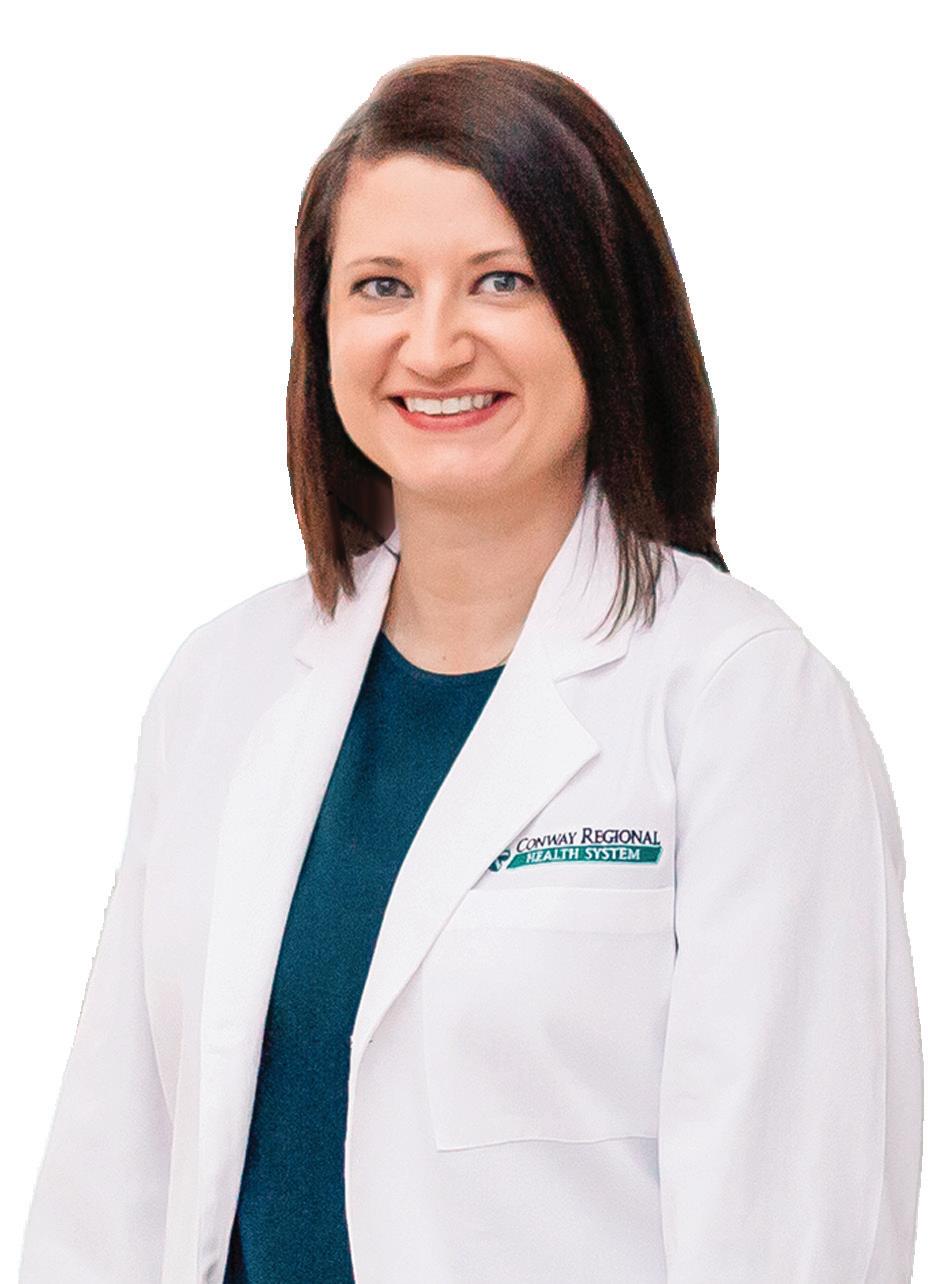REELIN’ IN THE YEARS
 By Mark Carter
By Mark Carter

 By Mark Carter
By Mark Carter
At Baptist Health, we see you. We see your strength. We see your victories. We see your determination. And we’re honored to provide the trusted healthcare you deserve.


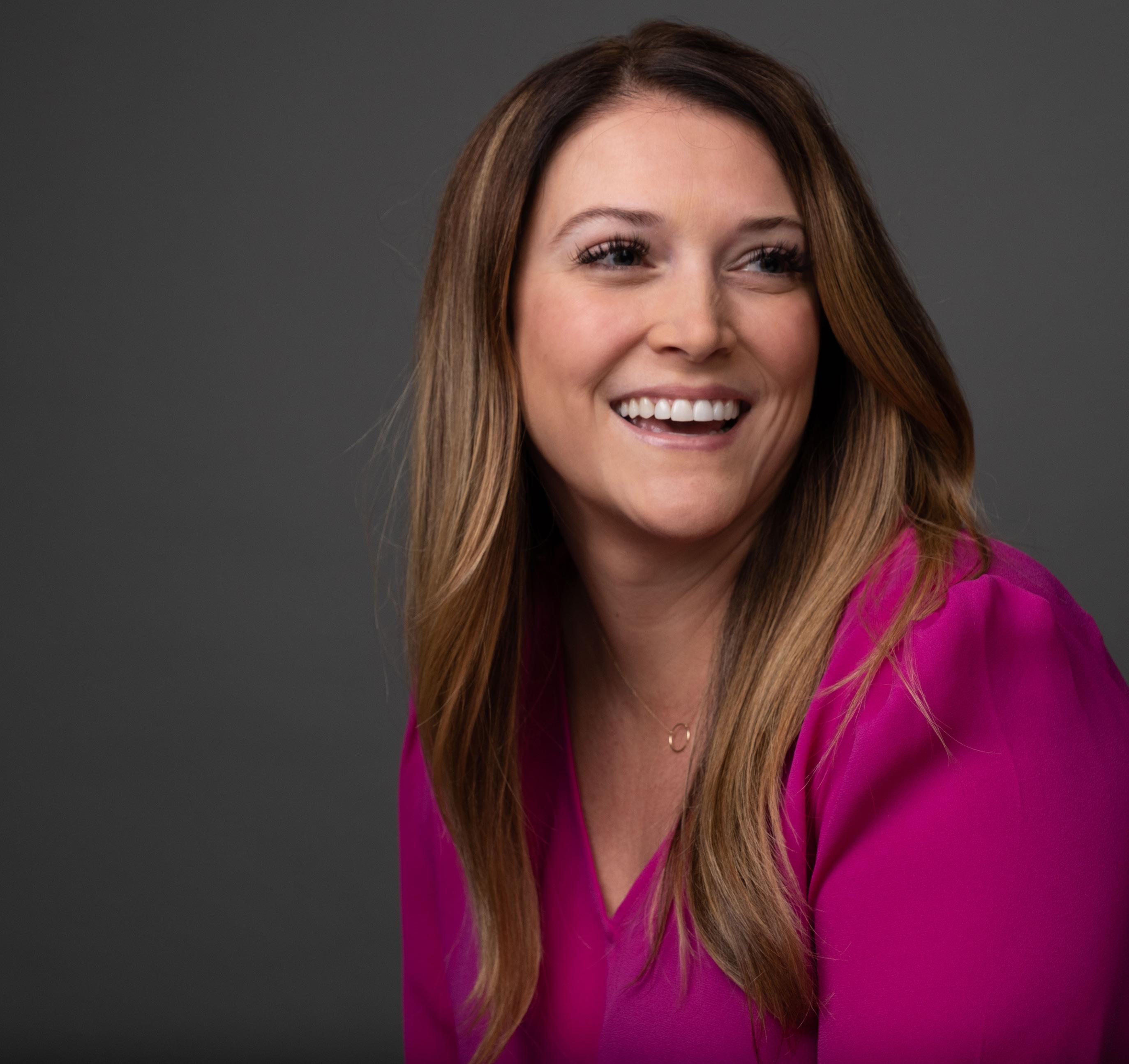








As a rm built on relationships, our handshake matters. It means a warm greeting, the privilege of doing business together and knowing you can count on us. A handshake between two brothers, Witt and Jack Stephens, provided the foundation for a family-owned legacy that Jack’s son Warren upholds today. Under Warren’s leadership, Stephens continues to grow as one of America’s largest privately held independent nancial services rms, with of ces throughout the United States and in Europe. Our performance builds relationships with our clients, many of whom have become old friends. It’s why shaking hands with us means just a little bit more.

111 Center Street




Little Rock, AR 72201

(800) 643-9691











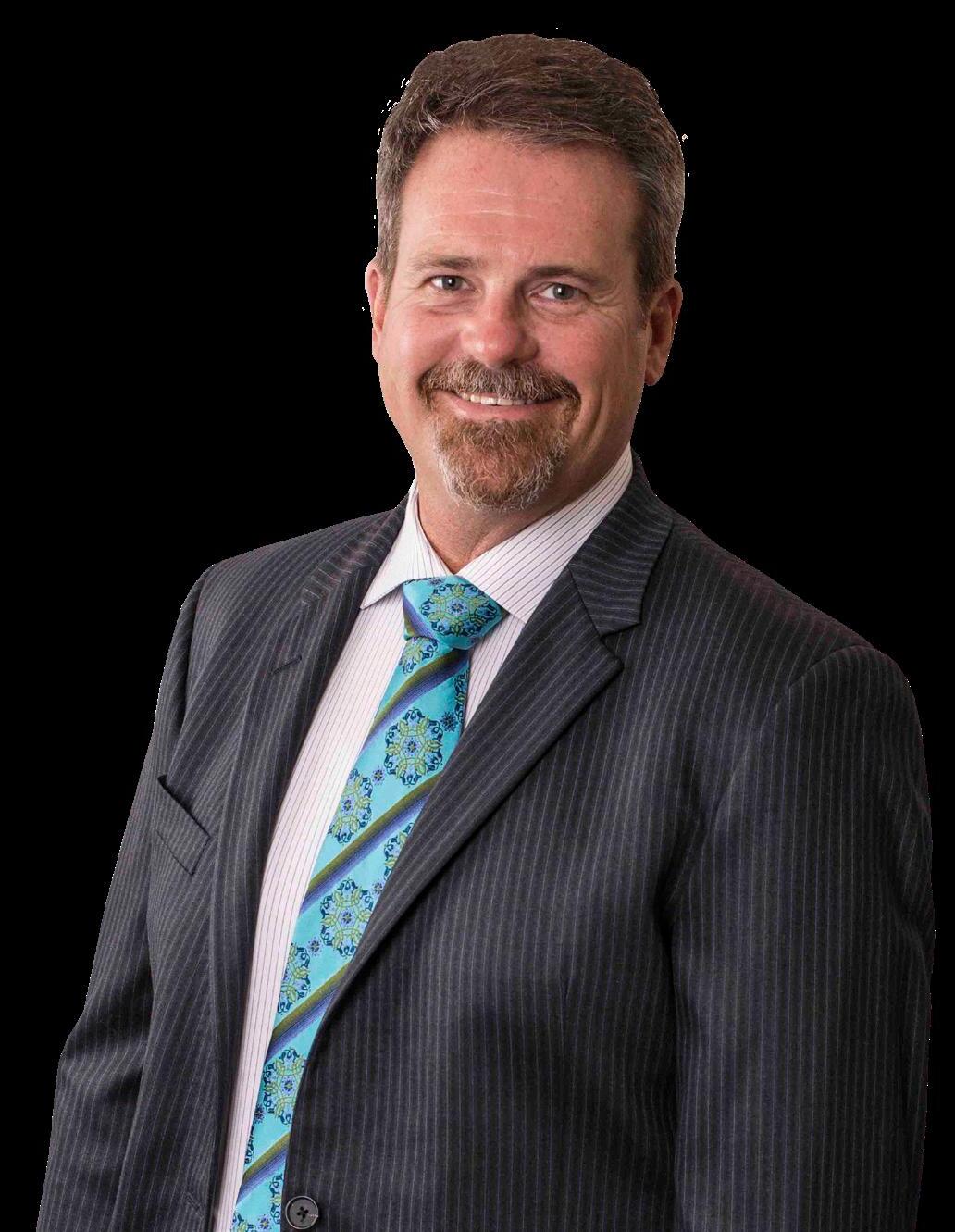
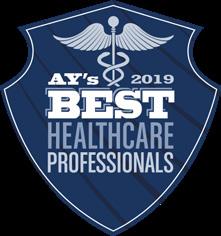



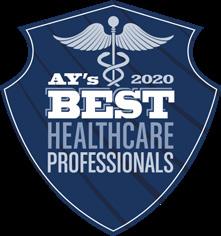


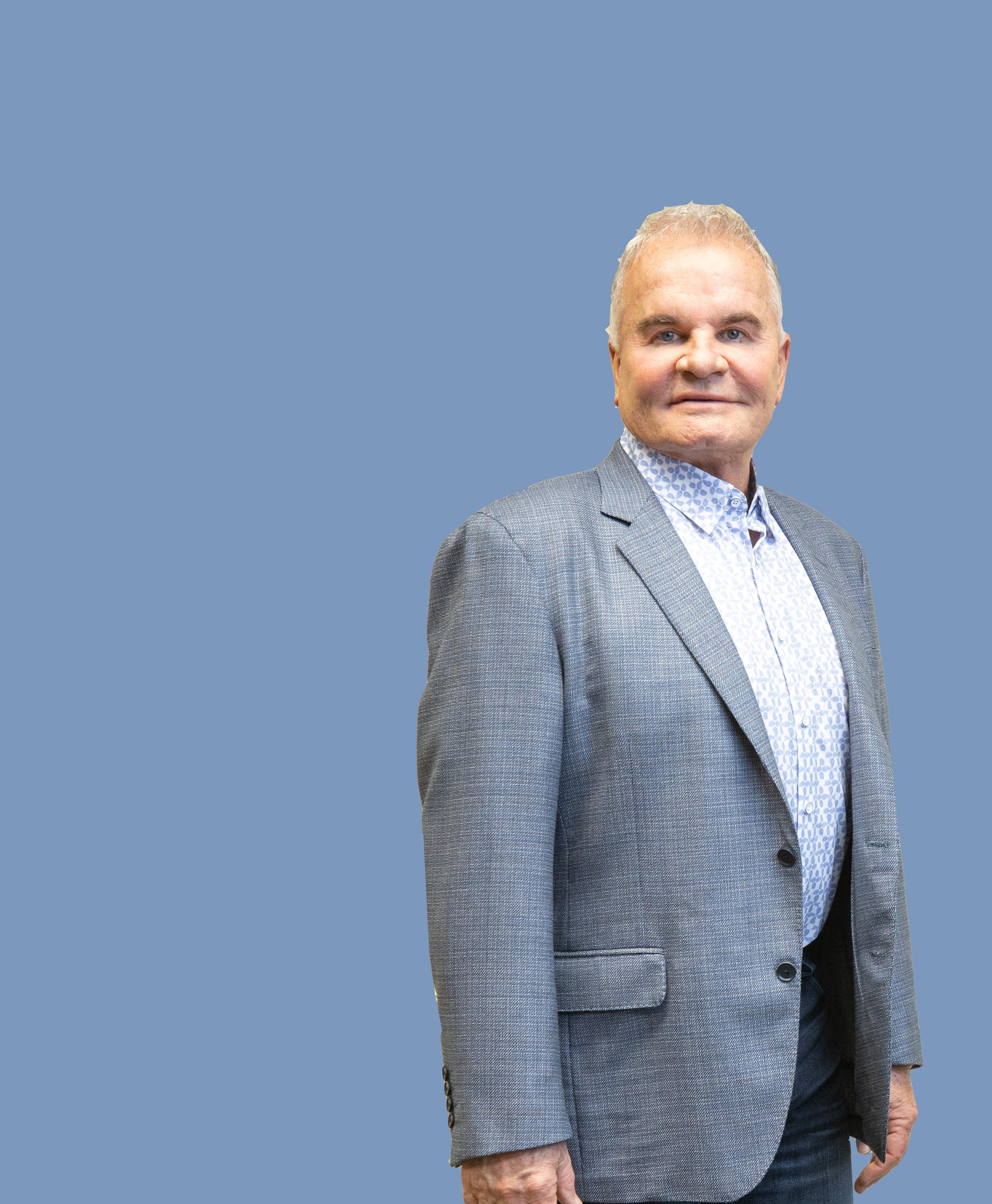
FEATURES MARCH 2023

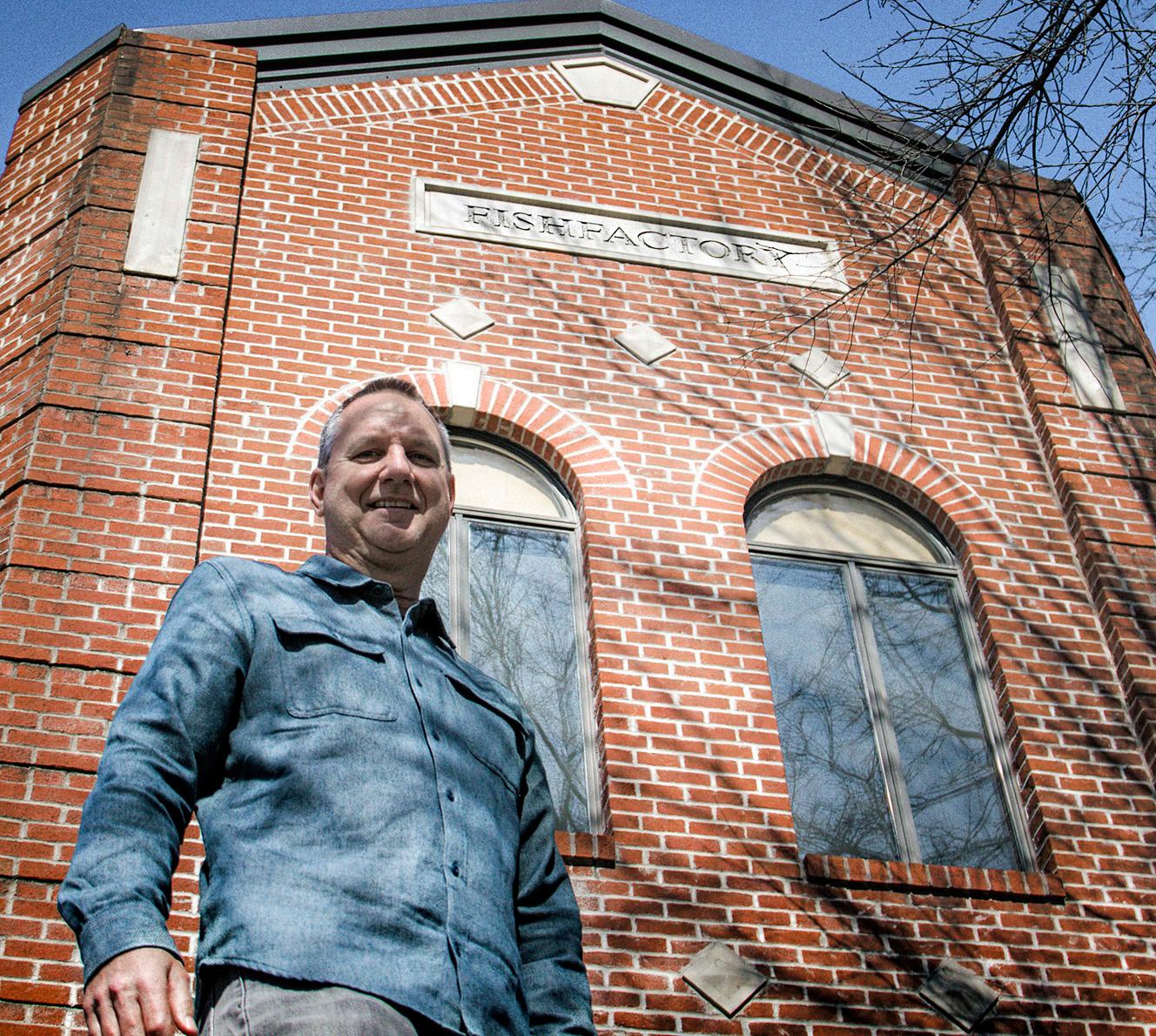
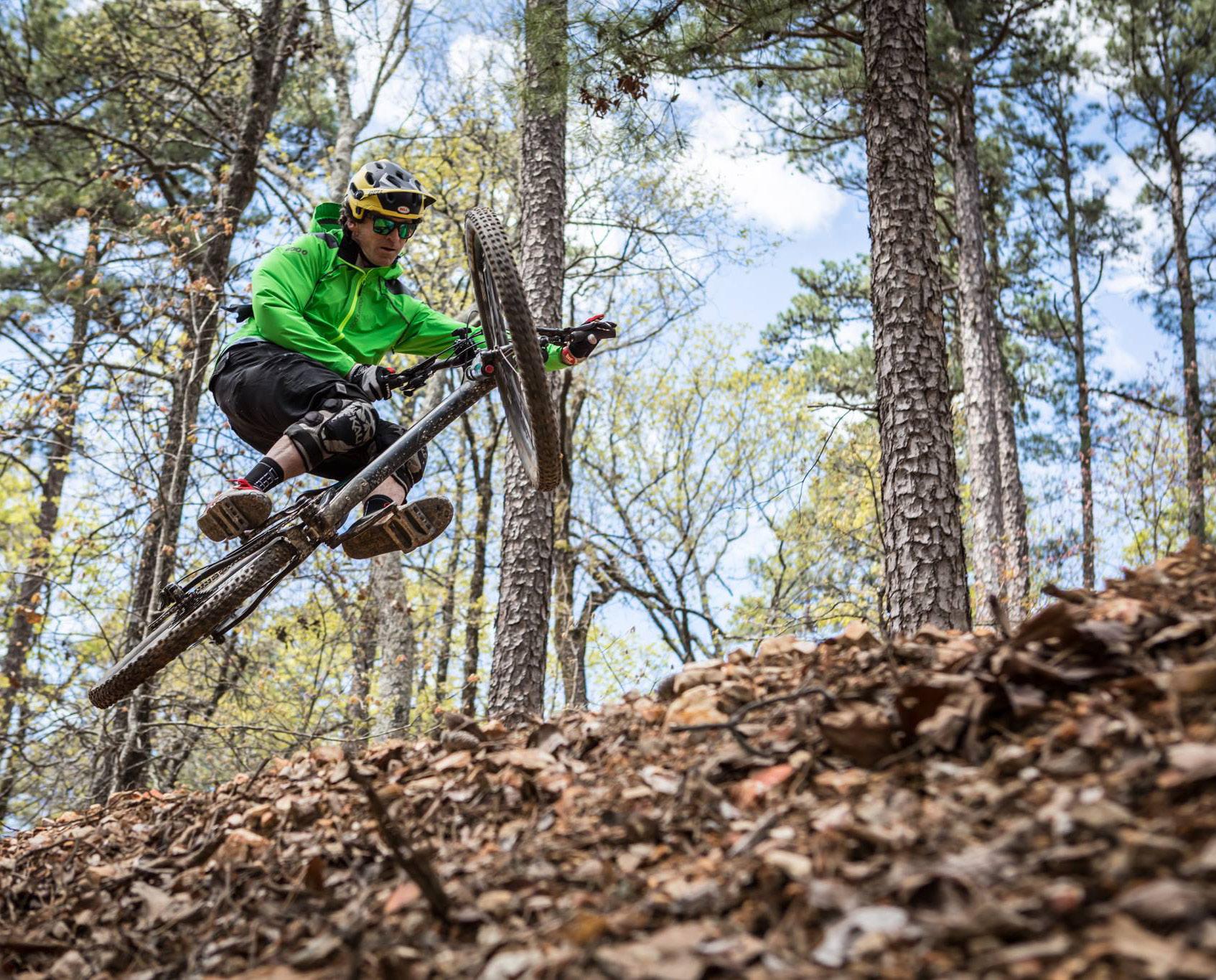
Conway startup guru Jeff Standridge launches the first in a three-part series on the mental toughness it takes to become a successful entrepreneur.
PRESIDENT & PUBLISHER
Heather Baker | hbaker@armoneyandpolitics.com
SENIOR EDITOR
Mark Carter
EDITORIAL SERVICES
Ya!Mule Wordsmiths | Little Rock
ASSOCIATE EDITOR
Sarah Coleman | scoleman@armoneyandpolitics.com
STAFF WRITERS
John Callahan | jcallahan@armoneyandpolitics.com
Mak Millard | mmillard@armoneyandpolitics.com
Katie Zakrzewski | katie@armoneyandpolitics.com
MANAGING DIGITAL EDITOR
Kellie McAnulty | kmcanulty@armoneyandpolitics.com
Tech innovations are leading to fewer non-automated jobs, placing more emphasis on the training available at technical schools.
Charles Nabholz joined the family business right out of high school and grew Nabholz Construction into a regional giant.
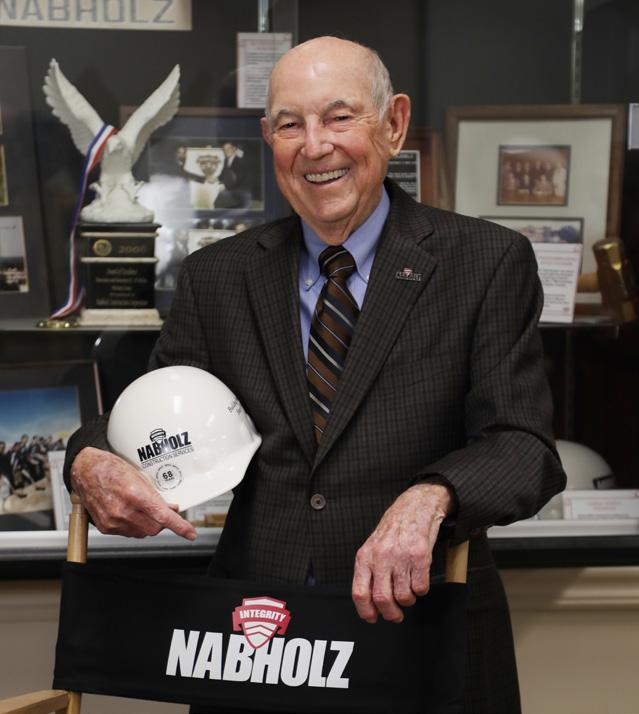
R.J. Hawk, known for his work on 103.7 The Buzz, traded the radio for the capitol rotunda when he was elected last fall as a first-time member of the Arkansas House.

ONLINE WRITER
Kilee Hall | khall@armoneyandpolitics.com
PRODUCTION MANAGER
Mike Bedgood | mbedgood@armoneyandpolitics.com
GRAPHIC DESIGNER
Lora Puls | lpuls@armoneyandpolitics.com
SENIOR ACCOUNT EXECUTIVE
Greg Churan | gchuran@armoneyandpolitics.com
ACCOUNT EXECUTIVES
Tonya Higginbotham | thigginbotham@armoneyandpolitics.com
Mary Funderburg | mary@armoneyandpolitics.com
Amanda Moore | amoore@armoneyandpolitics.com
Colleen Gillespie | colleen@armoneyandpolitics.com
Dana Rod | dana@armoneyandpolitics.com
SALES COORDINATOR
Jessica Everson | jeverson@armoneyandpolitics.com
ADVERTISING COORDINATOR
Rachel Mercer | ads@armoneyandpolitics.com
CIRCULATION
Ginger Roell | groell@armoneyandpolitics.com
ADMINISTRATION billing@armoneyandpolitics.com
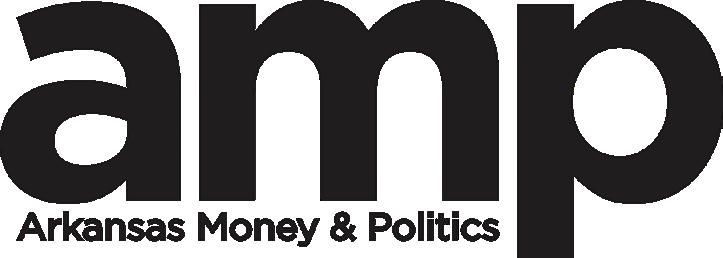
CEO | Vicki Vowell
TO ADVERTISE call 501-244-9700
email hbaker@armoneyandpolitics.com
TO SUBSCRIBE | 501-244-9700
ADVISORY COMMITTEE
Susan Alturi, Scott Hamilton, Tommy Keet, Bobby Martin, Shannon Newton
CONTRIBUTORS
Since Eric Musselman arrived in Fayetteville, Hog fans have become much more engaged in March Madness, once familiar ground and now a home away from home again.

Angela Forsyth, Becky Gillette, Lisa Willenberg, Andrew Balthrop, Chris Davis, DeWaine Duncan, Kenneth Heard, Dwain Hebda, Dave Ketchen, James Overstreet, Jeff Standridge
AMP once again shines a light on some of the state’s top executives, as nominated by readers. As it turns out, the C-Suite in Arkansas is becoming more feminine.
NIL has wreaked its own kind of madness on college sports. It’s benefited college athletes, and rightfully so, but unregulated, it’s led to a wild west landscape.
Great people, great service, and great products from companies like Siemens. This is how we create customers for life. One customer at a time.


Page 32
LITTLE ROCK TROJANS CLAIM FIRST OHIO VALLEY CONFERENCE CHAMPIONSHIP
“Excellent! Way to go Ladies!!!!”
Susan Wallace-Ward
BURLSWORTH FOUNDATION TO HONOR KEVIN SCANLON WITH LEGENDS AWARD
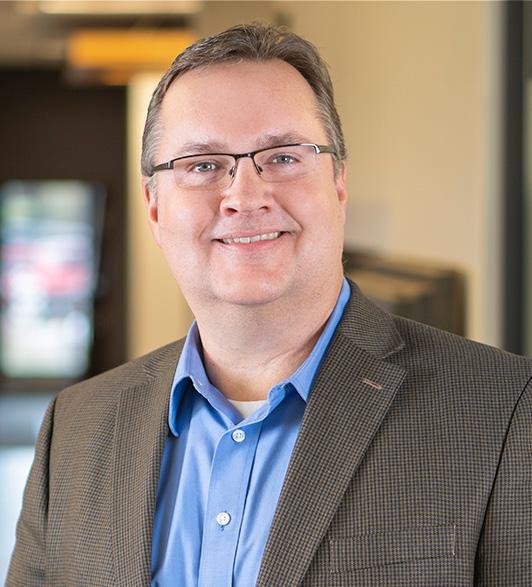

“Well Deserved.”
Eric Herget
Bliss West Baxley BIG
When you pray, move your feet,” is an African proverb fashion designer Korto Momolu grew up hearing, clinging to the words as she continues to achieve her wildest dreams.

Afalse awakening, The Sleep Foundation tells us, is when you dream that you’ve woken up. But of course, the film studio of your mind is still rolling. And in these productions, which are associated with that deep REM sleep, the plots usually revolve around the normal rather than the fantastical.
In false awakening dreams, dreamers usually dream about waking up and getting ready for the day, or about waking up in the middle of the night and going to the bathroom (heavy sleepers beware) or about simply engaging in normal activity. They even dream about thinking about a previous dream, the experts tell us. (Where’s Chris Nolan when you need him?)
I just dreamt that I went to work at the state’s daily newspaper of record for, like, eight months or so. And what an honor it was for an old newspaper fogie like me. I’m beyond grateful for that particular “dream.” But there are growth plans here at AY Media Group that roused me from it, and AMP readers… well, looks like you’re stuck with me once again.
Bring on your comments, suggestions and story ideas, good and bad. Even your symbolic pitchforks. (Iron sharpens iron, or something like that, right?) I’m always open at MCarter@AYMediaGroup.com, hopefully awake and not dreaming.

***
The dictionary defines imp as a small, mischievous devil or sprite. Most
By Mark Carterimages depicting imps tend to the gremlins-with-wings variety. Well, Santa delivered an imp for Christmas, and her name is Gertie. She doesn’t have wings, but spends plenty of time airborne, nonetheless.
This pedigree black Lab, four months old and already 40-plus pounds, enjoys pouncing. And chewing. And eating. Not to mention tail-wagging and grinning. And “communicating.” And did I mention pouncing? With arms and legs outstretched like an ambushing octopus enveloping its prey, an ottoman and a victim represent to Gertie that which the 15 feet between the free-throw line and the rim did to MJ: Airspace in which to float.
The kids, dispersed southeast and northwest to the rigmarole of higher education, hardly recognize her in photos now. When they return home for spring break, Gertie will be at least twice the size she was when they left after Christmas break. But what fun those reintroductions will be.
The boys already have been warned to watch their six, of course.
By Heather BakerThis month, AMP shines a light once again on the C-Suite, recognizing some of the state’s top executives as nominated by readers. We’re talking CEOs, COOs, CFOs, CIOs and their equivalents. These are the folks who help business move in Arkansas.
Ours isn’t a ranking — if it were up to us, every business owner, executive and worker would be tied at the top — but it’s a reflection of who our readers are thinking about when they think about leadership at the top level.
Also inside, you’ll find a look at the state’s economic development prospects for 2023. Caleb Talley looks at how a focus on health care is helping northwest Arkansas keep up with its continued growth; Angela Forsyth sits
down with new University of Arkansas Chancellor Charles Robinson; we talk to Hawgsports.com publisher Trey Biddy about how NIL is changing the college game; and Mark Carter visits with Mike McKinnis, son of the legendary Jerry McKinnis, about the iconic “Fish Factory” studios in Little Rock.
And speaking of which, I’m so grateful to welcome back Mark to the editor’s role for AMP with this issue. Seeing that Hog print back in his office and the Reese’s wrappers strewn about his old desk does my heart good. It’s like he never left.
As always, thanks for reading. We have big plans for the future and would love for you to join us on the journey. Hit me up with story ideas at HBaker@ ARMoneyandPolitics.com.

The University of Arkansas Community College at Morrilton (UACCM) is situated perfectly in both mission and location to prepare students for today’s labor market and evolving economy. Companies both large and small in a diverse sector of business and industry are changing their requirements for bachelor’s degrees, preferring to focus on applicants’ skills and savvy.
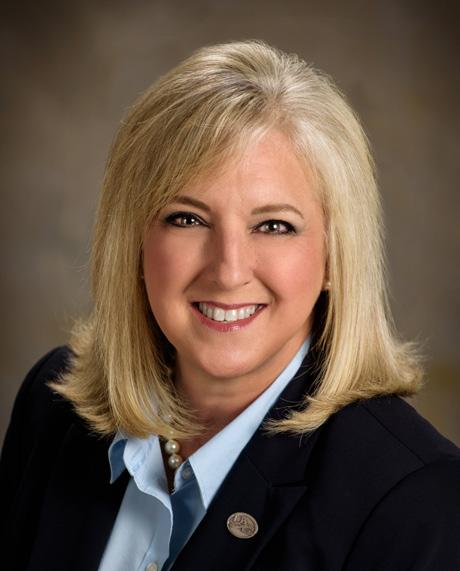
This shift has resulted in skills training at two-year colleges becoming increasingly popular among individuals who are considering postsecondary educational options. As a two-year college, UACCM offers a comprehensive curriculum of career-specific training and university-transfer programs, as well as adult education, workforce training and community outreach programs.
UACCM provides business and industry with a highly-qualified pool of employees and enhances the skills of both the current and emerging workforce. The college offers certificate of proficiency, technical certificate and associate degree options to accommodate students with a variety of goals.
There are many advantages to attending a technical college. From an economic standpoint, the tuition is typically much less than that of the four-year university tuition rate, which allows students to graduate with little to no debt. Another important benefit is that class sizes at community and technical colleges are usually much smaller, which allows students to get more one-on-one attention. Increasingly, the salaries earned by individuals with formal skills and technical training exceeds that of people who hold a bachelor’s degree.
In today’s labor market, many job seekers and employers are putting more emphasis on job training and other nontraditional forms of education. This is a great opportunity for technical colleges to look at ways to restructure training to include shorter-term programs and different types of instructional delivery in addition to the certificates and associate degrees they offer.
UACCM ‘s Workforce Development and Community Education program offers the flexibility to custom design short-term training courses specific to the needs of individual employers. These courses may be taught at the business site or on the UACCM campus. Three of these short-term workforce programs getting the most attention are the commercial driving training, heavy equipment operation and, the most recent addition, underground directional drilling training.
Demand for these types of both short-term noncredit and credit programs is high because they offer excellent opportunities for graduates, and they address the workforce shortage of skilled
By Lisa Willenbergtechnicians. The programs have strong support from businesses and industry, many of which offer internship opportunities, technical expertise, equipment donations and monetary support for scholarships.
The opening of the Workforce Training Center in 2018 allowed UACCM to greatly increase the enrollment capacity of technical education programs, thereby increasing the number of graduates with credentials and positively impacting the regional economy. The building features state-of-the-art technology and allows for continual expansion of the industry certifications being offered.
For those students whose goal is to eventually earn a bachelor’s degree, UACCM offers Associate of Arts and Associate of Science degree programs. These plans of study allow students to complete the general education requirements of a bachelor’s degree. UACCM has transfer agreements with all four-year public universities in Arkansas, and in collaboration with individual four-year colleges, has also developed 2+2 plans that include a course-by-course list of the classes the student takes at each institution to ensure a smooth transition in specific academic degree programs.
The UACCM Career Center allows students in grades 10 through 12 throughout the region to enroll in technical programs with tuition, fees and supplies paid for by the Office of Skills Development. UACCM also partners with area high schools to offer a concurrent program for high school students wishing to enroll in college-level academic classes. These classes may be at little cost to the student, with the tuition and fees being split between UACCM and the student’s high school. Concurrent enrollment gives high school students the opportunity to earn the 35-hour general education core requirements of a bachelor’s degree and get a significant head start on their post-secondary educational goals.
All UACCM students are provided with an array of support services, including academic advising, career services, counseling and disability services, testing services and free tutoring. Financial aid in the form of grants, scholarships, loans, career pathways, veteran benefits and more are available to eligible students.
UACCM has been one of the region’s greatest assets for 60 years, and it continues to be a great value in terms of affordability, convenience and personal attention students receive. For more information or to schedule a campus tour, go to uaccm.edu, or call 501-977-2000 or 1-800-264-1094.
Yellow-armed robots in a facility near Dallas now bottle and package many of the prescriptions that are sold in parts of Texas, Louisiana and Arkansas, automating a task historically handled by friendly, white-coated pharmacists at a neighborhood drug stores.
Walgreens Boots Alliance Inc., the nation’s second-largest pharmacy chain, already operates eight automated drug-filling centers that serve 1,800 of its 9,000 stores. The company plans to nearly triple those numbers by 2025, eventually filling 40-50 percent of its prescriptions at centralized sites that will serve up to 8,500 of its stores.
Center employees process prescriptions that can’t be handled by the robots (like inhalers) and provide quality control for the automation. The prescriptions, which for now don’t include controlled substances or timesensitive medications, are then delivered to the stores and dispensed by pharmacists and technicians.
This move toward automation offers tremendous potential for improving health care delivery systems, but only if industry leaders take advantage of the benefits, mitigate critical risks and navigate tricky dilemmas.
A central distribution system offers many benefits. For instance, stores can more efficiently use their inventory space, either holding less inventory or more high-demand items. Also, one robot can fill 300 prescriptions in an hour — what a typical pharmacy handles in a day. And the automated pill fillers can more accurately count medications, avoiding the human error factor than can lead to, say, 10 pills in a bottle that should have 12.
Walgreens claims that centralized automation eventually will save the company more than $1 billion a year while reducing pharmacists’ workloads by 25 percent. This could make community pharmacy a more attractive career path because, as Walgreens CEO Roz Brewer noted, automation frees up pharmacists to spend more time as caregivers and less as pill counters.
“We’re doing all of this work so that the pharmacist has an easier job, so that they can get back to being front and center, building a relationship with that patient and interacting the way they were trained — the work that they love to do,” Brewer said.
Ideally, pharmacists also will better perform the more complex elements of their jobs. In 2016, the Chicago Tribune conducted a field test to see how well pharmacies guard against dispensing dangerous pairings of drugs. Reporters visited 255 pharmacies with prescriptions for clarithromycin and simvastatin, two drugs that are relatively safe when taken alone.
Combining them, however, can cause a “severe breakdown in muscle tissue and lead to kidney failure and death,” the newspaper reported. Yet, 52 percent of the pharmacies in the study sold the medications without warning of the dangers.
To the extent that automated prescription filling leads to more attentiveness from pharmacists — as well as improved data analytics that flag dangerous interactions — automation may indirectly save lives.
The Risks
Thousands of travelers endured frustrating delays in January when a computer glitch shut down the airline industry for most of a full day across the United States. Imagine such a glitch impacting something far more important — like prescription medications.
Centralized distribution centers offer efficiencies that result in many
benefits; however, they also put large segments of the supply chain at risk. What happens if an ice storm knocks out the facility in Dallas, or a hurricane shuts down a facility in a coastal state? What if a software malfunction disrupts operations or a critical number of staffers at a center all get sick at the same time?
Centralization creates more efficient supply chains, but it also makes them more vulnerable to disruption. Contingency plans for keeping products flowing can’t be a nice-to-have because medications aren’t a nice-tohave. And those drugs will be in particularly high demand during a crisis. Policymakers have a vested interest in mitigating the risks of centralization, and firms would be wise to involve them in their planning.
The Dilemmas
The technology for operating centralized pharmaceutical centers has been tested in years past but didn’t stick because it freed up too much time for pharmacists, according to Rina Shah, a group vice president overseeing pharmacy strategy at Walgreens.
“There was nothing for them to do in the store,” Shah said.
The pandemic changed that by increasing the types of services pharmacists can provide that are reimbursable by insurers — administering vaccinations and COVID-19 tests, for instance.
For now, there’s a shortage of community pharmacists. Corporate leaders, however, eventually will face the temptation to reduce the number of highly paid pharmacists as a cost-savings measure, and this won’t benefit consumers.
Another dilemma is how to use centralized distribution models with controlled substances. Centralized facilities would allow for greater control of inventories, reducing the opportunities for theft by reducing the links in the supply chain. On the flip side, increased security would be needed at the distribution centers and when transporting prescriptions to local pharmacies.
On the whole, centralized packaging and distribution of prescriptions figure to improve supply chain dynamics while improving access to care for patients. Corporate leaders and policymakers simply need to do their part by keeping consumers at the forefront of their decision-making.
Dave Ketchen serves as Harbert Eminent Scholar at Auburn University. His research focuses on the intersection of supply chain management, strategy, and entrepreneurship. He earned his Ph.D. in business Penn State University in 1994.

Andrew Balthrop is a research associate at the Supply Chain Management Research Center at the University of Arkansas. His research focus is the interaction between supply chain management and government policy. He earned his Ph.D. in economics from Georgia State University in 2012.
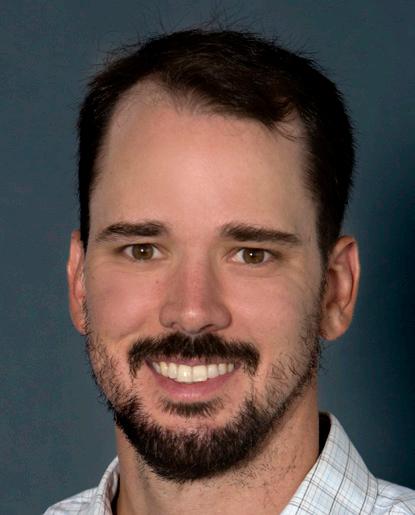
Innovation can seem to come out of nowhere. Like ChatGPT.
In reality, the AI program was developed over years or decades with incremental advancements and a variety of victories and failures/false starts, both behind the scenes and quite public.
Research is a long-term investment governed by a system of safety and ethics. Like most investments, there is a high degree of forward vision required to see research cross from theory into practicality. Vision may be the research lab’s most valuable asset.
Arkansas Research Alliance Academy Member Dr. John Imig of the University of Arkansas for Medical Sciences (UAMS) understands the power of a clear research vision. He has launched several biotech companies founded on intellectual property developed by his team. He has seen and navigated the barriers that prevent science from reaching the market.
“There is plenty of investment for basic research,” explained Imig, who serves as chair of the UAMS Department of Pharmaceutical Sciences. “The challenge is funding the developmental research that brings science to the public.”
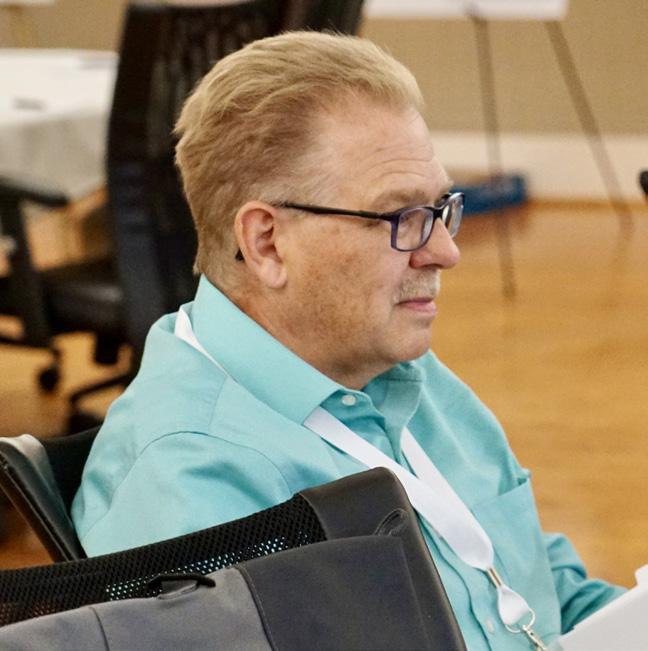
Basic research is defined as “the pursuit of new scientific knowledge or understanding that does not have specific immediate commercial objectives.” A study to discover the components making up human DNA would be considered basic research. Federal funding for such projects is readily available. In fact, Imig has secured more than $35 million in grant support as a principal investigator or co-investigator.
Developmental research is defined as “the systematic use of the knowledge or understanding gained from research or practical experience directed toward the production or significant improvement of useful products, services, processes, or methods, including the design and development of prototypes, materials, devices and systems.” Acquiring funding for developmental research can require scientists to reach out to the private sector – who often want guarantees or rapid results.
“Developmental research is the most important step in bringing science to market,” said Imig, whose research centers on therapeutic treatments for metabolic diseases, such as diabetes and hypertension. “There is a huge need to bring basic science to the clinic for development, but the vision to invest is not always there. This is why so much promising basic science ends up shelved. In the research community, we call it ‘The Valley of Death.’ To avoid this scenario, we must build bridges of opportunity.”
How does one build a “bridge of opportunity” so that basic science be rescued from the Valley of Death? According to Imig,
the key is collaboration. “It’s not about one agency or community getting involved. We need private philanthropy, state and federal agencies working in concert and focused on bringing research to the finish line.”
Imig, who recently joined UAMS from the Medical College of Wisconsin, said that it is important for state agencies like the Arkansas Economic Development Commission to take an active role in supporting developmental research. Not only can Arkansas see financial impact in securing rights to valuable intellectual property (IP), but it could also enjoy a vast improvement in quality of life through improved therapies for diseases that have negatively impacted the state.
“One in three Americans suffer from hypertension,” Imig said. “The statistics for diabetes are also alarming. The cost of treating the symptoms of the diseases is a drain on our resources. Investing in developmental research to combat these diseases can lead to healthier outcomes for the state – physically and financially.”
As a vascular and renal biologist, Imig and his laboratory are dedicated to understanding the mechanisms by which certain fatty acids, called eicosanoids, influence kidney and cardiovascular function. He and his team have developed novel eicosanoid-based drugs to treat hypertension, stroke, heart attacks, diabetes and kidney diseases.
Imig hopes to launch a biotech company in Arkansas once his lab at UAMS produces licensable research. Until then, he imagines a Natural State fully vested in development research. “I’d like to see us moving basic research to startup companies to create life-changing drugs and treatments. If you want to make discoveries and really improve public health, you must do that development work.”
Discovery Economics is a monthly feature highlighting the work of the ARA Academy of Scholars and Fellows, a community of strategic research leaders who strive to maximize the value of discovery and progress in the state. ARA recruits, retains and focuses strategic research leaders to enhance the state’s competitiveness in the knowledge economy and the production of job-creating discoveries and innovation. Learn more at ARalliance.org.



Certain parts of the country are synonymous with the industries that once made up an outsized portion of their local economies. Think Detroit and automobiles in the mid 20th Century. Pittsburgh and steel. Silicon Valley and bloated tech startups.
These communities enjoyed extended periods of economic prosperity driven largely by a few marquee verticals, and many continue to do so. But as rust builds on some of the destination industries of old, a new generation of opportunity emerges in unexpected places.
Don’t tell the neighbors, but we’re in a pretty good spot here in Arkansas, and the outlook for 2023 and beyond is bright. Most are aware of the aerospace and defense industries thriving in south central Arkansas and, of course, the rice, soybean and other agricultural drivers in the Delta. Recent years have also seen The Natural State emerge as a national leader in steel production in our northeastern-most corner and keep your eyes on lithium in the south.
What’s on the horizon? Depending on who you ask, Northwest Arkansas could be on the verge of emerging as leader in health care, health tech, research and education.
That may sound like a stretch to folks in Memphis, Cleveland, Rochester and beyond. But had you suggested in 1960 that this region of our state would be a world leader in retail and supply chain, you would likely have gotten the same reaction. Yet with time, vision, hard work and (just as importantly) investment, Northwest Arkansas became just that.
Most of those ingredients are coming together once again to create an ecosystem that could set the standard for health hubs across the nation.
Back in 2015, the Northwest Arkansas Council — a nonprofit that’s worked to ad-
vance the region for decades — laid out a strategy that included a goal of establishing Northwest Arkansas as a legitimate healthcare destination. What followed was a good deal of research, reflection and recognition of the barriers that stood in the way of achieving that goal.
The benefits of having a robust healthcare ecosystem held up by pillars of education, innovation, specialization and expanded access would clearly have a positive impact on health outcomes for a state that perennially ranks among the worst in the nation in all sorts of categories. Statewide, trends on obesity and chronic illness will almost certainly increase health care costs for all.
What makes Northwest Arkansas so attractive in this space? For one thing, the region is growing with a population both older and more diverse. That’s going to have a significant impact on what needs will have to be met from a health care perspective. Demand for more doctors, specialists, beds, access and innovation is obvious. Making Northwest Arkansas a health care destination is good for life and longevity. But it’s also great for the economy, and the cost of not doing so is high.
A study, commissioned by the Northwest Arkansas Council and released just before the COVID-19 pandemic, found that the region lost out on approximately $950 million a year through out-migration for specialty care. That number was projected at the time to rise to $1.43 billion by 2040 if gaps weren’t addressed.
On the flip side, the study found by adding the needed specialty services and making the right community investments, the economic gain to the region could be as much as $2 billion by 2040. That’s a $3.43 billion potential swing in economic impact to the region by helping meet the health needs of its popu-
lace. Win-win.To address the gaps, the council’s study made a few recommendations that included expanding graduate medical education, developing an interdisciplinary research institute and expanding medical education with the creation of a medical school. And the work to deliver on those recommendations began soon after.
One of the major pillars of what may eventually be one of the nation’s premier healthcare ecosystems was introduced in January 2020 when Walmart heiress and regional visionary Alice Walton announced the formation of the Whole Health Institute.
A disease care system, she said, is not a health care system. Instead, the nonprofit Whole Health organization would address physical, mental, emotional and social wellbeing by working with health systems, partners, employers and communities to redesign health care delivery.
The Institute wouldn’t just focus on the treatment of illness, but rather amplify the importance of a “flourishing of the mental, physical, and emotional well-being, rooted in purpose, meaning, and belonging in our lives.” And it would do so with a threepronged strategy that includes building innovative approaches to care, amplifying research and best practices and advocating for policies and scalable models.
Another important step in laying the foundation for a thriving health care ecosystem in the region would be recruiting, developing and supporting innovators and entrepreneurs in and around the health care space. Innovation as it pertains to health can be multifaceted, whether it’s the product of research within hospitals and academic centers, medical devices or technologies developed by inventors and entrepreneurs, or impacts made on any
number of predeterminants of health.
To aid in that development, the Institute also focuses on innovation in its approach to care.
“Our ultimate goal at Whole Health Institute is to bridge the gap between what we know most influences our mental, physical, social and emotional health, and how our health care and payment systems are set up today,” said Jordan Carlisle, director of digital health and innovation.
“This requires engaging in people’s health earlier, more frequently, making it easier to navigate, and more integrated. Innovating with technology is essential to all of those aspects.”
Construction of the Whole Health Institute’s facility is underway, with the goal of opening in 2024. The 75,000-square-foot building, which will be located on the campus of Crystal Bridges Museum of American Art in Bentonville, will feature office space and community gathering areas designed by Marlon Blackwell Architects in Fayetteville.
To help deliver on the vision set by the Whole Health Institute, Walton announced in 2021 plans to establish a school of medicine, offering a four-year, medical degree-granting program that integrates conventional medicine with holistic principles and self-care practices. The Alice L. Walton School of Medicine is a sister non profit organization to the Whole Health Institute and similarly creates a new paradigm of medical education.
According to Walton and the school, students will learn the importance of personal-
ized, proactive, patient-driven approaches to care and treatment as well as how to reinstate humanity into health care by emphasizing all aspects of a person.
“The school of medicine is poised to be an inspiring learning environment that supports well-being, emphasizes innovation, and equips future physicians to be agents of change,” Walton said last summer. “We are excited to help pave the way for the next generation of holistic physicians and health professionals.
“This unique, site-responsive building will welcome students, staff and visitors alike to explore this beautiful campus, serving a broader vision of enhancing quality of life in our region and beyond.”
According to the school’s website, students will receive four years of training in the ARCHES curriculum, which builds on evidencebased approaches to teaching that include six core elements: art of healing; research, entrepreneurship and innovation; clinical care; health systems sciences; embracing whole health; and science of medicine.
“We believe in developing, testing and deploying more effective care delivery and payment models, and addressing health disparities in our backyard before we open-source and scale solutions to health systems across the country,” Carlisle said.
“We are also committed to making Northwest Arkansas a leader in advancing medical education through Alice L. Walton School of Medicine, where we’re creating a new pipeline for physicians with a curriculum that
combines conventional medicine with whole health practices.”
The school will be built on approximately 20 acres east of Crystal Bridges Museum of American Art. Construction of the 154,000-square-foot building is expected to start this spring with hopes of its first class in the fall of 2025, pending accreditation.

Later in 2021, to further address the gaps highlighted by the NWA Council’s study, the Alice L. Walton Foundation announced a joint initiative with the Cleveland Clinic to identify ways to provide access to Cleveland Clinic’s renowned specialty care services in Northwest Arkansas. The move looked to address one of the biggest factors behind the state’s economic deficit: patients leaving to find specialists.
“As Northwest Arkansas continues to grow, it’s imperative that we increase access to specialty care in our region so residents don’t have to travel elsewhere for care they could receive closer to home,” Walton said at the time. “Our goal with this collaboration to assess the specialty care needs of our region is to investigate how to make a transformative approach to health and well-being available to everyone.”
On their own, these projects represent a serious commitment to transforming the health care landscape in Northwest Arkansas and move the state closer to the goal of making the region a health care destination. But it wouldn’t stop there, as the following year saw the announcement of a new transformative health care system.
Last year, the Alice L. Walton Foundation and Washington Regional Medical System announced plans to form a partnership to create a regional health system to improve health outcomes across Northwest Arkansas and beyond.
“As we bring together the best health innovators and caregivers locally and across the world with the mission to impact a state that faces many health challenges, and in a region known for consumer innovation, there’s a compelling reason to be here,” Carlisle said. “And we’re already feeling it.”
The two joint initiatives would work to support the growth of health care services in the region, increase access to specialty care, expand clinical services, bolster research capabilities and collaborate with the school of medicine to train the next generation of caregivers.
“The creation of the regional health system will advance our mission and vision, including expanding our clinical, academic and operational capabilities, and continuing to invest in our facilities,” Larry Shackelford, president and CEO for Washington Regional Medical System, said in 2022.
“Our mission is to improve the health of area residents through compassionate, high-quality care and wellness education and to act as the central hub for clinical, educational and research activities in Northwest Arkansas. This partnership provides the resources to take our health care services to the next level to best serve our growing community.”
The seeds of a vibrant, multifaceted health care ecosystem are being sown from within existing academic centers, too.
Last spring, while most of the attention was on the plans being drawn up around Crystal Bridges, the University of Arkansas announced plans to team up with regional health care leaders to create a new program to focus on the challenges within the health care industry and create new solutions to bring to the marketplace.
Dubbed Northwest Arkansas Biodesign Sprints, the program is a partnership with the university’s Office of Entrepreneurship and Innovation, the UA Department of Biomedical Engineering, HealthTech Arkansas and regional health care systems.
HealthTech Arkansas is a health care accelerator and investment fund that connects early-stage health care companies with dis-
ruptive technologies to Arkansas hospitals and health systems through accelerator programs and internal innovation programming. NABS will initially partner with four hospitals and health systems: Arkansas Children’s, Washington Regional Medical Center, Mercy and Northwest Health.
The program will operate out of the Collaborative in Bentonville and will leverage partnerships to build a community of people trained in innovation methodologies, expose clinical and health care system needs and yield early-stage ideas and prototypes for the marketplace.
“The NABS program was born out of our experiences working intensively with Arkansas Children’s Hospital and Research Institute,” said Sarah Goforth, executive director of the Office of Entrepreneurship and Innovation.
erator programs in Northwest Arkansas and quickly realized they shared the same pain points in the male-dominated ecosystems of entrepreneurship and health care. So, they came together to form the organization and set out to empower female founders to build and lead profitable, women-centric companies that are offering solutions to women’s health-related issues.
“Health care innovation for women remains largely stagnant as systemic issues of gender bias, underrepresentation of women in clinical research, and underfunding of female-related disease remain unaddressed,” said Prenger, FHF co-founder and marketing/ PR lead. “We’re excited to roll up our sleeves and get to work with our partners throughout the region to make this a success throughout the heartland and beyond.”
“With the benefit of partners at Arkansas Children’s who were willing to be out front in the creation of new ways of driving innovation, we learned that problems and ideas often lie dormant in the minds of busy clinicians who may not have avenues to advance them. This is fertile ground for innovation.”
Sprints refers to focused meetings to identify challenges and potential solutions within partner hospitals, led by administrators from HealthTech Arkansas. Students from across business and engineering disciplines will be assigned to sprints by OEI with the goal of strengthening capacity and promoting health innovation at the university. The Department of Biomedical Engineering will support the prototyping and testing of new innovations.
A couple of new pushes to accelerate health care solutions in the region will also roll out health-focused cohorts in 2023.
In the fall of 2022, woman-led entrepreneurial support organization FemHealth Founders was launched to help women’s health care startups in the heartland through an eight-week accelerator set to begin this spring.
Co-founders Natalie Shew, Elizabeth Prenger and April Roy met through accel-
With a long-term goal of accelerating 50 women-led health care ventures by 2026, the program will launch its first cohort in the spring with a fivecompany cohort, all of which will receive a $10,000 non-dilutive grant. The Fuel Accelerator also looks to leverage its network and curriculum to serve health-related startups this year. The program has graduated four cohorts of companies from Arkansas and around the globe since launching as a supply chain-focused program of Startup Junkie in 2019. The program pivoted its focus to artificial intelligence and machine learning in 2020, and this year, will add a second cohort for health care solutions.
“The Fuel Accelerator is a 12-week enterprise-ready accelerator that connects seed and growth stage startups with mentors and enterprise partners in order to accelerate the tangible adoption of technology,” said Matthew Ward, Startup Junkie’s director of Fuel. “We will be able to provide value to the health innovation scene in Northwest Arkansas by offering local health stakeholders the ability to meet with world-class tech startups at no cost, which have the potential to move the needle for the health organizations.”
According to Ward, the program will zero in on solutions that address health care-related efficiencies and administrative processes rather than medical devices or commercializing research findings.
“This could include areas such as health care supply chain, retention, recruitment, behavioral health and other focuses, which have been amplified in previous years from events such as COVID and the conflict in Ukraine,”
The foundation and Washington Regional announced plans to create a regional health system.
Ward added. “With the region being such a collaborative environment, there are massive opportunities for local health organizations to work together to find solutions with entities such as Fuel.”
And while it won’t be an undertaking of the Fuel Accelerator, commercialization of research is pivotal to the future of health care and the future of Northwest Arkansas as a health care destination. That’s where Science Venture Studio steps in.
Launched in 2020 as a pilot program of Startup Junkie, SVS has grown into an organization that, through collaboration with Innovate Arkansas, the Northwest Arkansas Council and OEI, assists Arkansas science- and technology-based startups apply for nondilutive federal funding. Led by Katie Thompson, SVS provides an in-the-trenches approach to securing federal funding, such as SBIR and STTR grants, targeted at early-stage commercialization.
“The research in the health care space can
be pivotal not only to the individual but to the overall community,” Thompson said. “At times, innovative solutions in health care can support the individual physically, emotionally and financially, which in turn stimulates growth and prosperity to the family and overall community and region.
“Ultimately, research in this space has a definite ripple effect, which drives home the importance of this type of research. I’ve had the honor of witnessing and being in conversation with researchers that are taking their research from lab to the health care market. There are many challenges. To name a few: regulatory hurdles and funding. However, once these hurdles have been overcome, the payback from a financial standpoint and, most importantly, a human health standpoint is worth it.”
A lot has happened over the last couple of years to move Northwest Arkansas on the path to fulfilling a collective goal of becoming a health care destination that could set a stan-
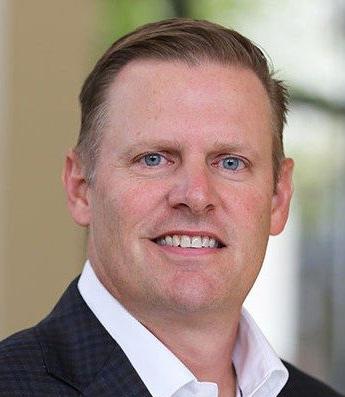
dard for communities through the country. And a lot more work will follow to fulfill the promises and follow through on investments made.
Still, the vision of Northwest Arkansas as a premier health care destination is growing clearer each day. And what may have seemed like a moonshot nearly a decade ago, is looking more and more like a reality.
“People from everywhere can get excited about making quality care affordable and accessible to as many people as possible,” Carlisle said. “This is a direct parallel to Crystal Bridges demonstrating the impact museums can have in the middle of America, and Art Bridges providing museums between the coasts with resources and art lending programs to make art more accessible to all people.
“With Alice Walton’s health initiatives, new innovations, and committed partners, we can transform how health care is delivered and taught in Northwest Arkansas and beyond.”
The last two years saw a number of major investments in the Northwest Arkansas health care ecosystem leading to an expansion in access to care.
In July 2022, Mercy showed its commitment to the concerted effort with the announcement of a $500 million investment in the next phase of its health care expansion in Northwest Arkansas. The investment will allow the hospital system to add a state-of-the-art cancer center, emergency department and expanded isolation rooms, additional clinic locations and more outpatient care facilities.
The move also nearly doubles the current number of primary care physicians and specialists.
With this commitment, Mercy will have invested almost $1 billion in less than a decade in Northwest Arkansas. The additions and expansions follow a $300 million project launched in 2016 to build a 275,000-square-foot patient tower, creating 1,000 new health care jobs and primary care and specialty clinics in Benton and Washington counties.
“Phase two of Mercy’s expansion in Northwest Arkansas represents our commitment to elevating the region as a preferred health care destination,” said Ryan Gehrig, president of Mercy Hospitals Arkansas. “By adding 100 new primary care and specialty physicians and advanced practice providers, we’re continuing to increase access to high-quality, low-cost health care. Mercy has already recruited more than a third of our goal for new providers in just six months.”
Mercy’s $500 million plan for expansion addresses the region’s increasing need for primary care and the further development of
sub-specialty care as the community continues to grow and prosper. Shortages in critical areas have forced some patients to seek treatment outside the region.
Heart disease and cancer remain the top two leading causes of death in Arkansas, and the need for more cardiology and oncology care providers are just two of the gaps in specialty care Mercy has identified. Others include neurosurgery, rheumatology, urology, psychiatry, orthopedics, gastroenterology and pulmonology. Mercy’s strategic plan for growth encompasses increased access to each of these specialties and primary care.
“The impact of our investment is focused on producing more positive health outcomes for the future, but there are other benefits,” Gehrig added. “Findings from the Northwest Arkansas Council’s Northwest Arkansas Healthcare: Assessment, Economic Impact and Vision for the Future report show the removal of barriers to much-needed health care within the region will further bolster the local economy.
“While the economic benefit of Mercy’s investment into the health of our community is certainly appreciated, it is our commitment to providing compassionate care close to home for our patients that drives our progress forward.”
With its diversity in entertainment and attractions, Hot Springs has survived through times of gangsters, floods, fires and even a global pandemic that shut down most of the country.
Now, with a multimillion-dollar expansion at Oaklawn Racing Casino Resort, more businesses and restaurants opening and ongoing discussions to turn a burned hotel and its land into a gathering place, the Garland County town of 38,000 is poised for even bigger success.
“We’re on such a roll,” said Steve Arrison, the CEO of Visit Hot Springs. “It’s incredible. It looks like 2023 will be a record year in Hot Springs again. I don’t see it stopping.”
More than 3 million people spend at least one night in Hot Springs each year, Arrison said. At least 2.5 million visit Oak-

lawn for its horse racing, casino and hotel each year, added Amy Thornton, a spokesman for the facility.
The tourism boon also helps Hot Springs attract more manufacturers and businesses, which means more money, Greater Hot Springs Chamber of Commerce President Gary Troutman said.
It continues the cycle of success – more attractions bring more people. More people mean more money and more money means funds for yet more attractions.
“The sky’s the limit,” Troutman said. “Our secret sauce for success is that our community, our business leaders, the hospital and
“We’ve got a lot of spokes in the wheel, and they all point to Hot Springs.”
[community] college are all getting along and working together. There’s no end. We are going in the right direction.”
There had been some dips in Hot Springs’ growth, said Robert Rains, the owner of the Gangster Museum of America. In March of 2008, he recalled, when he first opened the museum that highlights the rollicking era when organized crime ran rampant in the Spa City, more than 30 downtown buildings were boarded up.
But things began turning around.
“People started to build again,” Rains said. “I’ve not logged a single year without an increase in tourists and revenue. I don’t want to say much because I don’t want to jinx it. But Hot Springs is covered up.”
Hot Springs has a long history. Its natural thermal springs were seen as a means to cure various ailments, and people flocked there for its healing waters. Professional baseball teams held spring training in the town. (Babe Ruth, then a pitcher for the Boston Red Sox, clouted a 500-foot home run out of Whittington Park in 1918 that changed the focus from his pitching to his batting prowess).
“Back in the 1930s, people thought the springs were a cure for everything,” Rains said. “The Hot Spring National Park is a major draw. Everything else that we have is gravy to visitors.”
The town even thrived during the COVID-19 pandemic, Troutman said.
The 2020 state high school basketball tournaments were scheduled to be held in the Hot Springs Convention Center, but state health officials closed the contest before it was completed due to the fear of contaminations.
Horse racing at Oaklawn was shut down for six weeks that spring. But people continued to visit Hot Springs.
The lure of the national park’s hiking trails and the lakes of Garland County provided activities that didn’t require the gatherings in close quarters that federal officials were banning.
“We had people coming from all over,” Troutman said. “Texas folks were coming up here to do things. People were tired of being locked up.
“We had people banging on locked business doors wanting to come in,” he said.
The horse track resumed racing on May 4, 2020, and city officials called for a “full-scale” opening. The city’s not seen a dip in activity since.
“Hot Springs became a refuge for people to visit during COVID,” said Tony Valinoti, owner of Deluca’s Pizzeria. “People were tired of being indoors. We have the lakes, hiking and biking trails. Even though capacity was limited in restaurants at one point, people came out in force.”
When air travel was restricted during the pandemic, because of its proximity in the central U.S., Hot Springs still had out-ofstate visitors driving in from Texas, Louisiana, Tennessee, Oklahoma and Missouri.
Hot Springs is four hours by road from Dallas and three hours from Memphis.
Valinoti moved his restaurant to a new spot on Central Avenue in February. The new space includes a bar and an outdoor patio.
“It’s just right,” he said of his new location. “It’s something I’ve always wanted, and we were able to move there.”
Rains said the cooperation of local officials and the community have helped turn Hot Springs into the top tourism attraction in the state. It hadn’t always been that way, he added. Decades ago, the town leaders were a bit more secluded.
“Hot Springs is a microcosm of the United States,” Rains said. “This is a fascinating town.”
Oaklawn’s expansion is yet another draw for more visitors. The $100 million project offers The Bugler, a fine-dining restaurant that includes a view of the track; The First Turn Bar, located near the first turn of the track in a climatecontrolled patio; a luxury spa and fitness center; hotel rooms that look down onto the racetrack; and an event center that can hold meetings, dinners and concerts for up to 1,450 guests.
“Partnerships between business, government and the community all worked towards one goal,” Oaklawn General Manager Wayne Smith said. “The goal of providing visitors and tourists a safe, fun place to find some of the best indoor and outdoor entertainment activities in the country.”
Troutman said plans soon call for securing water rights from Lake Ouachita. Twenty-three million gallons of water will be available and tunneled to the city.
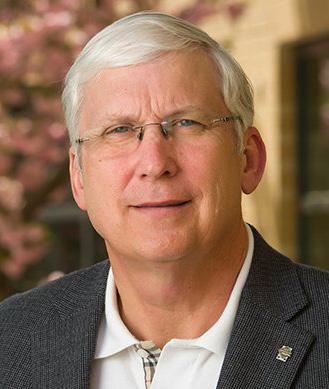
“There’s massive developmental potential with that,” Troutman said.

There’ve also been talks of converting the Majestic Hotel property into some sort of economic development, Troutman said.
Fire destroyed the yellow-bricked hotel on Feb. 27, 2014. City fire officials suspect the fire may have started when people, who sheltered in the abandoned hotel, set a fire to keep warm.
The hotel sat on 5.2 acres with an adjacent 5.7 acres behind it, and Troutman said some prospective developers have talked about creating a large pavilion and meeting area with a water feature in the front. However, talks have been sporadic since the hotel site was razed nearly a decade ago.
“It’s exciting, but ….” Troutman said. “It’s a hurry-up-and-wait project. We’ve been contacting a lot of investors.”
“We’ve got 31 miles of biking trails, hiking trails through a national park, the Majestic Park baseball stadium,” Arrison said. “We’ve got a lot of spokes in the wheel, and they all point to Hot Springs.”
For Valinoti, it’s more than just a spot for his restaurant.
“I’ve lived all over the U.S.,” he said. “I’ve lived in California, Las Vegas and Miami. The light switch is really on here. Hot Springs is my home.”
The table is being set for Arkansas to experience a nice little economic-development run, says the head of the state’s largest business advocacy group.
Not that growth has been missing. Northwest Arkansas remains one of the fastest growing regions in the country. Randy Zook, president and CEO of the Arkansas State Chamber of Commerce and Associated Industries of Arkansas, noted Walmart’s giant new corporate campus to rival Google’s digs in Silicon Valley, under construction in Bentonville; Tyson Foods expanding its corporate footprint in Springdale and relocating as many as 1,000 corporate employees to the region; not to mention continued growth from J.B. Hunt, George’s and Simmons Foods.
And, of course, the cache of Walmart vendors in the region continues to snatch up supply chain and logistics graduates as fast as the University of Arkansas can produce them.
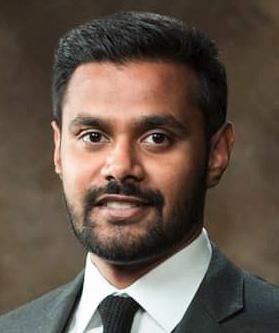
“Northwest obviously has all the momentum it can handle,” Zook said.
Indeed, in vibrant northwest Arkansas, the song remains the same. But momentum isn’t exclusive to Benton and Washington counties. Central Arkansas has landed some big fish in the form of multiple Amazon distribution centers and another for Tractor Supply Co. And the Port of Little Rock has been on a good run.
Zook also notes all those steel mills hugging the river in Mississippi County, the burgeoning chemical manufacturing and lithium extraction industries through LSB and Standard Lithium in El Dorado, and business has been good of late for the aerospace and defense industry in Camden.
Plus, “There’s been some impressive investments in timber in
south Arkansas,” Zook said. “Lots of action going on.”
But the state can’t fully realize this potential until it has the workforce in place necessary to meet the market’s demand for workers. As Zook noted, “The challenge is the workforce. That’s the headline all over the state.”
As an aging workforce clocks out, there aren’t as many fresh bodies waiting in line to clock in and replace them. This is the case in Arkansas and across the country.
Thus, the issue with the workforce in Arkansas is one of quantity, not quality. Arkansas is known for the latter. But the state’s current labor force participation rate is down to 56.5 percent, almost six points below the national rate, per the U.S. Chamber. Arkansas has 64 available workers for every 100 open jobs, its latest data reveals.
And the state lags behind the national average in percentage of the population in the age groups 25 to 44 and 45 to 64, the two that make up most of the workforce. Based on the 2020 census, 25.5 percent of the Arkansas population falls between the ages of 25 and 44, compared to the national average of 26.8 percent. And 24.6 percent of Arkansans were between the ages of 45 and 64, compared to 25.1 percent of the U.S. headcount.
The state is ahead of the national average in the under 18 group and one-tenth of a percentage point ahead in the 18 to 24 group. But workers are needed now. Many of the jobs coming open in the state’s new mills and distribution centers are demanding ones, but they’re high paying as well with great benefits.
It’s simple math, Zook said. More people are retiring than are entering the workforce, and the gap is exasperated by a U.S. birth rate that continues to drop. Other reasons for the gap include pandemic aggravation and dependency on federal pandemic relief, a lack of child-care options and a weakened flow of immigrants into the workforce — “We desperately need sensible, legalized immigration reform,” Zook noted.
He called it the defining issue for economic development in Arkansas for the next 10 to 15 years and maybe longer. “Smart business owners and managers recognize they have to
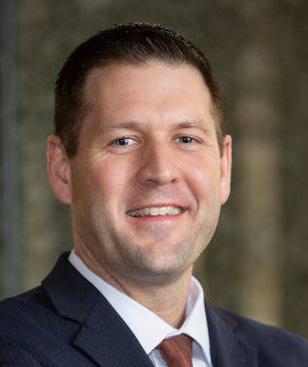
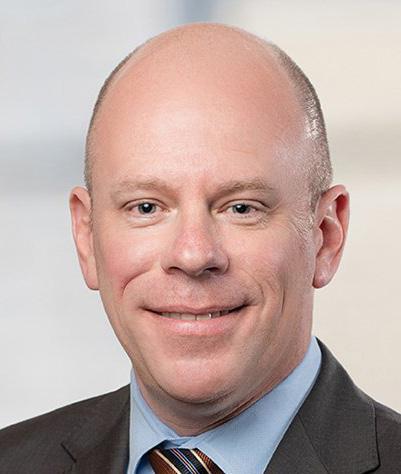
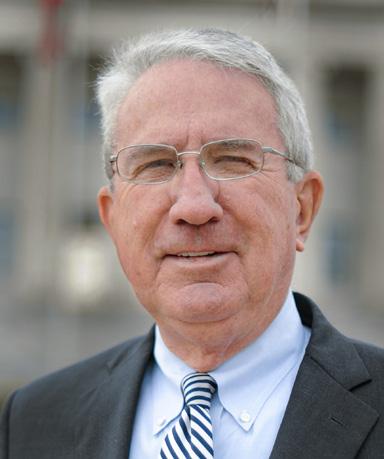
make jobs attractive enough to keep folks. They’ve got to figure out a different strategy and approach to workforce recruitment and retention. Companies have to add value in the work setting.”
Clint O’Neal, the state’s new director of the Arkansas Economic Development Commission, said companies investing in Arkansas are adding that value. Expansion projects have been announced by Apptegy (technology), Camden Timbers (timber and forest products), Owens Corning (building and construction materials) and RelateCare (health care), each of which will add hundreds of jobs with competitive pay and benefits across several industries, he added.
O’Neal said workforce development and education are two of the top priorities in the new administration, noting the launch of a new “workforce cabinet” and the “Career Ready Diplomas” program, part of Gov. Sarah Sanders’ recently passed LEARNS education package.
“When we have workforce education programs that can increase wages and family incomes, that leads to solid economic development,” O’Neal said. “At AEDC, we stay focused on championing businesses so that Arkansans have an opportunity to work. The new administration is making connections between our workforce development and economic development initiatives.”
Mervin Jebaraj, director of the Center for Business and Economic Research at the University of Arkansas Walton College of Business, said businesses in Arkansas should expect a prolonged workforce shortage. To keep them, workers will have to be incentivized, he said.
“Businesses will have to focus on the people they have. That’s going to be a huge part of it.”
The worker shortage in Arkansas is particularly acute in health care, mostly in rural areas where doctors and nurses are needed the most.
Baptist Health CEO Troy Wells calls it one of the state’s greatest challenges.
“Access to health care providers is very low in Arkansas relative to other states, and our rates of chronic disease are as high as anywhere in the country,” he said. “This puts stress on our existing health care providers and frequently prevents Arkansans from getting the care they need.”
The impact on a community not properly served through health care is obvious in terms of health outcomes. But there’s an economic component as well. Wells said providing health care to a community is a labor-intensive proposition, and when the economy is doing well, labor costs in health care tend to inflate faster than they do in other industries.
In other words, it’s an economic Catch-22.
“So, while we have disproportionate rates of cost increases, there is pressure to reduce the cost of care and to lower overall health care spending,” Wells said. “A large percentage of the cost and spend is in the hospital setting. While costs continue to rise,
payment rates continue to fall behind. This means we have to adapt new payment models, and to do that we must be able to change how we deliver care.”
And to change the mode of delivery, an industry can’t be shackled by a workforce shortage. The Baptist Health network entails more than 250 locations across the state and eastern Oklahoma with 11 hospitals and more than 100 clinics and includes Baptist Health College Little Rock. Originally a nursing school, BHC is sending out an average of 360 graduates from nine distinct programs into the health care workforce.
Those programs include medical laboratory science, nuclear medicine technology, traditional nursing, practical nursing, occupational therapy assistant, patient care technician, radiography, sleep technology and surgical technology.
Wells lauds the influx of BHC grads into the workforce but knows it’s not enough to fill, for example, a 20 percent vacancy rate for bedside nurses.
“Despite all these challenges, we are constantly evaluating how to expand access to care and opportunities to partner with other providers,” he said.
Baptist’s partnership with the University of Arkansas for Medical Sciences aims to create more in-state physicians through a competitive residency program at Baptist Health Medical Center-North Little Rock. It currently offers residencies in psychiatry, internal medicine, family practice and obstetrics.
Baptist has also partnered with the Little Rock School District and Southwest High School through the Baptist Health Academy, which aims to attract high school students to the medical profession.
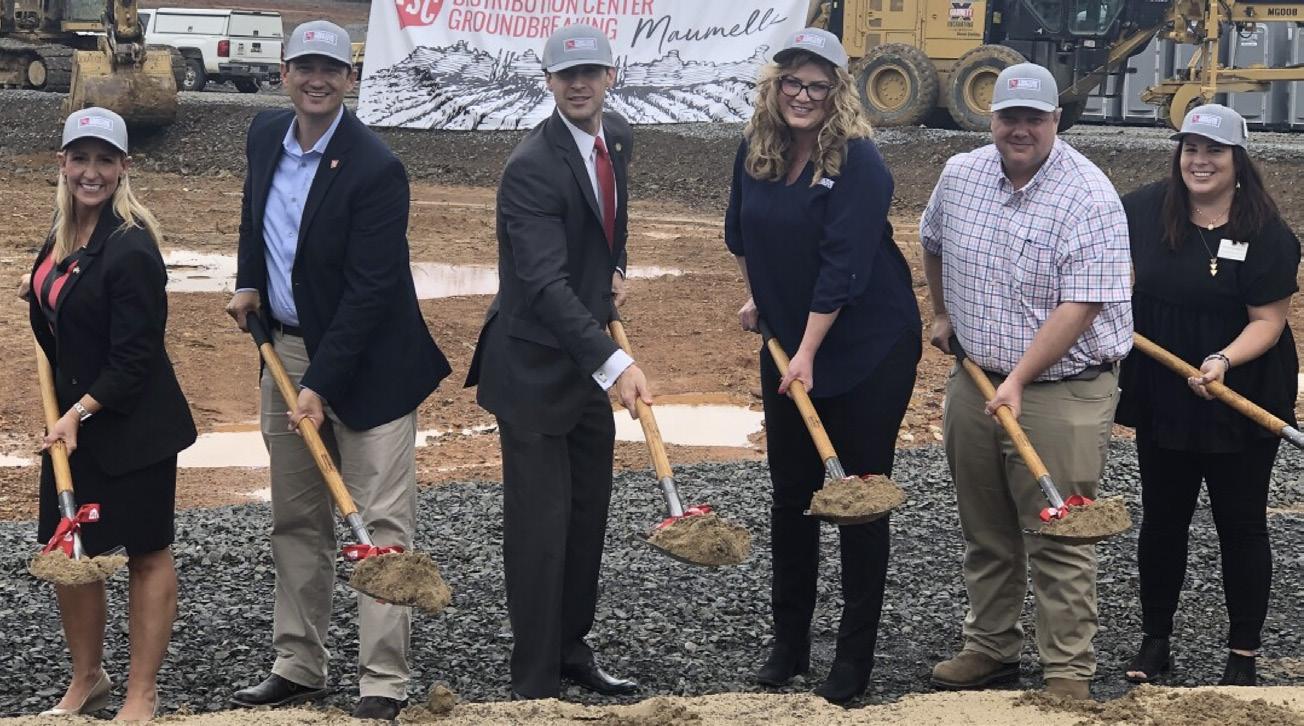
Zook stressed that Arkansas — and the nation — can’t afford to let kids drop out of school without being trained or equipped for a job.
“We can’t afford to indulge in that any longer,” he said. “We need to have kids coming out of school equipped to join the workforce.”
Little Rock sits at an opportunistic threshold when it comes to enhancing tourism, replete with individual attractions but wanting in areas of infrastructure and cohesion. Such are the findings of the Little Rock Convention and Visitor’s Bureau’s recently released 10-year Master Plan, the farthestlooking blueprint produced in the organization’s history.
“[The plan] is seeing Little Rock through a visitor’s lens,” said Gina Gemberling, LRCVB president and CEO. “The motivation behind it was as an organization coming out of the pandemic and how it changed so many things within our industry. We felt it was the perfect time to engage an outside organization to come in and work with us to get their feel for where Little Rock is going in the future and what potential might be there.”
The plan, completed over about a year, was conducted by New York-based JLL Global Tourism and Destination Advisory, which conducted extensive interviews with local stakeholders. This input played a critical role in the final plan and its recommendations for the future.
“Worth noting is the level of community and stakeholder interest and support in this project,” said Bethanie DeRose, JLL senior vice president. “We do these all over the place, and when you invite people to focus groups or invite people to join advisory committees to be part of a plan, you get different kinds of turnout.
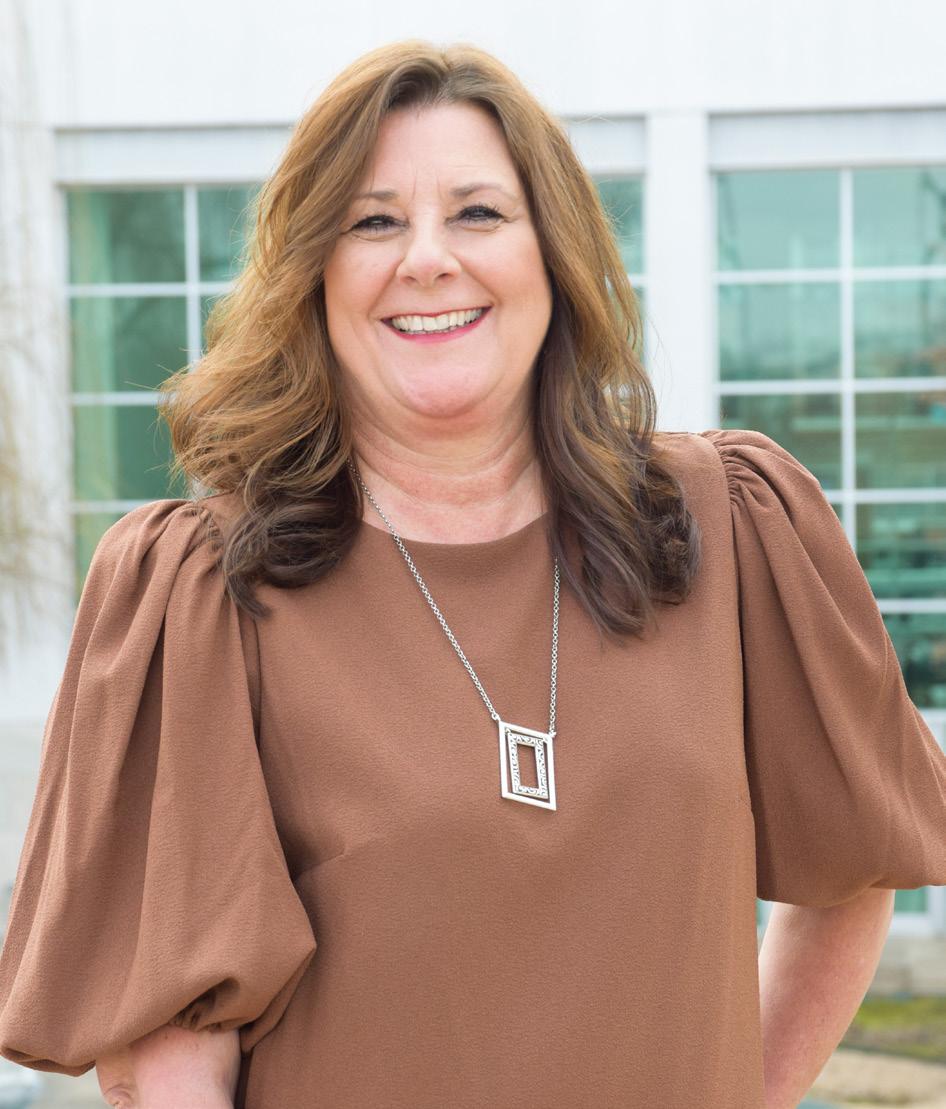
“I would say in Little Rock’s case, we had great turnout throughout. There was high interest from the very beginning that this was a type of project that was intended to have a longer shelf life and that could heavily impact the community over the course of 10 years.”
The LRCVB is unique in that it operates several properties, including the Statehouse Convention Center, Robinson Center, Cromwell Building, several downtown parking decks in the River Market, Ottenheimer Hall, First Security Bank Ampitheater and the pavilions. A full 21 percent of the state’s tourism dollars were spent in Little Rock in 2021, $1.6 billion worth.
Jim Keet, chairman of the parent organization Little Rock Advertising & Promotion Commission, said coming on the heels of the unprecedented events of the pandemic, the new 10-year plan seeks to learn how to improve as it charts new and different paths forward.
“We’re doing a very good job as compared to other CVBs across the country,” he said. “The process for this plan was very positive. It wasn’t one of those, ‘We’ve got to hire a consultant because we’re screwing up so badly, we’ve got to fix it.’ It was, ‘We got a wonderful foundation that’s been laid over the last couple of decades. How do we get even better?’”
Through the interviews and focus groups segment of the plan, four common themes emerged. Participants agreed more investment is needed to create
a multi model transportation network, making various attractions more easily accessible and the need for improved marketing resources for businesses, allowing them to better connect and create placemaking opportunities for visitors. Stakeholder input also pointed out a need for better use of the area’s natural spaces to boost visitor numbers and developing a consistent brand identity for Little Rock as a destination.
From this input the process identified nine action areas:
• Product development: Identify and develop new tourist attractions and improve or create facilities for hosting certain events.
• Tourism infrastructure: Improve or create connectivity and transportation options to sites around the city.
• Placemaking: Development of green spaces, trails and other public and open spaces.
• Targeted marketing: Leverage data to ensure marketing efforts and messaging are reaching the right audiences in the right way.
• Enhance the visitor experience: Ensure visitors are afforded concierge-like treatment while here.
• Optimize the Statehouse Convention Center and Robinson Performance Hall.
• Community engagement: Devoting resources to equip local constituents and community stakeholders in the process of promoting Little Rock from within.
• Destination perception: Through positive storytelling and partnership with Little Rock Police Department efforts, improve overall perception of the city as a safe place to visit.
• Breaking down barriers: Ensuring principles of equity, inclusion and diversity are incorporated into every aspect of tourism promotion and event creation.
“Several of the things in the plan we were expecting in some respect, although maybe not to the magnitude that’s in the plan,” Gemberling said. “There are several items and priorities in this plan that we knew were outliers, but we just couldn’t put our finger on. I think this plan really helped us with that, by identifying these nine priorities and recommendations.”
Gemberling said much of the immediate work will be internal, such as identifying potential funding for the needs outlined in the master plan. However, two external elements will be more conspicuous to the public this year, she said.
“One thing you’ll see coming quickly in 2023 is innovation at the Statehouse Convention Center,” she said. “During the COVID pandemic, several of our capital projects were put on hold, not knowing what was happening in our industry and our business. For the facility to remain competitive, we do have substantial renovations scheduled for the Statehouse Convention Center; you’ll start to see them within the next few months and, depending on timing and getting the contractors in, through 2024.”
DeRose called those efforts, as well as maximizing the other spaces under the LRCVB’s scope of responsibility, as one cornerstone for improving and enhancing the level of tourism overall. At the same time, she said, event spaces don’t operate in a vacuum but must take into account such things as availability of hotel room inventory sufficient to handle the additional demand that comes with more events.
“For the facilities at the Statehouse Convention Center and the Robinson Center that the LRCVB operates and is responsible for selling and booking and managing, we applied our convention center optimization analysis,” she said. “We looked at history, we pulled every day that the building was used, every space that was used, by every group that used it for a five-year history. We had a pre-COVID look and then a little bit of the mid-recovery look. We could better understand how the space has been used, and was there room to increase that output.
“We found that one, there was room to increase that output, which is not unusual in our industry to see convention centers with room for growth. But we also had some constraints, because we have to look at our hotel landscape and how much inventory we have there. This plan, and the subsequent business plan that the LRCVB and team worked on, can really start to put one foot in front of the other in terms of how we move the ball forward from a sales and marketing perspective to add to that usage.”
The second immediate focus falls under placemaking and is related to the opportunities at hand downtown as a result of the I-30 highway and bridge improvements currently underway. The new configuration eliminated several on-
ramps, freeing up ground for as-yet undecided use. The plan advocates developing the space as a large park and public event space “an opportunity for iconic placemaking in the heart of the destination.”
“Having 18 acres of green space right in the middle of our downtown area provides so much potential there,” Gemberling said. “I think the stars are aligning how we, as a city, can transform those 18 acres, and how can we better utilize that to service our visitors and make sure our visitors have a pleasant experience.”
The LRCVB is not alone in its desire to see the ground used for greenspace, and while no final decision has yet been made on the part of the city, proponents got a bit of good news in February. City officials announced receipt of a $2 million federal grant for development of a deck park over I-30 between 6th and 9th streets, improving access and connectivity in the city’s core neighborhood.
This follows the ongoing development efforts of the Southwest Trail, a cycling route that will connect Little Rock to Hot Springs via an off-traffic trail similar to the Razorback Greenway in Northwest Arkansas. Marketing such integrated greenspaces, both natural and man-made, naturally dovetails into tourism marketing, Gemberling said.
“A key to our marketing efforts, and one of our key selling points that we will be continuing to build on in the future, is our outdoor scene and how it’s connected to our downtown area,” Gemberling said. “There aren’t many destinations where you can jump on a trail right in your downtown area and be in the middle of nature within minutes. That is a really big plus for us, and we’ll continue to use that and continue to build that message in our leisure marketing efforts.”
Keet said as the plan continues to unfold and address projects and improvements over the next decade, community involvement will be key.
“Oftentimes plans are put together at great expense and great effort only to be relegated to the closet and not acted upon,” Keet said. “Part of the JLL contract is to continue working with us to make sure that we are aggressively pursuing the implementation of that plan. It’s not just, ‘Here’s your product. See ya.’
“I can say most of the time when we have a LRCVB get-together and invite the community to participate, we’ll have a predictable turnout of 50 to 60 people. We rolled this out, and we had 200 to 250 people, community leaders, local leaders, leaders from the state. And we have received nothing but strong endorsements of the plan and the direction that we’re heading.
“I guess what I’m saying is, if you don’t have a good plan, why would people want to participate? But if you have a great plan, that inspires people to want to be involved, to contribute and make sure that it is successful. I believe that’s what we have.”
Just a couple of months ago, the University of Arkansas gained a new chancellor when Charles F. Robinson took the helm following a unanimous appointment by the board of trustees. Robinson, after serving as interim chancellor since Aug. 16, 2021, became the university’s seventh chancellor this past November. His appointment checks all the boxes needed to help lead the state’s top academic and research facility: Experience, check. Leadership skills, check. Passion for the job, check. Hogs fan?
“I think that’s a requirement,” Robinson said with a laugh, although he admits he wasn’t yet on the Hogs bandwagon when he made his way over from Texas in the late 1990s. However, he has seen the light since then, and he’s all-in, both for sports and for every other facet of the university.
Having started as an assistant professor of history at the U of A in 1999, Robinson has enjoyed a long-time partnership with the school. In those 23 years, he has been promoted to various positions, including director of African and African American Studies, vice provost for diversity, vice chancellor for Student Affairs, provost, executive vice chancellor for Academic and Student Affairs and interim chancellor.
A couple of weeks after being named chancellor, Robinson sent out a public memo to the University of Arkansas community in which he stated “I assure you that I have emerged from this search reinvigorated and ready to get to work.” The
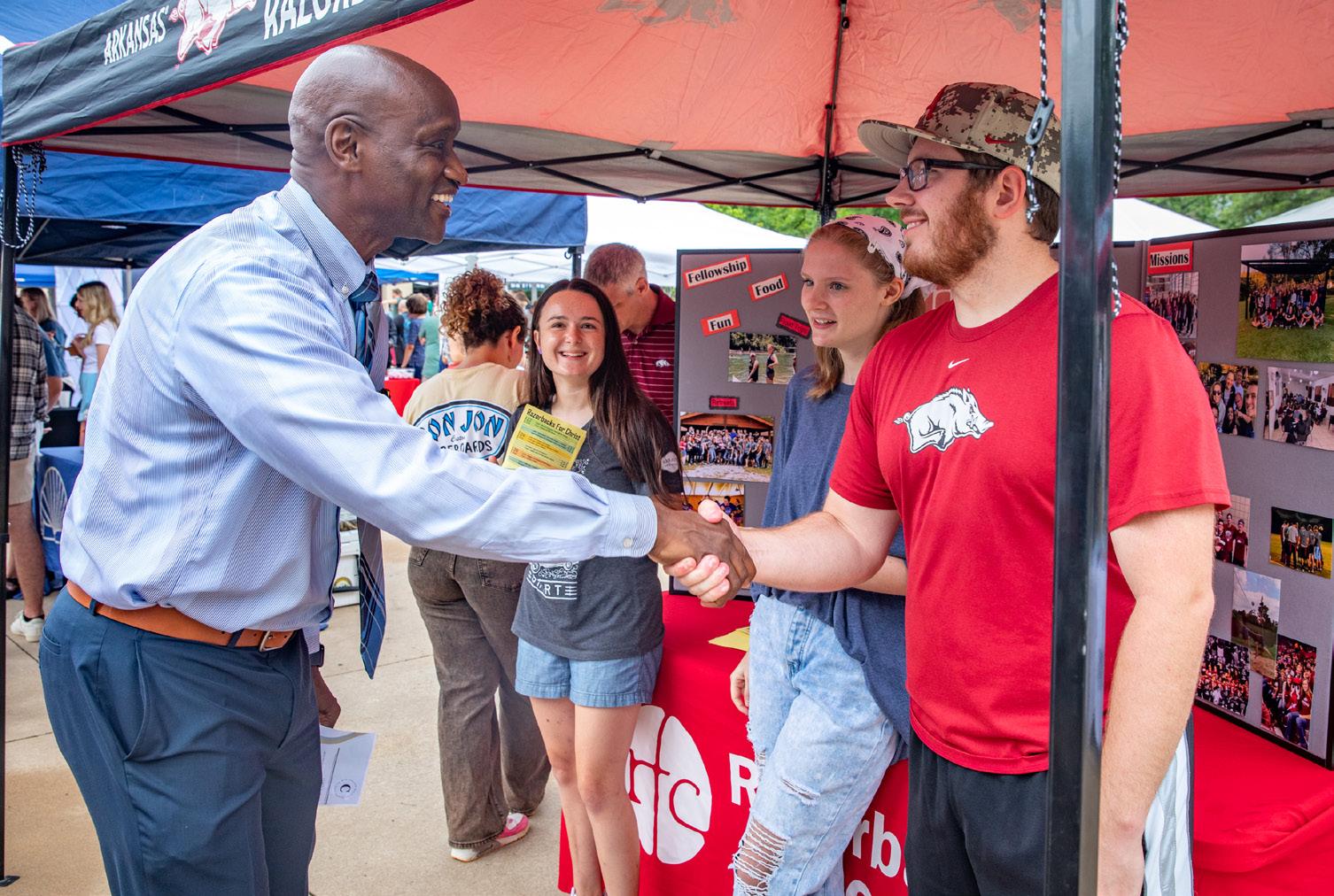
selection process, it turns out, had been quite an exhausting challenge.
The long and rigorous search for a new chancellor hit the home stretch in September 2022 when the U of A narrowed its high-quality pool of applicants
to four finalists, each one a proven leader and each one with a specialty that could benefit the school. All applicants were fully and scrupulously vetted, and each visited the campus for multiple day meetings with students, faculty, staff and university stakeholders, as well as participated in a livestreamed public forum. By October, the search was down to two applicants, and then finally in November, the board of trustees unanimously appointed Robinson as chancellor.
Robinson said he learned a lot about his community and about himself during the search. He found that he was wellsupported by the campus community and its external alums. The many messages he received during the search process reaffirmed his sense that he was in the right place and that it was the right thing to press on.
“The outpouring of support, for me, was really defining,” he said. “When you come through something that’s trying –and it’s not just me – but if you look at the figures in American history, and you go through something that’s trying, and you emerge out of it, it does give you a sense of renewed hope that anything is possible. Everything is possible. And you can move forward towards bigger and better things.”
You can’t take the history out of the historian. Robinson, who started his academic career as a history teacher, continuously draws lessons from history. He leans into the concept that the whole trajectory of the United States is about constant improvement, and that people are in constant motion. We may not reflect on each day or even each year as positive growth, “but if you look at the whole gamut of our history,” he said, “it’s one in which you can see progress, and so, I’m hopeful.”
The encouragement he received during the search and immediately after his appointment allows him to “galvanize that support and push the university to greater heights.” A self-proclaimed glass-half-full kind of guy, Robinson plans to rally his community to become the type of community people say they want to see.
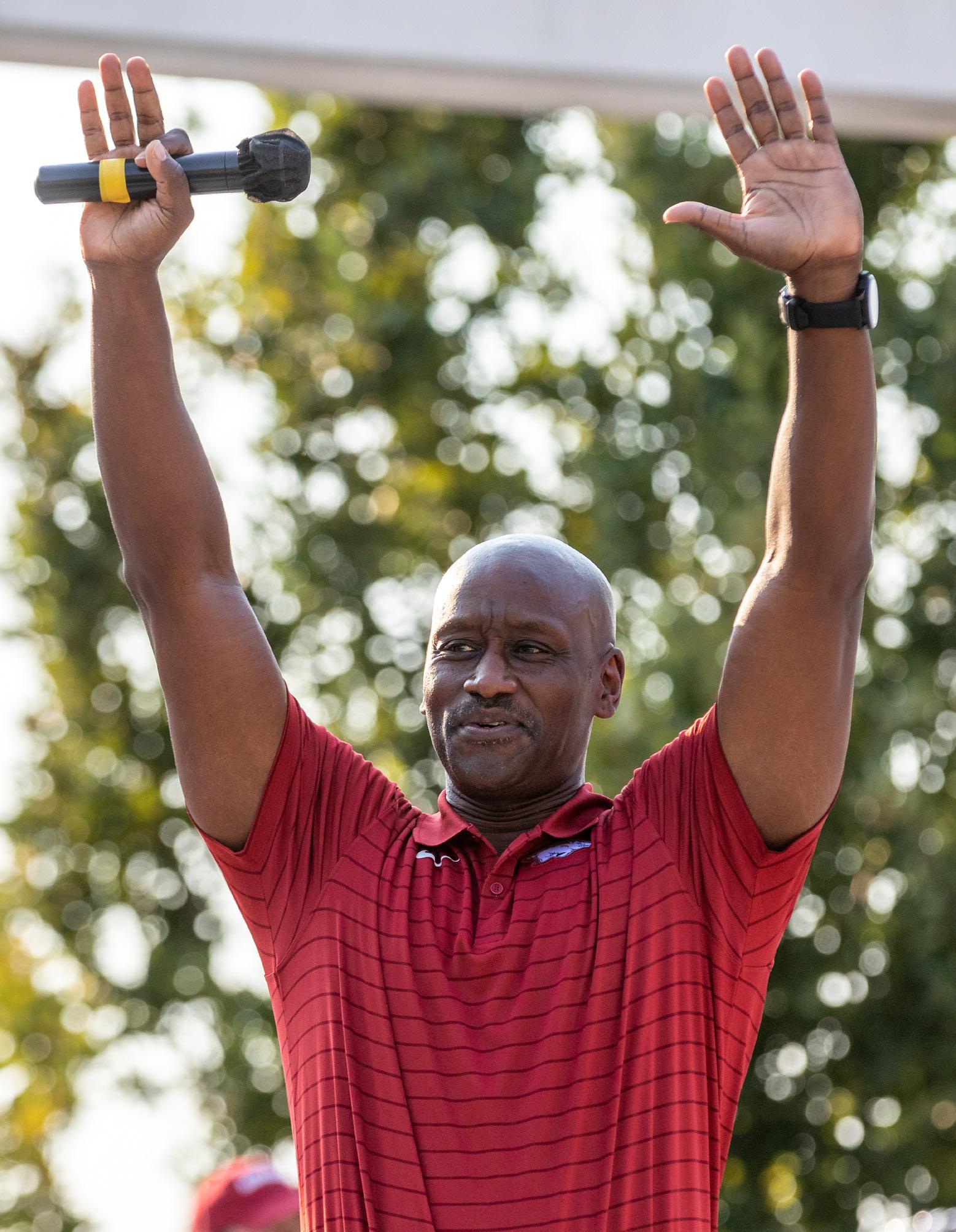
“We have power. We have agency. We’re not simply the products of our setting or a coincidence,” he said. “We can create the outcomes we want, and we have to work together to do that.”
And because Robinson knows optimism is infectious and that people need to believe that positive change can indeed come before they can actually strive to achieve it,
he makes it a point to spread encouragement. If people can hear it straight from the pulpit, then he knows he can create a springboard for moving to bigger, better and greater heights.
Soon after his appointment, the new chancellor published a letter outlining his thoughts for the coming months. In his message he shared his “100 days
plan,” prioritizing three important goals: Advancing student success; augmenting the research enterprise and making the university an employer of choice.
In terms of advancing student success, Robinson hopes to continue to raise the number of students who successfully finish their college education. Over the past five years, the university has increased retention and graduation rates significantly.
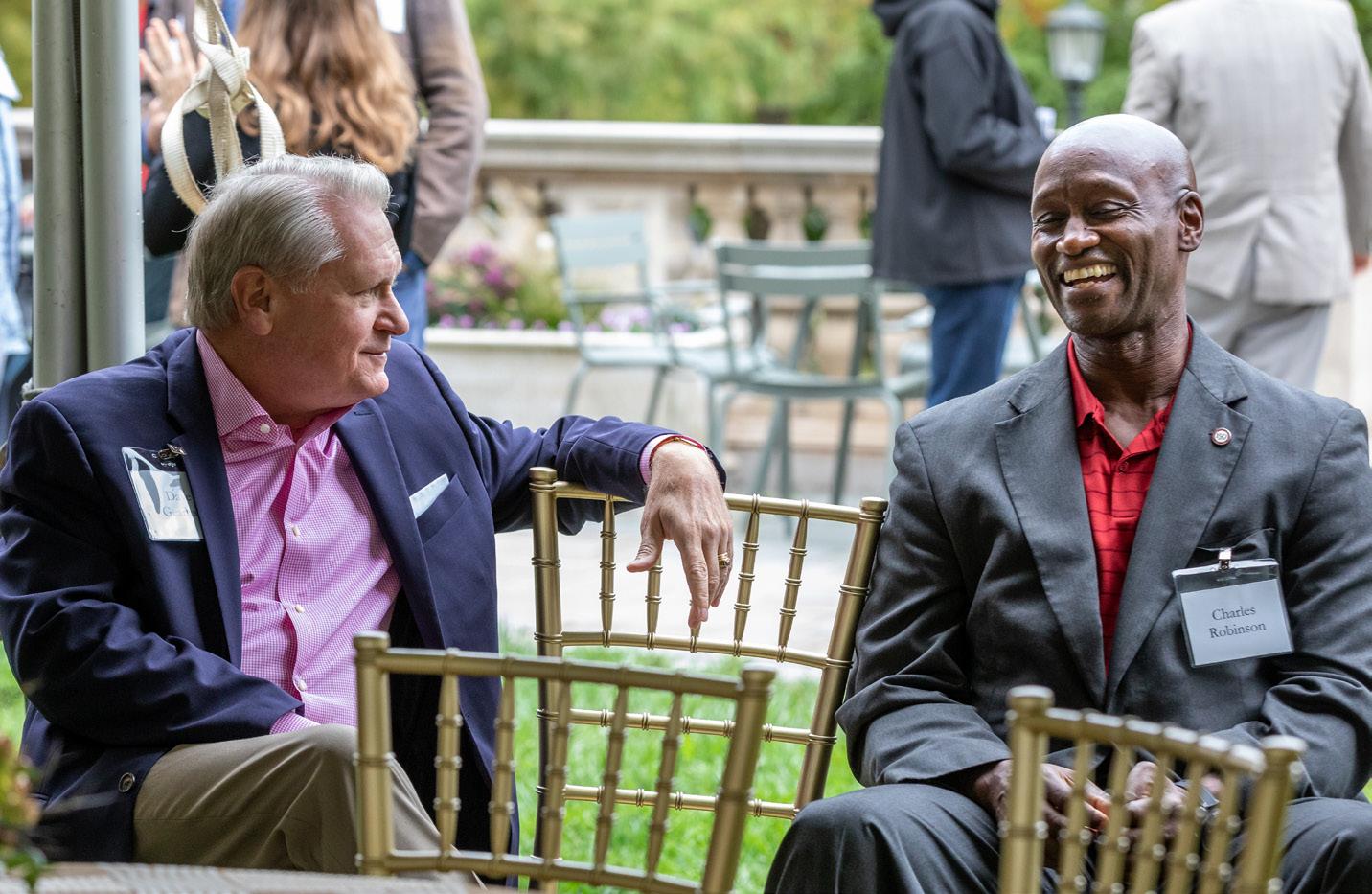
“We’re real close to being where we should be based on the academic metrics tied to the students we admit,” he said.
The numbers, he explained, are based on a predictive graduation rate versus an actual graduation rate. However, Robinson doesn’t want to simply hit the predicted graduation rate, he wants to continue to press on and upward so that retention rate and graduation rates exceed their predicted numbers.
“We know that when you look at 26,000 undergraduates, they’re not all created equal,” Robinson said. “They’re not all experiencing the same graduation rates, and we know that our Pell Grant students have a much lower graduation rate. It’s about 20 percentage points below the overall graduation rate, but that’s an opportunity for us to do something about that, to close that gap, to erase that gap, so that our Pell students have the same outcomes as non-Pell students.”
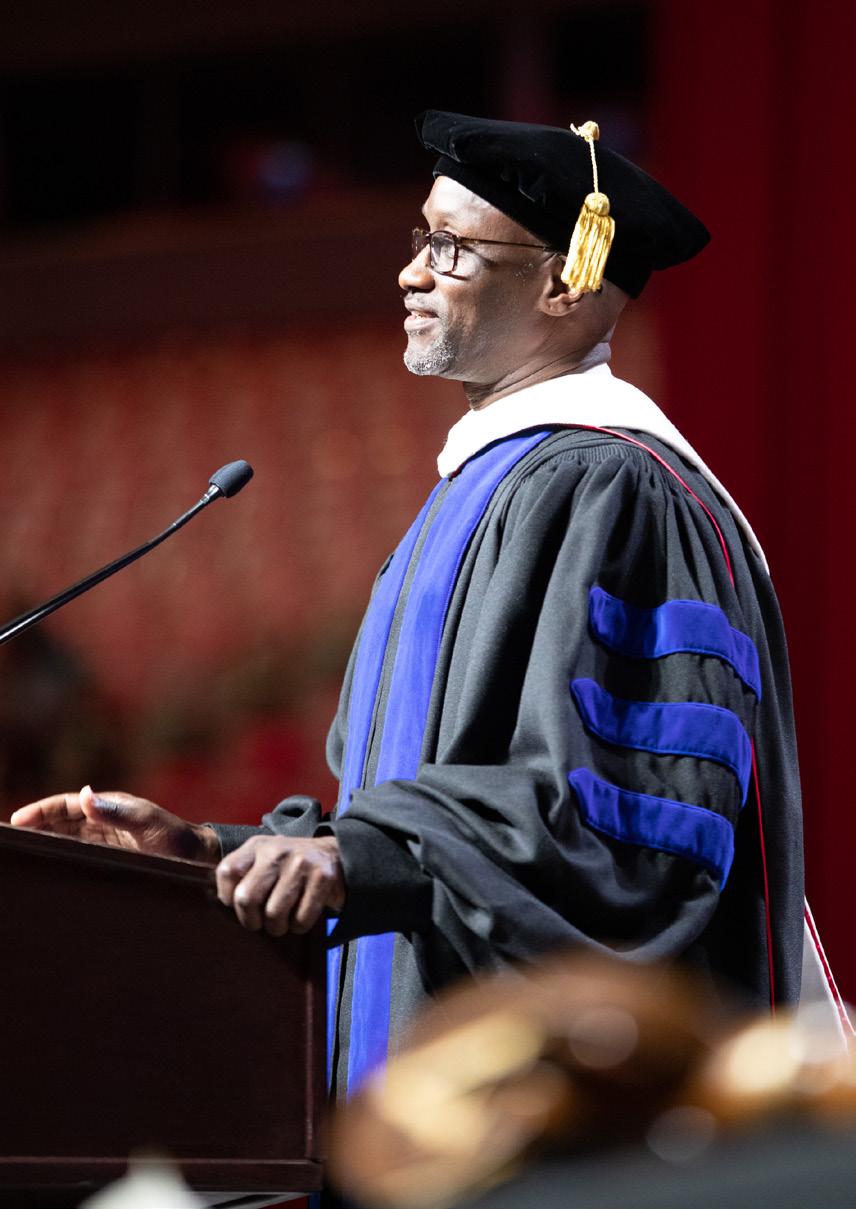
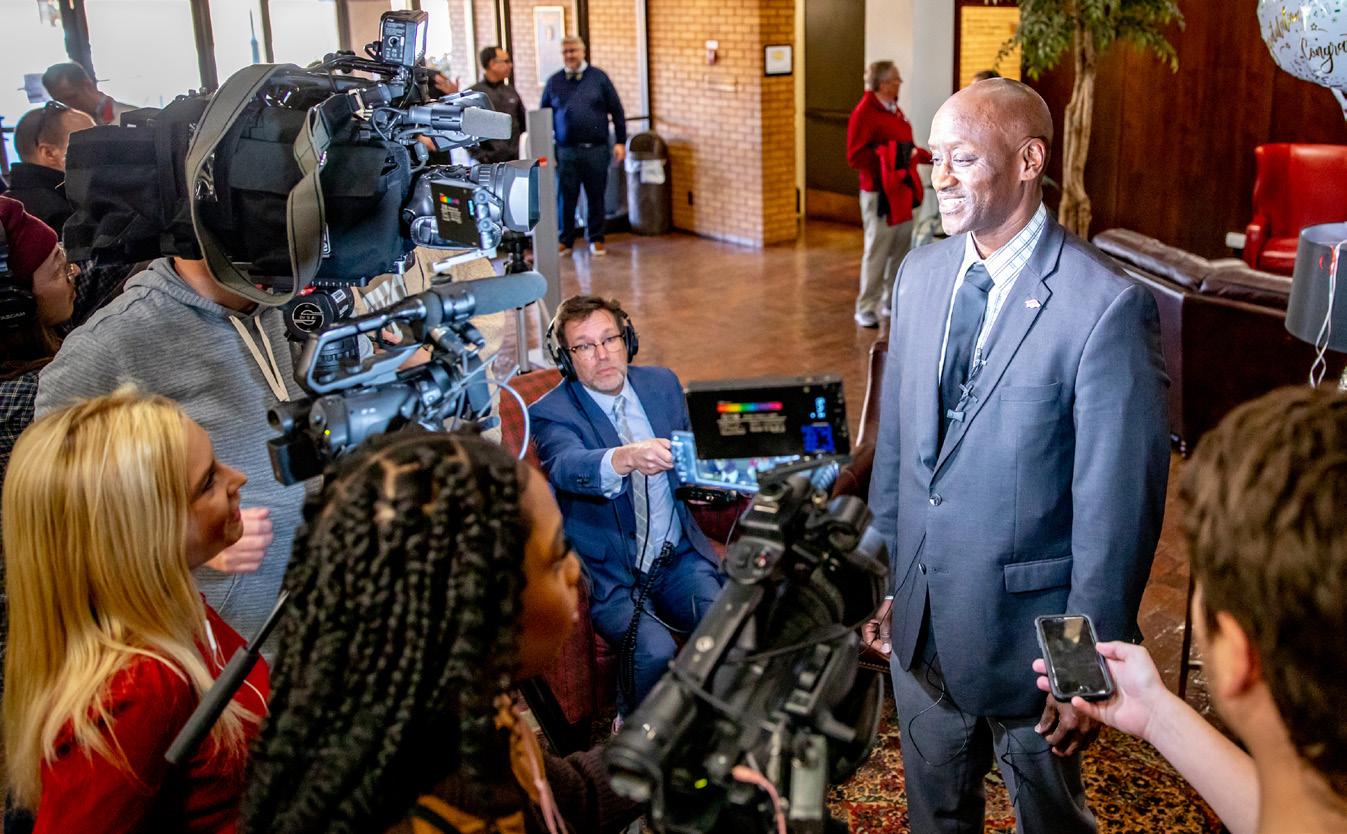
Robinson acknowledged that much of this disparity is tied to resources. Students who qualify for the Federal Pell Grant are, by definition, poor. Many of them, on top of receiving the grant have to work to pay for college, sometimes 30 to 40 hours a week.
“It’s hard to have the same outcome when you have that kind of financial burden and responsibility,” he said.
To combat that problem, the chancellor is looking to raise money for an endowment that could be tied to Pell. His team is calling it the Pell Plus. Although this eternal optimist acknowledged the difficulty in creating equal outcomes “because of the way we’re set up,” we have a responsibility to try.”
In regard to improving the school’s research enterprise, Robinson said he wants the university to remain a research one institution, which is already a great achievement, as the school resides in the top three percent of institutions nationally. But he is aware of the need to do more to expand the research grant funding for both federal and state funds and also tie research expenditures and achievements to economic development more effectively.
One opportunity he mentions is the federal CHIPS and Science Act, which just passed last year.
“We have some of the best scientists in the world who can help do research on chip production,” he said. “We have some ideas and plans around that, which I’m very excited about.”
In order to carry out these plans the school must focus on Robinson’s third major goal, making the U of A an employer of choice.
“You can’t become better unless you attract the top researchers, the top administrators and the top staffers,” he said.
To that end, Robinson is looking carefully at employee benefits, hiring practices and employee management to find room for improvement. He wants to ensure current employees feel highly valued while offering incentives that are competitive with other institutions to continue to draw in the best people.
As ambitious as that all is, Robinson said he’s actually ahead of schedule on his 100-day goals. Having been in the position of interim chancellor before his promotion, he didn’t have to do the same “listening tour” that an outside candidate would have had to do. His already-firm foundation coming into the role has allowed him to mobilize his team into strategic planning to lay out objectives and share them with the campus community.
Even with great ideas, there are obstacles. Robinson’s biggest challenge is the same one that plagues all university leaders – source management. That is, figuring out how to manage current re-
sources so that new things can be done on campus to better support more students while not raising tuition.
Fortunately, the U of A has had record enrolment in the last two years and is predicting more strong numbers this fall. High enrollment gives the school a good foundation for the resources it needs and, coupled with responsible budgeting, allows the school to keep in-state tuition and fees below a one percent increase.
Keeping the cost of higher education from rising too rapidly, thereby pricing some students out of attending, remains one of Robinson’s most pressing concerns. His passion for affordable education is palpable – especially when it comes to making college education possible for the state’s most vulnerable students .
But while relatively affordable tuition, in comparison to competing schools, could be one of the major reasons for the rising enrollment rate at U of A, Robinson believes it’s much more than that. The chancellor touts the Sam M. Walton College of Business, which has a national reputation as a business school, in
addition to many other impressive programs.
“I also think it’s our brand,” he said. “When students come here, and they have good experiences, they become our best ambassadors. I think we’re hot! Our reputation is growing. Our brand is growing. People like to feel like they’re getting a bargain, and for many, when they learn who we are, what we are, what we charge – my goodness they feel like this a great deal!”
Competitively low tuition, nationally recognized programs, top research departments and popularity are great, but Robinson said they “can’t rest on that.” He doesn’t want to get stuck merely thinking about the past or the present, lest the institution miss out on the future. Moving forward with hope seems to be the new chancellor’s creed.
“As a historian, I know that everybody has a dash,” he said referring to the idea that our lives are reflected by a birthdate a death date and, in between, a dash. “The real question for us is, what are we going to do with our dash? I want the dash to be a placeholder. I want it to be filled with hope and with examples of how we help transform people’s lives, of how we really deepened our connection to our land grant mission and how we served our state of Arkansas better.”
“I think the University of Arkansas is a special place, and we do a lot that we don’t talk sufficiently about, and we need to talk more about it. Not for selfaggrandizement, but because those good stories offer people a sense of the hope and the opportunity that they can experience if they join us. And so, I don’t want us to hide our good news under a bushel. Our light needs to shine from a hilltop, and we’re going to try to make sure that happens on my watch.”
“If you go through something that’s trying, and you emerge out of it, it does give you a sense of renewed hope that anything is possible. Everything is possible.”

An Oxford University study of the U.S. economy predicted that in the next 25 years, about 47 percent of current jobs will disappear due to automation and artificial intelligence.
“That means entire sorts of jobs will not be necessary anymore,” said Dr. Stephen Addison, dean of the College of Natural Sciences and Mathematics at the University of Central Arkansas in Conway. “Technology and automation have been with us a long time. While technology has typically resulted in the elimination of some types of jobs, historically it has ended up creating even more new jobs. There is often a lag in that, but I fully anticipate new jobs and different types of jobs will start appearing.”
Addison sees the current layoffs at large technology companies as an aftereffect of the pandemic. Employers hired more tech employees when a vast majority of work moved online. Many businesses were using Zoom conferencing online, and more customers were shopping online. Now that everything is opening back up, people have shifted back to the normal mode of interacting and shopping, leading to some job losses in the big tech companies.
Technology has changed so rapidly in the past decade, and particularly during the pandemic. Has it reached an apex, or will we continue to be astounded at the new uses of technology? Addison expects the pace of changes to oc-
cur faster and faster. And he said it is critical for Arkansas to train workers to be ready for those new jobs.
“The state has received a $20-million National Science Foundation grant matched by $4 million in state funds to produce a workforce in the area of data science, which is really, really important,” said Addison, who is one of the co-leaders of that project. “We are working with industries to make sure we fully understand what their needs are today and in the future. We are developing programs across the state at two-year colleges and four-year universities to prepare students for heavily data-driven careers that will be present in the future.
“We are creating the infrastructure to educate people for the jobs of the future. With all the technology companies we have in Arkansas such as Walmart, Dillard’s and J.B. Hunt, it is going to be really important for them to be able to hire workers with the right technology skills.”
The pandemic forced teachers to rethink how they taught their classes. When everything went online, people had to figure out how to use these tools most effectively. In some cases, they found the new tools were very beneficial, so they have continued using them online or in the classroom.
“These days instead of teaching abstract concepts, we put students to work learning how to use the technologies,” Addison said. “It makes things in the classroom more like what they will be doing in the modern workplace. The modern economy is being driven by the need to be economically competitive by automating at ever accelerating rates.”
Most people have experienced frustration dealing with bots for customer service. Bots often don’t give answers to simple questions. But just in recent months, bots have become much more capable.
“ChatGPT has been discussed widely in the news recently,” Addison said. “It is a new bot that will write essays for you. It is an example of a far more advanced AI system. It basically does tend to answer the questions you have. It does some things really well. It is really good in a wide variety of areas. It can interface with other technology to automate even more processes. Some of the things I have experimented with are using ChatGPT to create web pages, write computer programs and blog posts. Bots are getting better and better.”
UCA is an Apple Distinguished School, the only one in Arkansas for higher education and one of only a few across the country. Dr. Victoria Groves-Scott, UCA College of Education dean, said this prestigious designation allows the school to use iPads and other types of mobile technology to prepare future teachers to embed technology in the classroom.
“It is about using the technology to engage K-12 students to give them a voice and choice, including teachers creating videos to teach subjects like history and science,” Groves-Scott said. “In one collaboration, fourth grade math students are engaging with math educators at the university using video technology and answering questions. Children are getting coaching on how to approach math or science problems. Students are using iPads, smartphones, and videos at a very, very early age. We are just taking a child’s natural curiosity and expanding it to create learning spaces.”
Groves-Scott said it is exciting to see that technology-based education can help meet students where they are at in their development, whether they are struggling, learning at a normal pace or gifted. If a high school student needs additional support in a physics class, there are online modules that can help. For advanced students, personalized video instruction gives them more opportunities.
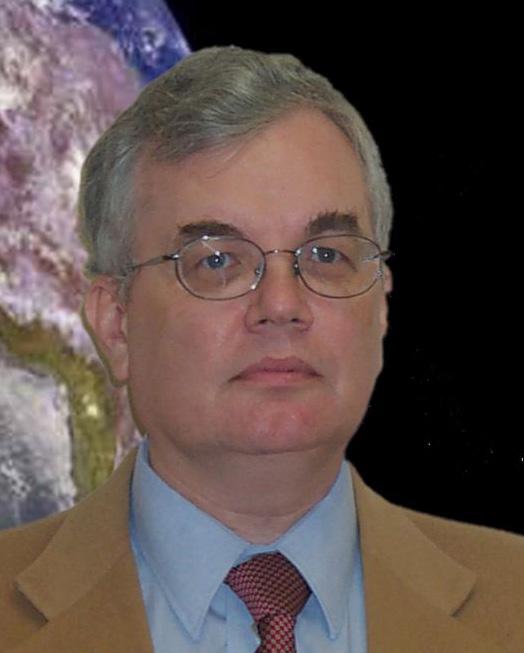
Groves-Scott has a background in special education and has been amazed at how students who struggle to speak can be fluent on a communications device.
“People thought for years these kids had limited intellectual abilities,” she said. “Give them a communication device, and you are stunned at how bright they are and what they can do. The teacher has to really moderate it and be trained to use the technology. It is a real skill. It is a science. When it is applied correctly, it expands the horizon of the classroom.”
She sees this work being vital to preparing students for a wide range of jobs.
“We have to make sure we are preparing our children in Arkansas to be competitive in all job markets when they leave school,” Groves-Scott said. “The other issue is equity. We have to make sure all of the children in Arkansas have access to technology. If we don’t do that, we will see the gap widen. Broadband is really important
in rural areas across Arkansas, and we need to make sure all of our students in all of our schools have access to technology appropriate for their age group. It is good for all of us because it creates a better workforce and prepares us for the future.”
Increasingly, some technology training is necessary for nearly any job. Particularly in an era when skilled worker shortages are widespread, efficient tech training specific to industries is critical. The University of Arkansas Community College at Morrilton (UACCM) has a niche for customized training, said Workforce Development and Education Dean Jessica Rohlman.

“Skilled trades today are higher skilled jobs that utilize technology in new ways,” Rohlman said. “Skilled trades are not the ‘dirty jobs’ of our past. Don’t get me wrong. Some of them are still tough jobs that are in the environmental elements, but there is a higher technology skill set now required in the skilled trades industries.”
UACCM can design training around skillsgaps a company is seeing and help to fill those gaps. Rohlman said they work closely with companies to customize trainings by meeting with their leaders and touring their facilities so the instructors can get some first-hand knowledge of what is needed.
“We work to align the customized and short-term trainings with the degree programs, where applicable, so that if students later decide to pursue their degree, then credit may be granted for some of the trainings they have already completed,” Rohlman said. “When industry comes to UACCM with a need, we are able to quickly respond with short-term, non-credit training as long as resources/equipment is available.”
UACCM commonly offers customized trainings in safety, HVAC troubleshooting, electricity, hydraulics and pneumatics, various welding processes, motors and systems controls, programmable logic controls as well as other manufacturing industry areas. Their short-term, noncredit trainings offered on a regular schedule are entry-level Commercial Driver Training (Class A and B), horizontal directional drilling, heavy equipment operations and welding.
Rohlman said UACCM provides high-quality training in a state-of-art facility with equipment that meets industry standards (not simulators) while keeping training affordable. The school hires trainers and instructors from the industry.
“It’s not important for these trainers/instructors to have a formal education,” Rohlman said. “We want them to have industry experience so they can teach/train in a real-world setting providing training that will prepare students for the workforce they are entering. Many of our trainings are designed around providing the opportunity for students to learn a skill that will help them get a job to earn a good living wage. The trainings are for high-demand, high-wage jobs in most cases.
“The costs are not only less than a four-year but are also significantly less than the independent training facilities.”
Arkansas Construction Education Foundation
Little Rock
Arkansas Elite Welding Academy Quitman
Arkansas Northeastern College (ANC)
Blytheville
Arkansas State University Mid-South West Memphis
Arkansas State University Three Rivers Malvern
Arkansas State University- Beebe Beebe
Arkansas State UniversityMountain Home (ASUMH)
Arkansas State UniversityNewport (ASUN)
Mountain Home
Newport
Arkansas Tech University- Ozark Ozark
Arkansas Welding Academy
Baptist Health College Little Rock
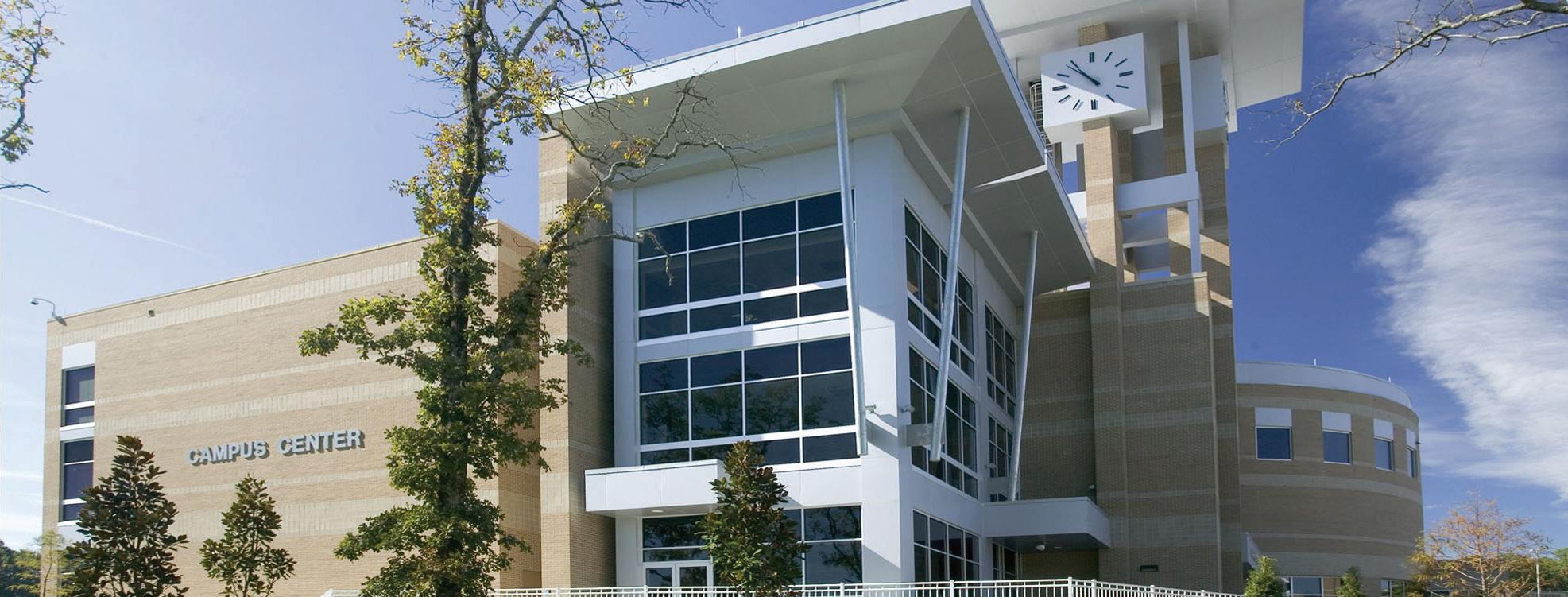
Black River Technical College (BRTC)
Black River Technical College (BRTC)
Jacksonville
Little Rock
Paragould
Pocahontas
Business and Industry Training Bethel Heights
Cossatot Community College of the University of Arkansas
East Arkansas Community College (EACC)
National Park College
North Arkansas College
De Queen
Forrest City
Hot Springs
Harrison
NorthWest Arkansas Community College (NWACC)
Northwest Technical Institute
Ozarka College
Bentonville
Springdale
Melbourne
Phillips Community College of the University of Arkansas West Helena
South Arkansas Community College
Southeast Arkansas College
Southern Arkansas University Tech (SAU Tech)
Ultimate Technical Academy
United Welding Institute Inc.
University of Arkansas at Monticello- College of Technology
University of Arkansas at Monticello- College of Technology
University of Arkansas Community College at Batesville
University of Arkansas Community College at Hope-Texarkana
University of Arkansas Community College at Morrilton
University of Arkansas Community College at Rich Mountain
University of Arkansas Pulaski Technical College (UAPTC)
UAPTC-Culinary Arts and Hospitality Management
El Dorado
Pine Bluff
Camden
North Little Rock
Pottsville
Crossett
McGehee
Batesville
Hope
Morrilton
Mena
North Little Rock
Little Rock
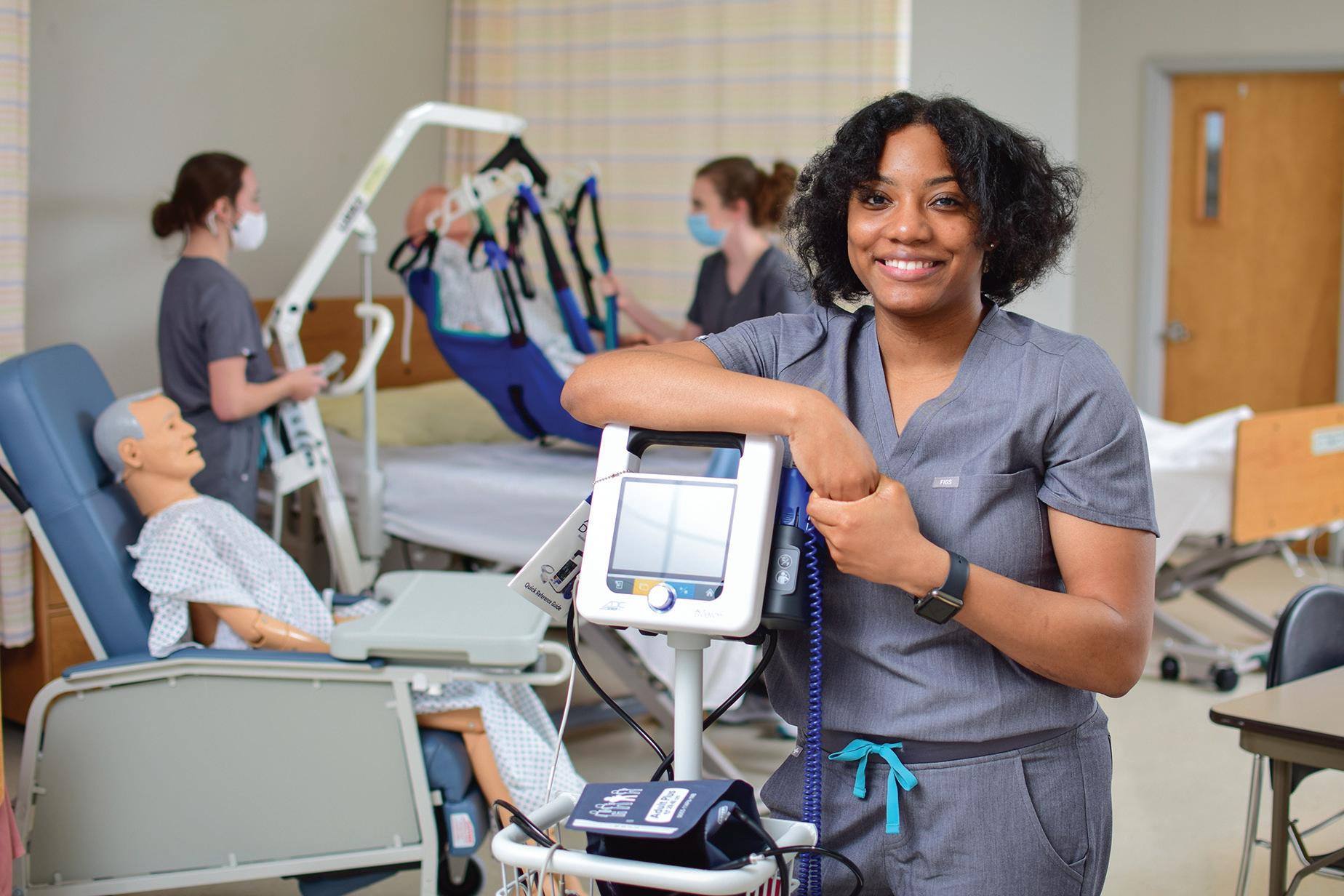
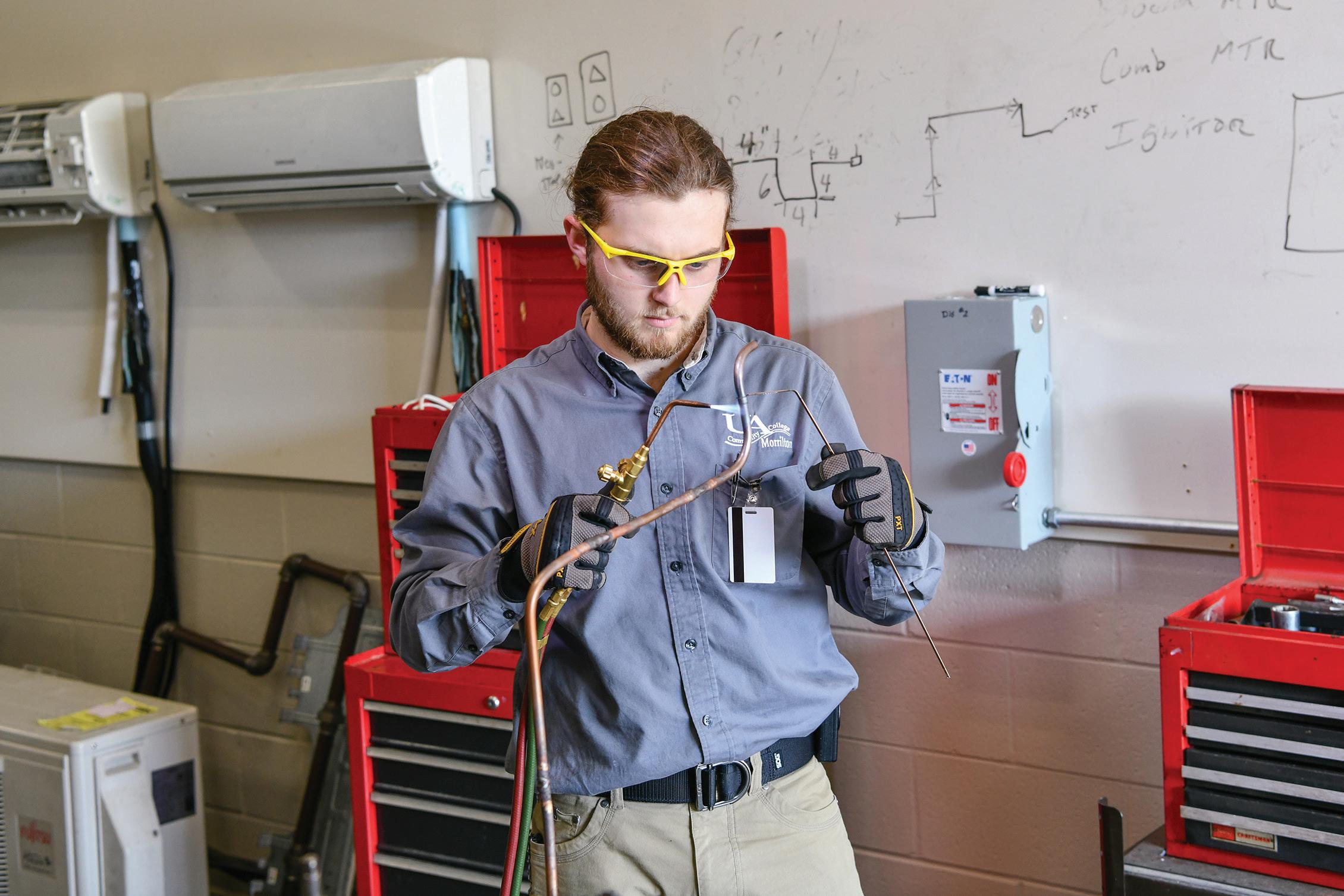










 Mike McKinnis on the set inside JM Associates’ Fish Factory in downtown Little Rock.
(Photo by James Overstreet)
Mike McKinnis on the set inside JM Associates’ Fish Factory in downtown Little Rock.
(Photo by James Overstreet)
The Fish Factory, as it’s affectionately called, the words etched in stone above the Romanesque revival entrance to its handsome brick façade, looks like anything but what the name implies.
The two-story building in downtown Little Rock’s SoMa neighborhood hides in plain sight, passersby almost certainly unaware that inside its walls, one of the nation’s leading producers of outdoor TV programming is humming like a beehive. The company co-founded and built by the late Jerry McKinnis — the company that helped build ESPN — indeed is humming right along with son Mike McKinnis at the helm of JM Associates.
Each year, thousands of hours of production go into JM’s portfolio of outdoors TV programming, which includes shows about bass fishing, shows about saltwater fishing, air racing, boat racing, lumberjack sports, sled dog racing, even racquetball. And that includes hundreds of hours of live coverage.

The Little Rock firm’s handiwork is seen on ABC, ESPN, CBS Sports, Fox and FS1 among other networks, and the Fish Factory just entered the busiest season of what always is a busy year: Bassmaster season.
Mike McKinnis is the local lead at JM, the company co-founded by his father, Jerry, more than 40 years ago. Though JM was sold to the Anderson Media Group in 2017, Mike remains in charge on the ground at JM. In fact, Mike was running the business’ day-to-day ops long before Jerry died in 2019 at age 82.
Anderson Media Group’s hands-off approach to ownership has ensured that operations don’t skip a beat, and those ops annually build up to the Bassmaster Classic. For JM’s team of roughly 40, split evenly between full-time onsite employees and freelance contractors, the Bassmaster Classic is its March Madness, literally and otherwise.
JM produces coverage of the three-day event, which runs this year March 24-26 in Knoxville, Tenn., the Super Bowl for bass anglers. Each winter, the lead-up and prep for Bassmaster — the Classic and the Elite Series, the latter of which entails nine live events running from late February through August — has the Fish Factory in beehive mode.
Classic coverage includes live streaming and broadcasts on cable network FS1 and the mothership, Fox itself. McKinnis, who’ll turn 60 later this year, said viewership approaches the neighborhood of 1 million. Not bad for a niche sport. And therein lies the hook.
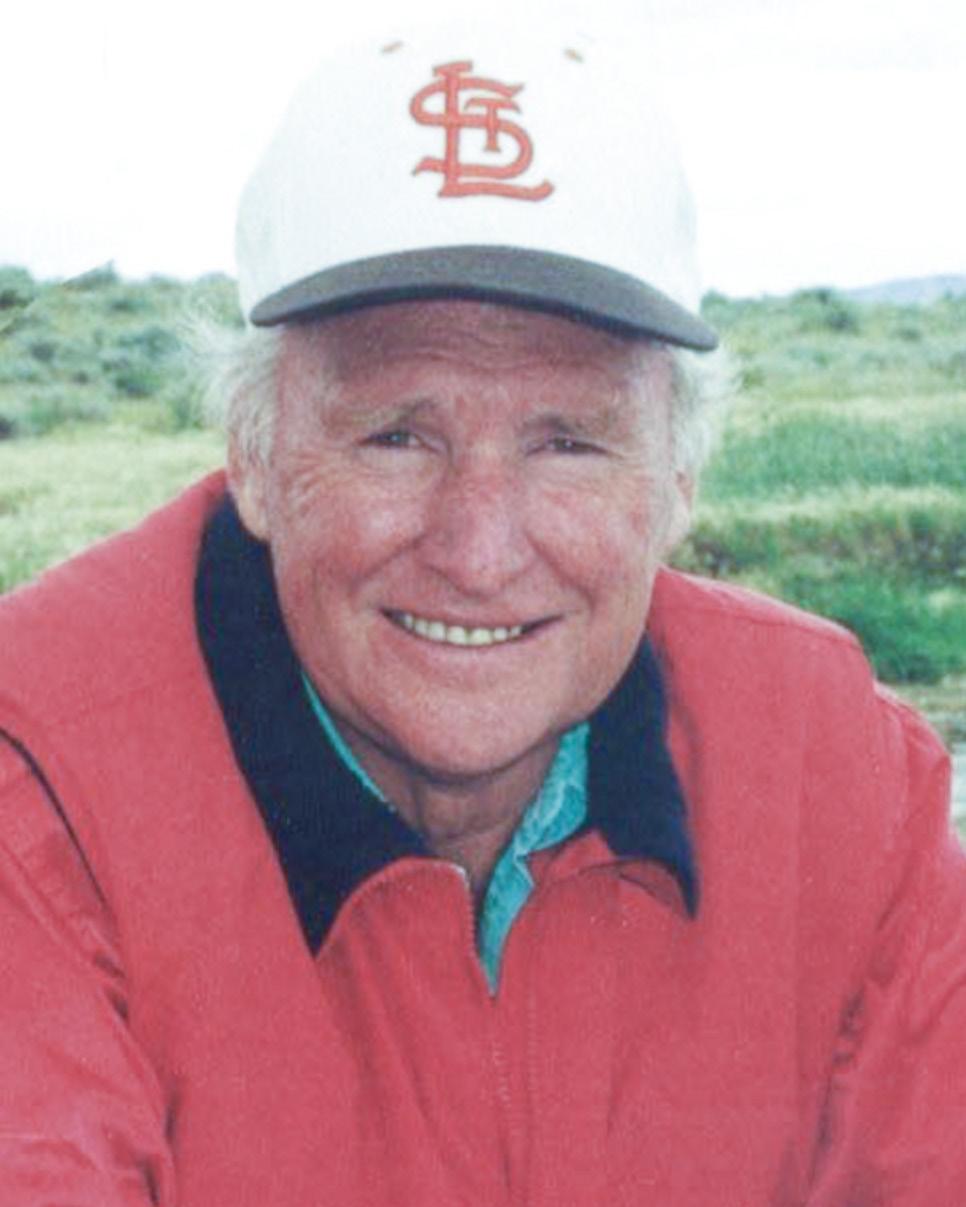
“The pinnacle of what we do is the Bassmaster Classic when we go live on the Fox broadcast, which is the big boy network,” he said. “This year, we’re gonna be on Sunday from noon to 3. And when we start getting the count, and we’re about to go live, and we’ve got our talent and it’s just the height of the moment...”
For McKinnis, the rush entails the entire process from planning to site set-up but peaks in those tense moments before a broadcast goes live.

“When you get in the seat at 6:30 in the morning, which is an hour and a half before we go live on the network, and you’re prepping, and you’re looking at everything, and we’ve got our cameras going, and talent’s getting in the seat, and everything’s ramped up,” he said. “And you know here in 10 minutes FS1’s gonna count us in, and we’re gonna be live from this truck. Yeah, it’s a rush like nothing else.”
Most times, any necessary pivots work around a preceding event running over a couple of minutes. But sometimes Mother Nature decides to throw a backdoor slider.
“Literally, you’re waiting for, say, NASCAR’s got a time trials before us. And they’re about to finish their show, and NASCAR’s on the line, and we’re on the line, and Fox is on the line,” he said. “But two years ago, we were in Fort Worth, and about to go live on FS1. And it’s June. And if you pull up the weather map, there was one cell over the entire United States, and it was right on top of the lake that we were at. And we’re about to go live in 10 minutes. And so, they canceled the takeoff until further notice. ‘But we’re about to go live…’ ”
“We had to fill about an hour and 15 minutes with no live cameras. Of course, we’re prepared with content from past events and all that kind of stuff. But we were also doing live hits with our reporter at the lake who’s out there in the storm. So, for our team to adjust and put on that broadcast meant so much.
“Doesn’t sound like much, an hour and 15 minutes, but that’s a lot. When the pressure’s on, when it’s all on you, even just five seconds is a long time.”
A typical Bassmasters week will entail preproduction on Monday, live one-hour preview shows on Monday, Tuesday and Wednesday, and the event rolls on Thursday. The first series event, held over the last weekend of February at Lake Okeechobee in south Florida, entailed seven hours of live coverage, a remote

crew of about 20 on-site and another 20 back at the studios in Little Rock.
Turns out, people like to watch other people fish, and they like to watch other people talk about fishing. At the dock, at the bar, at the water cooler. And most certainly, on TV. Jerry McKinnis figured that out more than 50 years ago, and Mike has made sure the family business never forgets it.
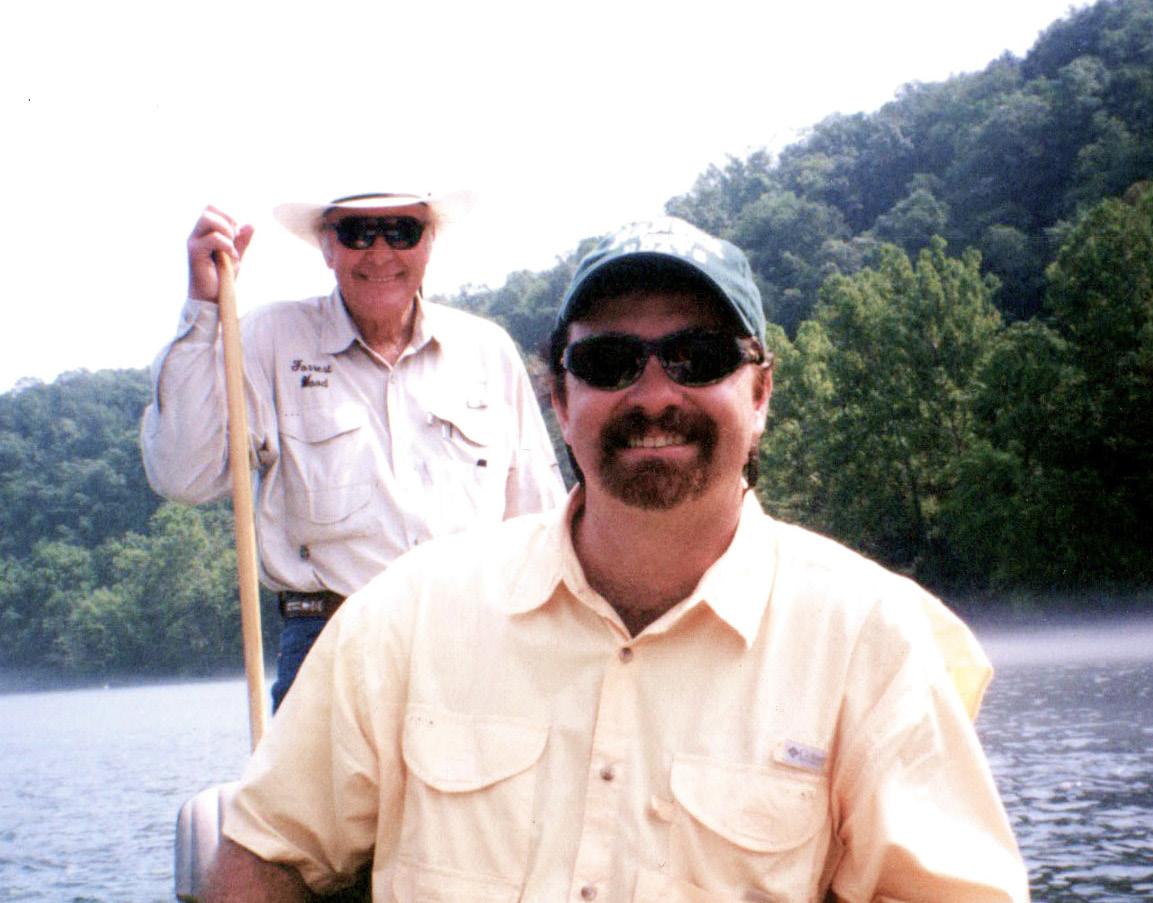

David Healy was 24 when he packed his stuff into a U-Haul and drove to Little Rock from his native New York City, embarking on a journey that would immerse him in the fishing culture and place him on the front lines of the outdoors television in-
dustry. He felt like an honorary native Arkie already, having spent a couple of summers interning for Jerry McKinnis after being introduced to him by his dad, Jack Healy.
Five years after Jerry pitched his local fishing show to a fledgling cable outfit called ESPN and essentially launched outdoor TV programming as it’s known today, the cable outfit was sold to ABC. And Jack Healy was an executive vice president at the network who was instrumental in the launch and ultimate success of its cable ventures, including ESPN. He sat on the boards of ESPN as well as fellow former cable giants A&E and Lifetime.
Jack and Jerry became close colleagues and friends. And starting with those summer internships when David was 17, Jack
“This business is not for the faint-hearted.
If you’re gonna get in the television business, you know how it works. It never stops.”JM’s Steve Bowman with legendary boat manufacturer Forrest Wood. (Photo provided)
entrusted Jerry with the industry apprenticeship of his son.
David arrived in downtown Little Rock in ’94 — JM then was housed in an old home about a block away from where the Fish Factory currently stands — and stayed for the next 14 years, marrying a local girl and working side-by-side with Mike McKinnis.
While Jerry McKinnis earned his reputation as a fishing and broadcasting legend, Healy said Mike’s even-keel demeanor and preference for operating outside the spotlight belie a passion to innovate.

“When I was there, Mike became more and more involved, learning every aspect of the business. He wasn’t just his dad’s son — he had the credibility because he did all the jobs, had been out on the road. We learned under Jerry and then Mike taught a whole generation of producers, camera operators and editors…
“He had the mentality, learned from his father, that nobody works harder. At JM, we were always looking to improve, the mindset was always, never settle.”
That “get ῾er done” mentality remains engrained in the walls at the Fish Factory. After all, Jerry was a former pro baseball player-turned-fishing guide in the late 1960s when he was asked to do a weekly two-minute segment on fishing for Channel 7 in Little Rock. When that segment turned into a half-hour show and then was syndicated, McKinnis was determined to produce it himself. And the rest, to borrow an old worn-out rod of a phrase, is history. * * * * * * * * *
Mike McKinnis never planned to join his dad’s business. The third of four kids and youngest son to a local fishing and broadcasting legend, he set out on the Rock and Roll Highway once he was through high school at Parkview in Little Rock and had earned his music degree at Belmont in Nashville.
As bass player and a founding member of Little Rock’s Fifth Cliff, he and his mates toured the country, recorded a couple of albums and became a mainstay of SEC college towns throughout the ‘80s.
“We’d be in Tuscaloosa at a fraternity house and look up, and there’s Violent Femmes next to us, and you know, this band or that band playing at this house,” he said. “Bands at every house.”
It was a blur, indeed, but McKinnis confessed to getting his money’s worth from the experience.
And he was a perfect fit as the band’s four-stringer. After all, he looks the part of rock ῾n’ roll bass player, and that’s no slight. His laid-back demeanor and satisfaction with delivering his art
from just beyond the spotlight suggest bass guitar maestros like John Paul Jones, the piston who “quietly” fueled Led Zeppelin’s hyperactive V8 motor while frontmen Plant and Page soaked up the spotlight.
That’s the role JM Associates has played for some of the fishing industry’s biggest names including Mark Zona, Carter Andrews and the late Jose Wejebe. And it’s done so in a stealthy manner; it’s likely that more people outside the state’s borders know about JM Associates than do the natives.
Though each of Jerry’s kids eventually would work with JM in some freelance capacity, Mike was the only one who found his path inside the Fish Factory. His own two kids found their path in the entertainment industry in California, though his son freelances some for JM both behind the camera and otherwise.
Once music ran its course for Mike, he traded his guitar for another kind of bass and joined the family business in 1990, starting at the bottom and working his way up, doing a little bit of everything. But most importantly, absorbing.
“I learned the best way, you know. I literally emptied the trash and was a gopher and learned my way up,” Mike said. “[Dad] hired an editor out of Dallas, and I sat next to that guy for about two or three years and really learned the business of post-production, of television, of delivering shows to networks, of all that kind of stuff. I learned the production part of it.
“I didn’t know anything about the television business, but just dug in and started on the bottom floor.”
There was much to absorb. JM annually produces hundreds of hours of live content seen on ABC, ESPN, ESPN2, CBS Sports, Fox, FS1, NatGeo Wild, The Weather Channel, The Outdoor Channel, Tuff TV and Versus. Most of that content comes straight off the water, but not all of it. In addition to the Bassmaster events and fishing shows such as the Redfish Cup, the Madfin Shark Series, “The Spanish Fly,” “The Obsession of Carter Andrews” and “Zona’s Awesome Fishing Show,” JM produces the
Stihl Timbersports Series and Timbersports Collegiate Challenge, the Stihl National Championship Air Races and more.
JM creates websites and produces web content as well, and its studios have been used to broadcast the Arkansas State Lottery and film scenes from movies such as “God Is Not Dead 2” and the Hank Williams biopic, “The Last Ride.” Its work has been recognized with an Emmy, Emmy nominations and other awards.
Anyone who’s ever seen outdoor sports on TV likely was watching a JM production, if not getting a look at the inside of the company’s SportsCenter-like set. It’s the biggest in the region, and at 70 feet by 60 feet, JM’s soundstage is the largest fully equipped production studio between Nashville and Dallas. In fact, JM can accommodate at least three permanent sets at once with room to spare, room enough for a live audience of 250.
It’s all state-of-the-art at JM, and everything is done in-house. An HD-SDI fiber link to a routable port in Nashville allows the firm to reach all major global networks, network ops and technical centers and even affiliates.
Technical directors, engineers, camera/audio ops are all available 24/7. In a pinch, the Fish Factory could stand ready to pro-
duce and broadcast the Zombie Apocalypse. And to think it all started with a baseball player who fell under the spell of the White River … from a photograph.
Before Jerry McKinnis became the Arkansas fishing and broadcasting legend who helped put a fledgling cable network on the map, he was the operator of the old Maumelle Harbor marina on Lake Maumelle, just west of Little Rock.
The St. Louis native had squeezed all he could out of a professional baseball career that saw him reach the AAA level at Oklahoma City. An avid fisherman, Jerry remembered an old photo as he contemplated his next move.
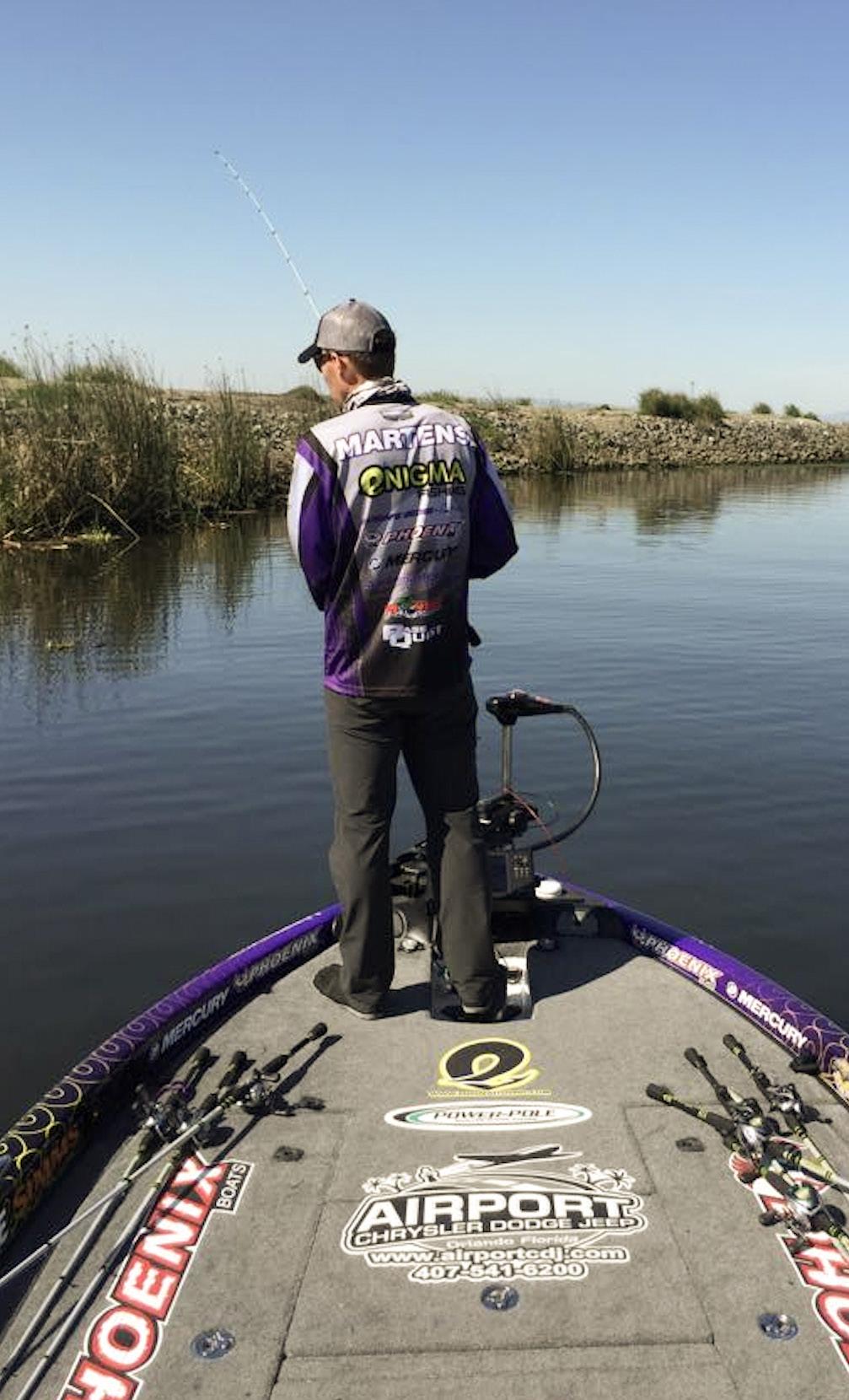
“He had this picture of the White River that he had torn out of a magazine, and he always said to himself, ‘I’m gonna go there and fish one of these days,’” Mike said. “So, he went and played baseball for a couple years, realized that he wasn’t gonna make it, and the first thing he did was go to the White River, where he met a fishing guide. And it was Forrest Wood.”
Both Jerry McKinnis and Forrest Wood benefited from that serendipitous meeting. Wood was in the fiberglass business and about to start manufacturing phone booths. After meeting McKinnis, he opted for fiberglass fishing boats instead and convinced Jerry to join him as a guide on the White.
As for the launch of one of the world’s most iconic boating brands, “Dad got the very first Ranger bass boat from Forrest Wood,” Mike said.
Working on the White, Jerry met a prominent Little Rock mover/shaker, Brick Lyle, who convinced him to come down and run the old boat dock on Lake Maumelle. The Maumelle Harbor of the late 1960s, later known as Jolly Rogers Marina, remained an isolated retreat seemingly far removed from the bustle of the capital city. And this is where some of Mike’s first memories were born. He said the “tiny house” the family of then five members occupied on the property was about the size of his office today.
After a few years, the family moved into town while Jerry commuted back and forth from the lake in the family’s old wood-paneled station wagon with signs reading “The Fishin’ Hole” attached to the sides. In the ῾70s and ῾80s, that old wagon was a common sight for many Little Rock residents.
It was at the boat dock that Jerry met Bud Campbell, then the KATV sports director and voice of the Razorbacks. Campbell sold him on the idea of a weekly two-minute fishing segment, “The Fishin’ Hole,” on his sportscast. It was an instant hit with viewers and eventually led to its own show and even syndication.
A DIY’er if ever there was one, Jerry McKinnis inevitably became involved in all aspects of his show’s production. Eventually, with business partner Jim Manion, he launched JM Productions in that old Victorian before growth necessitated the Fish Factory. His little two-minute segment on Channel 7 had grown into a local smash and then a syndicated one, and McKinnis was ready when a light bulb popped on and he decided to pitch his show to a nascent cable outfit called Entertainment Sports and Programming Network.
“He was in the northeast in a hotel room, and there was a cable network called ESPN,” Mike said. “Originally, they were gonna do sports on the weekend and movies during the week, I think. And he said, ‘I’m gonna call these guys and see if they’d be interested in my show. And so, he went and met with ῾em.”
The ESPN “campus” in suburban Connecticut wasn’t much more than “three or four house trailers and a bunch of dishes,” Mike said. But his dad saw opportunity. Turns out, McKinnis’ show represented the network’s first actual time buy, and “The Fishin’ Hole,” which ran from 1989 to 2007, remains its secondlongest running show behind SportsCenter.
McKinnis worked with the network to take his show and others from anglers like Jimmy Houston and package them together on Saturday mornings in a four-hour block of outdoor programming. And thus, ESPN Outdoors was born.
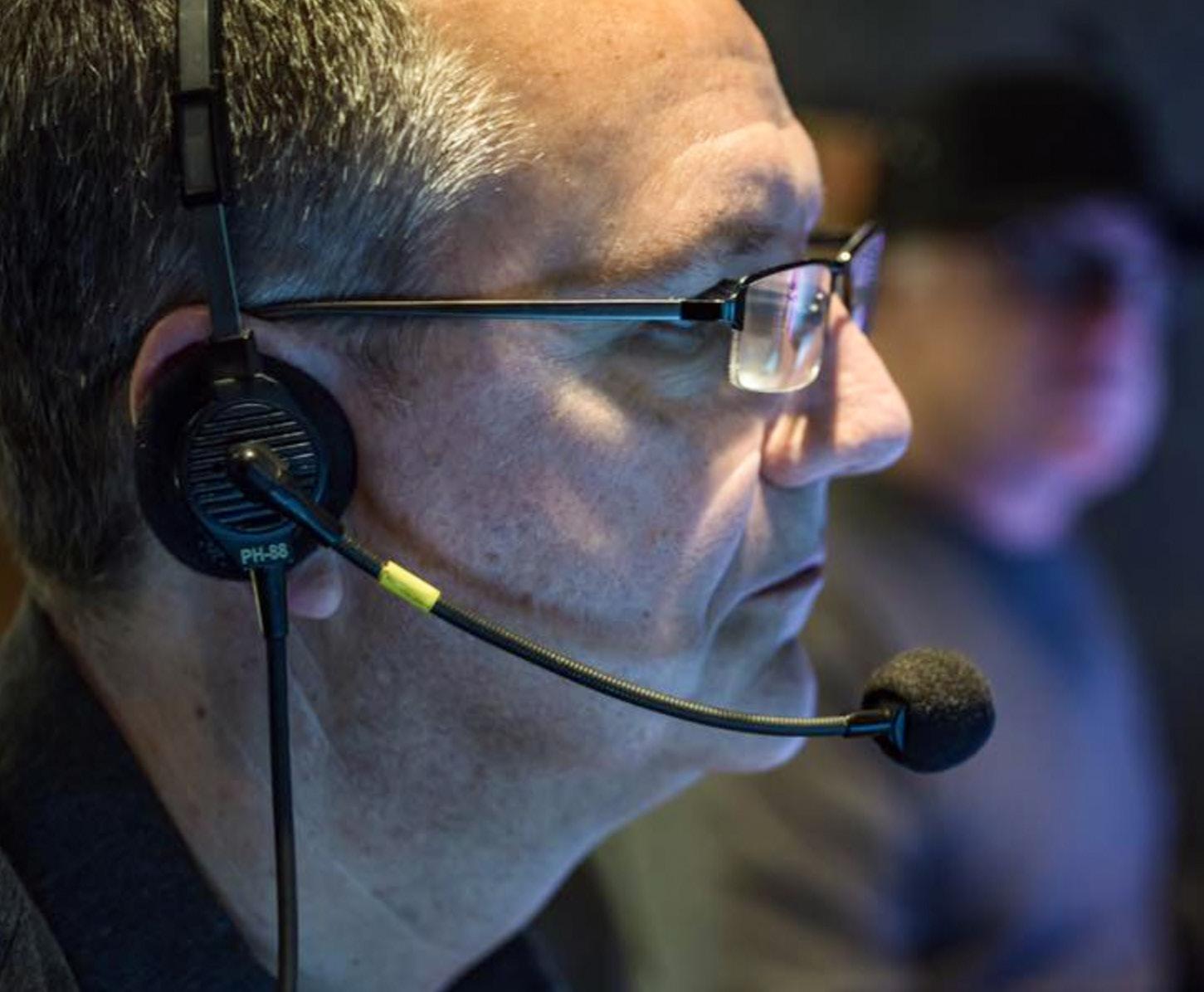
And a year later, a former rock ῾n’ roll bass player was looking for his next move. And Mike McKinnis admits it took a while for his own proverbial light bulb to switch on. The first decade on the job was a learning process, as he got married, started a family and struggled to make ends meet, on the road 20 to 30 percent of the time.
“This business is not for the faint-hearted,” he said. “If you’re gonna get in the television business, you know how it works. It never stops.”
But years of diligent hard work were rewarded. By the beginning of the 2000s, Mike was running the company’s day-to-day ops. And once ESPN bought the organization behind Bassmaster, the Bass Anglers Sportsman Society (B.A.S.S.), in 2001, the beehive became active.
“Our business exploded because we were doing ESPN Outdoors on Saturday and Sunday mornings and weekdays,” McKinnis said. “We were doing hundreds of hours of that content. We were still doing the lumberjack shows. We started covering the Bassmaster series and the Bassmaster Classic. Yeah, we were doing the Great Outdoor Games, redfish tournaments. All that stuff was going on from 2001 to 2007. And we look back at it now, and we were like, ‘How did we do all that?’ It’s unbelievable.”
Almost as hard to fathom as the workload for McKinnis was the opportunity to “sit front row” to some of the world’s best fishermen. One with whom he grew particularly close was Wejebe, who died in a 2013 plane crash. As producer, McKinnis followed Wejebe all over the world.
“We started producing his show in ’96, and that was the greatest,” McKinnis said. “I got to go to South America multiple times, to Central America and Australia and all over the coasts, both east and west. I had a front row seat to one of the greatest fishermen to ever live.
“He and I were really close. He was fantastic. And he and my dad were very similar. It’s so interesting. So similar in their passion for fishing, in their passion for television and just how they carry themselves. It’s really amazing the similarities that I can see.”
Steve Bowman is an Arkansas fishing and outdoors legend in his own right. A member of the Bass Fishing Hall of Fame, the Waterfowl Hall of Fame and the Arkansas Outdoors Hall of Fame, he’s also an award-winning author, TV host, advocate, journalist, crusader, web designer currently, the content director for JM.
Bowman said Mike is so much more than just “Jerry’s son,” calling him JM’s leader, mentor and motivator. And he has a simple explanation for why business continues to hum, though JM remains out of the local spotlight.
“Truth is, we don’t have enough time to be on the radar,” he said.
Even after ownership changed hands briefly in 2007 and JM purchased B.A.S.S. in 2010, the company continued to hide in plain sight. At the urging of former ESPN president George Bodenheimer, McKinnis and former Time Warner CEO Don Logan purchased back JM from an Atlanta firm and bought B.A.S.S. in the process. Though ESPN had given Bassmasters the exposure it never would have achieved otherwise, the ownership change was viewed as a welcome one on all sides.
“They were just too big for it,” McKinnis said of ESPN. “And what I mean by that is, they’re so big, and this culture is so relationship-driven. They were great, what they did for the sport, but we became this small piece. And you can’t fool our audience. You start throwing all this talent in there who doesn’t know any-
“I learned the best way, you know. I literally emptied the trash and was a gopher and learned my way up.”
— Mike McKinnis
thing about fishing, they’re not gonna buy it.
“It was so challenging. We knew what to do here, you know, and we wanted to do the whole thing ourselves, which is kind of what we’re doing now. Now, we have the keys, we have the reins, and we’re able to drive it, you know?”
Through it all, JM’s focus on three very Jerry McKinnis-like ideals have kept the engine purring, Bowman said: innovation, hard work and “figure out how to get it done.”
All three come in handy as tech and TV evolve and new opportunities reveal themselves. Last year, JM began working with CBS Sports to televise the sport fishing championship. JM was the first to bring on-the-water live coverage of fishing tournaments to the airwaves, placing cameras on competitors’ boats beginning in 2015 when the technology enabled it to broadcast in remote locations using cellular signals. A blessing, it turned out, when the pandemic all but shut down many other sporting events.
The next step is tackling the big open water of saltwater fishing.
“The saltwater thing is new for us,” McKinnis said. “There’s always been tons of billfish tournaments, but we’re trying to group ῾em up in a series and cover it live. And live coverage for those has humongous challenges because they’re going a hundred miles off the coast. There’s no cell service. But Starlink is about to fix that problem for us, where we could actually cover ῾em live.
“That’s new and exciting for us. We’re always looking for fun things to do, like the air races. We’ve been covering them the last half a dozen years, and it obviously is nothing close to fishing. But our team gets to pick up, go to Reno and cover a live event.”
And those live events – well, for McKinnis anyway — you can’t beat ῾em.
* * * * * * * * *
Growing up, Mike got to tag along as his dad found new fishin’ holes to try, fishin’ holes that took ῾em far from home. As did his own kids.
“When I was 8-, 10-, 12-years-old, I didn’t know that everybody didn’t get to go to British Columbia and get to go to Florida and all these places,” he said. “I just thought that’s what you did. Now I look back and go, ‘Wow, what a privilege to be able to go to those places and see those things, and then watch a guy like my dad be passionate about something.’”
Mike’s own family has been treated to some exotic places, as well, and his adult kids have worked as freelancers for JM.
And though he was passionate and proud of his team’s work, Jerry McKinnis always preferred to operate under the radar. The apple in this case rests directly under the tree. Nothing against local business, Mike stressed, but from early on JM always had enough on its plate as it was. Somewhat off the local radar was,
and is, a good spot for JM.
“My dad always used to say, we like it that way. We’ve got too much going on to do local business. Nothing against local business. It’s just too much to do that. And we kind of just like being hidden here, doing our thing.”
And doing it well. JM consistently has been recognized by those within the industry as among the best in the outdoor TV industry if not the broadcasting game itself. David Healy, who now owns his own firm, Stakeholder Marketing and Media in Atlanta, said the formula is simple, though being good at what you do makes for a good start.
“I worked other places and never experienced anything like it,” he said. The teamwork, the fear of complacency, the creative drive, the steady hand of leadership — Healy said it was all there at JM and still is. He recalls his years at JM with obvious affinity.
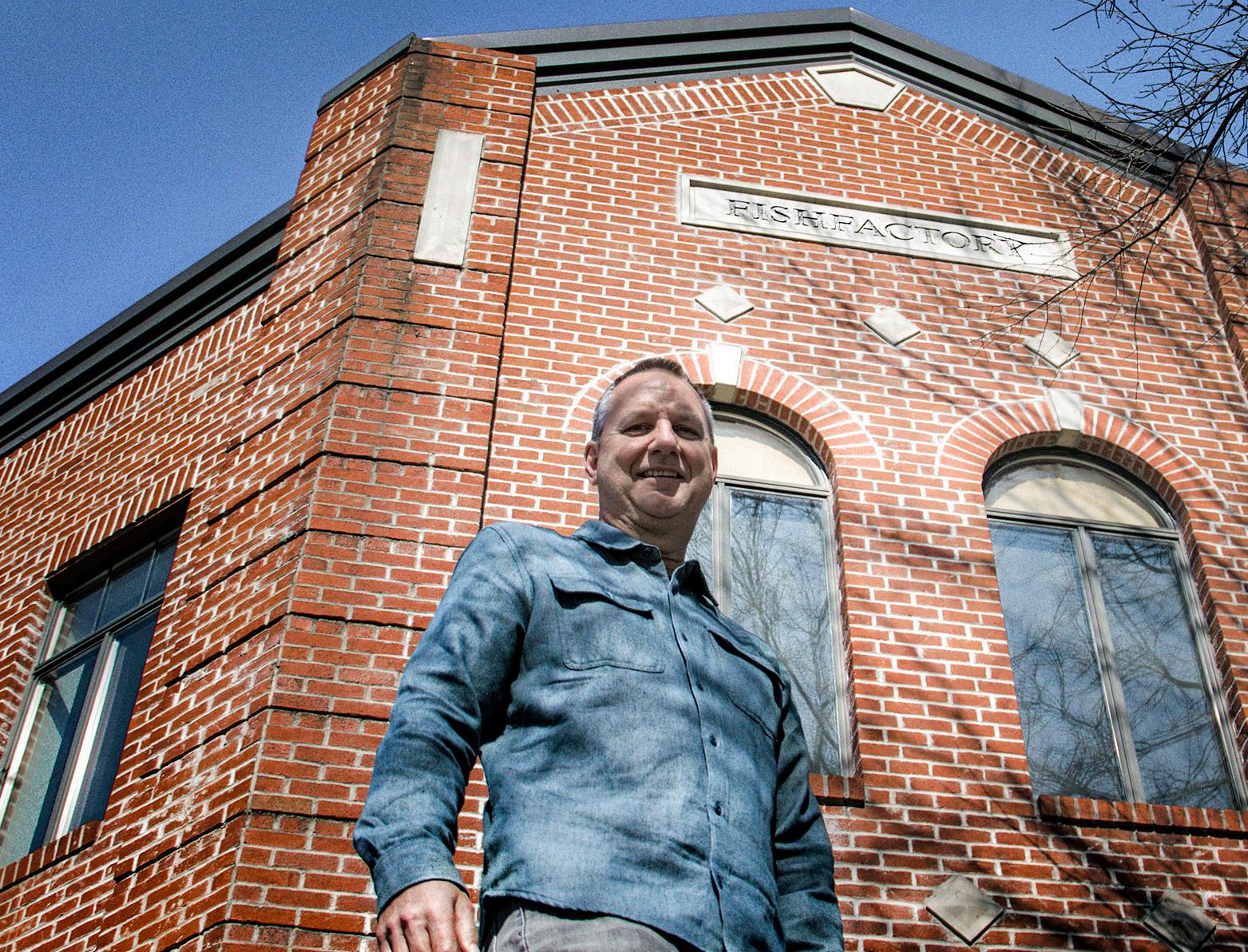
“Mike knows when they need to kick things into gear; he has a sense of when to get down to business and when to laugh. To work so hard all day in the heat and rain and still be laughing with the team while you’re doing it … That’s a special thing. That’s the thing.
“It never felt like work for me.”
Like his dad, Mike prefers fishing for smallmouth bass, though he doesn’t get to do it much anymore. Of course, he does get to watch an awful lot of it. But he and his siblings still have the old family place on the Buffalo River at Rea Valley. And a few times a year, it serves as retreat.
As for what’s next, Mike said more of the same: innovating, busting humps and of course, lots of laughter.
“I’m more like my dad,” he said. “I don’t lead by telling people what to do, I lead by doing it, and you can jump on board or not, ῾cause the train’s going. I’m doing it. And here we go. You know?”
“You can jump on board or not, ‘cause the train’s going.”(Photo by James Overstreet)
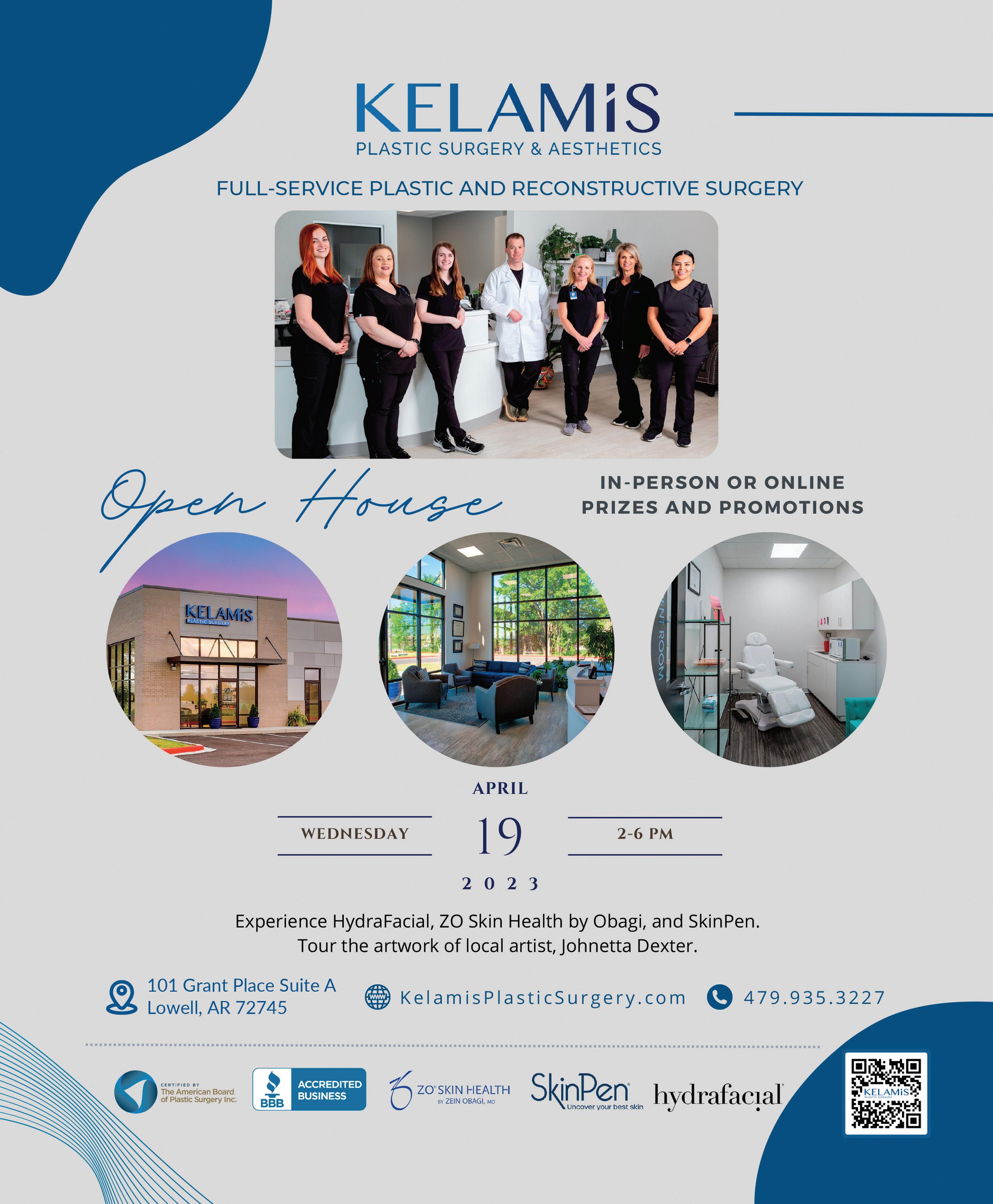







Charles Nabholz pulls into a parking spot right in front of the building that bears his family name, hops out and gives the visitor a big wave. The chairman emeritus may not know the person exactly, but it’s the only vehicle parked in the row of visitors spaces, and as a guest, he warrants welcoming.
Besides, there aren’t too many families in central Arkansas he hasn’t met or crossed paths with during a lifetime spent in the area, most of it with Nabholz Construction, one of the most successful businesses Arkansas ever produced. So, if he doesn’t know you personally, Nabholz probably knows your daddy or raised your grandma’s church or maybe even built your high school. And in turn you know him, however peripherally, the standard bearer for the Nabholz name, one synonymous with quality, ethics and community.
And it all started in a place called Squirrel Hill just outside of Conway where Nabholz grew up, the baby of 12 kids born to Emil and Mary (Strack) Nabholz. There, the family grew cotton, livestock and the core principles that would launch a construction empire.
“When I have a chance to talk to our leadership and management teams about my life growing up, I tell them farm life taught me a lot,” he said. “Those les-
sons I learned growing up on the farm really applied to the characteristics and principles in our business.
“My daddy never signed a contract and didn’t need to. If he’d sell a cow, it was just a handshake deal. I’ve always heard when I was growing up, ‘His word is his bond.’ You always knew who possessed character in the community and, if there was somebody you couldn’t trust, that word got around the community, too. So, honestly and integrity became a big part of our way of doing business.”
The work was hard, but the bonds of community and family were strong. In the summertime, multiple families would band together to help with larger
a richness to Nabholz’s growing up. In hindsight, the clan may have been considered poor by today’s standards, but it never really felt that way.
“Among the lessons I learned was how we had to cooperate with each other,” he said. “My dad would pinch a penny, and he didn’t spend money on anything unless he had it. Our cash crop was cotton, so we had to really hope and pray that we’d make a good cotton crop every year in order to buy clothes and shoes by the time school rolled around.
“I can remember many summers after school let out that I didn’t wear shoes except on Sunday until it was time to go back to school in the fall. That was just the way it was, not only for our family but a lot of other families in Conway. I didn’t feel like we were abused in any sort of fashion. It’s just what we had to do to make a living.”
tasks such as baling hay and threshing oats, topped off by a communal dinner at which each farm wife would try to outdo the others’ dishes.
These moments, as well as the occasional recreation fit in between handmilking cows and picking cotton, lent
By high school, each Nabholz kid brought their own future into focus. Three of Charles’ sisters joined religious orders, two brothers dropped out of high school to help run the farming operation, and a total of four of the Nabholz boys served in the military, three during World War II and one during Korea. In 1954, Charles graduated St. Joseph High School in Conway with little interest in further formal education.
“My parents couldn’t afford to send me to college, and of the kids in my class, probably only three or four of them went on to college, some not un -
“Serve your client, serve our communities, and try to make the communities we live in a better place to live.”
til after they came back home from the service,” he said. “When I was in high school, I just assumed I was going to go to work for Nabholz Construction. College was not on my mind; I wanted to make some money.”
By then, his older brother Bob had launched the construction company, and while Nabholz was eager to join him, his father made him a proposal.
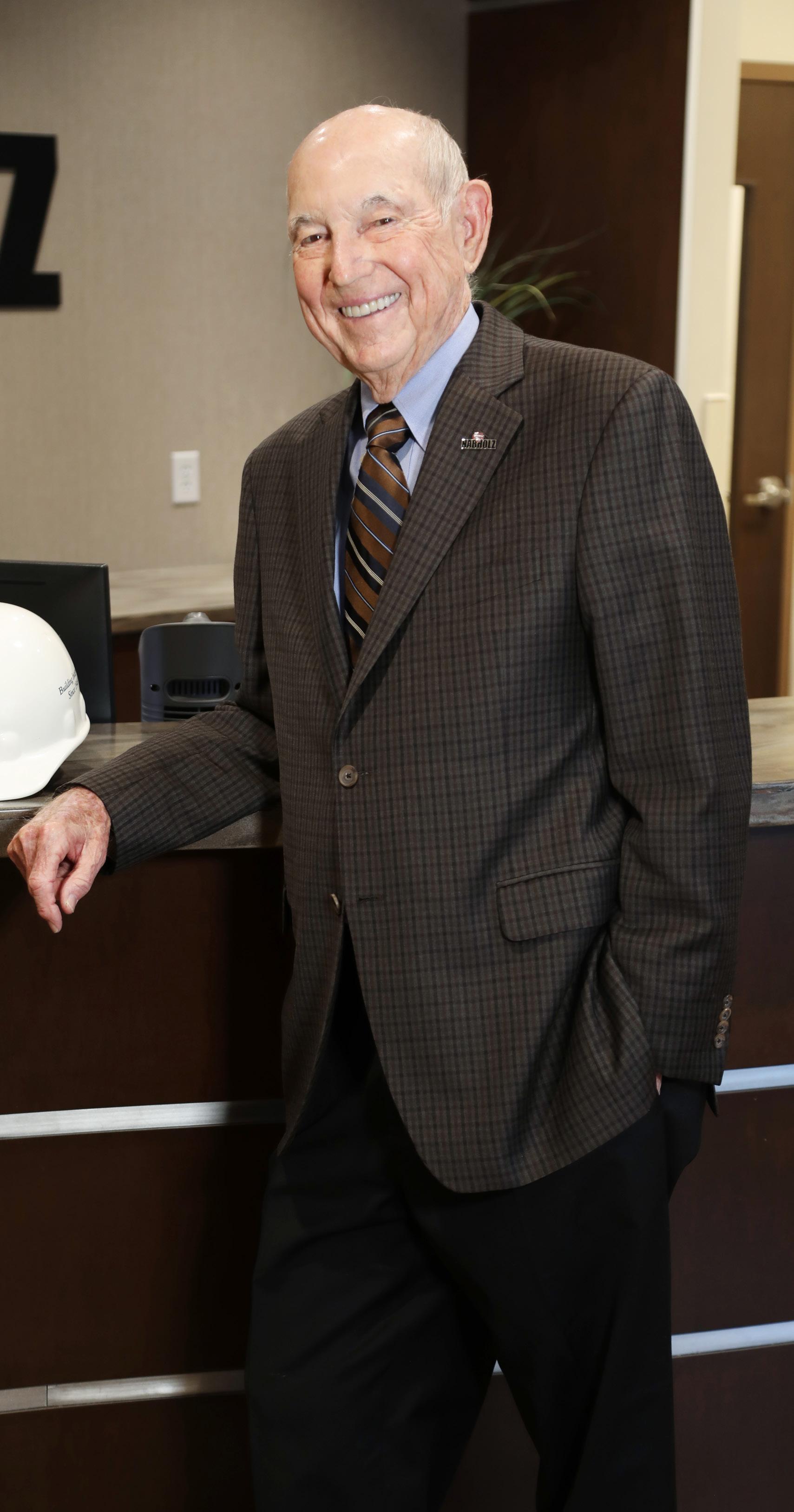
“My dad wanted me to stay for one more year to help him make a crop. He offered me three acres of cotton and a cow if I would stay through October. That was a good deal,” he said. “About the middle of July, the crop showed it wasn’t going to make it because we hadn’t had any rain at all that year. So, my dad said, ‘I’ll make you another deal. Give me that three acres of cotton and the cow back, and I’ll release you from your commitment to stay on the farm.’
“I’ll never forget that day; I said, ‘Does that mean I don’t have to milk them damn cows anymore?’ He said, ‘No, you won’t have to milk those cows anymore.’ So, I borrowed his car, came into town, walked into my brother’s office and said, ‘I’m ready to go to work.’”
Nabholz started on a bricklaying crew for the princely sum of 75¢ an hour. But the lessons he learned about craftsmanship and job site management far exceeded the value of his paycheck.
“This bricklayer’s name was Harvey Adams, Johnny Adams’ daddy,” Nabholz said, the notes of admiration still clear in his voice. “He said, ‘Everybody knows when they come by this house that I supervised the brick work. It’s going to be known as a Harvey Adams’ job. If you don’t do it right, you’re going to have to tear it down and do it over again.’
The most important qualities we look for in the people that we hire are integrity and honesty, people you can trust. That’s basically been our hiring practice going back to the early days. They might not know how to do carpentry work or brick work or electrical work, but if they have a good moral character and want to learn a trade, that’s all we need to know. Sorta like it was growing up on the farm.
Don’t think you know it all, because you don’t. You never do. To be a good entrepreneur you have to be good at what you like to do, and the only way you can get better is to learn more. I still, in my own life, try to learn something new every day. My kids used to get tired of me saying, ‘If you learn something new every day, at the end of the year you’re 365 times smarter than when you started.’
“I didn’t realize what I was learning when I was working with the bricklaying crew. I learned a lot about quality, teamwork, commitment, safety and fun Those are some of the core principles of our company today. The brick mason crew worked very hard to please Mr. Adams. He had a lot of pride in his reputation, and the brick masons showed a lot of pride in their workmanship.”
Nabholz Construction grew by word of mouth as each finished product served as a springboard to other work. From single-family homes, the company quickly graduated to apartment buildings and before long commercial buildings. Opportunity could come from anywhere.
“Bob was invited to go to a wedding one time, and he went down to the reception,” Nabholz said. “He met a man at the reception from North Little Rock who wanted to come over and look at the house Bob was building. He did, and after looking around a bit told Bob, ‘I like the quality of your work, and if you’re interested, I’ve got some apartments I want
to build in North Little Rock.’
“We didn’t have the interstate then, and [North Little Rock] was still a long way from Conway. But Bob said, ‘Well, yeah, I guess so.’ He got some information on the apartment building and figured it up, and the price was around $6,000, a lot of money back in the early ’50s. The man said, ‘OK, but I was thinking about building eight of these buildings. So, Bob multiplied the price by eight, and they shook hands on the deal, much like my dad did when he sold a cow. The project turned out well and got him kickstarted from a financial standpoint.
“Then another man came along and said, ‘Will you build me a service station?’ This was in Little Rock on Broadway and Roosevelt Road. Then, along about ’53, came our first school project, built for the Northside School District in Morrilton. That cost about $10,000, less
than $10 per square foot. So, from residential construction to apartment buildings to building service stations to building schools and then building churches and all other types of commercial work, each job kind of leapfrogged to another.”
Every new job and each new category provided an opportunity to refine the processes needed to run a profitable business.
“I can remember Bob saying, ‘Don’t have all your eggs in one basket,’ which was a good term,” Nabholz said. “I even heard that on the farm where you literally couldn’t depend on one facet of farm life to support you. Same way in construction; we diversified, and we provided different types of services. We had our own equipment. We had our own millwork shop. We merged with some companies along the way to give us different geographic locations, so if the economy was down in Conway or central Arkansas, it might be up in Northwest Arkansas.
“When we’d look back on what we did the year before, it wasn’t about revenue, it was about profits because you can’t stay in business unless you make a profit. We had to make sure we had enough money to make payroll and pay for materials and have a good credit rating — and all those things that determine if your company is a success or not. There were times when we didn’t make much money, but historically, there was never a year when we didn’t make a profit, although some years small.”
In time, four of the Nabholz brothers would be involved with the company, which would include building supply and land development subsidiaries. It also birthed a sister company, ConArk Builders, which launched to help deal with labor issues and ultimately
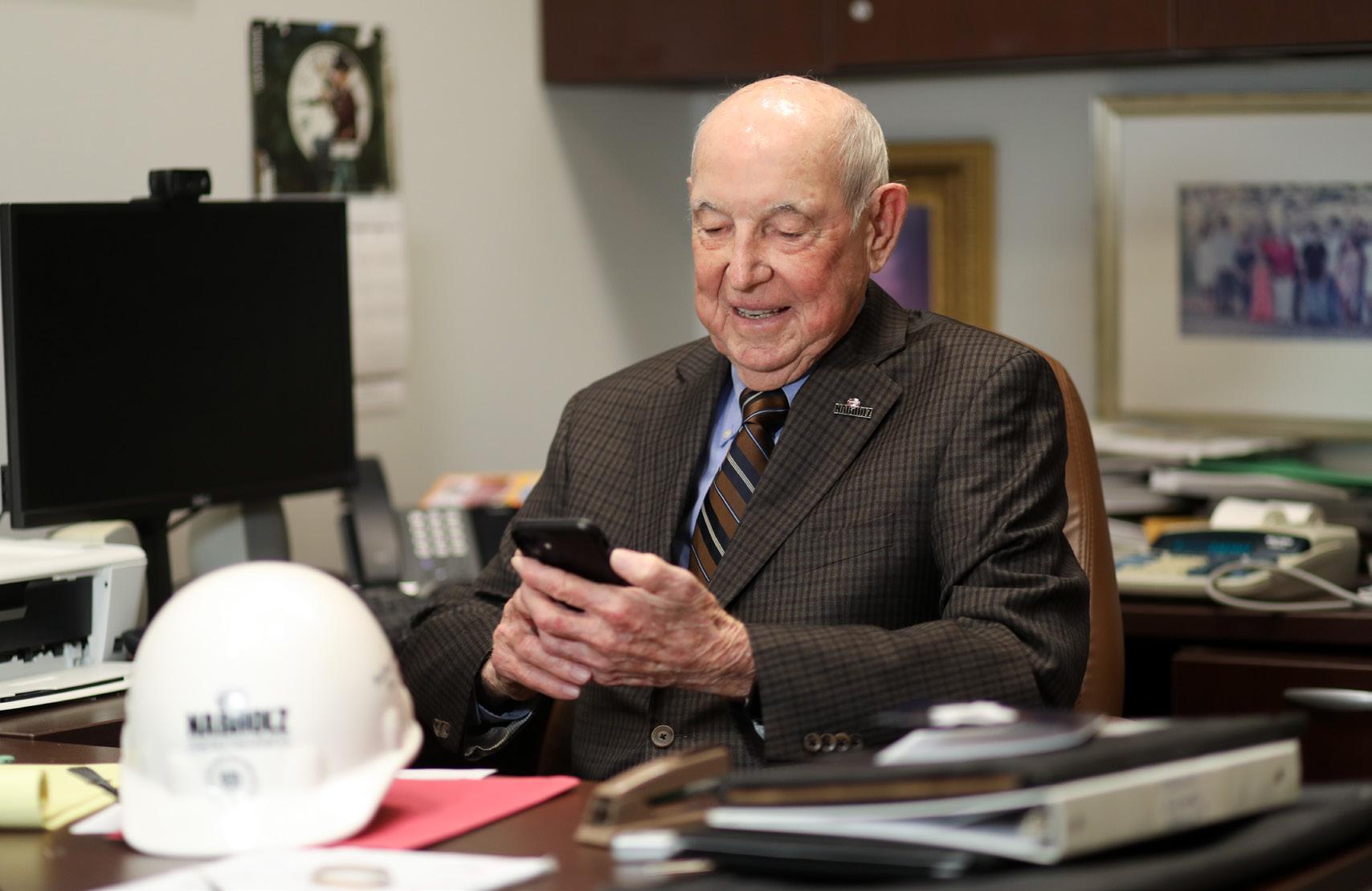
merged back with Nabholz Construction in the 1980s.

“We had some union problems in the ’50s, particularly as we were growing,” he said. “We were continually having labor disputes, and we couldn’t complete our projects without going through a lot of hassle with the various labor unions we had contracts with. This wasn’t the way construction was supposed to be delivered to our clients.
“I started Con-Ark Builders from scratch in 1962. It was what’s called a merit shop company, which means any subcontractor who’s qualified ought to be able to work on a project, whether it be a union contractor or a non-union contractor. And Arkansas, being a rightto-work state, supported this method of construction delivery.”
In more recent times, labor hasn’t been as much of an issue thanks in no small way to how the company treats its employees with robust benefits and a stellar safety record being just two perks. Even as the company grew through mergers
and acquisitions and projects got larger, the small-company mentality of taking care of your people has never wavered, fat times or lean.
“When things were slow, we just tightened our belt,” Nabholz said. “We tried not to lay off any people. We tried to keep core people, and everyone was incentivized to get work. A lot of our projects were acquired through contacts our individual employees made with prospective clients. The marketing lesson we learned is that every person in the company has an opportunity to be an entrepreneur in their own right.”
There are many things today that remind the observer, Nabholz included, of everything that’s changed over the years: The fact that succeeding generations who have worked here have already retired, the fact that grandnephews are in leadership roles and, most poignantly, that he is the last of his siblings. But there are just as many, and arguably more important reminders that the things that truly matter and have defined both his
Never make a deal if it’s contrary to what you believe. Honesty, integrity and the old-fashioned handshake deals are still good; however, we live in a different time now and you have to be careful and protect your agreements. Make sure the client is someone you can trust and that you understand what their expectations are.
company and his life, are here in abundance as well, from the love of his wife and confidante, Charlotte, to the respect and loyalty of employee and client alike.
“All the technology that we have now is so different than what it was, but the principles are still the same,” he said. “Serve your client, serve our communities, and try to make the communities we live in a better place to live.
“That’s been our philosophy; we are located in 14 cities in seven different states, and we try to bring the Nabholz culture wherever we can. Often, we’re pleasantly surprised to know a lot of those cultures already exist, and we just participate in it and try to make it better. I enjoy talking about the history of our company and how our culture developed over the years; it’s great to have the opportunity to stick around and share that culture with the younger generation. It’s good for me personally, and I hope it’s still good for the company.”
With our conservation efforts, economic growth comes NATURALLY

As we fulfill our mission at the Arkansas Game and Fish Commission, outdoor recreation has a nice side effect on the state’s economy.
• Nearly 100,000 jobs annually



• Almost $10 billion in consumer spending
• More than $2 billion in wages and salaries



in 2020, Forbes triumphantly reported its Fortune 500 contained the highest number of companies with a female CEO in the history of that storied list, the culmination of 20 years where Fortune 500 women CEOs multiplied 18 times over.
That’s the good news.
The bad news: The record-breaking representation still amounted to only 37 female chief executives. As the magazine’s editors themselves admitted, “women still aren’t getting as many opportunities as their male counterparts.”
Progress has indeed come in the area of women advancing to the top of corporate America. But given how much ground there is to make up the numbers still aren’t awe-inspiring. A 2022 analysis by Equilar found growth of women in executive roles grew at a 6.9 percent pace between 2016 and 2021, nearly double that of the previous five years, yet only one-seventh of top corporate jobs were held by women, despite making up half the workforce.
Moreover, such progress of women to the C-Suite is spotty by industry. Utilities and health care boast relatively impressive percentages of female bosses – 21 percent and 16 percent, respectively – while in energy (9 percent) and financial services (12 percent), not so much.
In Arkansas, female executives make up a mixed bag of opportunities and challenges when it comes to reaching, and excelling, in leadership roles. But ask those who reside in the upper echelons of leadership, and they will tell you things appear to be changing.
Ashley Sims, chief financial officer for Rock Dental Brands in
Little Rock, said she’s worked for a series of progressive-minded companies that invested in her success, which she takes as an indication of things evolving for the better in the workplace.
“Speaking for myself, I have had a really good experience with male leadership not treating me any different due to my gender,” she said. “That could be an exception to the rule, but I do think that things are turning quite a bit.”
By Dwain Hebda Ashley SimsSims, who’s been with the company for six years and in the CFO job for four, said she’d been drawn to leadership roles throughout her life, and these experiences have translated well to the corporate world.
“A lot of confidence comes from being in leadership positions in my church, in my school, in my home. There was never a doubt that I could do that,” she said. “I was very encouraged to teach young kids at church, for example, and that does carry over into your college and post-college years. I’ve always had book smarts, but that can only get you so far; you
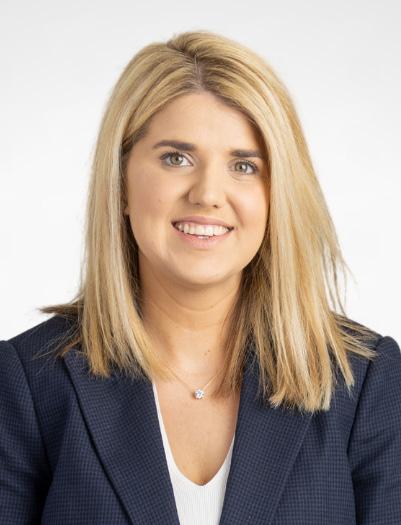
need confidence to step in, raise your hand and strive for things in the workplace.”
That said, having all the confidence in the world won’t make things happen in the corporate world without the grit and drive to overcome and succeed, Sims said.
“It starts with raising your hand for things,” she said. “People are hardly ever going to keep work from you if you’re volunteering for it. I’ve done a lot of grunt work in my career, and I’ve also sat up here late at night with executives and learned from them how they were thinking. You’re hardly ever going to be turned away if you’re willing to do the grunt work for someone, even if it’s not your department.
“That is a ton of sacrifice, so you have to kind of think about what’s important to you, but from my perspective, that’s how you learn right out of the gate.”
Molly Rawn, CEO of Experience Fayetteville, was hired into her role in 2016 and given the reins at a time the organization was struggling to find its footing. She said that vote of confidence, as well as the mentor-rich environment she discovered Northwest Arkansas to be, were crucial to her success in the role.

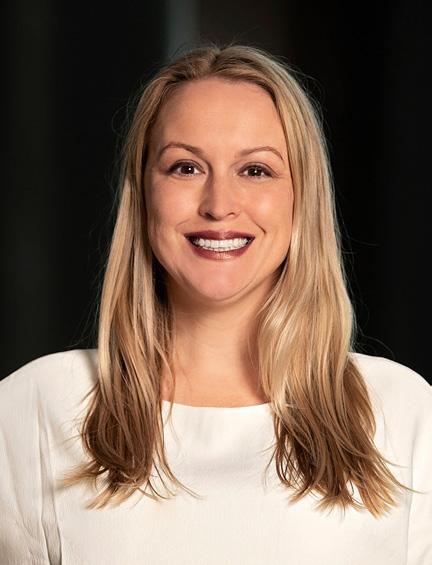
“My commission at the time put a tremendous amount of faith in me, and I had a lot of, I don’t want to say free rein because I don’t to make it sound like I wasn’t aware that there are parameters,” she said. “But they really were not prescriptive in how and what I was to do. They just knew, ‘Hey it’s not working the way it is. Figure it out. Let’s make it work.’
“I also realize how lucky I was; here in Northwest Arkansas we have leaders like Kalene Griffith in Bentonville, my counterpart there, who was so tremendously kind to me and so giving of her time to tell me here’s what’s what. Gretchen Hall, who was in Little Rock at the time, was the same way. They made themselves so available to me, who was just entering a whole new industry. I have not forgotten how giving of their time they were.”
Even though her own career has been a case study for female empowerment in the workplace, Rawn isn’t naïve to the strides that still have to be made in various corners of society.
“I think our industry is pretty balanced, but where I do feel there is a real difference is in our state in politics and civic leadership,” she said. “What I mean by that is, Arkansas is unique in that the destination marketing organizations like ours are public entities established through state legislation. That means we interact a lot with elected officials and with state government. And in those places, I feel there aren’t as many women.”
Staci Gasaway, CFO of Seal Solar in North Little Rock, has spent much of her career in male-dominated fields such as construction. At each stop, she’s ascended to the CFO role, but not without taking some lumps along the way.
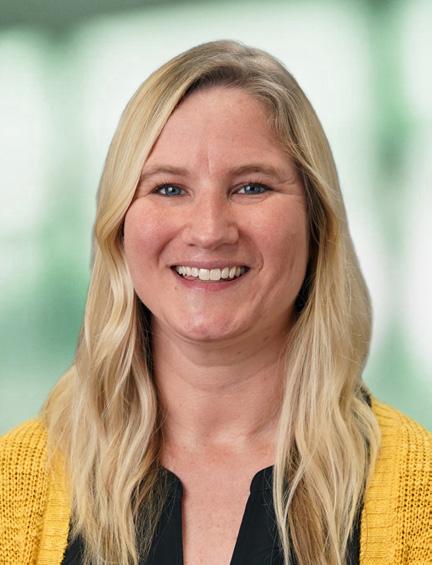
“There have been times in my career I had to struggle, initially, to gain respect,” she said. “That didn’t come from the owners, but from certain people who still had that male-dominated mindset.
It didn’t take long to earn that respect, but I did have to overcome it.”
In her professional roles, Gasaway said having a female at the top of the company organizational chart is significant, as it gives other employees a role model to build their careers after. It’s something she tries to emulate in her own sphere within the company.
“Heather Nelson is the president and co-owner of this company,” Gasaway said. “She really tries to help everyone, but she does focus on mentoring and providing opportunities to women. There’s actually more women here at Seal Solar than you might think.
“Looking back, I can see certain people who have given me opportunities to get where I’m at. Passing that along is rewarding, and the people that you mentor are very appreciative. That is probably one of the most rewarding parts of being in a management or executive level position.”
Katie Beck, chief executive officer with the Arkansas Hospitality Association, is another staunch advocate for mentorship as a means for advancing more women to roles of leadership. Prior to her current role, she worked in the cutthroat political arena at both the state and federal levels and saw the value of a professional support system up close.
“I was very fortunate in D.C. to be surrounded by a group of really great friends and really great mentors and people who were incredibly supportive,” she said. “In working with other Arkansans in our federal delegation, I could see how very lucky Arkansas was to have such a strong group of leaders from the state representing them. I was fortunate to be surrounded by people who wanted to see success and growth and were not only friends but mentors.”
Beck’s on-the-job training in Washington parlayed into one of the more challenging professional assignments one could have. As a member of Gov. Asa Hutchinson’s communications team, she kept various constituencies informed during the pandemic, including the hospitality industry. Now, at just 34 years of age and having never been an operator in the restaurant industry, she’s helping lead the industry back from the brink. That in itself shows old attitudes toward who can lead effectively are changing in Arkansas.
“There are so many female-owned hospitality businesses, and I’m fortunate to be able to get to know so many of them throughout the state,” she said. “Many of my female peers in other associations are incredible CEOs. My predecessor in this role was female, and she had been in the role for over 25 years. I think that says incredible things about the equality of women in the workplace.”
The C-Suite: That place where most of us strive to be when we launch a career. Referring to the cluster of top-level executive positions within most companies — chief executive officer (CEO), chief operating officer (COO), chief financial officer (CFO) and chief information officer (CIO) — the C-Suite entails hard work, high stress and long hours. But the rewards can be substantial.
AMP asked readers to tell us who their favorite C-Suite executives were. Their titles may not precisely reflect “CEO” or any of the others, but their roles do. This isn’t a “best of” or a “top executives” list; but it’s a way to recognize many of those business executives in Arkansas whose hard work makes The Natural State a great place to live and work.
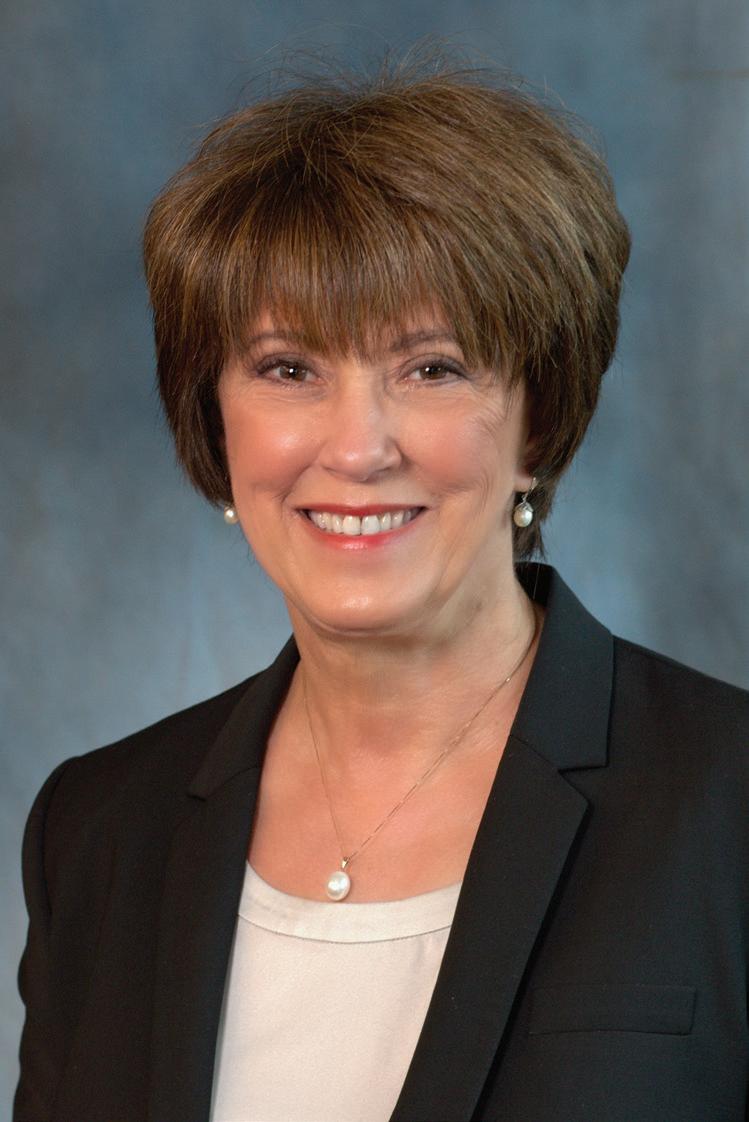


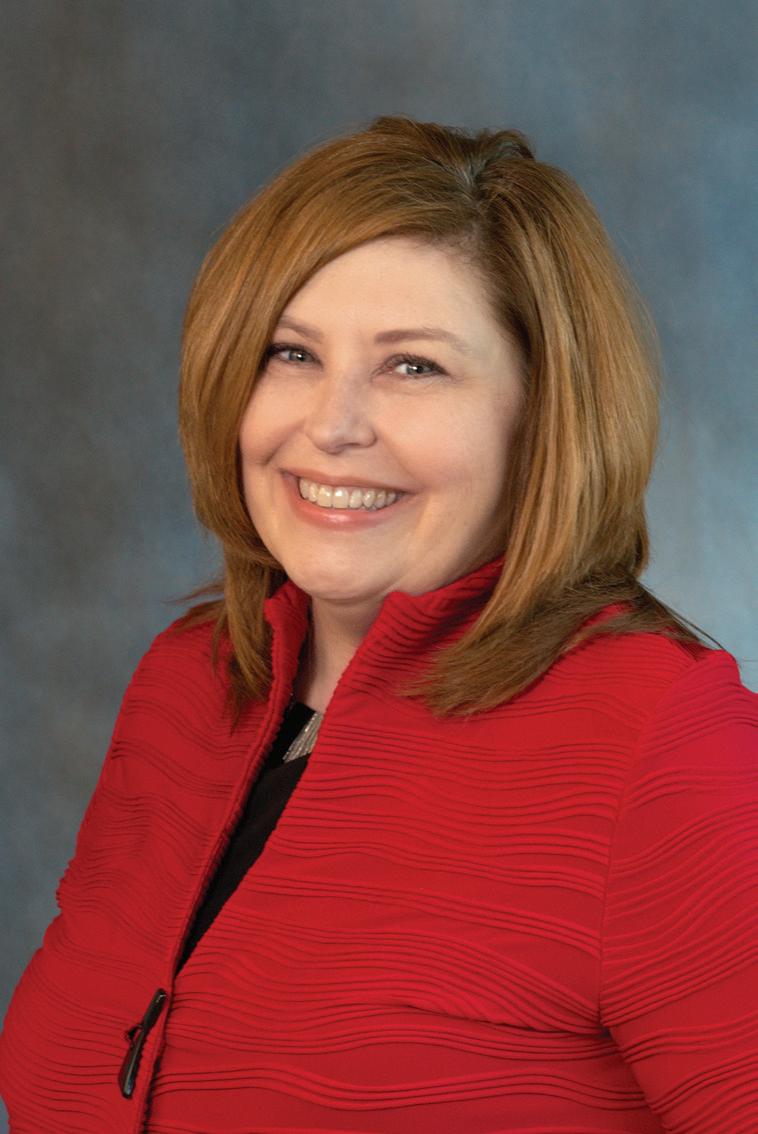
Ashton Adcock
Merchants & Farmers Bank
Ashton Adcock is a 1981 graduate of Dumas High School; a 1985 graduate of the University of Arkansas in Fayetteville, where he earned a business degree in banking and finance; and a 1988 graduate of the University of Arkansas at Little Rock School of Law, where he earned his juris doctorate degree. He practiced law in Little Rock until 1996, when he joined the staff of the bank. Adcock has served on the board of directors of Merchants & Farmers since 1991, has chaired the board since 1994 and currently holds the positions of chief executive officer and chairman of the board. The bank started in Dumas in 1909. In 2011, it opened a branch in Bryant and expanded into Benton with a downtown location in 2021.
Mark Amox
Unity Health

Mark Amox, FACHE, is president and chief executive officer for Unity Health. Headquartered in Searcy, Unity Health is a comprehensive health-care system comprising four hospitals, multiple clinics and specialists serving eight counties in central Arkansas. Amox began at Unity Health in November 2022. His primary focus is on the people, patients and communities Unity Health serves by delivering on the organizational mission to improve health and well-being through compassionate care. He has more than two decades of health care leadership and executive experience serving as COO at Regional Medical Center in San Jose, California; COO of Sunrise Children’s Hospital in Las Vegas; President/CEO of El Paso Children’s Hospital in Texas; and Administrator of Shands Children’s Hospital in Gainesville, Florida. Locally, Amox served for eight years as Administrator of Pediatrics at the University of Arkansas for Medical Sciences.
Curtis Barnett
Arkansas Blue Cross and Blue Shield
Curtis Barnett serves as president and chief executive officer for Arkansas Blue Cross and Blue Shield, which serves more than 2 million members nationwide.
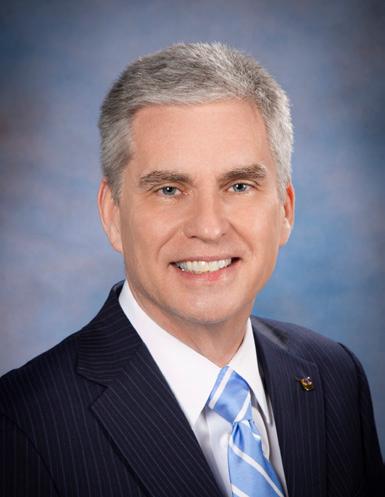
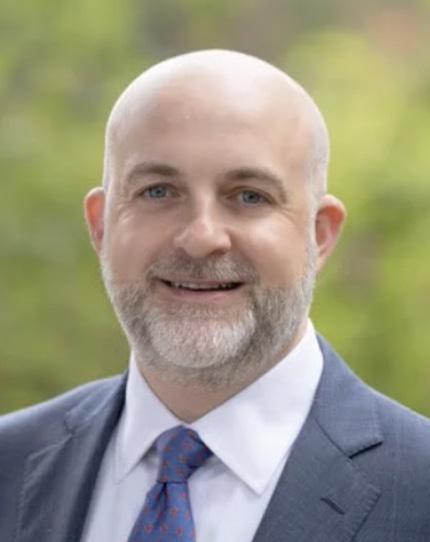
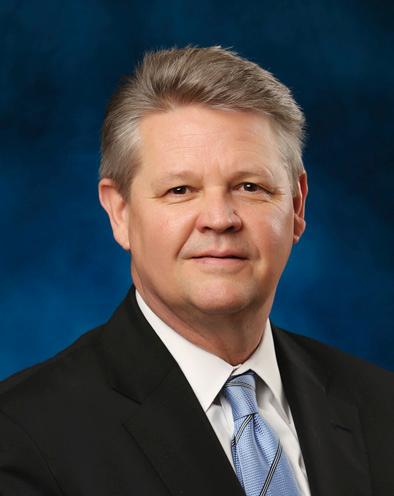
As president and CEO, Barnett is leading Arkansas Blue Cross’ efforts to help transform health care, striving to make it a more affordable and compassionate system. Prior to his election as president and CEO in 2017, Barnett served as senior vice president of internal operations for Arkansas Blue Cross and as president and CEO of its wholly owned subsidiary company, USAble Corporation.
On the national front, Barnett serves on the board of directors for the Blue Cross and Blue Shield Association and the National Institute for Healthcare Management (NIHCM). He leads as chairman of the Board of Managers for Blue Health Intelligence, a health care data analytics and solutions company, and as co-chair of the Roundtable on Innovations in Mental and Behavioral Health for the Health Evolution.
Chief Technology O cer Rasesh Patel exemplifies our values of high-performance and thoughtfulness. We’re proud of his work and how he leads engineers. Together, Apptegy’s engineering team is building the tools that power the identity of over 3,000 school districts across all 50 states. Join Apptegy in Little Rock and do work that matters.

Congratulations, David Cobb, for being selected as a 2023 C-Suite Award recipient.
We commend your leadership in driving ArcBest’s financial growth forward and helping us continuously reach new heights. Thank you for 17 years of excellence and dedication to our company and industry.
David Cobb Chief Financial Officer
Katie Beck
Katie Beck is the CEO of the Arkansas Hospitality Association, where she and her team serve as the voice of the hospitality industry, representing restaurants, lodging, and travel and tourism businesses throughout Arkansas. Previously, Beck served six years in the administration of Gov. Asa Hutchinson in a variety of roles. Prior to joining the association, Beck worked as communications director for Hutchinson and represented his office in Washington, D.C.
Beck is a graduate of the University of Arkansas, where she earned bachelor’s degrees in journalism and history. She received her J.D. from the University of Arkansas at Little Rock, William H. Bowen School of Law.
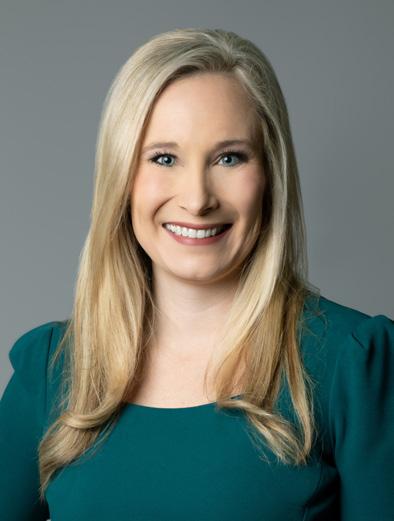
Bret Carroll Conway Corp.
Bret Carroll serves as chief executive officer of Conway Corporation, a company that provides electric, water, wastewater, video, internet, voice and security services to the city of Conway. He began his career with Conway Corp. more than 20 years ago as chief financial officer. He earned a BBA in accounting and an MBA from the University of Central Arkansas and is a certified public accountant. He is recognized by the American Public Power Association as a certified public power manager.
Carroll serves on a number of industry boards, including the Arkansas Cable and Telecommunications Association, Arkansas Municipal Power Association, Arkansas One-Call, Conway Development Corporation, Mid-America Cable Television Association and the Mid-Arkansas Water Alliance.
He is active with numerous organizations and has served on several nonprofit boards, including the Conway Area Chamber of Commerce, Big Brothers and Big Sisters, Boys and Girls Club, Gideons International, Rotary International, Salvation Army and the United Way of Central Arkansas.
Scot Davis
Arkansas Urology
E. Scot Davis is the chief executive officer of Arkansas Urology in Little Rock. He joined the clinic in May of 2013. Davis has nearly 30 years of physician practice management experience serving in a variety of roles with expertise in physician recruitment, joint venture arrangements, compensation modeling and operational efficiency. He also serves as the managing partner of Uroventures LLC, a management development company owned by independent urology physicians that seeks out innovative clinical ventures.
Davis is a partner in Freeway Park Properties, a urology-based properties holding company, and serves as the managing partner of Centerview Management Services, a physician practice-specific management support company.

Before moving to Little Rock, he served as CFO of Baptist Medical Group in Memphis and CFO of Northeast Arkansas Clinic in Jonesboro, where he served a dual role as interim COO.
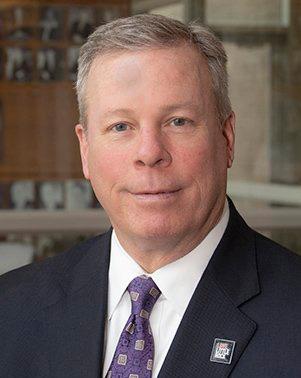
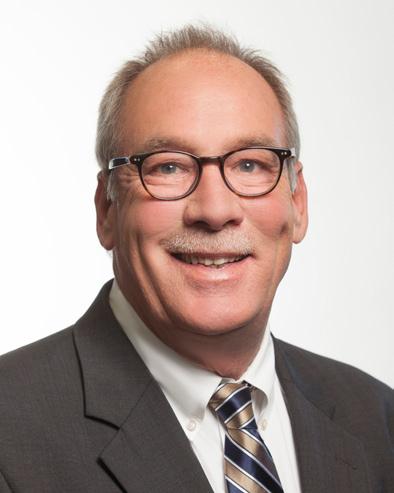
Jay Chesshir
Little Rock Chamber
Jay Chesshir is well-known for his involvement in the capital city’s development. In 2006, the proud native of Nashville became the 15th president and CEO in the 143-year history of the chamber.
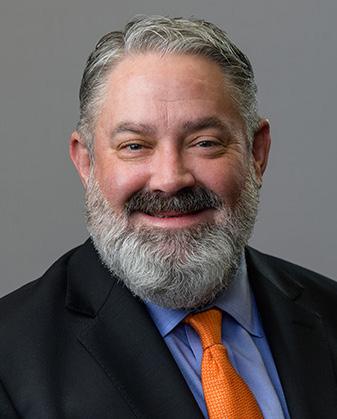
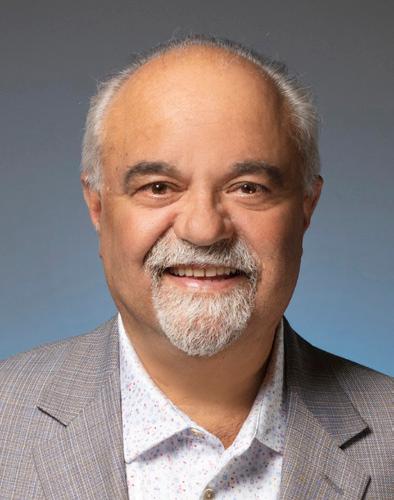
Chesshir began his career at the chamber in 2005 as economic development vice president. He also served as senior staff executive for Fifty for the Future and executive director of the Metro Little Rock Alliance, an 11-county marketing coalition dedicated to promoting central Arkansas. In 2016, Chessir was elected national board chair of the Association of Chamber of Commerce Executives (ACCE), representing more than 7,500 chamber professionals from more than 1,300 chambers of commerce across the United States and Canada. The next year, he became the only person in ACCE’s 103-year history elected to serve a second term as board chair.
Dennis Clay
Crews & Associates
Dennis Clay drives the strategic direction and operational performance of the Crews team as it assists clients in Arkansas and across the country in navigating financial markets. His commitment to stewardship and service – backed by delivering reliable value to investors and bond issuers – positions the organization for consistent performance long term.
Before becoming CEO in 2020, Dennis was head of sales and trading. His extensive background includes serving as a municipal underwriter for 28 years and underwriting more than $100 billion in municipal bonds. His experience includes developing a dedicated municipal sales force, building a super-regional competitive underwriting group that covered the entire country and constructing an internal system that pre-markets and distributes negotiated municipal bonds to numerous class investors.
Jessica Flake Dearnley
Flake and Company
Jessica Flake Dearnley has more than 20 years of experience in commercial real estate. She is a chartered financial analyst (CFA), a certified public accountant (CPA) and a certified commercial investment member (CCIM). Dearnley is licensed in Arkansas, Oklahoma, Missouri and Texas. She graduated from Carnegie Mellon University with a double major in cognitive psychology and creative writing, from the University of Miami with an MBA in finance and investments, from the University of Arkansas with a master’s degree in accountancy and currently is finishing a master’s in finance at Johns Hopkins University.
Dearnley serves on the Little Rock Tech Park Board, the Little Rock Chamber of Commerce Board, Fifty for the Future, Member-
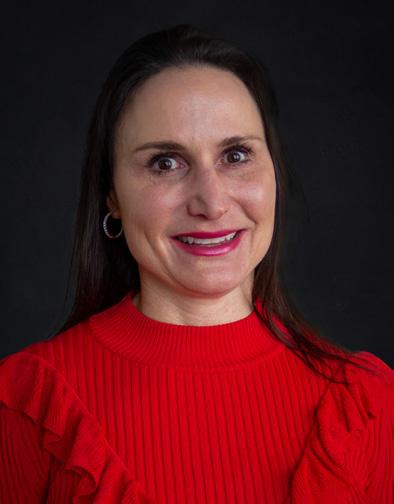
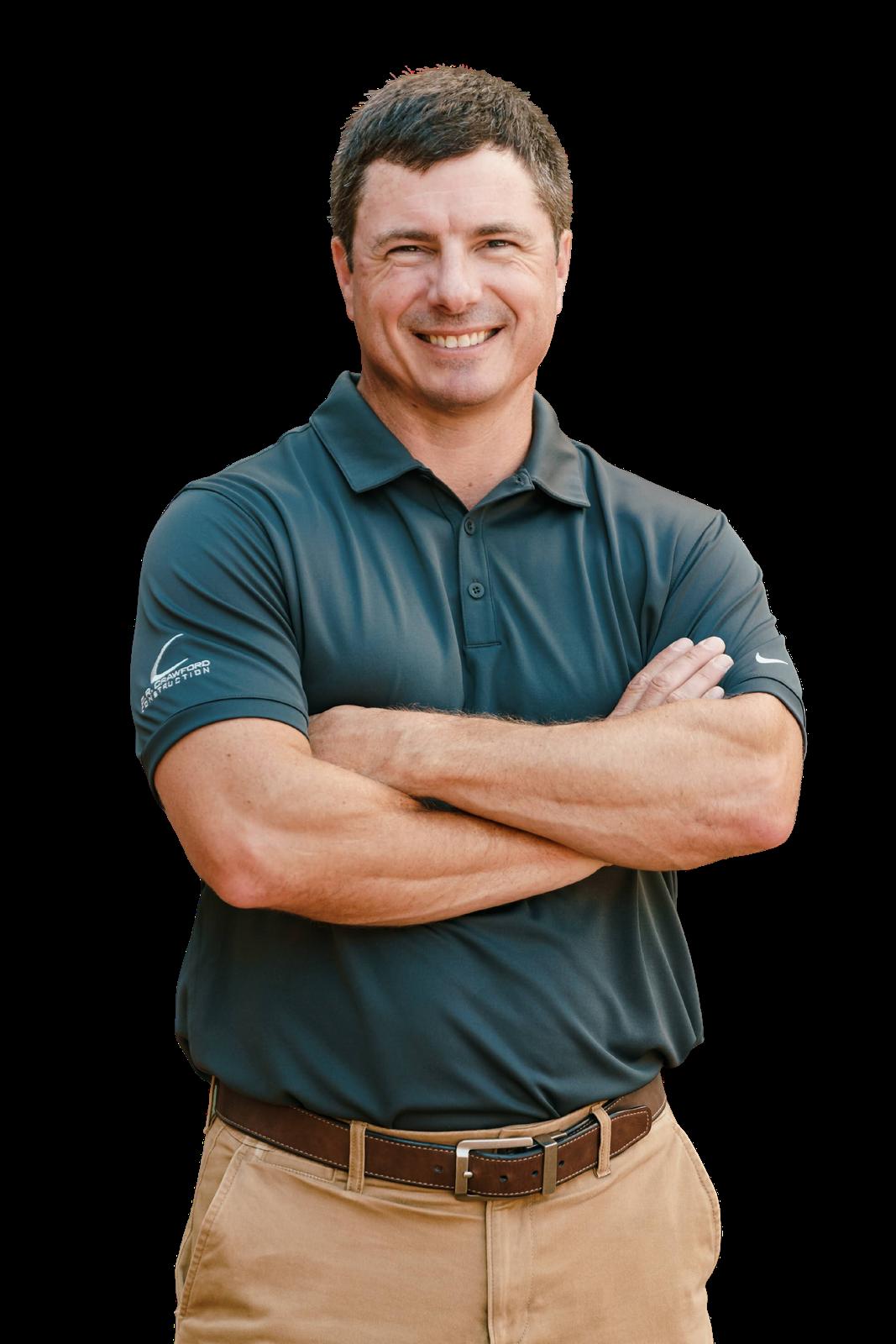
Curtis Barnett’s roots run deep in Arkansas. His life and work experiences have led him to advocate for Arkansans whether in the Natural State or on the national stage. He recognizes that whole person health must be addressed –the physical, behavioral, and social needs together – for his fellow Arkansans and communities to thrive in our great state. So, you may hear of him listening to health needs in the Delta or communicating the need to normalize the mental health conversation in D.C. For sure, you can count on this CEO to lead with passion and compassion so that Arkansans can live their best life, their whole life long. Curtis is taking good care of Arkansas!
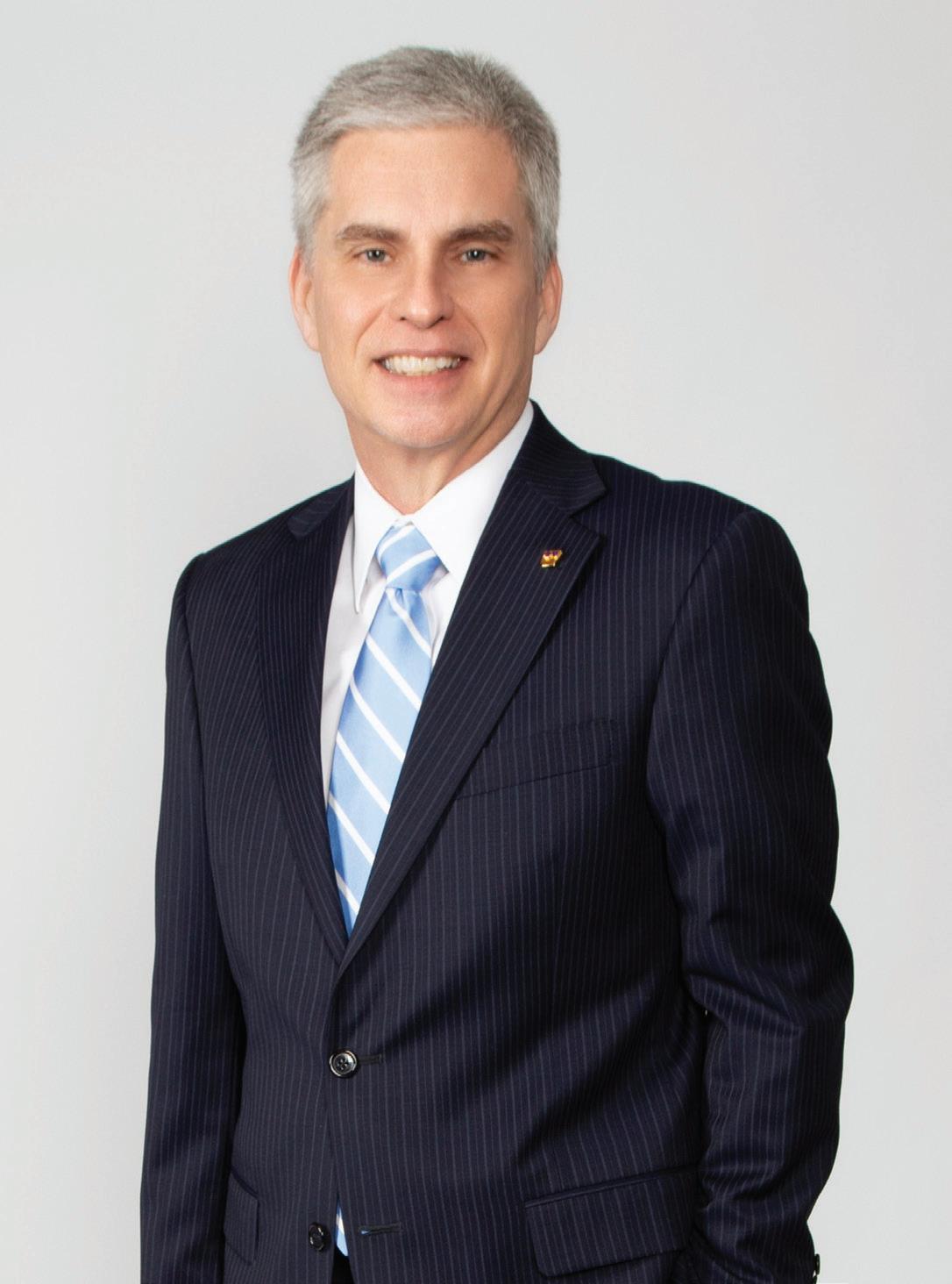
00780.03.01-0223

ship Committee and Board of Directors, Arkansas Women’s Leadership Forum and Vistage International. She has professional experience ranging from wealth management, as both financial and credit analysts; asset management; development and brokerage.
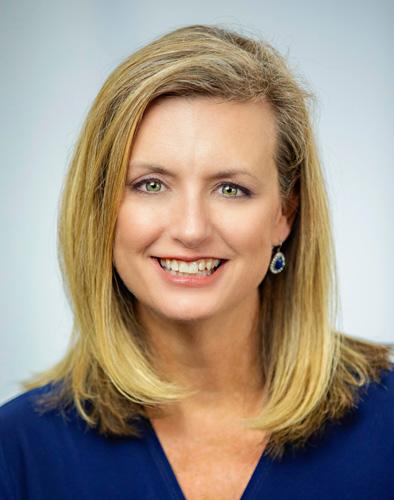
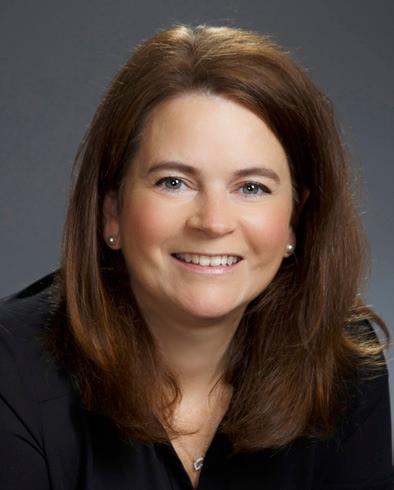
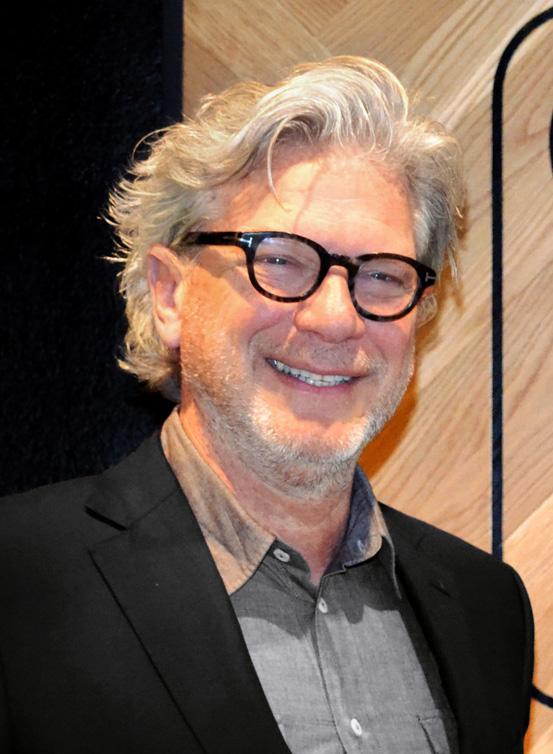

Andrew Faulkner serves as the owner and CEO of Staley Technologies in Little Rock. Prior to purchasing Staley Technologies, Faulkner owned and operated Advanced POS Solutions. Advanced POS Solutions was a leading value added reseller of point-of-sale solutions and received numerous industry accolades. In 2018, Faulkner completed the acquisition of Staley Technologies and the subsequent merger with Advanced POS Solutions. Through organic growth and multiple acquisitions under his leadership, the company has rapidly grown into a national technology player with over 250 employees and offices in Little Rock; Springdale; Atlanta; Orlando; Columbus, Ohio; Lansing, Michigan; Boise, Idaho; and Los Angeles.
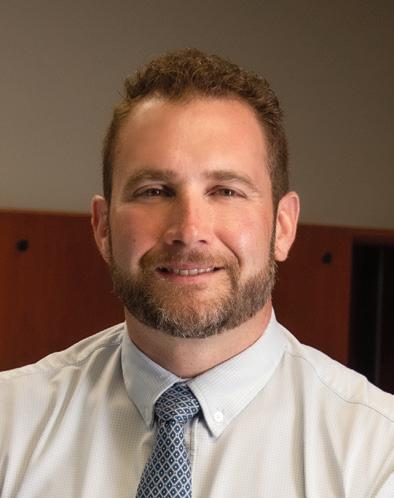
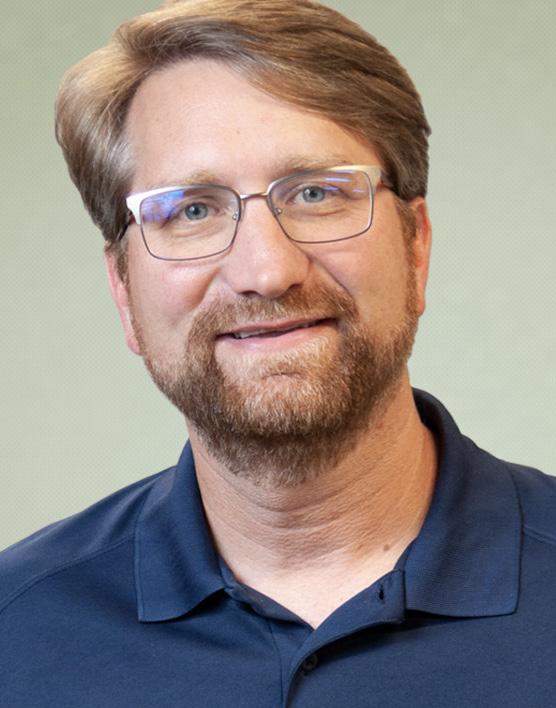
Staley Technologies deploys commercial technology nationwide to help clients stay relevant in ever changing environments. Faulkner is committed to providing the best possible service, exemplified in the company’s 200 W2 technicians across the country.
Bob Fehlman was named chief executive officer of Simmons First National Corporation and Simmons Bank effective Jan. 1, 2023. Prior to assuming the role of CEO, he served as president and chief operating officer. With more than 30 years of experience with Simmons in finance and accounting, he has served as CFO, treasurer and controller and in audit, serving as audit manager and IT auditor. He also provided critical support for merger and acquisition activity, analyst and investor meetings and leading the company’s capital management. Fehlman started his career in public accounting before joining Simmons. A certified public accountant, Fehlman is a graduate of Henderson State University.
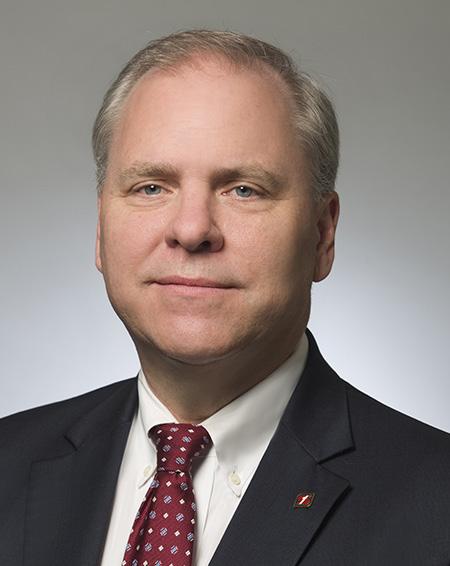
Terry Fitch serves as chief executive officer at Good Day Farm, bringing decades of leadership experience and business expertise. Fitch spent more than 20 years at Coca-Cola Enterprises and the CocaCola Company, leading both domestic and international marketing and sales. After transitioning out of the beverage industry, he dove into the world of building and leading hydroponic growing operations in both Colorado and Arkansas. He most recently served as president of Hydrofarm Holdings Group Inc. In this role, he further established the legacy of Hydrofarm by applying his knowledge of supply chain manage-
ment, operations and market share expansion. His experience in hydroponics led him to the cannabis industry.
Through his wide array of experience, Terry unifies the efficiency of a Fortune 100 company with the ingenuity of the hydroponics industry.
Ryan Flynn was named president of Network Services Group in late 2013. Network Services Group provides IT support and voice-over IP telephone solutions for many businesses across the state. Under Flynn’s leadership, NSG has grown from 11 employees and a single location in North Little Rock to more than 85 employees and three locations in Arkansas. Flynn also has served as president of the Cabot Rotary Club, two terms on the city council of Cabot, on the Cabot Parks and Recreation Commission and on the Lonoke County Election Commission.
Elizabeth Smiley Glasbrenner is a cofounder of Smiley Technologies Inc. Having served as president and CEO since 2015, she drives the strategic direction and financial performance of the company with the input and support of her executive management team and with a passion for customer service. Her vision for Smiley Technologies is shaped and influenced by her experience building and managing the customer support, operations, conversion and audit functions of Smiley Technologies when the company was first established in 2002.
Her previous experience includes both development and special events roles at Carolinas Healthcare Foundation, Children’s Miracle Network and National Sports Center for the Disabled in Winter Park, Col.
Glasbrenner has a unique interest in communities and helping those in need. She has developed and managed corporate giving programs for her family’s limited partnership. She has a bachelor of science in business administration from Washington University in St. Louis with a double major in marketing and management.
Janet Harris has served as executive director/CEO of the Winthrop Rockefeller Institute since 2022 and has been with the institute since 2016. Harris’ achievements at the institute include the development of strong and collaborative teams, building and executing convening services aligned with the institute’s mission and envisioning creative marketing and technology strategies to tell the story of Gov. Winthrop Rockefeller and the institute’s impact.
Specific achievements include building staff capacity in professional meeting design, facilitating dialogue and deliberation as well as creating educational programs that draw on Winthrop

Kindness is a gift that each of us is born with. And when we share it, the goodness that’s released is amazing. This human connection is important to our well-being, but it’s essential when we’re sick and hurting. We know from experience that treating every patient with kindness, empathy, and respect is key to their healing. We call this power humankindness. It has driven us for more than 130 years. It advances the medical excellence we provide to our communities now. And it leads us forward every day.
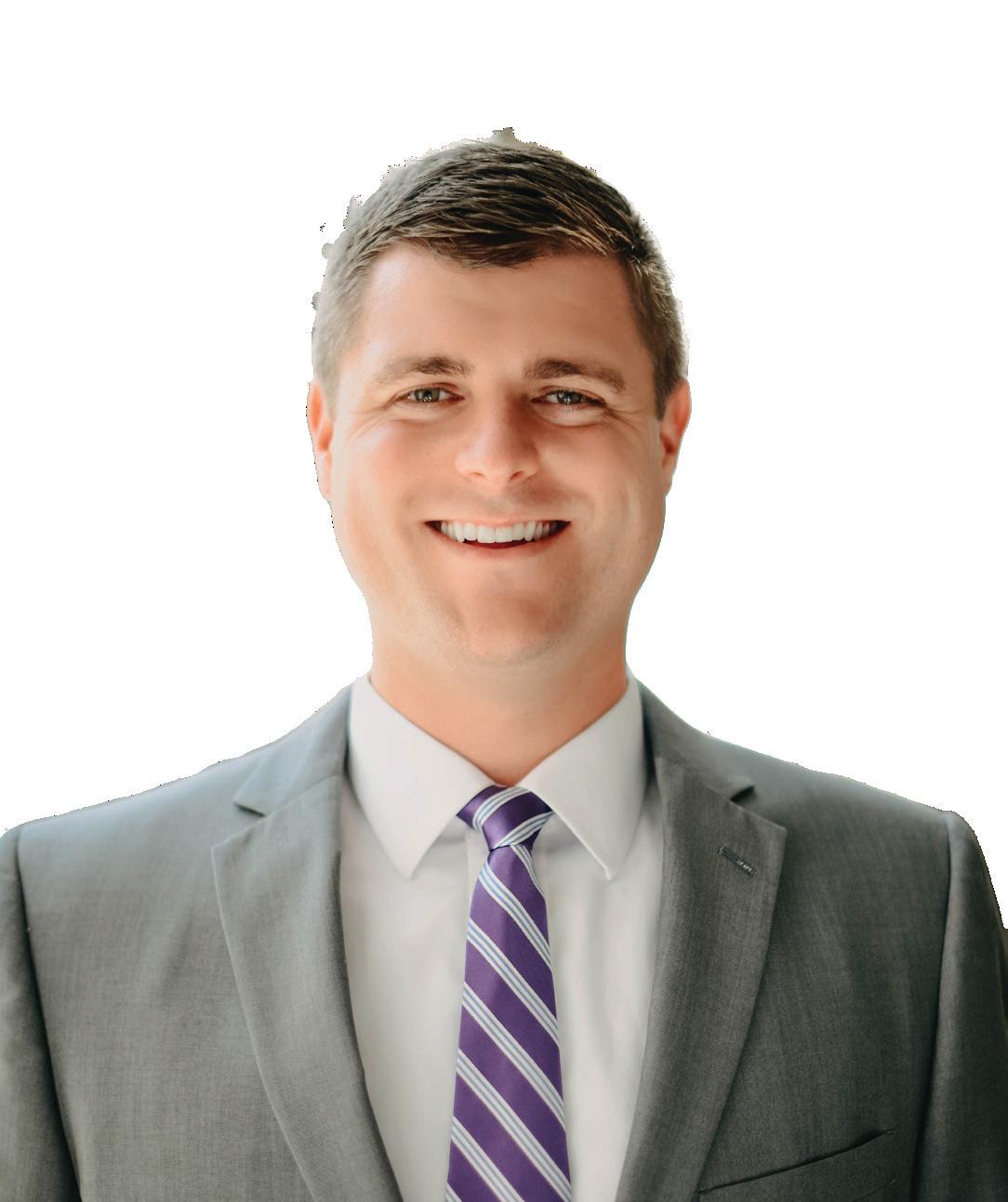

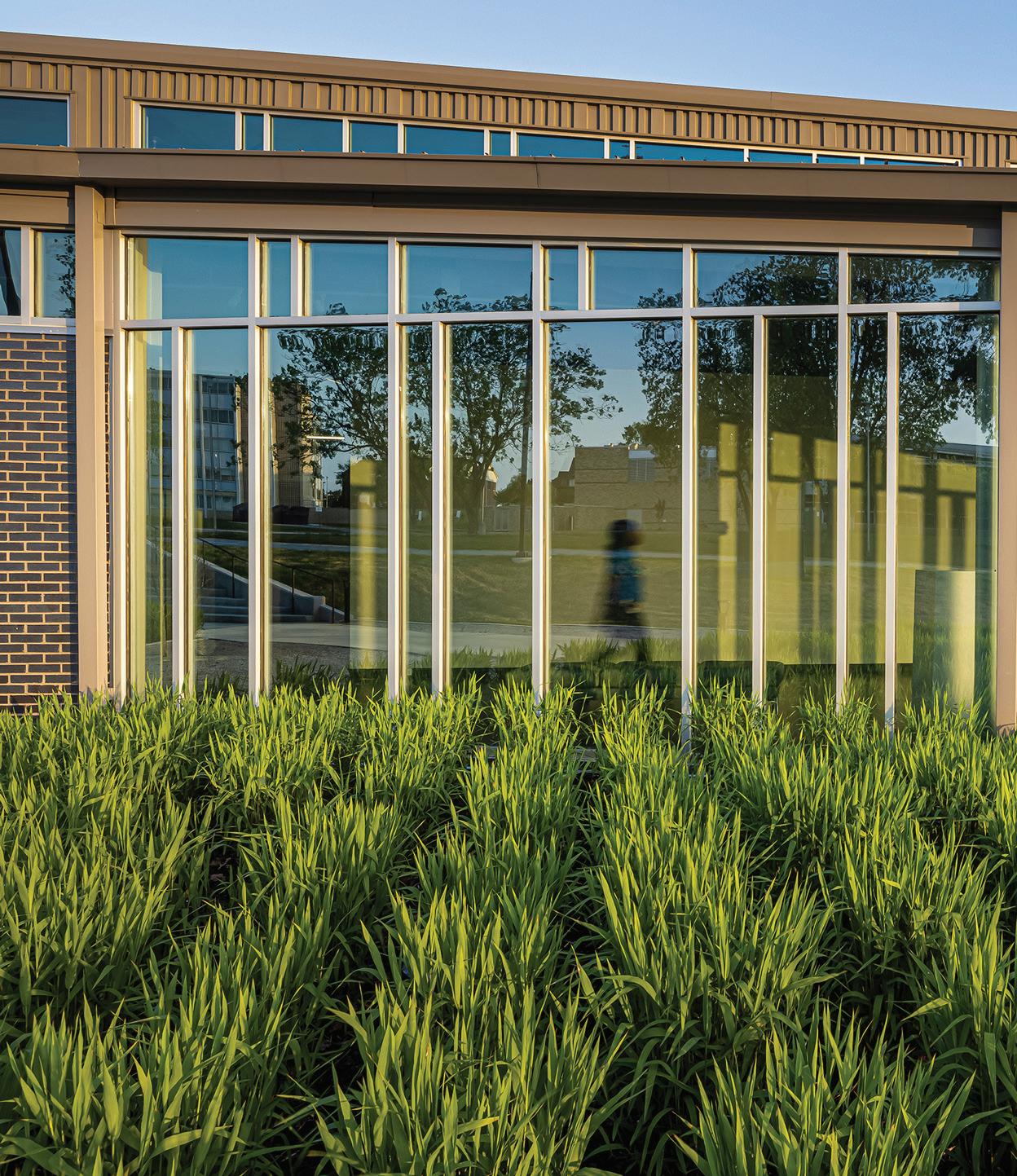

Rockefeller’s legacy, including the institute’s Walks with the Governor workshop. Harris speaks to groups frequently on the history and legacy of Gov. Rockefeller and is trained in facilitation and dialogue. Before joining WRI, Harris spent 20 years as a public administration professional in Arkansas, holding several executive leadership roles in state government. She holds a master’s degree in public administration from the University of Arkansas at Little Rock and a bachelor’s in public administration from the University of Central Arkansas.
Brock Hoskins is chair of Garver’s management committee and became the Arkansas company’s ninth president and CEO during the firm’s 100th year. Founded in 1919, Garver is an employee-owned, multidisciplined engineering, planning and environmental services firm with more than 1,000 employees across the United States. It has been recognized as one of the best firms of its kind in the nation.
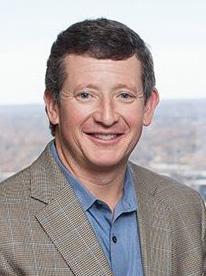
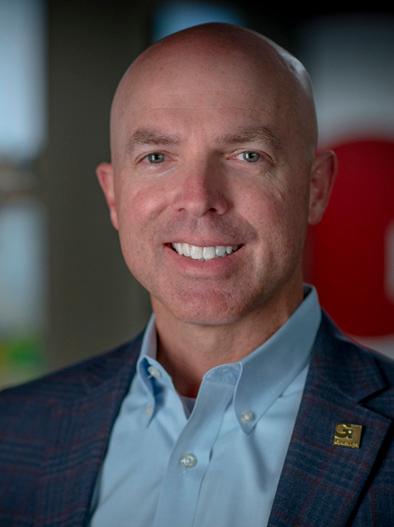
With more than three decades of experience, all of which have been with Garver, Hoskins has been responsible for designing and managing key infrastructure projects involving roadways, bridges, interchanges, airports, parking lots, parking decks, storm drainage, wastewater treatment and collection systems and site development.
Hoskins is a member of the Arkansas Academy of Civil Engineering. He founded and serves on the board of the Christian Orphan Fund, which has financially helped more than 150 families with adoptions over the past nine years. Brock has been recognized with several prestigious awards in recent years – notably the University of Arkansas Distinguished Alumni award in 2021 and the Arkansas 250.
Inuvo
Richard Howe is an accomplished entrepreneur, technology executive and board member. He received a Bachelor of Engineering from Concordia University, where he graduated first in his class, and a Master of Engineering from McGill University, where he was a Natural Sciences and Engineering Research Council Scholar. His business successes have included building multimillion-dollar startups, running billion-dollar corporations, merging public and private companies, acquiring strategic assets, reinventing technology businesses and developing high performing teams across three continents. He has been involved in M&A activities in excess of $1 billion dollars and has served as an officer of two public companies.
Howe is a patented inventor having specialized in machine learning, analytics and big data technologies that have addressed problems in marketing, fraud detection and risk management. He currently is the chairman and CEO of artificial-intelligence technology innovator Inuvo, a roughly $80 million-a-year business that has reimagined how information is captured and used to create online audiences for brands and agencies.
Kevin Huchingson is chairman and CEO of Colliers | Arkansas as well as a founding partner of Tempus Real Estate Partners. He joined the Colliers’ (then known as Barnes, Quinn, Flake & Anderson) brokerage team in 1993, became a principal in 1997, was elected president in 2002 and became chairman/CEO in 2017. He has guided the firm through several mergers including its most recent 2016 merger with Irwin Partners in Little Rock as well as the firm’s 2004 affiliation with Colliers. Huchingson remains active in industrial, office and investment brokerage as well as consulting assignments for select clients. He has been honored with membership into Colliers’ exclusive Everest Club each year for the past 12 years in recognition of Colliers brokers nationwide who have performed in the top 10 percent of brokerage, valuation and corporate solutions based on revenue production.
From 1995 through 2018, Marla Johnson focused on scaling complex internet-related applications and digital marketing efforts for businesses across multiple industries as CEO of the pioneering company Aristotle Inc. During that period of remarkable innovation, she became adept at prognosticating and advancing game-changing tech innovation – often on a speaking circuit, telling her audiences what was next and how they could ride the wave of digital transformation.
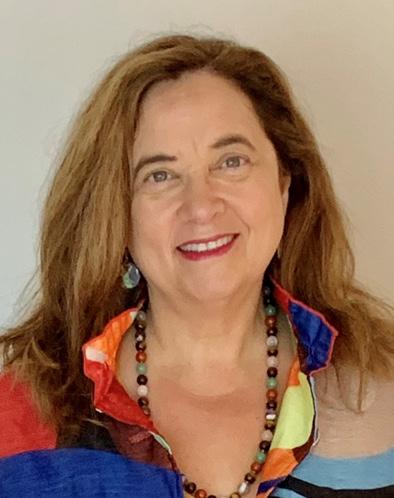
In 2018, Johnson and Brian Stack launched LeapXL to deliver on a dream of simple, fast cloud computing with no code tools for data connection, application development and deployment (Platform-as-a-Service), resulting in lightning-speed development and deployment of Software-as-a-Service (SaaS), collapsing months of agile development into a few days. LeapXL has found a successful foothold in the financial services and tax areas by helping firms securely modernize and scale with innovative fintech to quickly respond to today’s demanding customers and get more products out to market faster without breakage.

As president and CEO of Edafio Technology Partners, Kenny Kinley leads the charge in helping, building and protecting clients’ businesses through information technology, cloud computing, M365 and cybersecurity solutions.
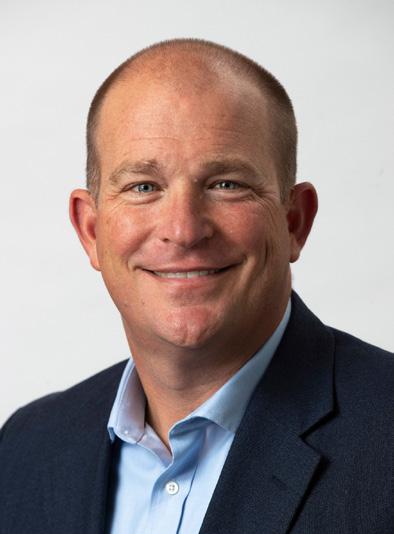
Kinley joined Edafio as vice president in 2011, was named president six years later and assumed the CEO role in January 2020. During his tenure with the firm, he led the expansion of the client base both geographically and by industry and oversaw strengthened marketing and business development capabilities — initiatives that led to significant growth in market penetration and
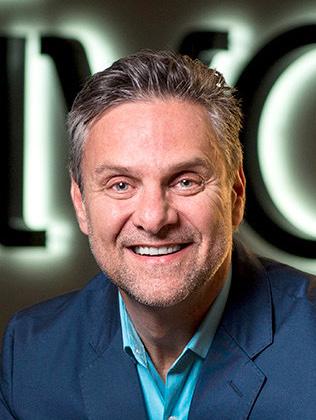
Congratulations to the members of our executive leadership team who have been recognized as part of Arkansas Money and Politics’ distinguished C-Suite Executives for 2023.
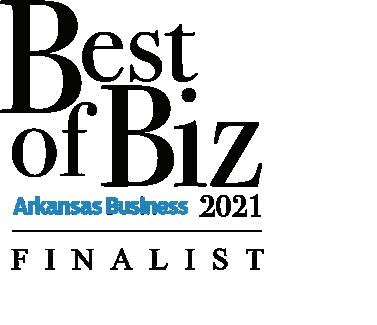
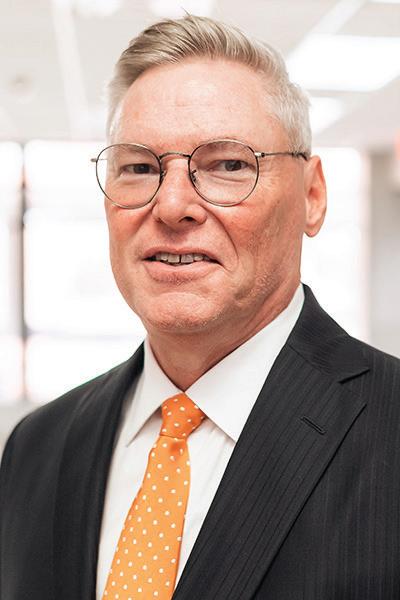

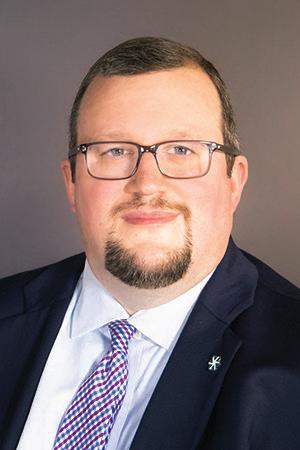
Conway Regional has been the community’s hospital for more than 100 years, providing high-quality, compassionate care. As our community continues to grow, we are growing alongside you to ensure all of your healthcare needs are met right here in north central Arkansas.
2nd Consecutive Year
3rd Consecutive Year
Best Place to Have a Baby Best Hospital Best Overall Company



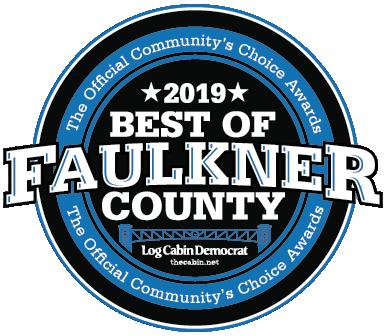
6th Consecutive Year
6th Consecutive Year
5th Consecutive Year
Matt Troup Chief Executive Officer Bill Pack Chief Finance Officer James Reed Chief Information Officerrevenues earned.
His near 25 years of experience in delivering technology products and services feature two decades in senior management. Prior to joining Edafio, Kinley held various client relationship and business development roles at Acxiom.
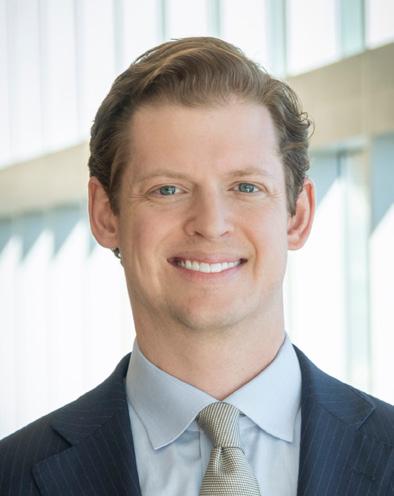
Kinley graduated from the University of Central Arkansas in 1995 with a bachelor’s degree in accounting; he is also a CPA.
Laura Landreaux ensures that Entergy Arkansas meets the power needs of more than 722,000 customers every day. She is also responsible for driving the company’s financial and operational business results, customer service, safety, resource planning, economic development, employee development and regulatory and governmental affairs.
She became president and CEO on July 1, 2018. Her career with Entergy Arkansas began in 2007 in the legal department. She then became manager of regulatory affairs for Entergy Arkansas in 2012. She went on to hold other leadership positions, including finance director and vice president of regulatory affairs, where she was responsible for interactions between Entergy Arkansas and the Arkansas Public Service Commission.
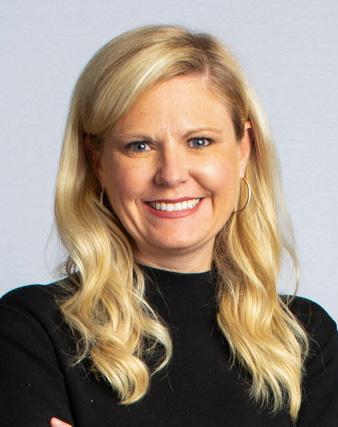
A native of Little Rock, Landreaux earned her juris doctor and bachelor’s degrees from the University of Arkansas in Fayetteville, and in law school was named to the Arkansas Law Review.
John David Lindsey, the son of Lindsey & Associates founder Jim Lindsey was born in Fayetteville in February 1971. He later graduated from Fayetteville High School in 1989 and the University of Arkansas in 1994. After a brief mini-tour professional golf career, he joined Lindsey & Associates in 1996 as general manager. Since 1999, he has served as principal broker and has been instrumental in the company’s growth. Under his leadership, Lindsey & Associates has also expanded to include three locations ahead of its 50th anniversary.
Lindsey says, “Working for the company has been the professional honor of my lifetime. I’m eternally grateful for my father, JW Gabel and everyone who has contributed to Lindsey & Associates’ success.”
Sam Lynd was named administrator and CEO of NEA Baptist Memorial Hospital in April 2020. Most recently, he served as COO for Baptist Memorial HospitalMemphis and administrator of Baptist’s system-wide emergency services. He joined Baptist Memorial Health Care as a Frank S. Groner Administrative Fellow in 2011 and was an assistant administrator at two Baptist Memorial
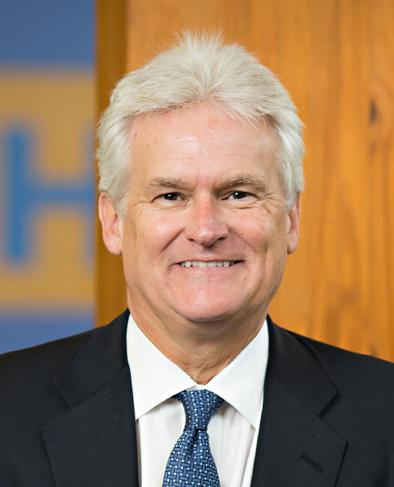
hospitals, including NEA Baptist, before becoming administrator and CEO of Baptist Memorial Hospital-Tipton in 2014.
Lynd holds a master’s degree in health administration and an MBA from the University of Alabama at Birmingham and a bachelor’s degree in health care management from the University of Alabama. He is a fellow of the American College of Healthcare Executives and serves as president-elect of the Tennessee Center for Health Workforce Development as well as a member of the Tennessee Hospital Association’s Small or Rural Hospital Executive Committee.

Alan Morse joined Ritter Communications in February 2014 as president and was named CCEO in October 2019. He is a highly accomplished telecommunications executive with an extensive background in strategic planning, sales, marketing, network engineering and operations. Immediately prior to joining Ritter, he was the principal of the Morse Consulting Group, having successfully served as president and CEO of Integrated Mobile Inc. leading up to its 2012 acquisition.
From 2002 to 2007, Morse was COO for iPCS Inc., a publicly traded wireless communications affiliate of Sprint based in Chicago with service areas spanning 15 states. Prior to that, he was COO for Telepacific Communications Inc., a private equity-backed CLEC providing business internet, telephone and data services in the California and Nevada markets.
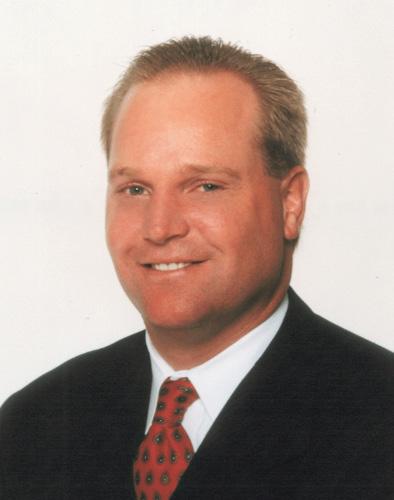
Alan is a graduate of Ohio State University. He’s involved in numerous philanthropic organizations including the American Cancer Society, the Arkansas State University EARIS business incubator program, the Jonesboro Chamber of Commerce and the Ohio State University President’s Club.

Michael Morton incorporated Central Arkansas Nursing Centers in 1990 and has grown it into one of the state’s largest administrative services companies. It services 37 skilled care facilities, an assisted living facility and numerous other related businesses including a group purchasing organization, pharmacies, a mobile imaging lab and more, all owned by Morton. Central Arkansas Nursing Centers, based in Fort Smith, administers an annual payroll of roughly $150 million for more than 5,000 employees.
An Oklahoma native, Morton graduated from college at Northeastern State University in Tahlequah in 1972 and went to work as an accountant in an Oklahoma nursing home. By 1976, he and a partner had purchased a nursing home in Booneville and later built one in Perry County. Two years later, they purchased two more nursing homes in Hope, all before Morton’s 30th birthday and all of which he still owns and operates.
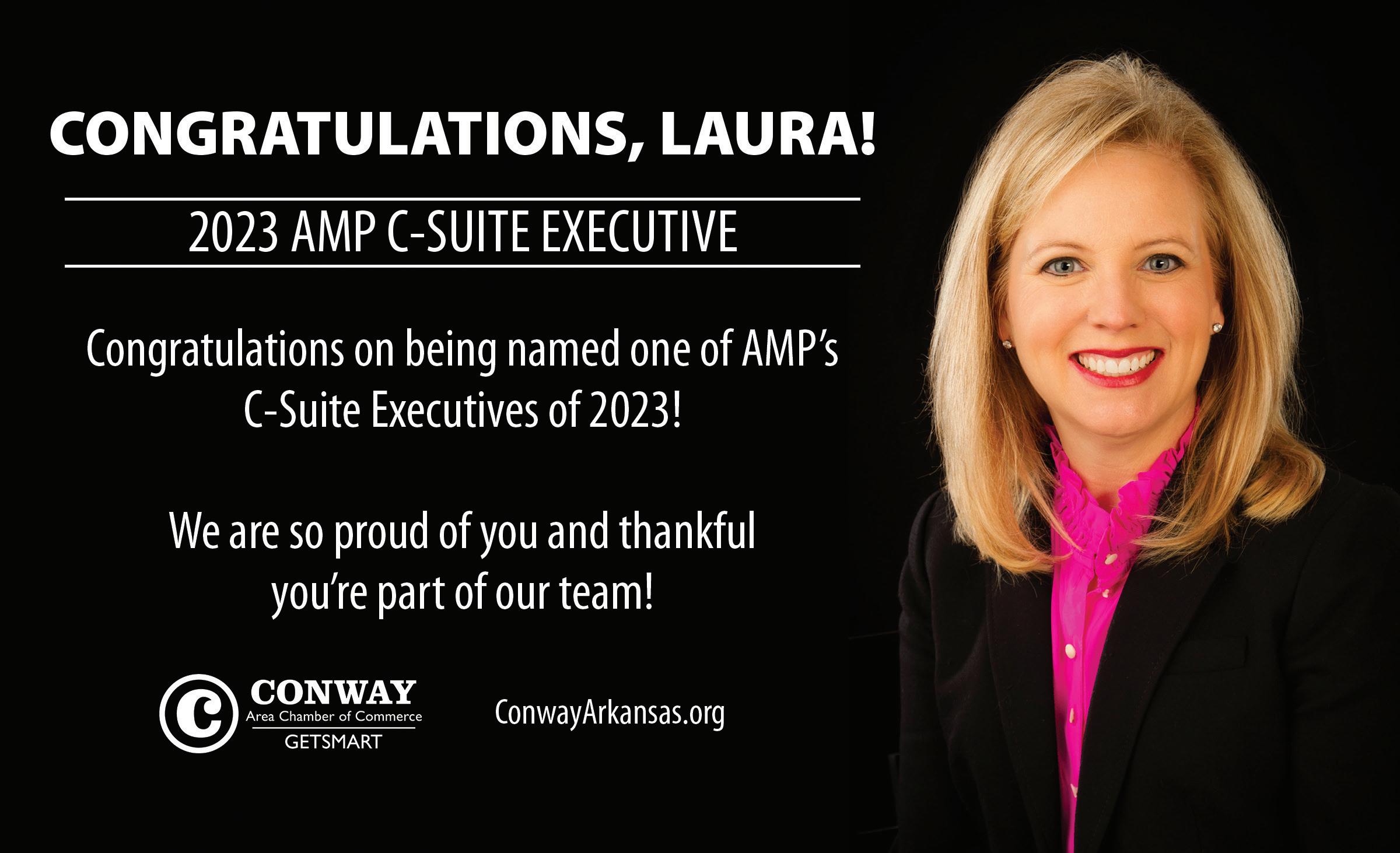



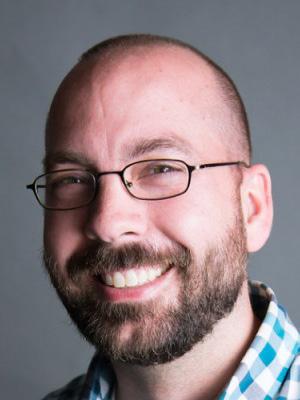
As co-founder of RevUnit, Machael Paladino says he “built a team of really smart people who like to nerd out on technology and data.” Launched by Paladino and Joe Saumweber, RevUnit has grown into a thriving company that works to create real change in some of the world’s largest companies through data and process. It works to create enterprise change faster by partnering with leaders to help them turn data into insights, reinvent critical processes and upskill their teams.
RevUnit has been named to the Inc. 5000 list of fastest-growing private companies four times, the Entrepreneur 360 list of America’s most innovative businesses and Entrepreneur’s top company cultures. Paladino is the former CTO for Arkansas startups Overwatch and Btiques, and he served in various tech leadership roles at Rockfish Interactive. The Little Rock native also served as chair of the Northwest Arkansas Tech Council.
Gary Paxson
White River Health
Gary Paxson, RN, BSN, MS, FACHE, is president and CEO of White River Health. Paxson provides vision and leadership to the organization’s mission of providing quality health care and improving the health of communities. Focusing on employee engagement, business fundamentals as well as innovation and growth, Paxson led the successful rebrand of the organization in 2022. At WRH, “Caring Beyond Healthcare” represents a deep-rooted dedication to building relationships that will ensure better health and brighter futures for the communities we serve. Stone County Medical Center and White River Medical Center earned the Chartis Center for Rural Health Top 100 designations since Paxson assumed leadership in 2019.
He is a fellow of the American College of Healthcare Executives and serves on the boards of the Arkansas Foundation for Medical Care, Arkansas Health Executives Forum Board, Arkansas Hospital Association as well as the Lyon College Board of Visitors.
Brandon Pinkerton
Brandon Pinkerton is a proud member of the Cherokee Nation and the CEO of HP Engineering Inc. He grew up asking the question, “Why?” He sought answers to everyday problems and was fascinated by the stories those answers provided. He graduated from the University of Arkansas and became a licensed professional engineer (PE) with licensure in 49 states and Puerto Rico. In 2007, he and his business partner opened HP Engineering with two employees.
Fifteen years later, HP has grown into one of the largest engineering design firms in the region, with almost 100 employees and five offices in Rogers, Tulsa, Oklahoma City, Dallas and Phoenix. In addition to his role as CEO, Pinkerton leads the company’s strategic planning and business development efforts. He has been the
managing principal for HP’s tribal work, electrical design teams and alternative energy source designs. In the spring of 2022, he was inducted into the Arkansas Academy of Electrical Engineering for his achievements in the engineering industry.
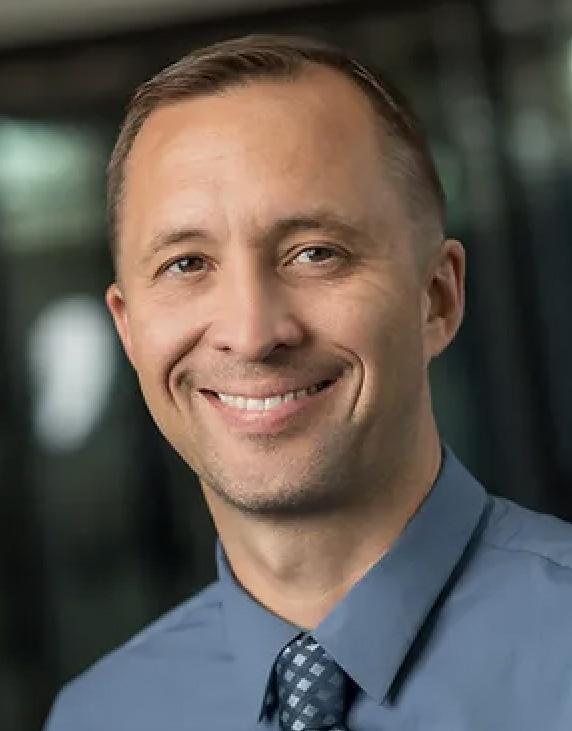

Molly Rawn
Experience Fayetteville
Molly Rawn is the CEO of Experience Fayetteville, the city’s destination marketing organization. She is responsible for the organization’s $4.8 million budget and 19 full-time employees. During her tenure, the city has seen unprecedented tourism growth including its highest HMR tax collection month on record. Rawn was a member of the leadership staff that opened the Scott Family Amazeum, an interactive museum in Bentonville, where she served as director of development and communications, overseeing the completion of the museum’s $28.5 million capital campaign.
After growing up in Paragould and Little Rock, Rawn relocated to Fayetteville to attend the University of Arkansas, and decided to make it her family’s permanent home. She is passionate about community engagement, community building and expanding opportunities for women in civic leadership.
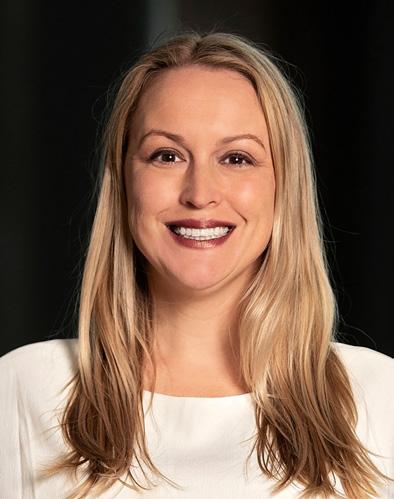
The only true failure in life is not trying. This simple yet profound statement summarizes Shanna Richardson’s professional scouting career, displaying a strong determination to take challenges and risks, with a firm belief that through focused efforts and persistence — positive results will follow.
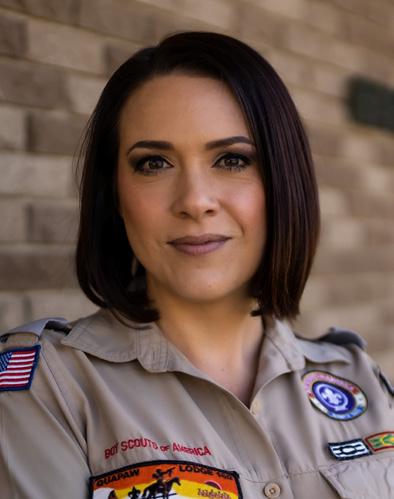

She is a seasoned professional with more than 22 years in the movement. Growing and sustaining scouting is her true passion, and Richardson has taken on the role of CEO at Quapaw Area Council, Boy Scouts of America, covering 39 counties in Arkansas. She began her scouting career in 2001 as a “scoutreach paraprofessional” at the Trapper Trails Council in Ogden, Utah. She moved on to become a district executive at the Utah National Parks Council in Provo, a field Director for the Central Florida Council in Orlando and the assistant scout executive at the Gulf Stream Council in Palm Beach, Florida.
Chris Roberts is chairman and CEO of Encore Bank, a private boutique bank headquartered in Little Rock. Roberts’ journey with Encore Bank began in 2019 when he became the chairman and CEO of the Capital Bank in Little Rock, a small bank founded in 1997. With just seven associates, $159 million in assets, one office in Little Rock and a vision to build a different kind of bank, the University of Arkansas finance graduate and his team rebranded that small Arkansas bank as Encore Bank and within three years turned it into one of the fastest growing banks in the country, according to data collected from S&P Global Market Intelligence.
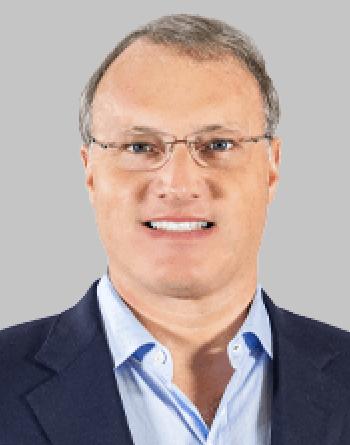


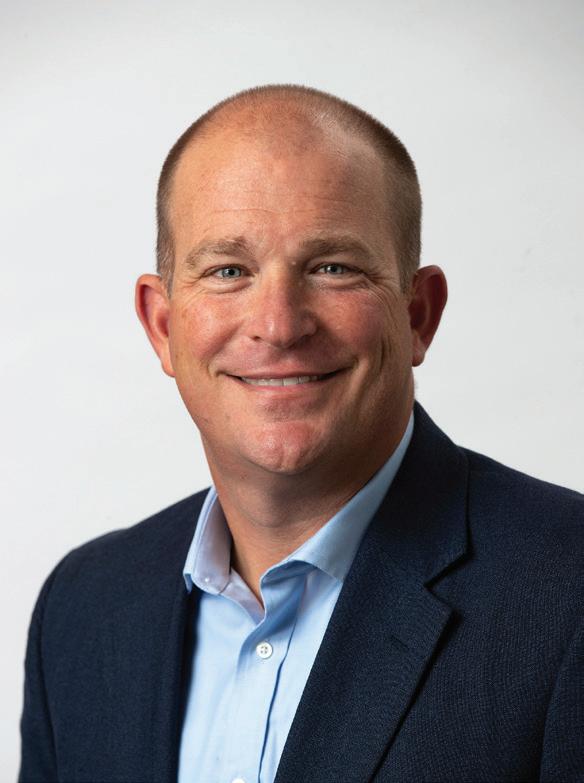
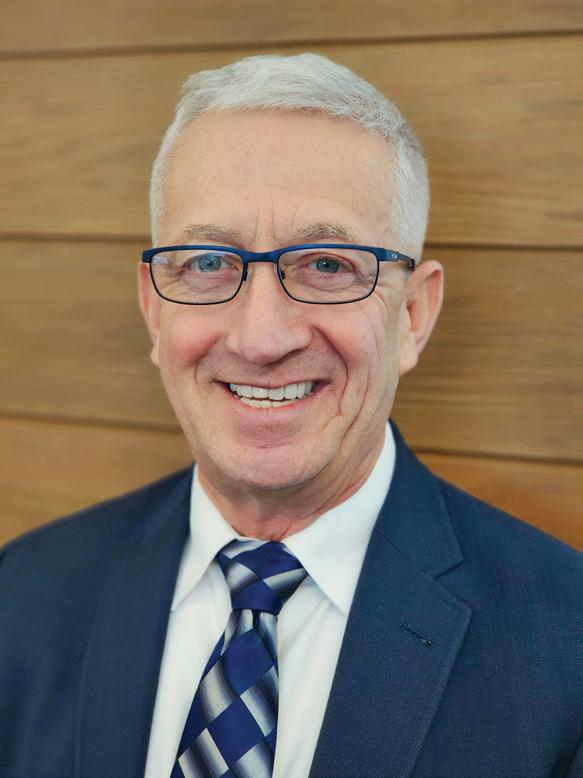
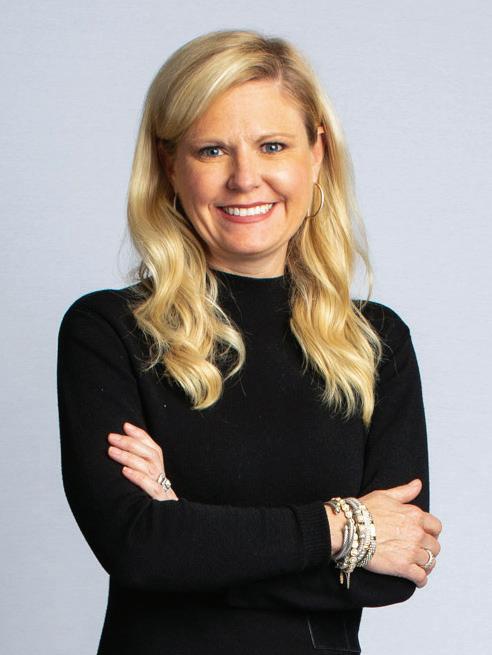

















Garver President and CEO Brock Hoskins knows leadership goes well beyond the corner office. It’s about honoring the values that have made Garver its clients’ most trusted advisor for over 100 years. And with an award-winning employee experience and best firm culture, Brock is ensuring that Garver’s tradition of excellence will endure for years to come.
Congrats, Brock, on being selected for AMP’s 2023 C-Suite Executive list!

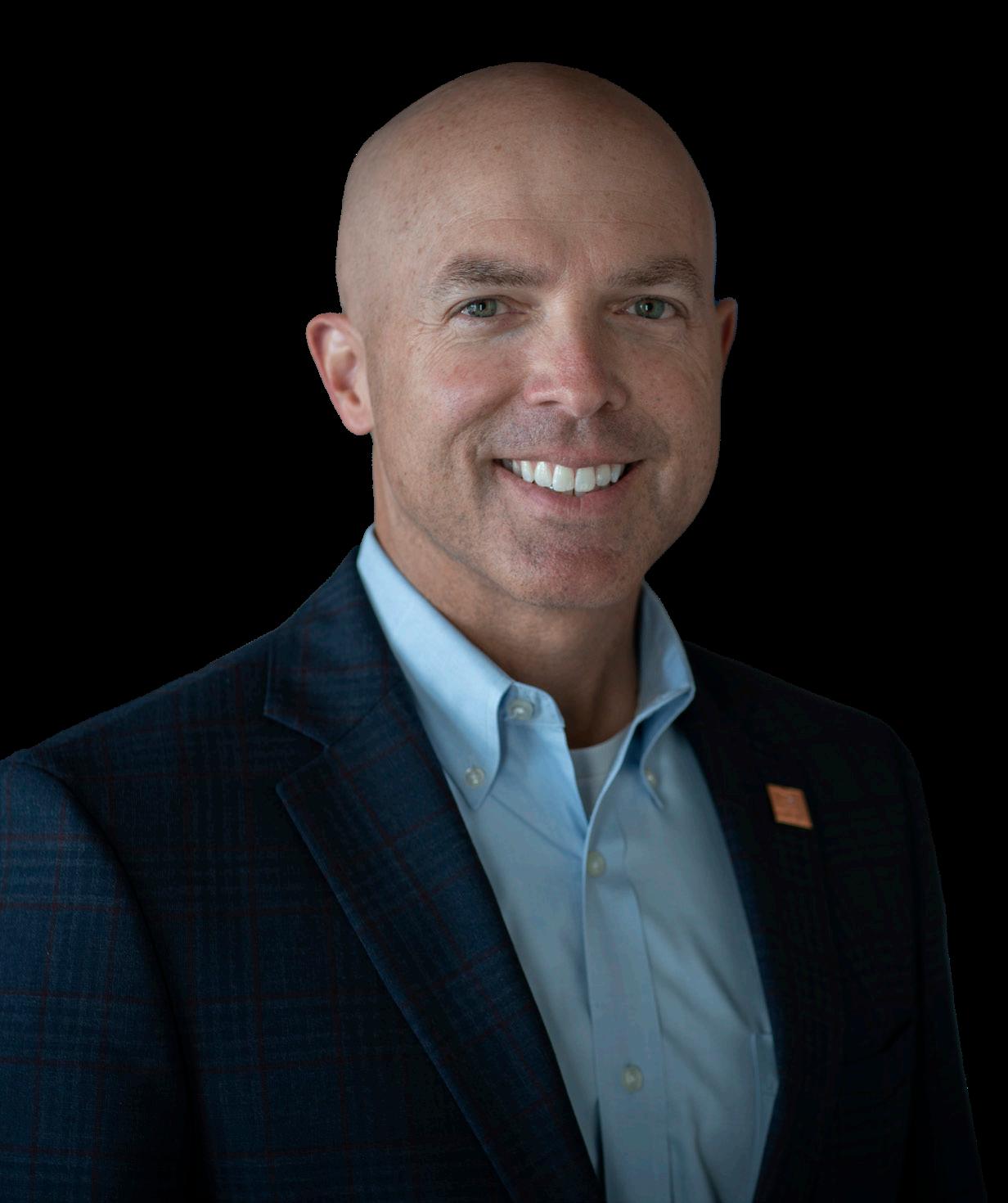
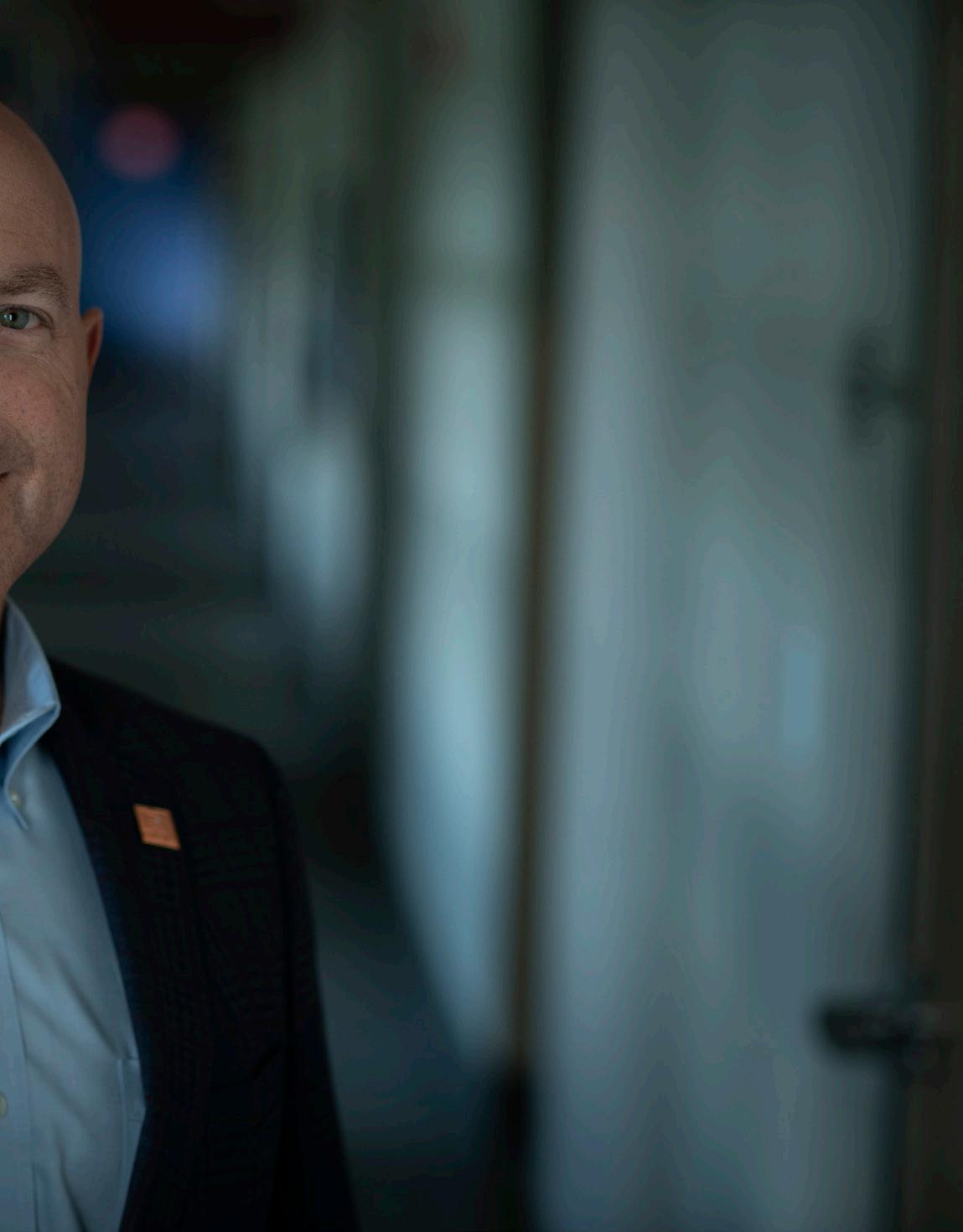 President and CEO
President and CEO
CONGRATULATIONS
L I N D S A Y L I N D S A Y W I L M O T T W I L M O T T
As a community bank that's been dedicated to serving Arkansas communities forward for 115 years, we're incredibly honored to have our Chief Operations Officer included in the prestigious Arkansas Money & Politics list of leaders shaping the future of our great state.
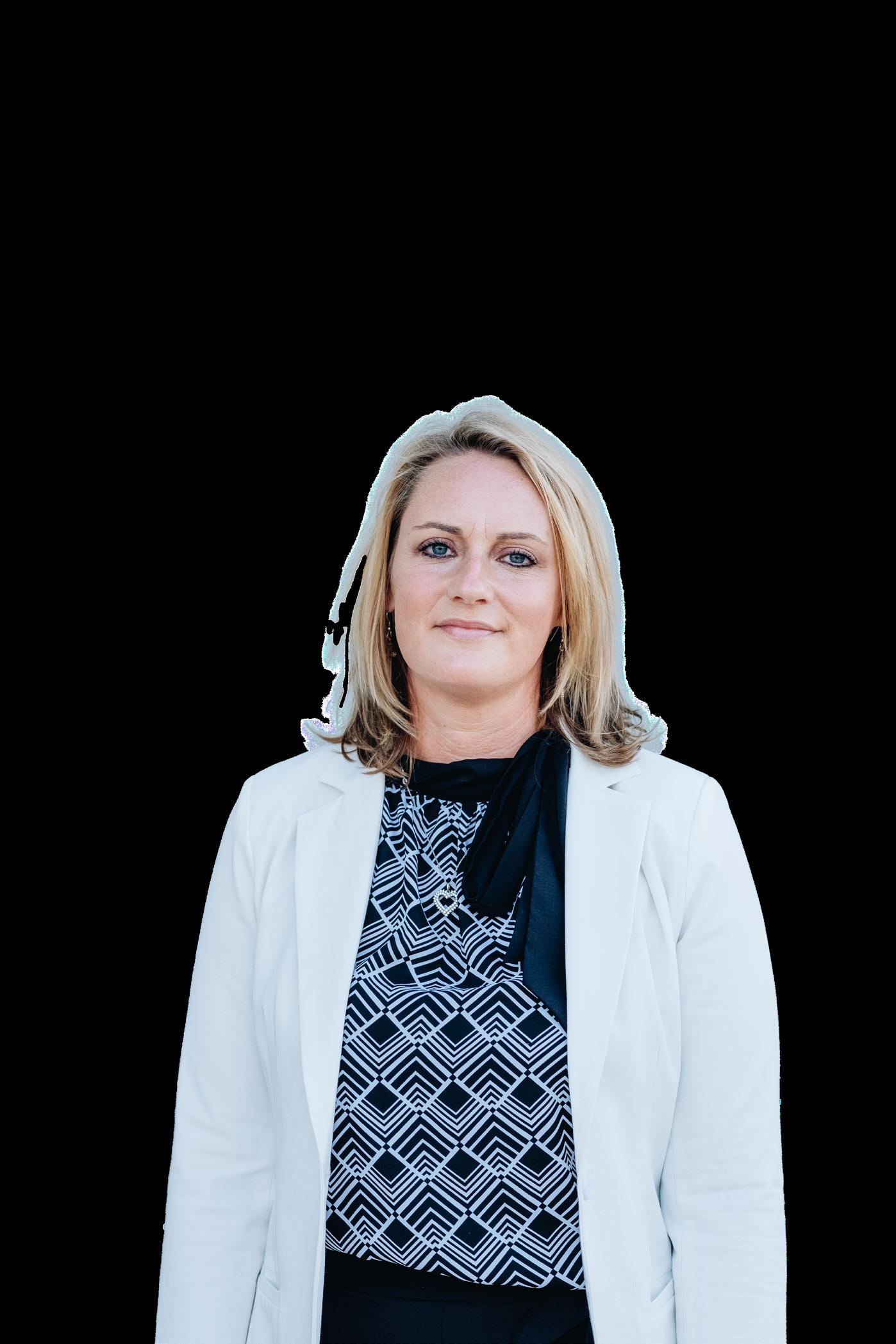

Under Roberts’ leadership, Encore Bank has completed three successful common equity raises, adding more than $368 million in capital, and expanded its footprint into 20 high-growth markets across eight states. As of Feb. 15, Encore had $3.58 billion in total assets, more than 1,900 shareholders and approximately 330 employees.
Farmers Bank and Trust
Randy Scott is president and CEO of Farmers Bank and Trust, a $350 million bank headquartered in Blytheville. He has been in banking for 33 years, including the last 23 years with Farmers.
Scott currently serves as chairman of the Arkansas Bankers Association. He also served as chairman of the Arkansas State Bank Board in 2019, where he continues to serve on the board. In addition, he serves as chairman of the board of trustees at Arkansas Northeastern College.

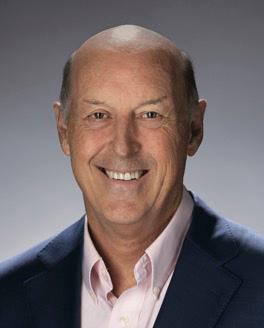
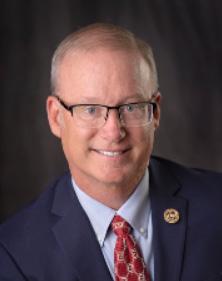
His previous community involvement includes serving as a member of the board of directors of the Greater Blytheville Area Chamber of Commerce. He served on the Chamber Executive Committee and then as president of the organization. He recently was recognized by the chamber with its Lifetime Community Achievement Award.
Arkansas Foundation for Medical Care
John Selig is president and CEO of the Arkansas Foundation for Medical Care (AFMC), an organization working with health care providers, advocates and state leaders to improve the health of individuals and communities while reducing health care costs. Prior to joining AFMC, he was vice president of Optum Public Sector, where he led business development efforts in the southeastern United States.
From 2005 to 2016, Selig served under three governors as the director of the Arkansas Department of Human Services. While there, he led work on the state’s private option approach to Medicaid expansion and its multipayer transformation to episodes of care and patient-centered medical homes. His previous positions for the state include director of Behavioral Health and director of In-Home Health Services.
Conway Regional
Matt Troup has more than 20 years of executive leadership experience in the health care industry, serving in various administrative roles at hospitals in Texas, Oklahoma and Florida. Troup came to Arkansas in 2014 as vice president of ancillary and support services at CHI St. Vincent, and was named president and CEO of Conway Regional Health System within one year. He is an energetic leader whose tenure has seen historic growth in net revenue and increases in employee and physician engagement with the organization achieving a best place to work designation six years in a row. Troup views healthcare as a faith-driven calling — a sentiment that is reflected in the way he interacts with his team each day.
operating) officer, a senior executive responsible for managing the day-today operations of a company or other institution.

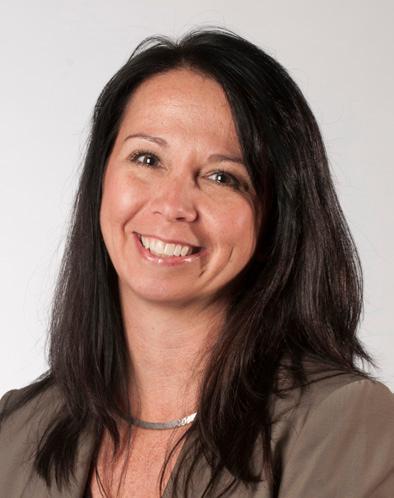
Courtney Bishop is passionate about providing the best possible care to Arkansas’ children. As the COO of Pinnacle Pointe Hospital, the state’s largest mental health facility devoted to the care of children, she is focused on developing and implementing leadership initiatives to improve processes throughout the hospital and continuum of care. Providing the best possible environment for healing and growth is her goal. Courtney previously served as the director of assessment and referral at Pinnacle Pointe since 2017. She is a licensed professional counselor and has worked in the mental health field since 2004 as a clinic director, primary therapist, mobile assessor and associate professor at Ouachita Baptist University.
She received a bachelor’s degree in psychology and biology from Ouachita, a master’s in counseling psychology from the University of Central Arkansas and her Ed.S. in counseling from George Washington University.

As chief operating officer of the University of Arkansas for Medical Sciences (UAMS), Christina Clark provides critical oversight for the day-to-day operations of the state’s only academic medical center. She leads campus operations, information technology, police, security surveillance and emergency preparedness for UAMS. She also serves as a liaison for both internal and external stakeholders.
Clark was appointed the institution’s first institution-wide chief operating office in January 2019. Under her leadership, UAMS completed a $150 million energy project, which has and will continue to reduce carbon emissions by reducing energy use. She earned a bachelor’s degree in psychology from the University of Arkansas at Little Rock (UALR). She received her master’s degree in business administration with an emphasis in health care from UALR in May 2017. Clark sits on the Little Rock Tech Park Board and serves as secretary/treasurer for the Proton Center of Arkansas board.
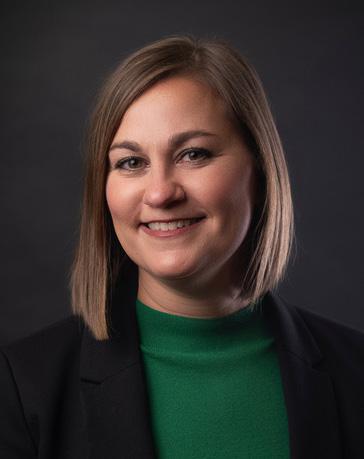
Boris Dover
First Community Bank
With more than 40 years of community banking experience, Boris Dover is the president and chief operating officer of First Community Bank, a locally owned and managed financial institution that opened in 1997 in Batesville. It currently operates 34 locations across Arkansas and Missouri. First Community Bank opened for business at 710 St. Louis Street in Batesville with 14 employees, Dover included, and $3.5 million in capital. Today, the bank has grown to 565 employees and is proud to be the ninth largest bank chartered in Arkansas.
A Batesville native, Dover graduated from Batesville High School in 1975 and went on to earn his bachelor’s degree in personnel management and accounting equivalency from Arkansas State University. Additionally, he completed the Graduate School of Banking of the South at Louisiana State University.
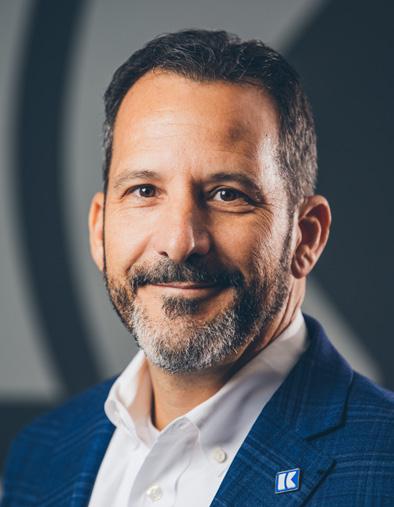
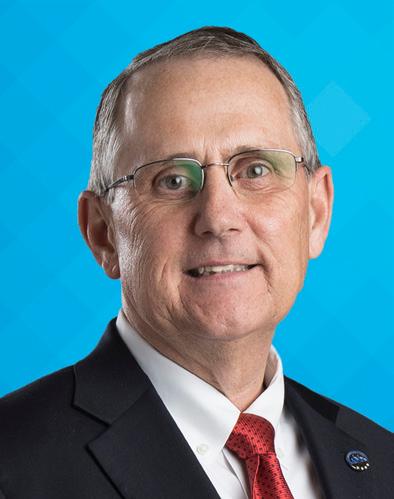
Kinco Constructors
William Fletcher began his construction career as a summer intern for Kinco Constructors while he was a construction management student at Auburn University. He worked under a young superintendent named Doug Wasson. Fast forward to today, and Fletcher has his hands on all aspects of the company as the executive vice president/chief operating officer, working with Wasson, who now is the Kinco president/CEO.
As EVP/COO, Fletcher oversees the company’s finances and workforce on a daily basis, while working with the leadership team of Kinco to achieve the company’s long-term vision and mission. Kinco Constructors is celebrating its 50th anniversary in 2023 and Kinco would not be where it is today without the contributions of Fletcher, who encompasses the company’s tagline of building excellence.
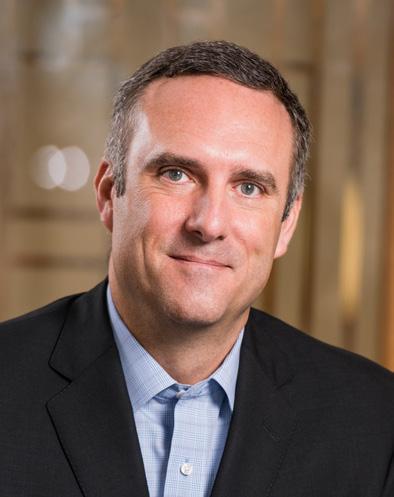
Steve Grandfield
Lexicon Inc.
Steven Grandfield, chief operating officer at Lexicon Inc., has served in several management positions with the company, most recently as president of Lexicon Fabrication Group, which includes Prospect Steel, Custom Metals and Steel Fabricators of Monroe. From the company’s headquarters in Little Rock, he oversees all of Lexicon’s daily operations, reviews the efficiency of current business functions and collaborates with executive management to set and meet business objectives.
In his nearly 20 years of service with Lexicon, Grandfield has been part of numerous key projects, including the recent Tesla Assembly building in Austin, Texas, and many Amazon facilities across the country. Before joining the company, he served as a structural engineer at SEMF Holdings Consulting Engineers and Pitt & Sherry Consulting Engineers in Australia. Grandfield is an honors graduate from the University of Tasmania in Australia with a bachelor’s degree in civil engineering.
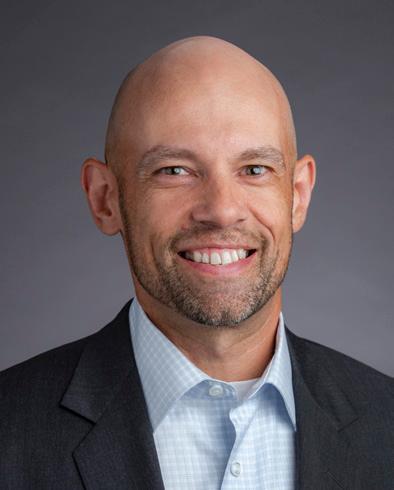
David Jackson
Simmons Foods
David Jackson joined Simmons in 1991. With more than three decades at Simmons, Jackson has proven himself to be a thoughtful and effective leader, building cohesive teams and delivering record growth and performance across multiple business units. His leadership approach was defined early in his career at Simmons under Mark Simmons’ guidance, working in all areas of poultry operations before being named plant manager,
complex director and ultimately president of Simmons Prepared Foods.
Named COO in 2016, Jackson’s value-centric approach and commitment to a people-first culture have been an integral part of the company’s success. With more than 9,000 team members, Simmons Foods Inc. and its affiliates serve customers in all 50 states and more than 40 countries. Jackson received a bachelor’s degree in administrative management from the University of Arkansas and an MBA from the University of Texas at Austin.
William Jones IV
Sissy’s Log Cabin
Born and raised in the Natural State, William Jones IV has played an integral role in expanding the Sissy’s Log Cabin footprint across Arkansas and into Tennessee. As chief operations officer and a member of the executive board of directors for the family-owned jewelry store, Jones focuses on perfecting what truly sets Sissy’s apart: extraordinary customer service and a culture of caring, both for its employees and for the communities it serves.
Jones graduated from the University of Central Arkansas with a bachelor’s degree in business administration/finance and went on to attend the Gemological Institute of America, becoming a graduate gemologist in 2013.
Jordan Martin
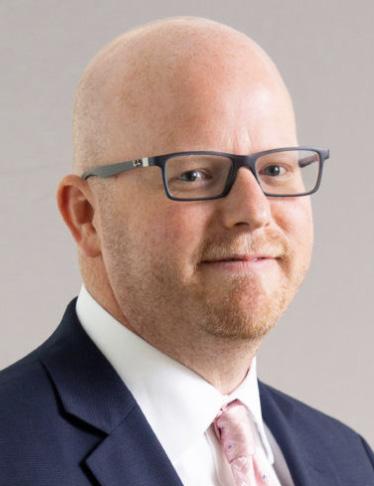
Jordan Martin, COO of Cushman & Wakefield | Sage Partners, began his real estate management career in 2002 working for Cassidy Turley (formerly Colliers Turley Martin Tucker and now Cushman & Wakefield), one of the largest commercial real estate firms in the country. In addition to his extensive experience working directly for Cassidy Turley, he also has experience working as a consultant for Yardi Systems and working as an independent consultant.
As a consultant, Martin worked with clients of all sizes, including Fortune 500 companies, implementing Yardi software and assisting companies with their month-end and year-end processes as well as identifying and implementing solutions allowing companies to gain efficiencies. His areas of expertise include Yardi subject matter, strategic process improvement, software implementations, financial reporting and analysis, internal controls and compliance, budgeting and forecasting, as well as project management.

Mercy Hospital Northwest Arkansas
Mike Mudd joined Mercy in 2022 from Rochester Regional Health in Rochester, New York, where he served as COO of service lines for the five-hospital system. His extensive background in health care includes supervising operational leadership, managing physician relations and working closely with nursing leadership. As COO at Mercy, Mudd collaborates with Mercy Hospitals Arkansas President Ryan Gehrig to drive the hospital’s organizational vision, operational strategy and day-to-day operations.
Mudd has maintained an active role in charitable organizations throughout his career in health care, including involvement with the March of Dimes and the American Cancer Society among others. He has already made an impact since joining Mercy Hospital Northwest Arkansas, and he is an important contributor to the mission of Mercy’s ongoing $500 million expansion in the region.
Payton Smith began his career at Metro Disaster Specialists throughout high school and college when he obtained knowledge of the business and completed the company’s management training program. He served as Metro’s restoration production manager for six years. In 2015, Payton received the highest certification in the restoration industry, Certified Restorer®, through the Restoration Industry Association and accepted a sales and marketing role.
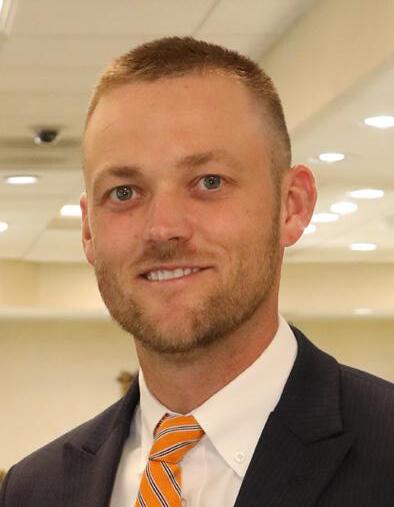
In 2018, he was named the company’s chief operating officer and continues to oversee the operations of the Restoration Division. He is affiliated with numerous industry and insurance organizations, serves on multiple business and charity boards and devotes many hours to community service representing Metro Disaster Specialists.
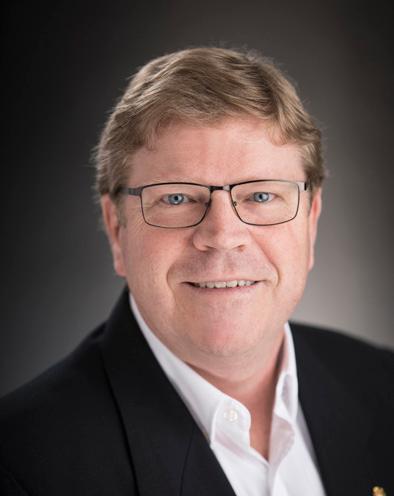
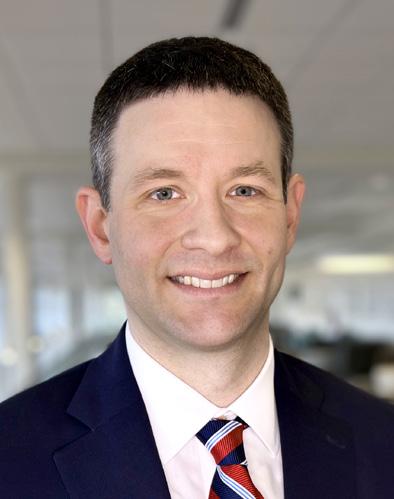
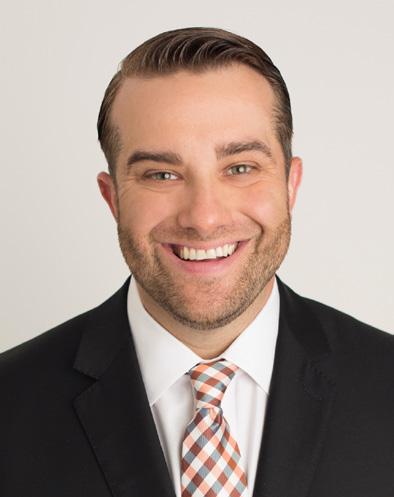
Payton attended North Little Rock High School and graduated from the University of Arkansas at Little Rock in 2010 with a bachelor’s degree in business administration with an emphasis in marketing.
Wallie Sprick joined WDD in 1984 immediately after earning a five-year professional degree in architecture from the University of Arkansas in Fayetteville. Sprick was promoted to partner and director of production in 1994. As director of production, he schedules the production staff, coordinates project milestones and implements the firm’s quality control plan. Sprick was elected COO of WDD in 2012. He has been the project architect on a variety of building types, including commercial, medical, educational, financial, criminal justice facilities and federal projects.
How and when was your business founded?
Our business was founded in Little Rock in December 2020 with the mission of bringing high-quality cannabis to the South. What attracted you to your career? The idea of making people’s lives incrementally better.
What’s your secret to success? Hiring people smarter than me and having a relentless passion for learning. What motto/quote/etc. does your business live by?

Establish trust through openness, authenticity, transparency and decency. What is your leadership style? Collaborative and inspiring.
What is your proudest achievement?
Helping build our amazing team at Good Day Farm while creating massive opportunities in a very unpredictable cannabis marketplace environment.
Where do you see your business in the next few years?
Our goal is to be a $3 billion business based in Arkansas.

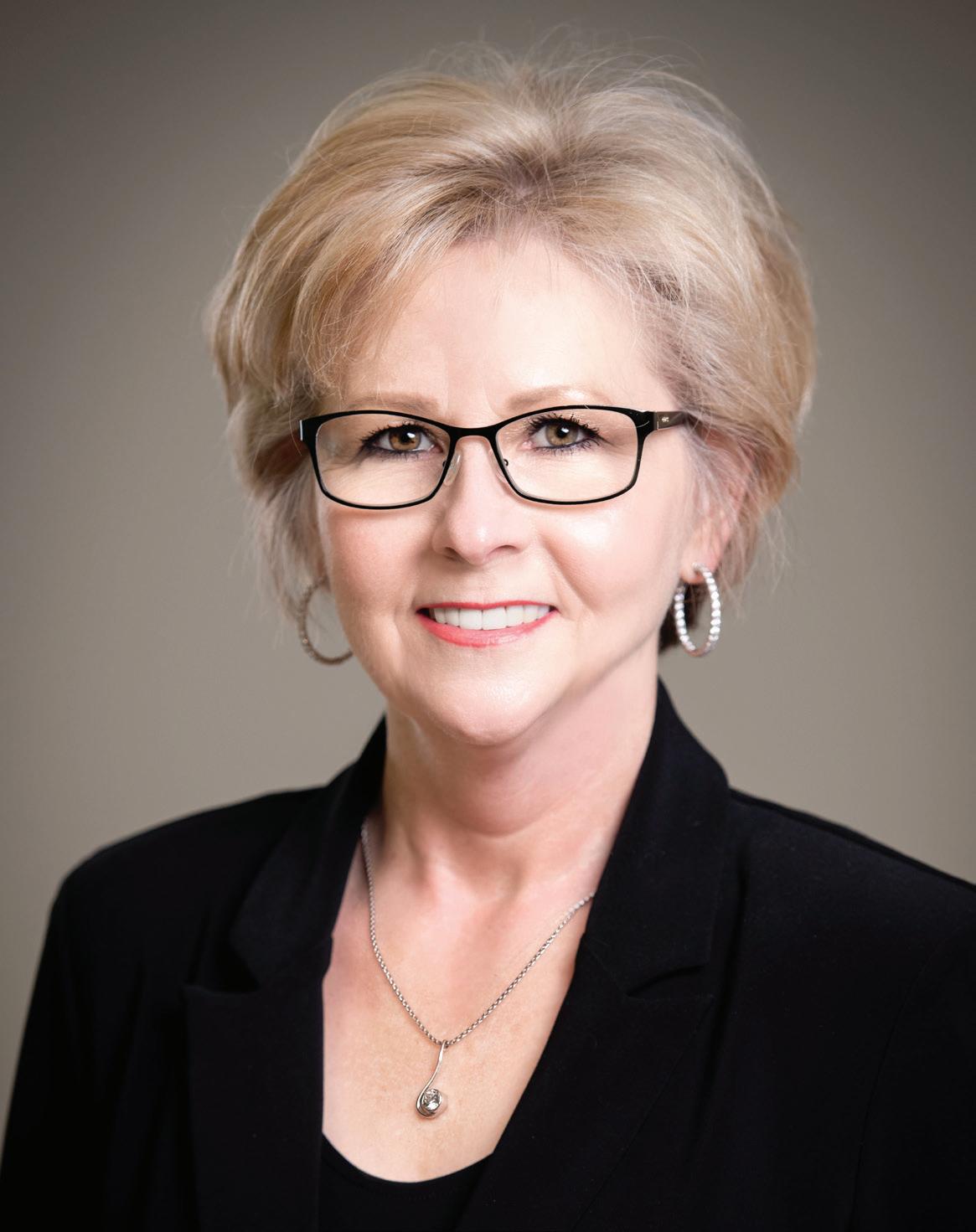
What sets you apart from your competitors?
Our relentless focus on our customers, our brands and our product innovation and quality.
What’s something others would be surprised to know about you?
I am a British citizen as well as a United States citizen, and I have the largest sweet tooth.
Marilyn Strickland is the chief operating officer for Arkansas Foundation for Medical Care and is the senior executive responsible for AFMC’s overall operations. These operational areas and services include Arkansas Medicaid and Medicare health care provider outreach and education, multidisciplinary contact centers, health utilization management, information technology, marketing, communications, business intelligence, program evaluation and data mining services.
She came to AFMC with more than 40 years of experience in public-sector health care. Before joining the AFMC team, she gained extensive experience with the Arkansas Department of Human Services including serving in the COO role at Arkansas Medicaid. Today, Strickland champions AFMC’s mission to promote excellence in health and health care through education and evaluation. She supports AFMC’s more than 300 health care professionals and works throughout the organization to ensure that AFMC remains at the forefront of health care reform, all the while improving health care for her fellow Arkansans.
Don Swartz
Edafio
As Edafio’s chief operating officer, Don Swartz is responsible for internal operations, processes and systems supporting staff associates and customer services.
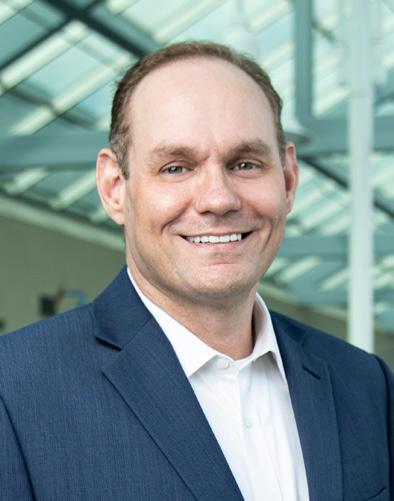
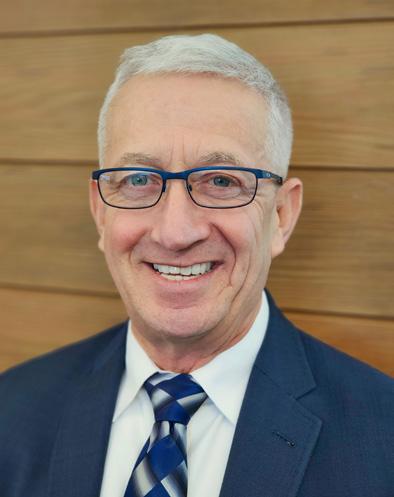

As the newest member of the executive team, he leads quality and productivity initiatives, spearheads the ongoing development of Edafio’s capacity and scale and oversees and manages the integration of future acquisitions. His background speaks to the versatility of his leadership skills and comprises an impressive track record of building world-class customer service organizations and operationalizing and delivering complex technology capabilities. Swartz brings more than 30 years of technology and operational leadership experience with regional, national and international businesses including Fortune 100 and 500 companies. He has held executive positions at CompassMSP, Flexential, QTS, Tradeweb Direct, Freddie Mac and Capital One, among other software, services and platform businesses. Swartz earned his BSEE in electrical engineering from DeVry Institute and resides in northern Virginia.
Quinten Whiteside
Wright
Quinten Whiteside is the chief operating officer of Wright Lindsey Jennings (WLJ), one of Arkansas’s largest and oldest law firms. With nearly 80 attorneys, WLJ offers comprehensive legal guidance across more than 50 practice areas and 20 industries. An experienced litigator, Whiteside’s practice focuses on administrative law, government relations, transportation, land-
lord/tenant concerns and health care. Mid-South Super Lawyers named him a “Rising Star” in 2021 and 2022, and he was featured in “Best Lawyers: Ones to Watch” in 2021, 2022 and 2023 for insurance and transportation law.
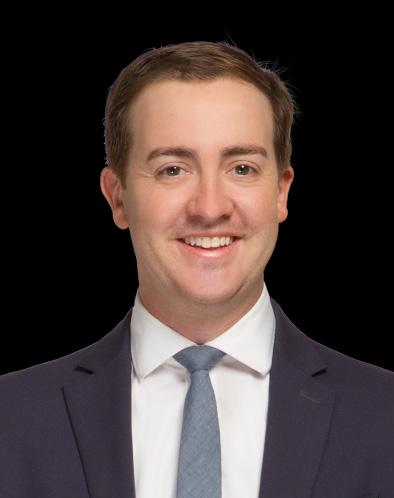
Whiteside spent six years on the KUAR/KLRE board, including as chair of the recruitment and governance committee, and graduated from Leadership Greater Little Rock Class XXXVII. He currently serves on the boards of the First Tee of Central Arkansas and the ACCESS Cup Golf Tournament.
Jamie Wiggins, Ph.D., MBA, RN, NEAA-BC, FACHE Arkansas Children’s Hospital
Jamie Wiggins serves as the executive vice president and chief operating officer for Arkansas Children’s. An actionoriented health care leader, Wiggins is steadfast in his commitment to improving quality of care and delivering excellence. He oversees the patient care services and operations team and is ultimately responsible for developing, implementing and improving the systems that deliver the best outcomes for the children of Arkansas. As a registered nurse, Wiggins has clinical experience and operational expertise that informs a unique perspective focused on enhancing patient experience, growing programs and promoting diversity, equity and inclusion.
Wiggins has a Ph.D. in Nursing, is a fellow of the American College of Healthcare Executives and is a certified “Nurse Executive-Advanced” by the American Nurses Credentialing Center. He has a bachelor’s degree in nursing and a master’s degree in nursing and health systems leadership as well as an MBA.
Lindsay Wilmott Generations Bank
Lindsay Wilmott was appointed to serve as chief operations officer of Generations Bank in August 2019. Before that, she spent time working within the bank’s compliance department. During this time, she obtained her “Certified Regulatory Compliance Manager” certification.
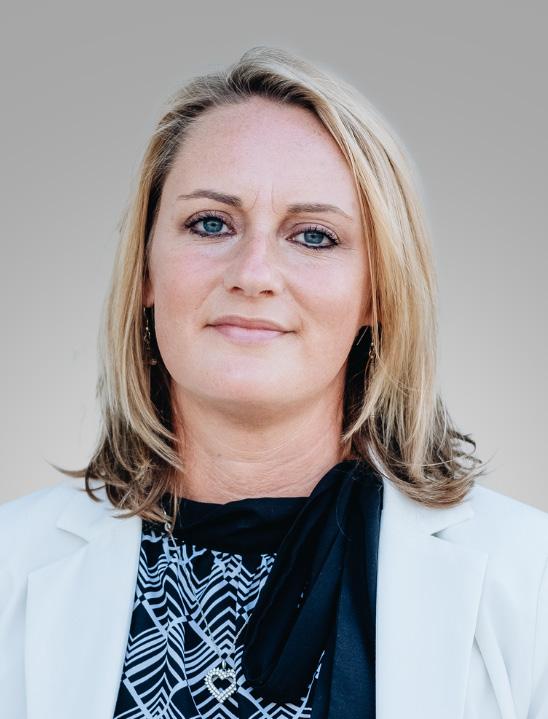
Wilmott began her banking career as a part-time teller in 2006 while pursuing her bachelor’s degree in mathematics from the University of Arkansas. Upon graduation, she accepted a full-time role within the Rogers branch, working as head teller and later assistant branch manager. Shortly thereafter, the Rogers branch was acquired by what would later become Generations Bank. This would be the first of three acquisitions in which Wilmott assisted the bank. In 2016, she played an integral part in establishing the bank’s loan operations department, serving simultaneously as a supervisor for the department and as a lending compliance officer. She moved to work fully within the compliance department in 2018.
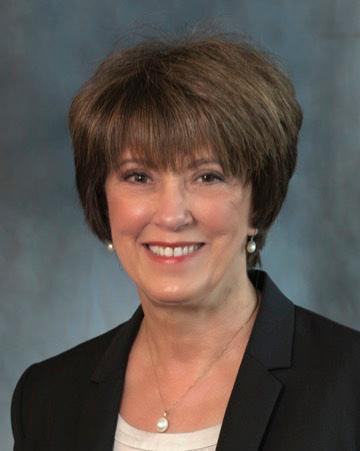


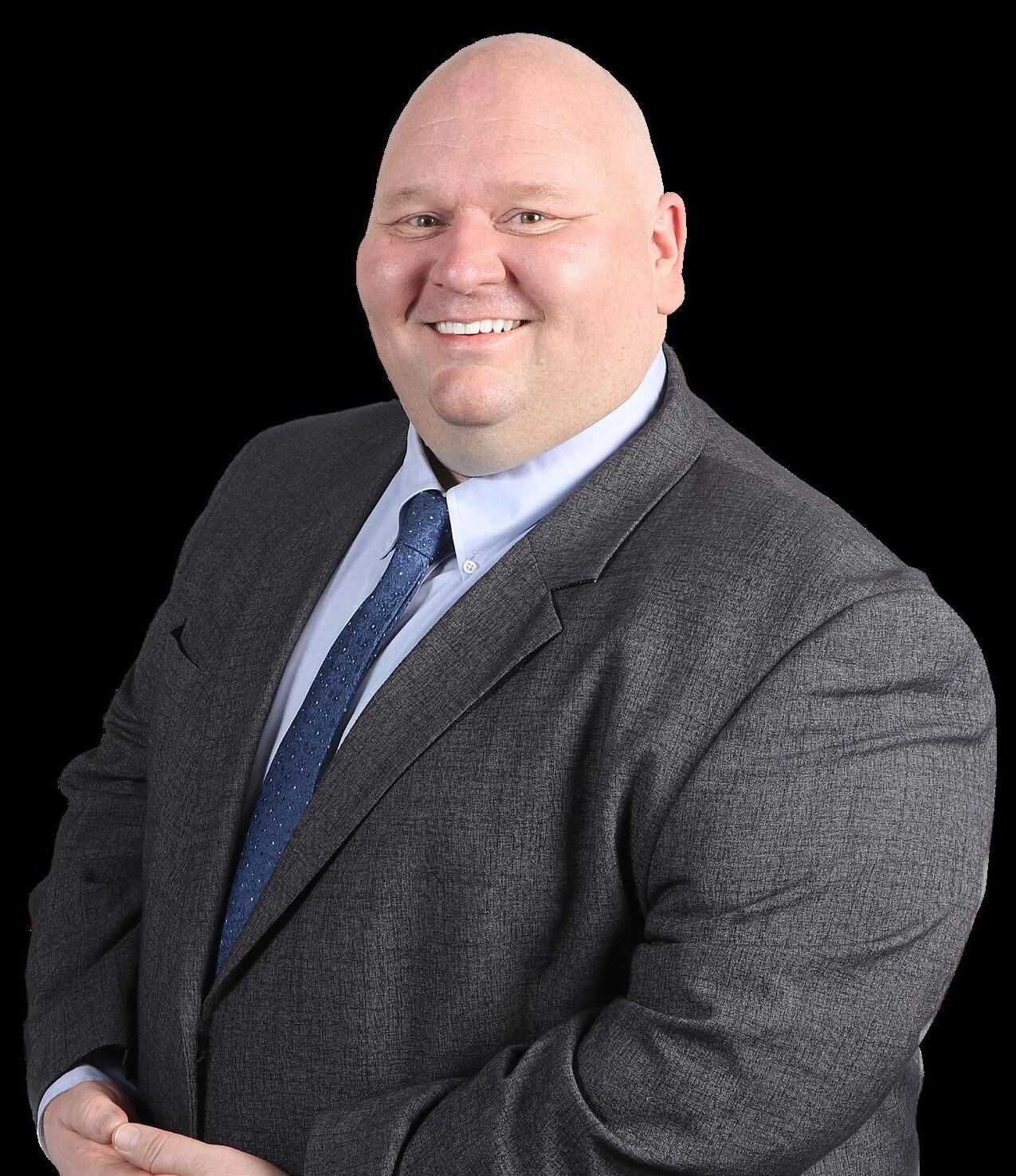

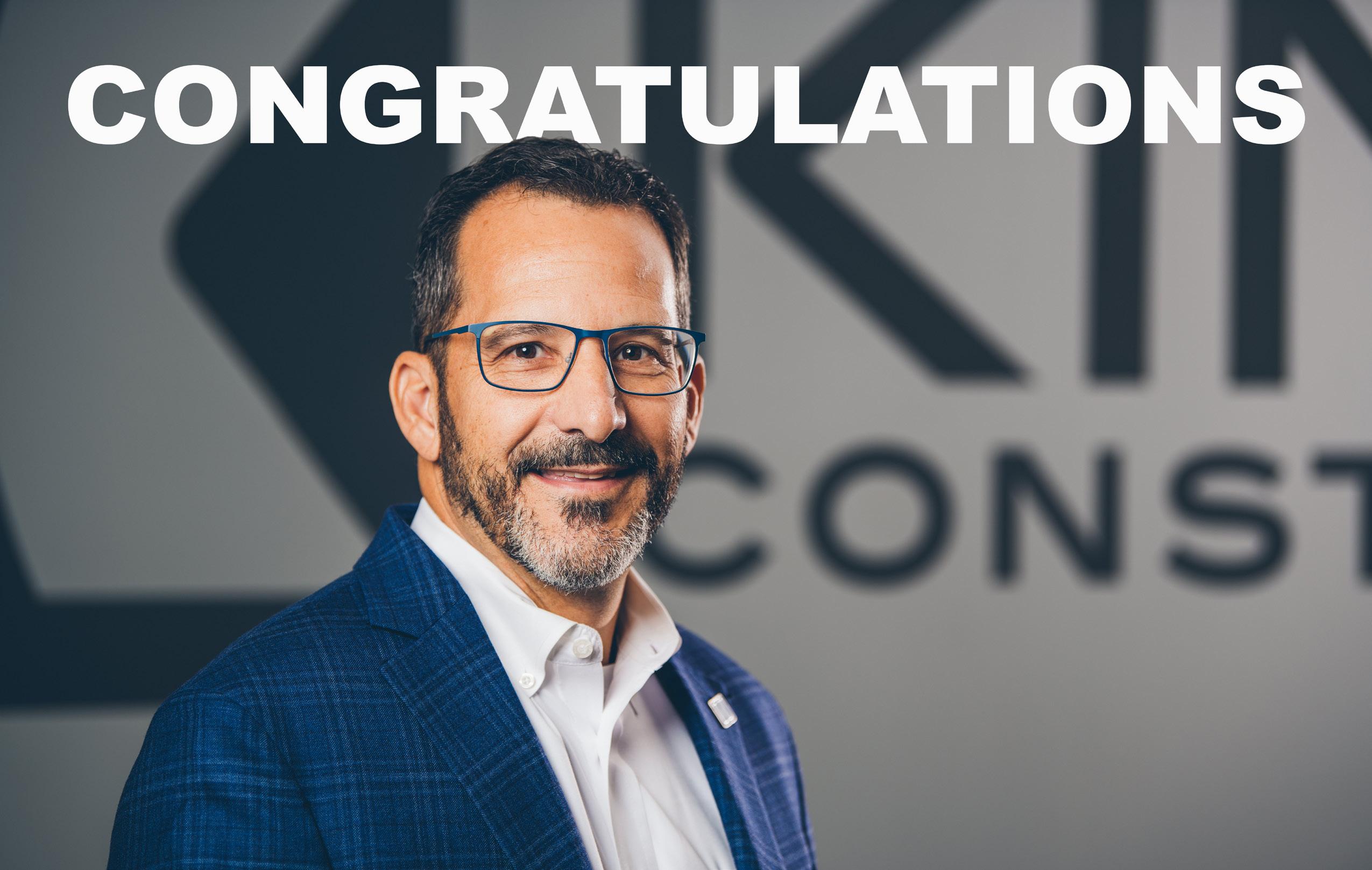



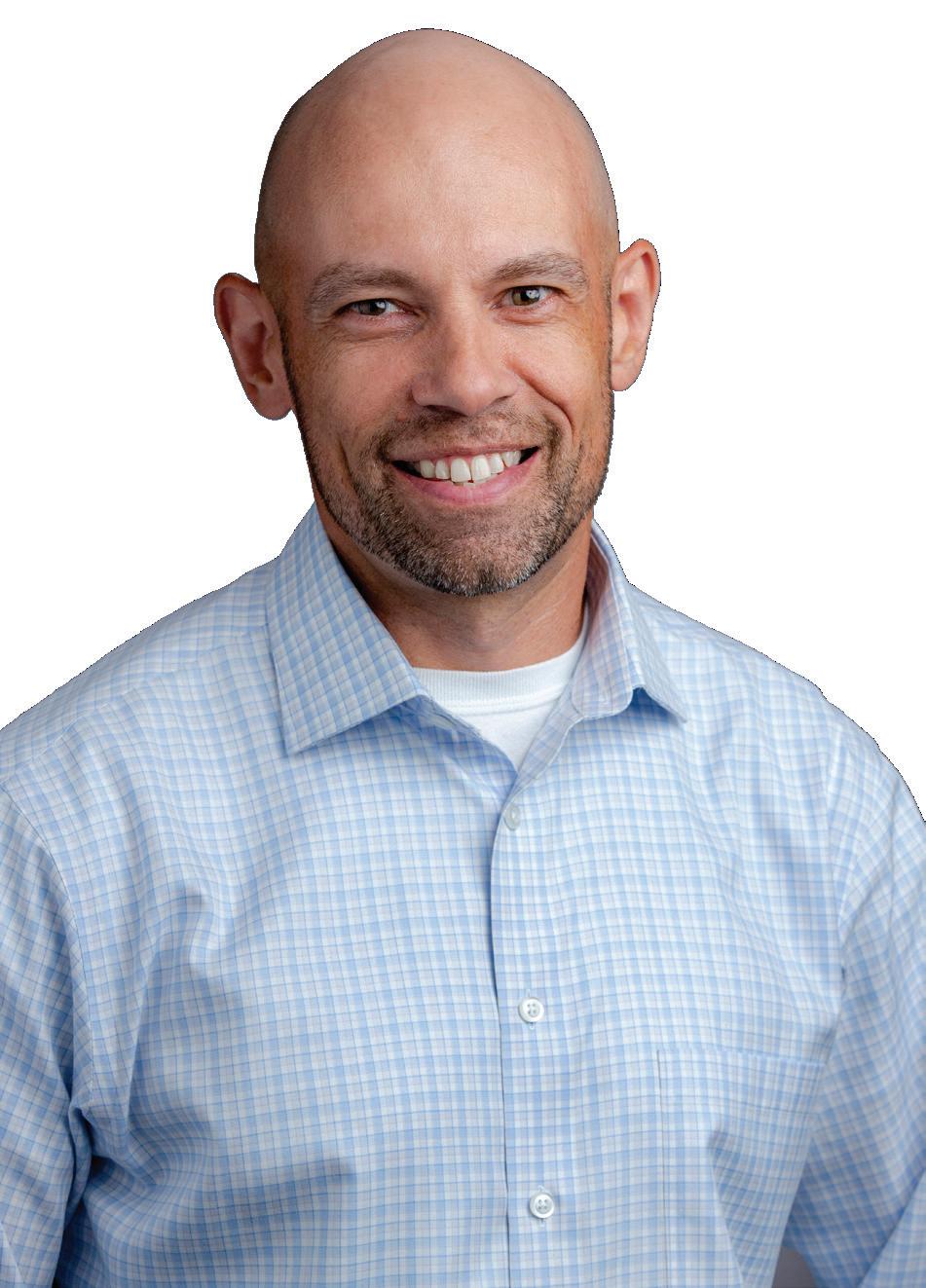
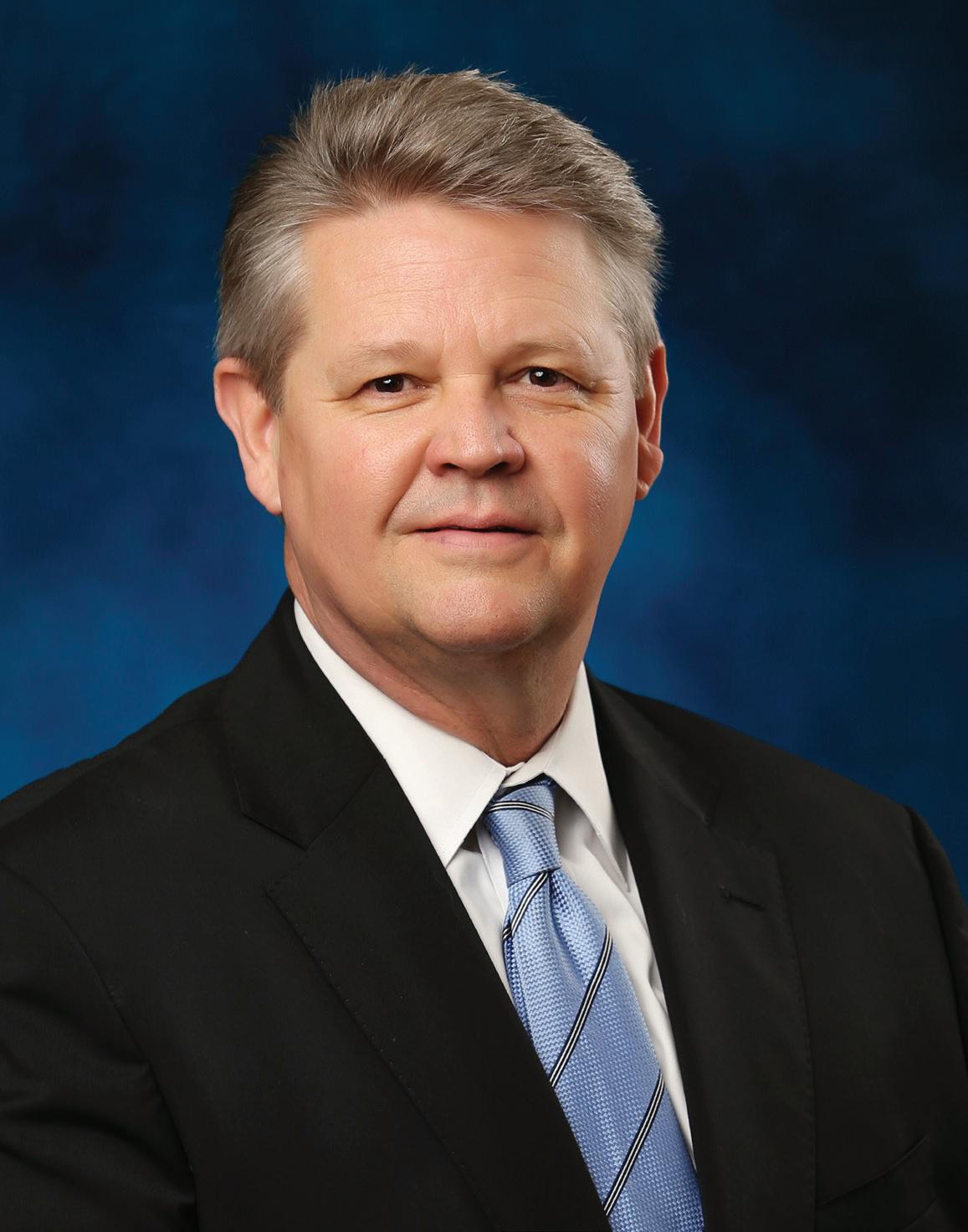



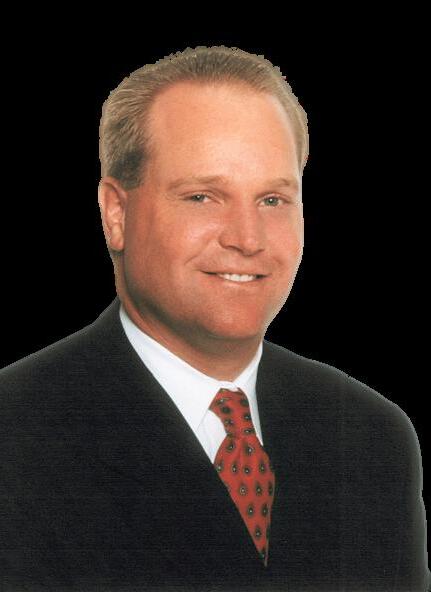








Brent Beaulieu
Baptist Health
Brent Beaulieu is the chief financial officer for Baptist Health. In this role, he is responsible for all finance, revenue cycle, supply chain, risk management and real estate activities in the organization. Beaulieu joined Baptist Health in 2007 as assistant vice president of finance and has been an invaluable part of leading the system’s financial operations ever since. Prior to joining Baptist Health, he spent nine years as a CPA, specializing in health care matters with national accounting firm BKD. He received a degree in accounting from Harding University.
Beaulieu also lends his expertise to Ronald McDonald House Charities of Arkansas, where he began serving on the finance committee in 2021 and joined the full board for 2022. He is past president of the Arkansas chapter of the Healthcare Financial Management Association and also served on the national Principles and Practices Board from 2013-2016. He was a member of the Health Care Expert Panel for the American Institute of Certified Public Accountants from 2010-2013.

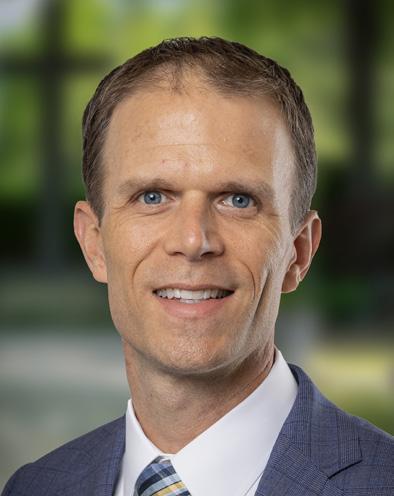
Jennifer Bridges
OrthoArkansas
Jennifer Bridges has responsibility for the financial operations of OrthoArkansas, which includes multiple clinic locations, three ambulatory surgery centers, an insurance company and a real estate entity. Bridges joined OrthoAkansas in 2020, bringing with her more than 15 years of accounting, finance and leadership experience. Her background includes experience in private equity, nonprofits and Fortune 500 companies. She earned her MBA from the University of Arkansas and undergraduate accounting degree from Arkansas Tech University.
She currently serves as the treasurer of the board of directors for Journey Church–Central Arkansas and the treasurer of the board for OrthoArkansas Insurance Company LLC and the advisory council for Christian Leadership Alliance.
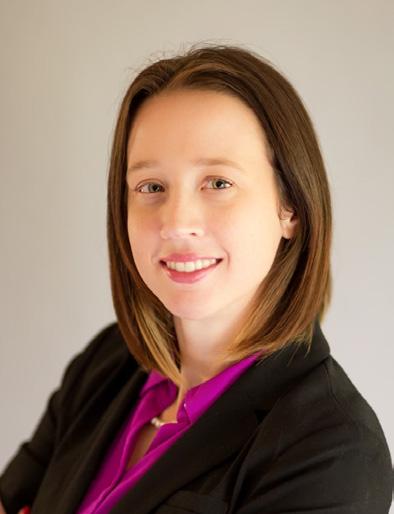

Jay Brogdon
Simmons First National Corporation and Simmons Bank
Jay Brogdon was named president and chief financial officer of Simmons First National Corporation and Simmons Bank effective Jan. 1. Prior to assuming these roles, he served as EVP and treasurer. Upon joining Simmons in 2021, Brogdon was instrumental in negotiating its acquisition of Spirit of Texas Bancshares Inc., a $3.2 billion-asset bank. In his current role, Brogdon is responsible for leading strategy, investor relations, financial planning and investment as well as trust and estate administrative services. Prior to joining the company, Brogdon served as managing director of investment banking where he advised clients on transactions totaling more than $15 billion. Brogdon is a graduate of Harding University.
We’re lucky to have a CFO that realizes people aren’t numbers.
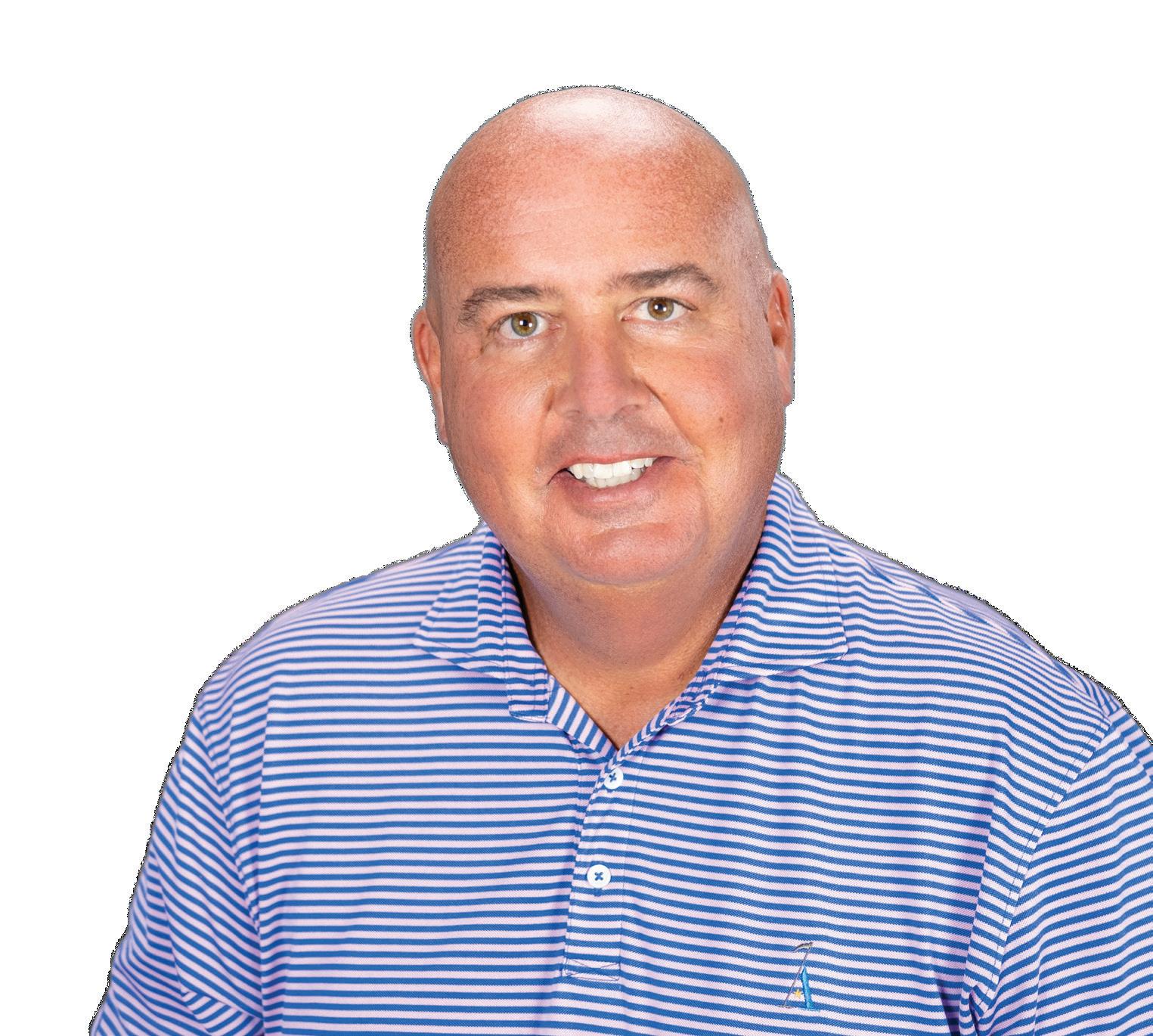

Nabholz CFO Bryan Bruich’s 15 years with the company have been marked by dynamic changes and growth. During his 10-year tenure as CFO, Nabholz’ sales have more than doubled, reaching the $1 billion mark last fiscal year. Over the same period, the company has increased its number of business units from 22 to 30, a feat made possible by doubling its number of employees to include over 1,500 people.
As CFO, Bruich oversees Nabholz’ accounting, human resources, legal and risk management groups as well as the company’s surety and banking relations, health-and-wellness program and clinics and equipment fleet. He also serves as the head crawfish and gumbo chef for employee and client cookouts.
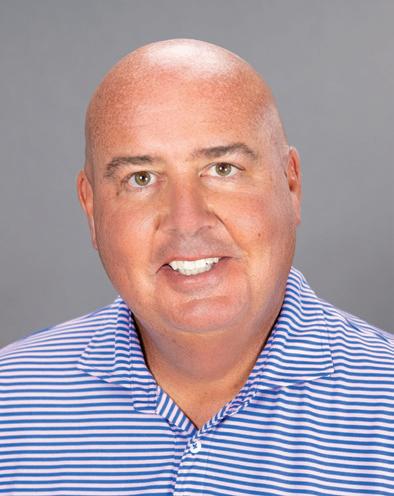
Bruich currently serves on the board for Conway Regional Health Systems. He is a licensed CPA with the Arkansas Board of Public Accountancy, a member of the Arkansas Society of Certified Public Accountants and an active alum of the University of Central Arkansas, where he received his bachelor’s degree in business administration.
Crews & Associates
Joe Bumpers serves as the chief financial officer for Crews. His area of responsibilities include preparing and reporting of the firm’s financial information, accounting, accounts payable, payroll, human resources and self-clearing operations (settlements, custody and customer transactions). He also manages the firm’s liquidity and facilitates credit as well as oversees the firm’s risk management policies and practices. Bumpers has been with Crews for 20 years as the firm’s CFO. Previously, he served for 10 years in similar capacities as the vice president of finance for Americana Foods, the manufacturing entity for TCBY Enterprises Inc.. In that role, he was responsible for the accounting, finance, human resources and warehousing and logistics for the manufacturing plant. He also spent nine years at Ernst & Young in the audit department as a senior manager and serviced a wide range of industries from aerospace, retail, transportation, franchising and manufacturing.
ArcBest
David R. Cobb is the chief financial officer for ArcBest. With more than 30 years of experience in finance and accounting, Cobb leads the team responsible for overseeing and managing the company’s financial activities to ensure ArcBest is well-positioned for financial success and long-term growth. His thorough knowledge of the company’s finances and operations and his experience working with multinational and publicly traded corporations make Cobb a critical part of helping develop and execute ArcBest’s growth-focused business strategy.
Cobb supports teams that manage external reporting with the SEC, tax reporting and filing, internal audits and all the
transactional elements of generating a solid cash flow. He also oversees treasury management and communicating financial results to the investment community.

Jason Evins
Jason Evins joined C.R. Crawford Construction in 2016 as human resources and investment director. He advanced to his current position of CFO in 2019.
Prior to joining the company, Evins served as senior real estate manager and senior human resources manager for Walmart. With years of experience in real estate and finance, Evins lends his ability to steer the company’s financial systems and performance, which is reflected in C.R. Crawford’s growth and success. Under his financial leadership, the company remains debt free and well positioned to be aggressive but flexible as market conditions allow for future growth.
Evins holds a BSBA in accounting and MBA from the University of Arkansas. He is a graduate of Leadership Benton County, serves as a board member of the Northwest Arkansas Land Trust and is a member of the UA Walton College MBA Alumni Advisory Board.
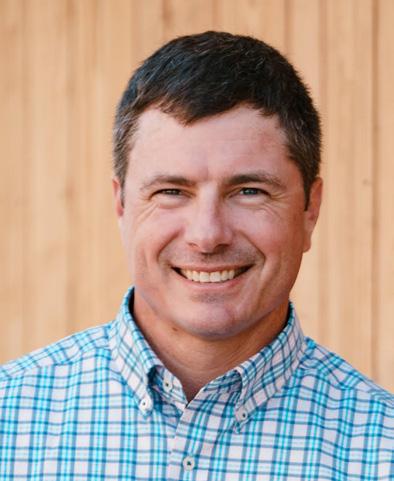
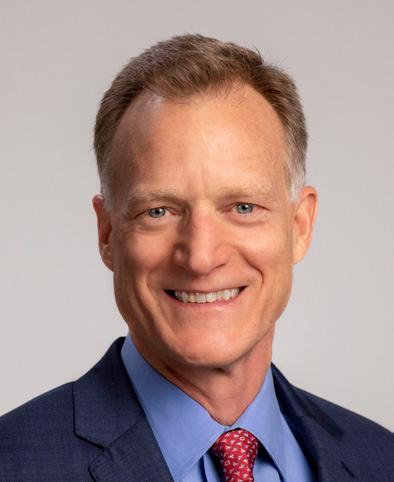
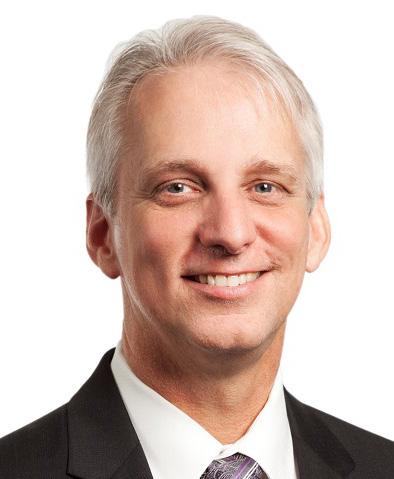
Staci Gasaway serves as chief financial officer of Seal Solar, directing the company’s accounting, financing and human resources activities. She earned her bachelor’s degree in accounting from the University of Arkansas at Little Rock. She enjoys living and working in North Little Rock, particularly the historic district of Argenta. Prior to joining the Seal Solar team, she spent most of her accounting and finance career at CFO Network providing accounting and finance services to more than 20 companies across multiple industries for over 10 years.
Gasaway found her niche in construction accounting and finance and has had the opportunity to focus exclusively in this industry since early 2021. Her passion is helping people by providing accurate financial metrics while contributing to a positive and enjoyable work environment.

Brandon Gorman is the chief financial officer for the Arkansas Rural Health Partnership (ARHP), an organization whose mission is to create and implement sustainable community solutions to improve the health care infrastructure and strengthen health care delivery in south Arkansas.
Gorman, a CPA, is responsible for promoting cost-saving and revenue-producing strategies that benefit the member organizations of ARHP. He successfully oversees millions of dollars in grant funding and hospital operating budgets each year and consistently finds innovative approaches to meet the needs of the hospitals he serves.
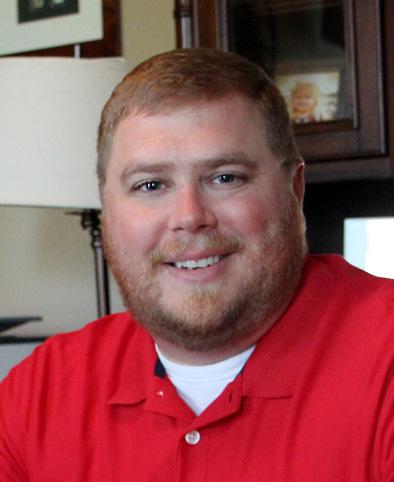
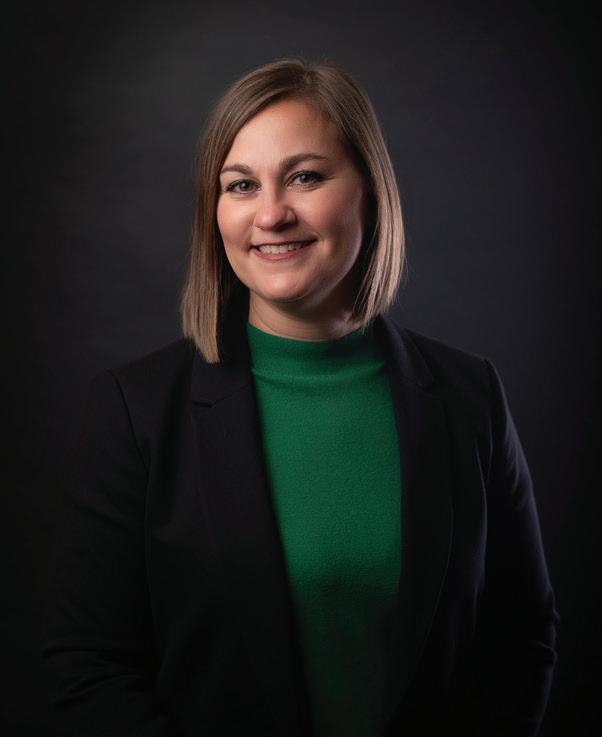

Ryan Flynn was named president of Network Services Group in late 2013. Network Services Group provides IT support and voice-over IP telephony solutions for many businesses across the state. Under his leadership, NSG has grown from 11 employees and a single location in North Little Rock to 85 employees and three locations in Arkansas. Flynn also has served as president of the Cabot Rotary Club, two terms on the city council of Cabot, on the Cabot Parks and Recreation Commission and on the Lonoke County Election Commission.


Born, raised in southeast Arkansas, Gorman has a unique understanding of the importance of rural health care. He is an active member of the Arkansas Society of Certified Public Accountants, the Arkansas Healthcare Financial Management Association and is the past chairman of the Arkansas Healthcare Financial Management Association’s Audit Committee. Brandon received his degree in accounting from the University of Central Arkansas.
Laura Grimes
Conway Area Chamber of Commerce
Laura Grimes has been the CFO for the Conway Area Chamber of Commerce and Conway Development Corporation for 12 years. Raised in Springdale, she graduated from the University of Arkansas in 1992 with a degree in accounting. Grimes is a certified public accountant and has experience working in public and private accounting.
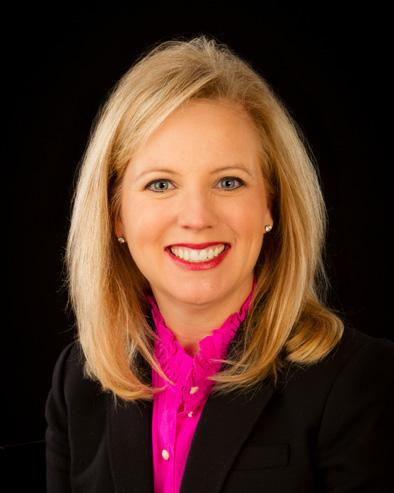
Grimes has a desire to serve her community, and working with these nonprofit entities has been the perfect fit. Since her start, organizational revenues have nearly doubled as have the number of employees. The Chamber and its sister organizations have completed a number of ambitious projects and the chamber has twice been named National Chamber of the Year by the Association of Chamber of Commerce Executives.
Jeff Holt
Stallion Transportation Group
Jeff Holt has been the chief financial officer of Stallion Transportation Group in Beebe since it started in August 1992. Having earned an accounting degree from the University of Arkansas at Little Rock, Holt was working at his sister’s insurance company when Butch Rice, CEO and president of Stallion, approached him about joining his startup company. Rice and Holt had been friends since childhood, having grown up together on the same street in the Rose City neighborhood of North Little Rock.
Holt remembers Stallion’s first full year of revenue being less than $2 million. Stallion has now grown to more than 150 employees and $70 million in annual revenue. Holt credits this success to Stallion being blessed and surrounded with very talented people for the past three decades.

“I have had the benefit over the years of being deeply involved, not just financially, but operationally and strategically as the company has grown,” Holt said.
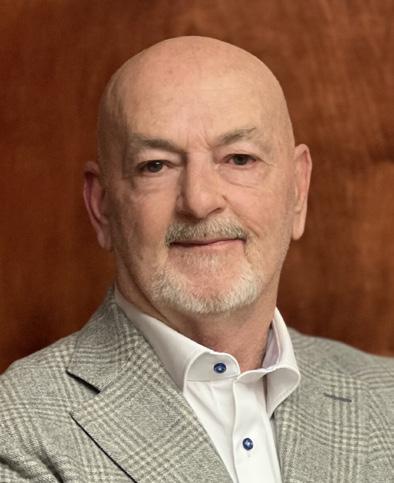
Lexanne Horton
Ritter Communications
Lexanne Horton was hired as E. Ritter Company’s controller in February of 2015. In October 2019, she was promoted to vice president and controller and today she serves as the CFO of Ritter Communications. She oversees accounting, financial planning and analysis, treasury management, billing, risk management and purchasing. Horton holds an MBA from Union University
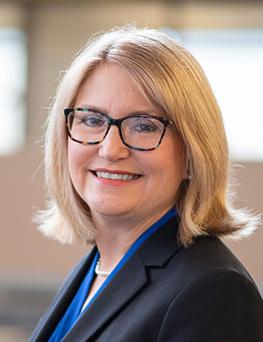
as well as a BBA in accounting from the University of Memphis.
Prior to joining Ritter, she spent 24 years in the health care industry and started her career with Deloitte and Touche. A native of Jackson, Tennessee, Horton serves on the board of directors for CASA of the 2nd Judicial District of Arkansas Court Appointed Special Advocates, an organization that provides support and advocacy for children who are in the foster system, and serves on the board and the Workforce Development Committee at the Chamber of Commerce of Jonesboro.
Jeremy Jeffery serves as senior vice president and chief financial officer for Jefferson Regional. He originally joined the southeast Arkansas health system in 2008, previously serving as vice president of strategy and business analytics and prior to that as controller. Before joining Jefferson Regional, Jeffery was audit manager with HCJ CPAs & Advisors PLLC. He began his career with FORVIS LLP (formerly BKD) in 2003, working in the health care practice.
He received his MBA and bachelor’s degree from the University of Central Arkansas. Jeffery is a CPA and fellow of the Healthcare Financial Management Association. He currently sits on the Industry Commerce & Banking Committee of the Arkansas Society of CPAs.
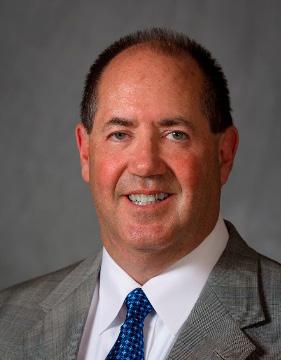
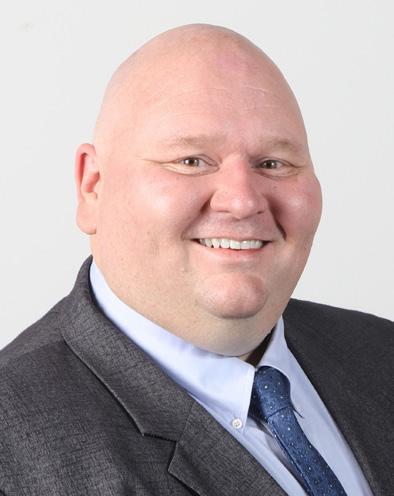
Daniel Lewis
Signature Bank
Daniel J. Lewis has been employed with Signature Bank of Arkansas since June 2004. Lewis is a 1979 graduate of the University of Arkansas with a bachelor’s degree in political science and a 1982 graduate of the University of Arkansas Law School with a juris doctorate. He began his banking career at the Bank of Fayetteville (now Arvest) in 1982 and moved to McIlroy Bank and Trust (now Arvest) in 1986 as special assets manager, then later became commercial loan manager. He graduated from the LSU School of Banking in 1990. He returned to Arvest-Fayetteville in 1996 as senior vice president, commercial loan manager and then served as senior vice president/private banking manager. He joined Signature Bank in 2004 as market president in Fayetteville. He was named chief lending officer and secretary in 2010.
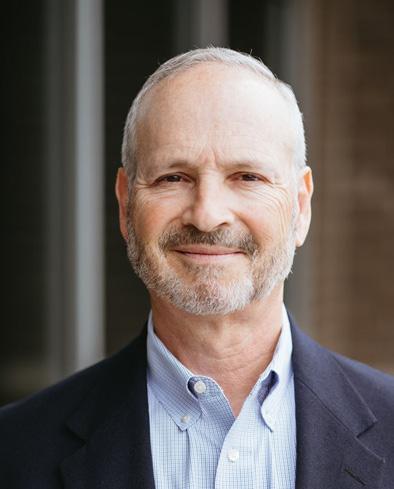
Adam K. Motherwell of Fayetteville joined the Beaver Water District staff in 2014 as the district’s chief financial officer. Motherwell is an honors graduate of the University of Arkansas Walton College of Business with 45 years of experience in corporate auditing, governmental auditing and financial accounting. From 2000 to 2014, Motherwell served as associate dean
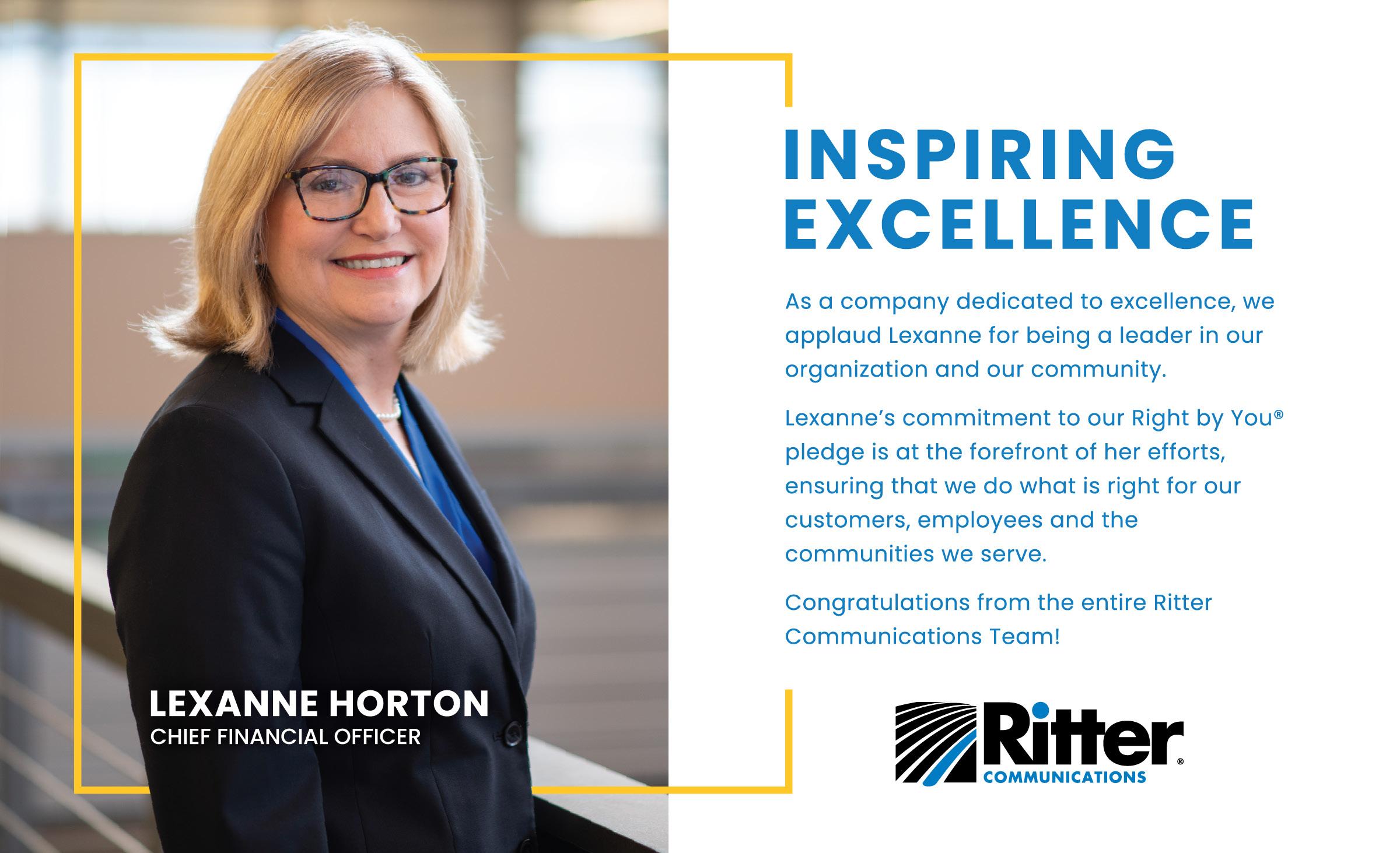
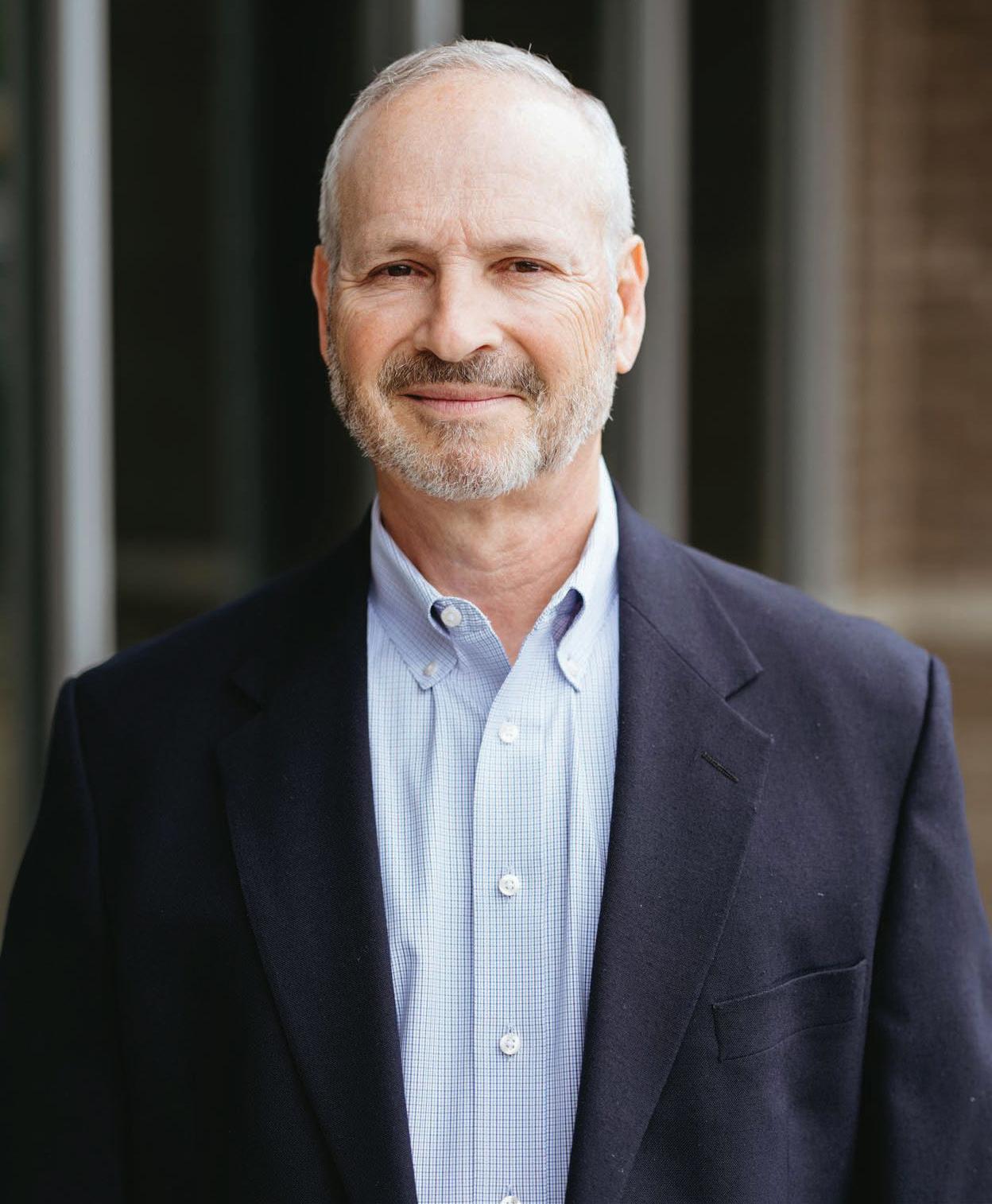

for finance and administration in the UA Fulbright College of Arts and Sciences. His credentials have included certified public accountant (CPA), certified fraud examiner (CFE), UA Credit Union treasurer and chairman of the Audit Committee for the city of Fayetteville. Currently, he serves as chairman for both the southwest section and national audit committees of the American Water Works Association (AWWA).
Sylvia Murchison
Goodwill Industries of Arkansas
Sylvia Murchison is senior vice president and chief financial officer for Goodwill Industries of Arkansas. She is responsible for strategic financial planning and analyzing the organization’s financial strengths and weaknesses. Since joining Goodwill in 2012, the nonprofit has expanded to 44 retail and donation center locations in Arkansas, and revenues have more than doubled to $65 million.
Murchison’s accounting career began at Deloitte and Touche in Little Rock. She then moved into administrative and management roles with Little Rock Hematology Oncology, Arkansas Urology and the University of Arkansas for Medical Sciences Winthrop P. Rockefeller Cancer Institute. She received two bachelor’s degrees and her MBA from the University of Arkansas at Little Rock and has been a licensed CPA since 1996. She is a long-standing member and past treasurer of Rotary Club 99 in Little Rock.
Bill Pack
Conway Regional
Bill Pack is the current CFO at Conway Regional Health System. He is responsible for the financial operations of the health system, which includes Conway Regional Medical Center, Conway Regional Rehabilitation Hospital, Dardanelle Regional Medical Center, Conway Regional Surgery Center and numerous outpatient centers and clinics located throughout north Central Arkansas.
Pack has more than 28 years of experience as a CFO in the health care industry. He has become an expert on acquisitions, initiated systems and programs, improved processes, and has developed strategies for hospitals and health systems.
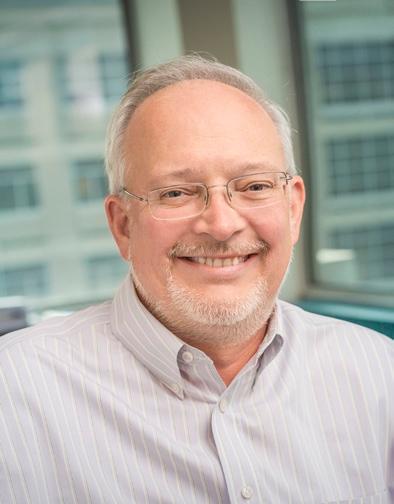
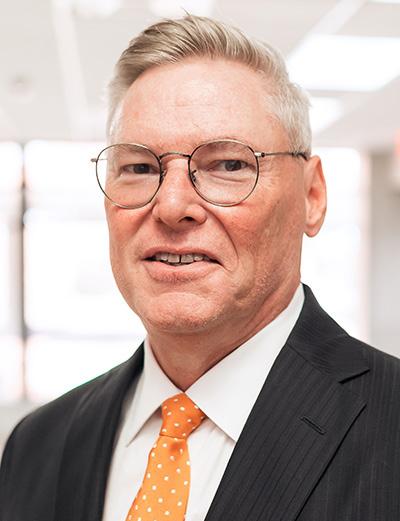
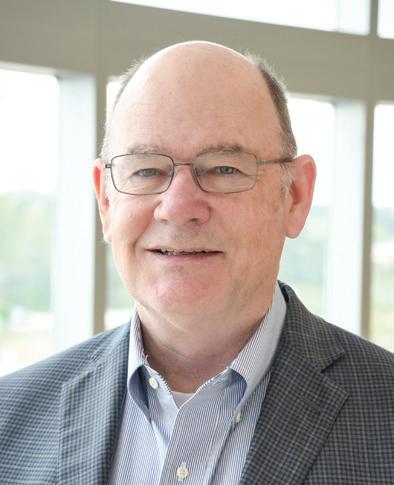
Pack is certified in “Leading Change in Large Distributed Organizations,” is a fellow of the Healthcare Financial Management Association and a certified advanced health care security officer.

John Rogers
Stone Ward
As Stone Ward’s CFO, John Rogers blends equal parts pragmatism and insight as the financial steward for the agency, overseeing billing, human resources and revenues. With more than 30 years of successful experience in financial and computerized information systems, he joined Stone Ward in 2000 after helping lead TCBY to national prominence through the 80s as senior vice president, chief information officer and assis-
tant treasurer. Rogers has served as a member of the American Association of Advertising Agencies (AAAA) finance committee and as a speaker and panelist at both AAAA and AMIN agency conferences. A true ambassador of Building Good, he is a member of the Heart of Arkansas United Way Board of Directors, holding past titles of treasurer and chairman. Rogers also volunteered his time as past president for Communities in Schools of Arkansas and volunteers for a local men’s prison ministry. He holds a BS in Business Administration, Accounting and Computer Science from the University of Southern Mississippi.
Phyllis Rogers
Arkansas Foundation for Medical Care
Phyllis Rogers is the CFO for the Arkansas Foundation for Medical Care (AFMC). She previously served as the CFO of Delta Dental of Arkansas for 17 years and as CFO for Forevercare. She earned a bachelor’s degree in accounting from the University of Arkansas at Little Rock and gained her CPA in 1987. In 2017, Rogers was named Distinguished Alumni of the Year by the UA Little Rock College of Business. In 2013 she was named as Outstanding CPA in Business and Industry by the Arkansas Society of CPAs.
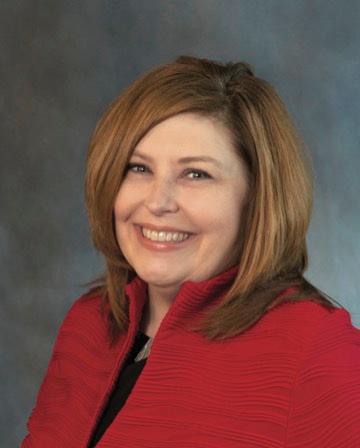
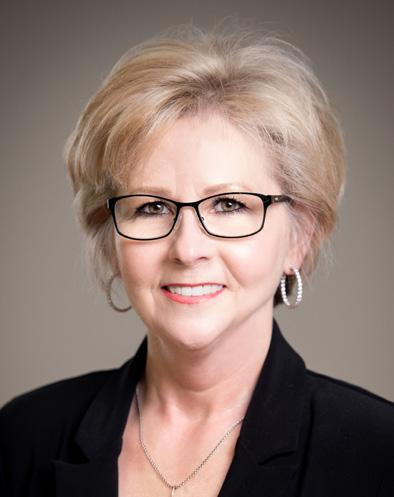
Rogers serves on the board of Ronald McDonald Charities of Arkansas, where she is also treasurer. She is a member of the UA Little Rock College of Business Advisory Council, Rotary Club 99, International Women’s Forum – Arkansas Chapter, Arkansas Executive Forum and Arkansas Women’s Leadership Forum.
Kyle Sanders
NEA Baptist Health System
Kyle Sanders was born in Waco, Texas, and grew up in Newport. After high school, he joined the U.S. Navy and served from 1983 to 1989. He then attended Arkansas State University in Jonesboro, where he received a degree in finance in 1992 and an MBA in 1995. Sanders began his career with NEA Baptist as a financial analyst and quickly became the controller. He became the CFO of the 228-bed NEA Baptist Memorial Hospital in 2012, and in 2019 became the CFO of NEA Baptist Health System, which includes the hospital and NEA Baptist Clinic, the region’s largest multi-specialty group.

Overall, Sanders manages finance for the 2,000-plus employee system with a patient revenue of more than $330 million per year, which has seen steady growth since the opening of a $400 million campus in 2014.
Chris Shepard
Clark Contractors
Chris Shepard is Clark Contractors’ chief financial officer and has more than 13 years of experience in the financial industry. As CFO, Shepard’s primary role is to manage the financial resources of the company, ensuring that it remains financially viable and competitive in the industry. Working closely with other members of Clark Contractors’ leadership team, Shepard devel-
Congratulations to Arkansas’s top executives, including our own Bob Fehlman, Jay Brogdon and Ann Madea.
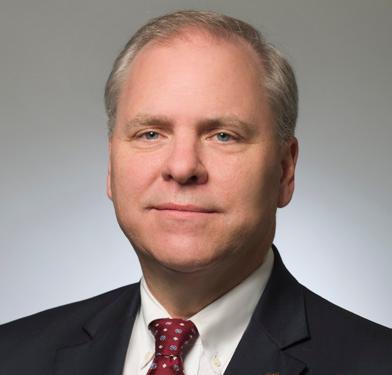
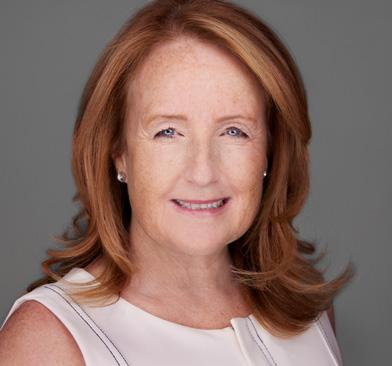
As a community bank that’s been dedicated to moving Arkansas forward for 120 years, we’re especially honored to have three leaders included in the prestigious Arkansas Money & Politics list of executives shaping the future of our great state.
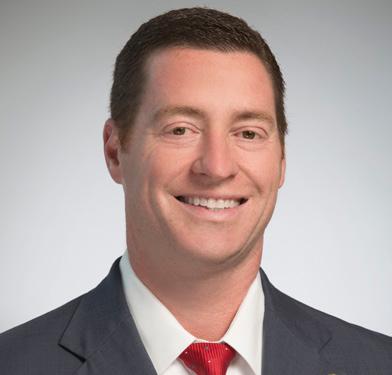
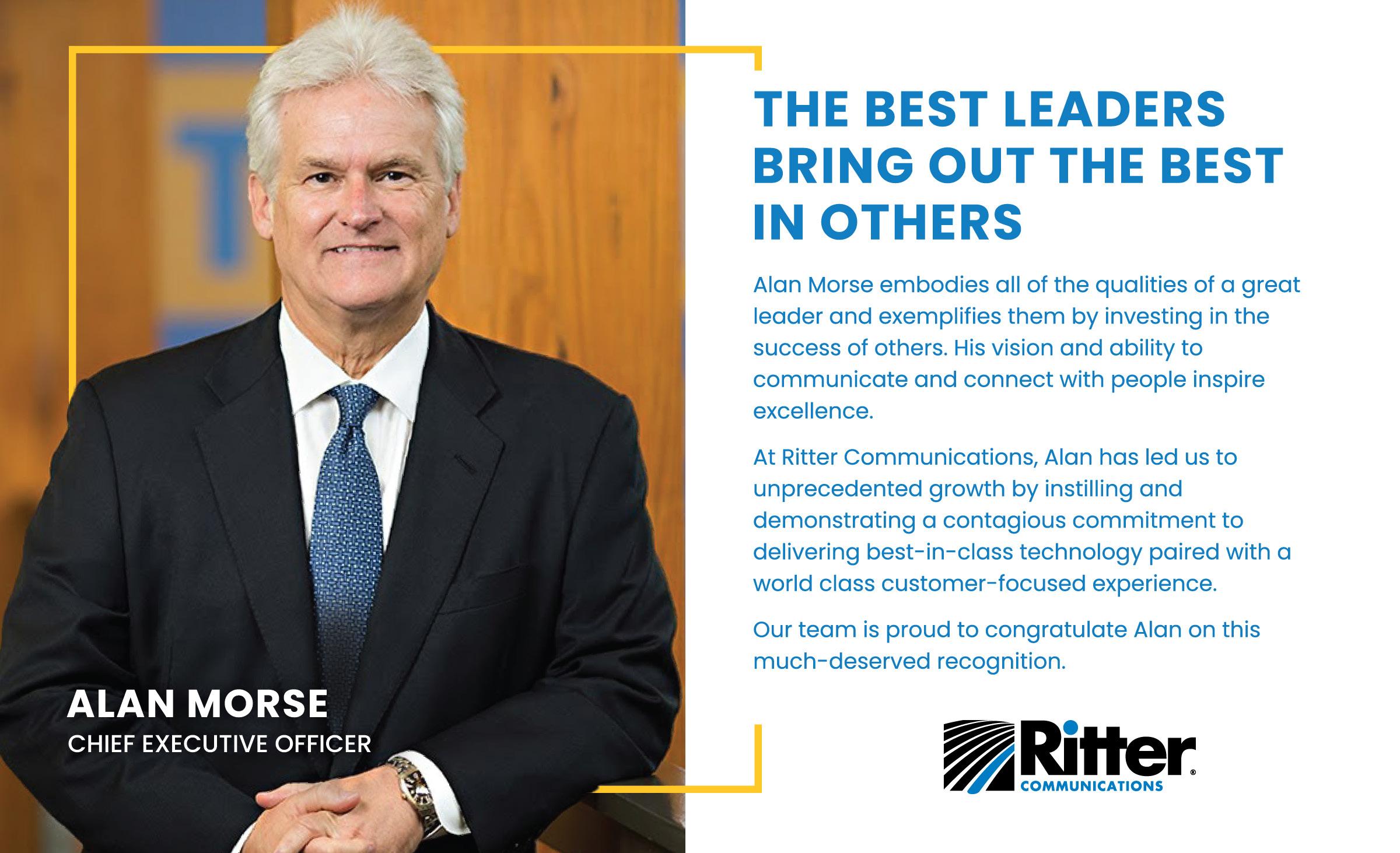
graduate with a bachelor’s degree in business administration/ finance from the University of Arkansas in Fayetteville. Sinh brings a wealth of financial, accounting and business acumen to Smiley and is key in both day-to-day operations, and longrange strategic planning.
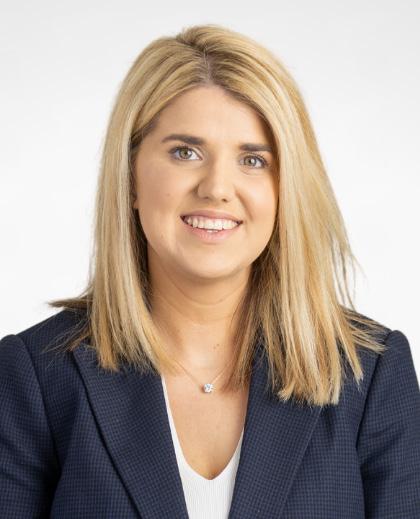

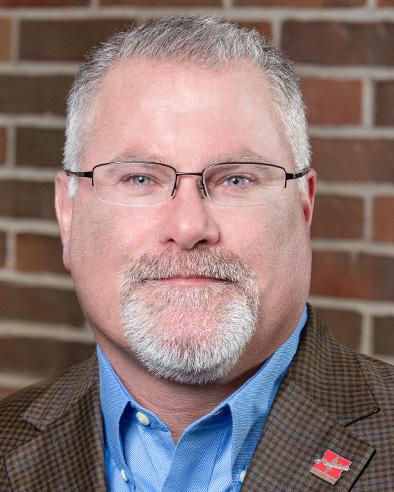





More than two decades in banking have provided Christopher Wewers with a wide range of executive experience. He served as COO, CFO and CEO of a num ber of financial institutions prior to join ing Southern Bancorp. Today, he devotes his expertise and experience to serving as the chief financial officer of Southern Bancorp, a mission-focused Community Development Finan cial Institution committed to creating access to financial op portunity for everyone, no matter the zip code, income level or financial history. Wewers is a proud alum of Henderson State University and the University of Arkansas, is an active member of both the ASCPA and AICPA, sits on the Henderson State Uni versity Foundation Board of Directors, and in 2014 was inducted into the Henderson State University Business Hall of Fame.
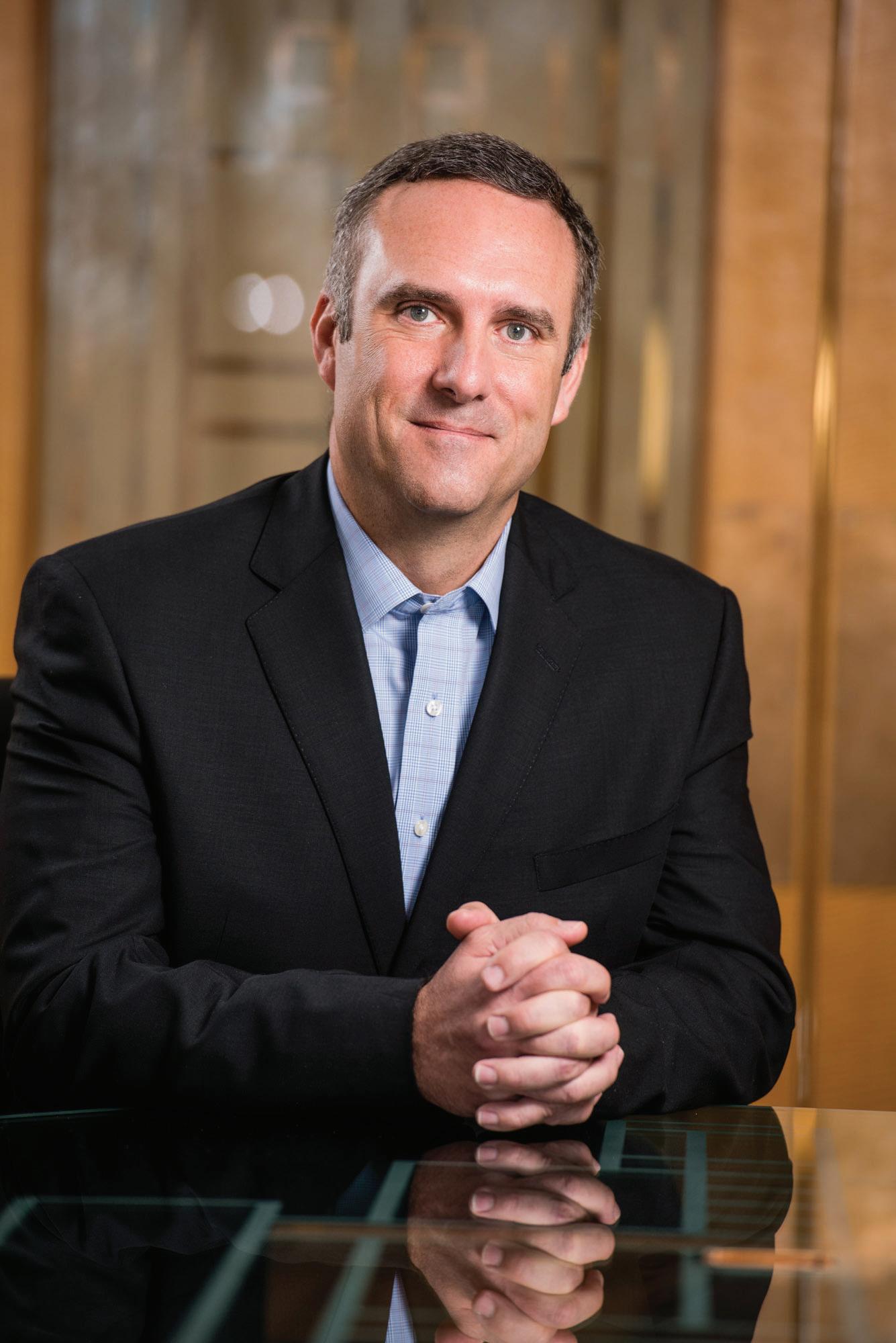


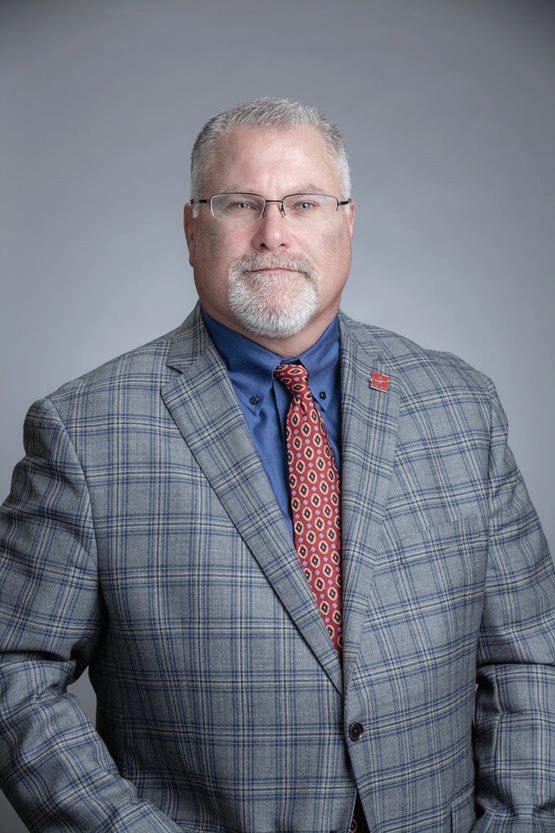
CIO/CTO
noun: CIO/CTO; plural noun: CIOs/CTOs a chief technology (or technical or information) officer, a senior executive with responsibility for managing the technological requirements of a company or other institution.

As chief technology officer and one of the original founders of TeleComp, Gino Capito oversees the company’s internal data and security infrastructure and software development divisions. Originally from central Arkansas, he worked as a mechanical engineer for Orbit Valve while attending UA Little Rock until the internet appeared on the scene. Realizing its potential of the Internet, Gino then focused his energies on software development and website creation for businesses needing a web presence. During this time, he changed his college major to computer science and learned more than 15 programming languages.
Capito and his family moved to northwest Arkansas in 1998, and he began working as a network engineer. Shortly thereafter, he co-founded Platinum Technologies, a company focused on networking, servers and Cisco VoIP.
In 2003, he and a partner acquired Dixieland Computers and merged all client bases into what is now known as TeleComp, one of Arkansas’ largest privately owned technology companies, with more than 100 employees in seven offices across Arkansas, Oklahoma and Texas.

With 15 years of experience as a banking technology executive, Jason Cathey is responsible for providing leadership and strategic vision to a diverse Bank OZK team dedicated to the digital transformation of community banking including best-in-class mobile and on,line banking experiences. He also oversees the design, development and deployment of internal technology and data solutions across all Bank OZK lines of business while maintaining strict adherence to regulatory compliance requirements. In addition, Jason oversees OZK Labs, the bank’s in-house innovation hub, repeatedly recognized by the industry as one of the best places to work in fintech.
Cathey previously served as Bank OZK’s Chief Security Officer, directing the overall planning and execution of the information security, third-party risk management, data risk management, data privacy, fraud risk management and corporate security programs.
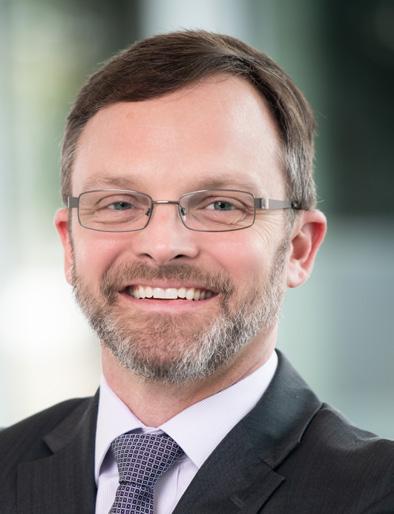
Eric Chin serves as the chief information officer of Westrock Coffee Company. He oversees the information technology needs and helps to enable the business to effectively and proactively serve customers through the use of technology. Chinn started his career in operations and logistics and has previously worked in the food and grocery, beverage distribution, sporting goods and retail industries.
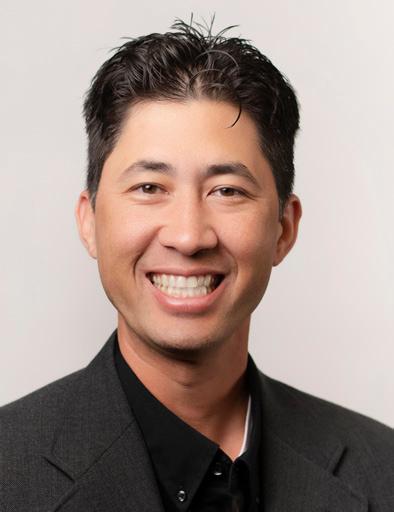 / sē tē ō/ noun
/ sē tē ō/ noun
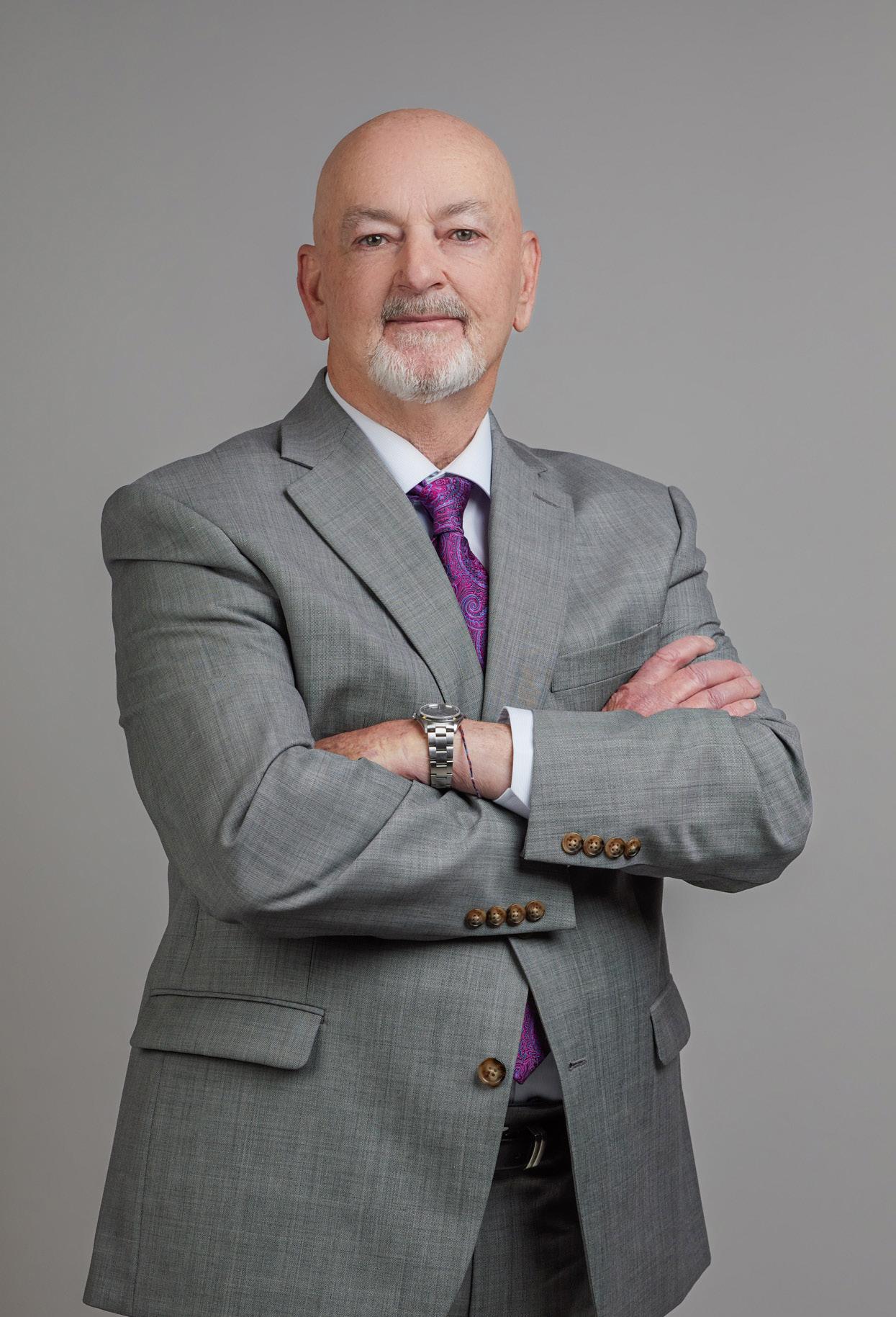
Chinn has held various roles throughout his career including chief operating officer at Mack’s Prairie Wings, division vice president at McLane Company and state operations director at Southern Glazer’s Wine & Spirits. He earned a master’s degree in leadership from Baker College and received his BBA from Harding University in Searcy.
Jeff Dean serves as the chief information officer for the Arkansas Department of Human Services (DHS). He has more than 30 years of experience in the information technology industry and 20 years of experience working for the state. Dean began his IT career at IBM, assisting in the startup of a national support center for the organization. Upon his departure from IBM, he began an IT consulting business with two partners, specializing in enterprise solutions including backup/recovery and high availability.
Dean began his public service career at the Arkansas Department of Information Systems (DIS) in 2003. While at DIS, he held UNIX systems administrator, enterprise systems director and chief operating officer roles. In January 2016, he accepted the DHS CIO position, and is in the process of modernizing the department’s legacy solutions, eliminating manual processes and reducing duplicate solutions.
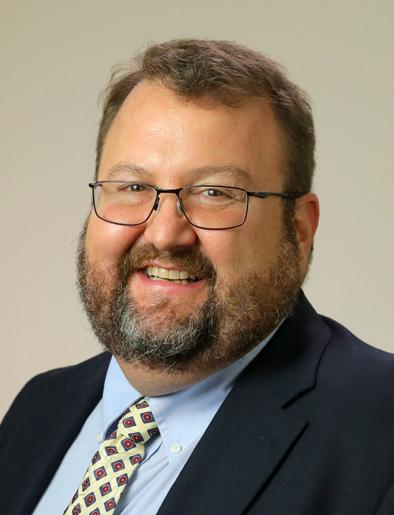
Daron Frederick was named chief information officer for the Electric Cooperatives of Arkansas in 2023. He joined the cooperatives in 2013. Frederick’s career before joining the electric cooperatives included a 16-year tenure in the United States Navy, serving as a team leader/ developer for an international banking software organization, serving as a chief information officer in the health care industry, working as the general manager of a nationwide tax service, holding the role of vice president/CIO for a national trucking company and serving as the information technology manager for the Arkansas State Supreme Court.
His role as CIO for the Electric Cooperatives of Arkansas involves guiding the vast technology, information security and communications networks that enable the electric cooperatives to provide reliable, affordable energy to the state’s 1.3 million electric cooperative members.
First Orion
Scott Hambuchen serves as the CIO at First Orion, the leading provider of branded communication solutions for enterprises and a 2022 “Inc. 5000” company. Throughout his career spanning over three decades, he has held leadership roles at Acxiom and Gryphon Networks.

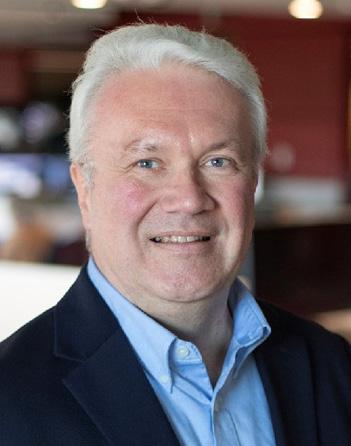
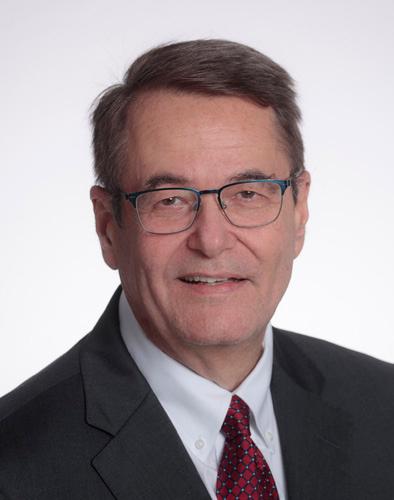
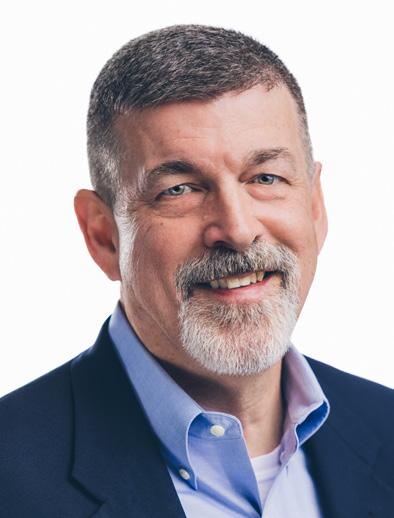
In his current role, he oversees the development of First Orion’s emerging branded-calling technology, which allows enterprises to brand outgoing phone calls with their name, the reason for calling and the logo on the call recipient’s mobile device.

Rob Horan
Farmers & Merchants Bank
Rob Horan is a senior vice president and serves as chief information officer at Farmers & Merchants Bank. In this role, Horan created and implemented a strategy to modernize banking platforms and to mobile-enable bankers to “take the bank” to the customer. In addition to the information technology teams, he also supports process improvement and efficiency efforts within the bank, is responsible for digital banking, debit, and payment platforms and has oversight of customer support through the bank’s solutions center.
Over the last 30 years, he has served in the operations, finance and technology space for banks and the financial services industry. His primary focus is to make a difference by taking a technology forward approach to serving and supporting customers and teammates in the community banking and large national bank space.
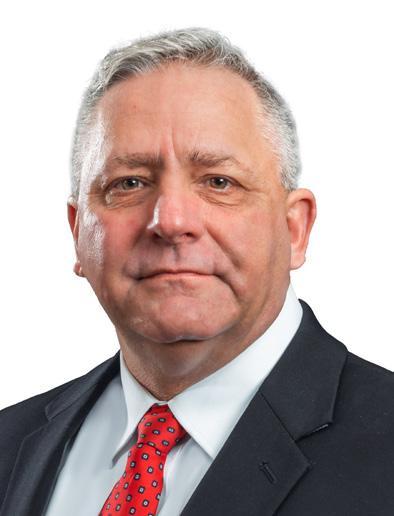
Brian Keltch serves as the associate vice chancellor and chief information officer at the University of Arkansas at Little Rock. In his role, he provides vision and leadership for developing and implementing information technology initiatives on multiple UA Little Rock campuses. Additionally, he oversees all aspects of the university’s information technology and systems. His belief that IT plays a vital role in tangible campus outcomes helps his team provide high-end support for university priorities.
Key focus areas include an implementation of a new ERP, security hardening and infrastructure upgrades. Prior to joining UA Little Rock, Keltch worked in IT leadership positions with Northrop Grumman for 29 years, most recently in Little Rock, where he was responsible for providing information technology products and services in the state. He holds a master’s degree in systems engineering and software engineering from Southern Methodist University and is currently pursuing a doctoral degree from UA Little Rock.
Steve Krogull is the chief information officer and associate vice chancellor of information technology services at the University of Arkansas. He began serving in the role as an interim leader in March 2020 before being permanently named to the position a few months later. Krogull joined the UA’s IT Services organization
His title might be Chief Financial Officer, but our team knows his work goes beyond the financial stewardship of our agency. With a Building Good spirit, a love for his community, and a willingness to do anything and everything to keep Stone Ward moving ahead, John Rogers shows all of us what it means to lead with excellence.
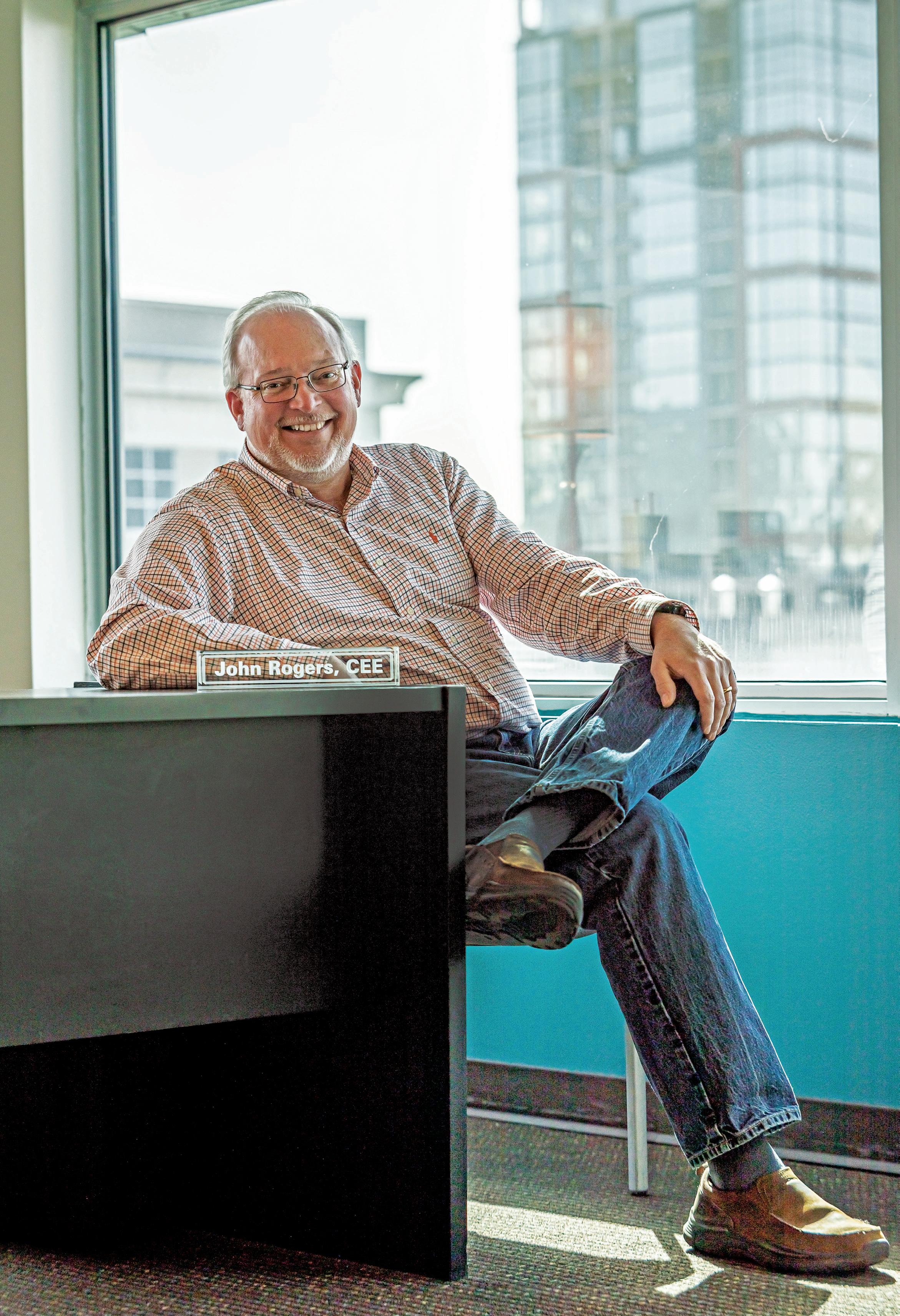
To our Chief of Everything Else, thank you for all you do to make Stone Ward great.
www.stoneward.com


in October 2019 as the associate chief information officer for research and academic technology.
Prior to that, he was at the University of Wisconsin at Madison, where he served in several leadership roles covering research support, learning solutions and systems engineering. Before Wisconsin, Steve was an adjunct assistant professor and an instructional designer. He has a bachelor’s degree in radiotelevision communications and a master’s in educational media from Southern Illinois University at Carbondale.
Ann Madea joined Simmons Bank in 2021 and serves as EVP, Chief Information Officer, responsible for the bank’s overall information technology strategy and operations. With more than 20 years of experience in the financial services industry, Madea previously served as U.S. CIO for a large, global financial services company. Throughout her career, she has held leadership positions focusing on delivery, strategy, digital transformation, cloud, data and cyber strategies. Passionate about women and girls in technology, she was recently the Executive Sponsor for the Summer Immersion Program for ‘Girls Who Code’, a nonprofit organization that aims to increase the number of women in computer science. Madea is a graduate of University of Illinois at Chicago.

Erin Parker, FACHE, MBA, serves as the senior vice president/chief information officer for Arkansas Children’s. She is responsible for leading the organization’s focus on systems security, infrastructure and digital initiatives that make health care more accessible and unified for the organization’s workforce, providers as well as for patients and their caregivers.
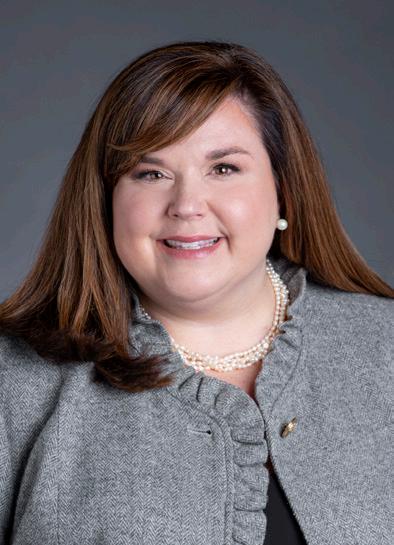
A strategic thinker with additional expertise in health care compliance, Erin is a dynamic leader with a deep knowledge of the state’s only pediatric health system serving close to 700,000 children in Arkansas. She has a track record of driving culture to transform the use of technology in access to care, provision of care and the continuum of care. Parker has bachelor’s and master’s degrees in business administration and is certified in health care compliance (CHC) and health care privacy compliance (CHPC). She is a fellow in the American College of HealthCare Executives (ACHE) and serves locally on the Rock Region Metro Board of Directors.
Rasesh Patel came to Apptegy with unmatched experience developing software engineering teams. Prior to becoming Apptegy’s chief technology officer, Patel spent 24 years at Acxiom Corporation, where he started as a software engineer and rose through the ranks to senior director of product engineering.
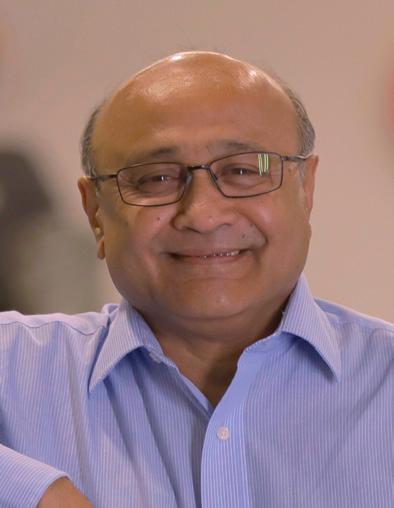
Patel has a reputation for being the “fixer.” Much of his work at Acxiom involved consulting with engineering teams to increase velocity and ship projects more quickly. At Apptegy, he’s built the engineering organization from 15 to nearly 150 engineers. His leadership has not only allowed the ed-tech company’s technical team to spread across geographies but also expand its products. Keith Jordan, a long-term colleague of Rasesh’s, described him as a strong counter-balance for most technical leaders: “Rasesh considers the engineer first and the work second. He’s always been focused on building relationships across his teams.”
Lizzie Phillips
Stephens Insurance
Lizzie Phillips is the chief information officer and senior vice president for Stephens Insurance. In this role, she manages the firm’s technology strategy and data analytics platform. Prior to joining Stephens, Phillips started Rock Analytics LLC, where she deployed her expertise in visual analytics to help companies build reporting systems. Her background in analytics was shaped by seven years of service to Keybridge, an economic and public policy consulting firm in Washington, D.C., where she was a director. Before D.C., Phillips worked for microfinance organizations in India and the Philippines and completed a Fulbright research study.
Phillips holds a master’s degree in public affairs from Princeton University and a bachelor’s degree in economics and international studies from Rhodes College.

James Reed
Conway Regional
As chief information officer for Conway Regional, James Reed is responsible for the information system operations of the health system. In addition, Reed provides executive oversight of the pharmacy and quality departments and serves as Conway Regional’s corporate compliance officer. He has spent the past 10 years as CIO. Reed has also served as pharmacist and pharmacy director at Conway Regional and was administrative director of St. Anthony’s Medical Center for nearly four years.
In 2019, Reed achieved the Conway Area Chamber of Commerce’s North Metro Healthcare Award for Administrator of the Year. He is also a fellow of the American College of Healthcare Executives.
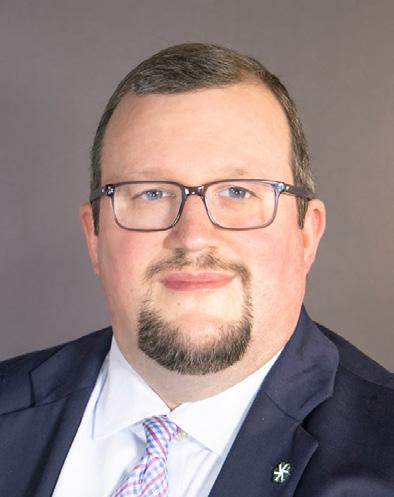
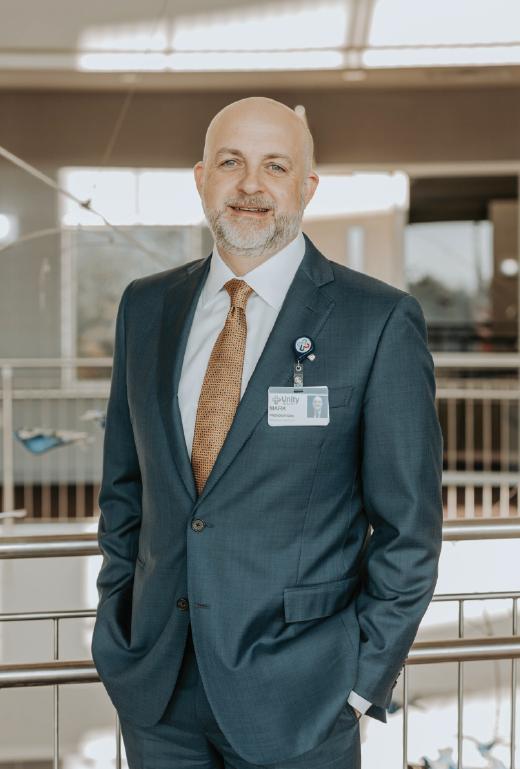


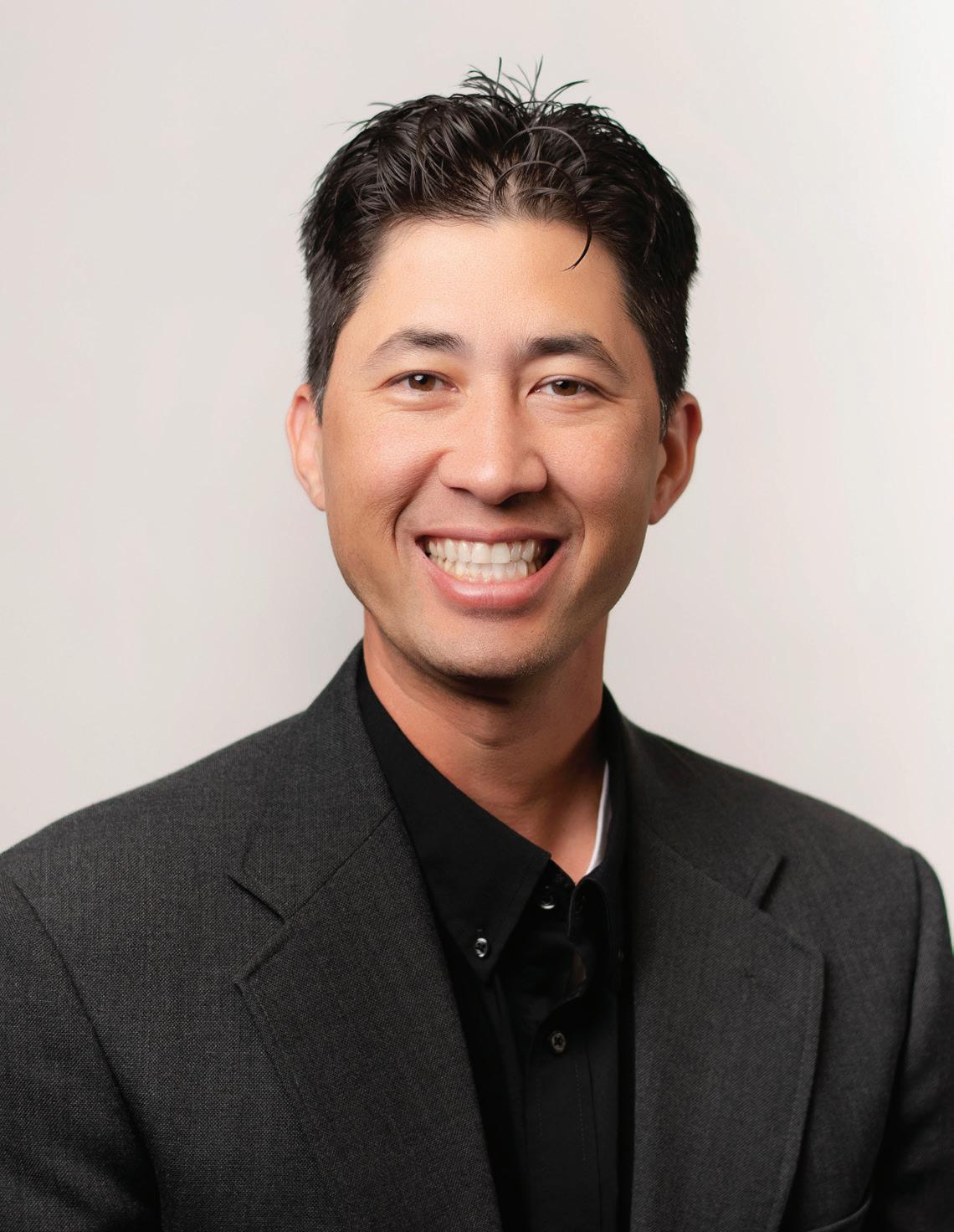



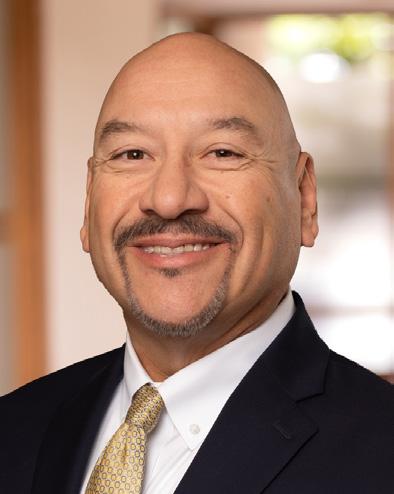
Henry Torres leads a team of more than 100 IT professionals across seven campuses. He is also adjunct instructor of information systems and business analytics at the ASU Neil Griffin College of Business in Jonesboro. Before moving to northeast Arkansas, Torres was an IT executive specializing in areas of distribution, logistics, store operations and e-commerce. His career included executive positions with WalMart, Neiman Marcus, CSK Auto and Frederick’s of Hollywood.
He earned a bachelor’s degree in industrial engineering from Texas Tech University, a master’s in business administration from Henderson State University and is working on his Ph.D. in business information systems at Kennesaw State University. He is a former board member of United Way of NEA, Hispanic Community Services Inc. and Mid-South Health Systems Inc. and currently serves on the boards of E.C. Barton Co. and Baptist Health of Arkansas.
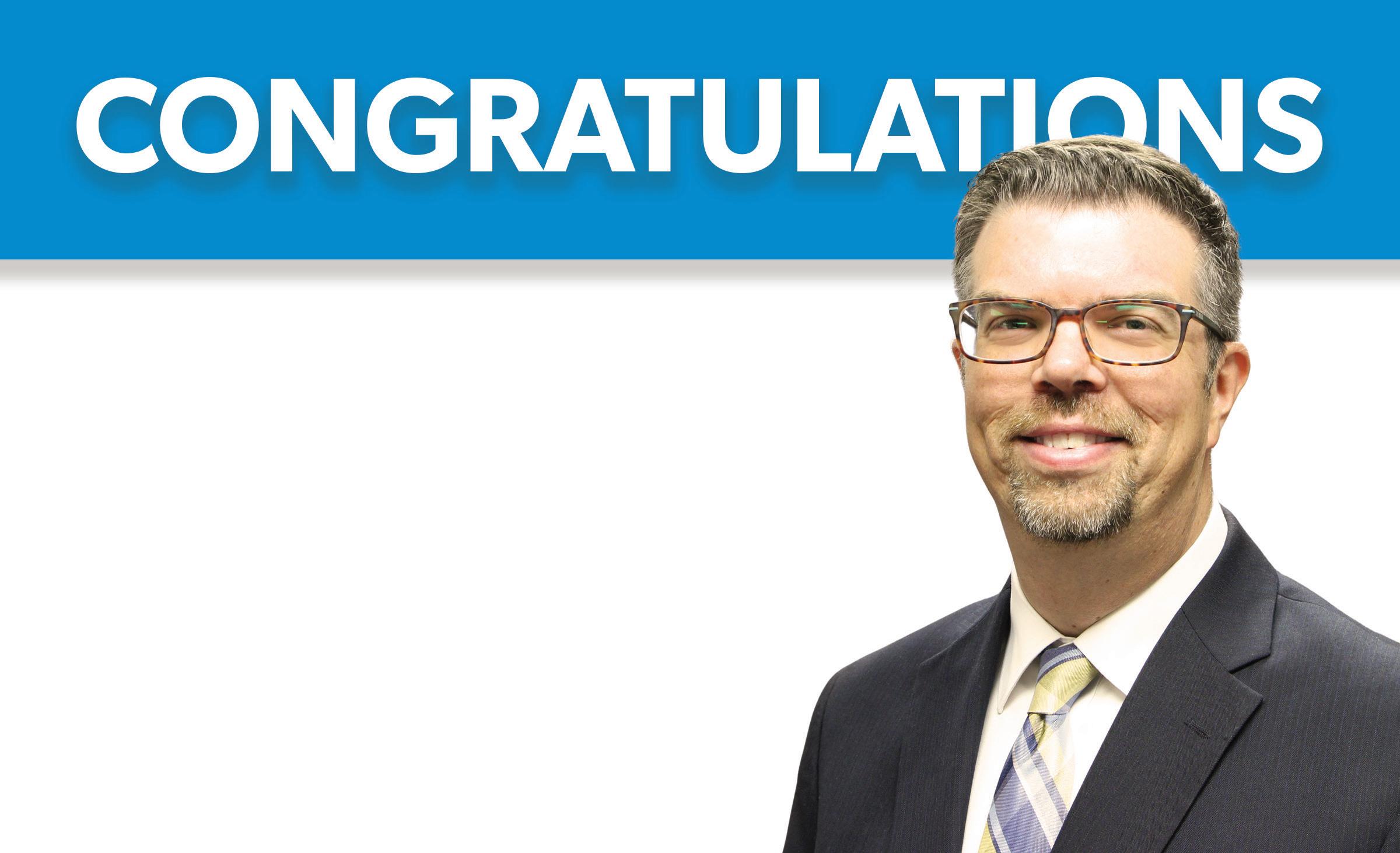
Crenisha Wright joined Arkansas Foodbank in July of 2021 and serves as chief information officer. In this role, Wright is responsible for leading the organization’s information technology department. As the CIO for the largest food bank in Arkansas, Wright’s work in technology impacts more than 330 agencies in 33 counties that serve more than 280,000 neighbors facing food insecurity.
Under her leadership, the Foodbank’s enterprise resource planning software was upgraded, computer systems were updated and migrated to Microsoft O365, an automated service desk was implemented and cybersecurity and network monitoring software was acquired. Wright’s department also was awarded a grant that funded 95 percent of the organization’s network infrastructure, licenses and support for five years. Wright received a bachelor’s degree in management information systems from the University of Central Arkansas, an MBA in management from Texas A&M University-Texarkana, an MS degree in information science from the University of Arkansas at Little Rock and is currently a Ph.D. candidate in the computer and information sciences program at UALR.
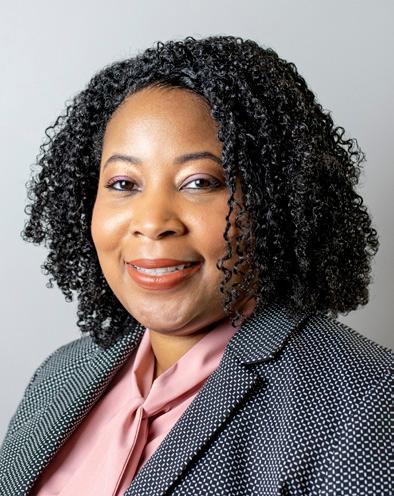
Congratulations to our President and CEO, Gary Paxson, for being recognized as a top C-Suite executive by Arkansas Money & Politics.
We are a skilled nursing facility with a state-of-the-art rehab center offering person-centered care in a quiet and serene setting.
We are a skilled nursing facility with a state-of-the-art rehab center offering personcentered care in a quiet and serene setting.



Awarded Bronze National Quality Award by the American Health Association.
We are a skilled nursing facility center offering person-centered

Awarded Bronze National Quality


Awarded Bronze National Quality 1092 West Stultz Road, Springdale
1092 West Stultz Road, Springdale 479.750.3800 ShilohHR.com
Awarded Bronze National Quality Award by the American Health Association.
We are a skilled nursing facility with a state-of-the-art rehab center offering person-centered care in a quiet and serene setting.
Awarded Bronze National Quality Award by the American Health Association.
1092 West Stultz Road, Springdale | 479.750.3800 | ShilohHR.com
Awarded Bronze National Quality Award by the American Health Association.
Awarded Bronze National Quality Award by the American Health Association.
1092 West Stultz Road, Springdale | 479.750.3800 | ShilohHR.com
In April, Arkansas Money & Politics will highlight business leaders in Arkansas who keep our state exciting, dynamic and unique. AMP’s Faces are those behind the prominent and notable businesses and industries across Arkansas. Don’t miss the opportunity to be a part of this


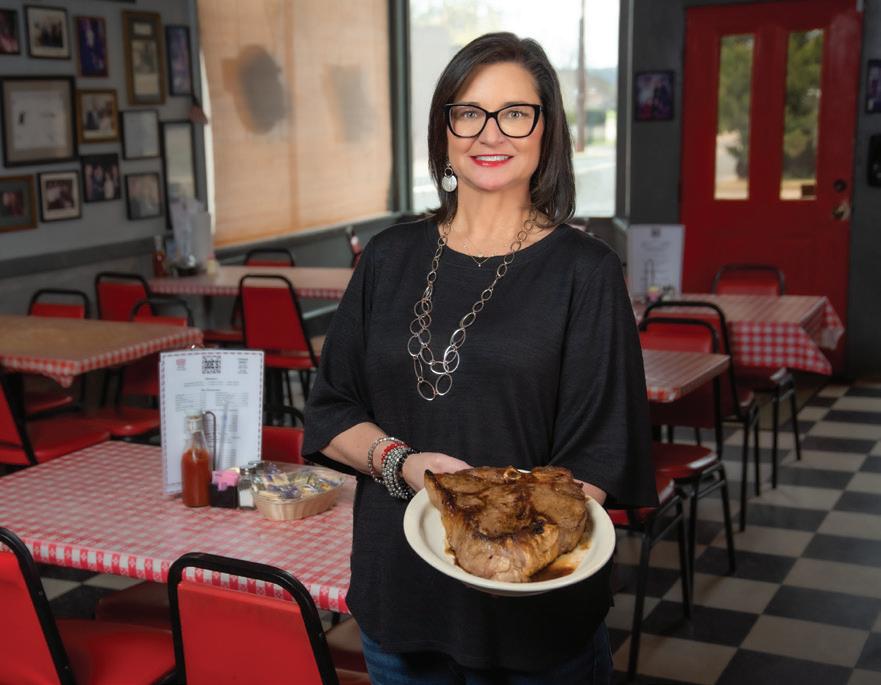
Is your leadership style more hands-on or hands-off?
My leadership style used to be more hands-on, but I’ve built such a great team, I can be a little more hands-off now. Even though I’m still involved in the everyday operation of my business.
What’s an alternate path you might have taken if things had played out differently? I grew up bussing tables, so it’s not surprising that this is the business I’m in. But growing up, I thought I’d be a kindergarten teacher.
Have you ever been mentored or mentored someone else? My dad, George Eldridge, has been my mentor in the restaurant business, and who better, since he has almost 50 years in this business.
Doe’s Eat Place • 501.376.1195 • doeseatplacelr.com
Doe’sEatPlaceLittle Rock DoesEatPlace doe-s-eat-place doe-s-eat-place

Have you ever wondered what sets the top athletes apart from the rest? Physical strength and skill certainly play a role, but what truly separates the champions from the average is their ability to push their mind and body beyond what most of us would know as the absolute outer limits to deliver on their responsibilities.
Their ability to persevere in the face of physical and emotional stress, high pressure and sometimes extreme adversity, is a major critical factor that enables these champions to consistently perform at their best and to fulfill their commitments to themselves and their teammates.
I began studying high performance academically as a young professor and doctoral student before studying it in the workplace. This quest to learn new things so that I could always stay at the top of my own game continued throughout my career, across five continents as a senior executive in a publicly traded company, and now as a consultant across multiple industries — from health care to large companies, from non profits to entrepreneurial ventures and across many different languages and cultures.
In my experience, a critical element of achieving success in any endeavor is taking ownership of one’s actions and being accountable for the outcomes resulting from those actions, regardless of the external situation, circumstance or pressure. Whether in sports, work, volunteer projects or at home, this willingness to be held accountable, even in the face of extreme difficulty, is the foundation of peak performance as well as personal fulfillment.
Occasionally, however, we get blindsided by the unexpected setbacks of life. As the familiar bumper sticker reads, “S#@+ Happens!” We don’t always know what is going to happen or when. Such was the case in March 2020 and beyond, as the world faced a global pandemic. The sudden shift to remote work, stress and uncertainty resulting from the pandemic, and the blending of work and home life, all contributed to seemingly unbearable circumstances for many people. Additionally, the ongoing isolation and physical distancing measures also took a considerable toll. Often, when we get hit with these unexpected challenges or hurdles, we stumble. And when we stumble, we sometimes find it hard to bounce back.
Mental toughness refers to keeping one’s focus and persisting even when things don’t go as planned. The American Physiological Association (APA) defines mental resilience (toughness) as “the process of adapting well in the face of adversity, trauma, tragedy, threats, or even
major sources of stress.”
For our purpose, we define mental toughness as “the quality of being adaptable, with the ability to bounce back despite significant adversity, and to remain focused on a desired outcome regardless of the external situation, circumstances or pressure.” Additionally, use the term synonymously with the terms mental resilience, mental strength, stamina, strength of character, perseverance and grit.
It has become clear that mental toughness isn’t just for athletes — it’s a valuable trait in any area of life. Whether we’re facing a personal challenge, a difficult work situation or a personal failure, being able to regroup, adapt and persevere, despite the setback, is a hallmark of being mentally strong and resilient. Being mentally tough does not mean we are able to avoid periods of distress, difficulty or even significant physical and emotional turmoil. These things are common in people who face major adversity, setback, failure or even trauma. Rather, mental toughness enables us to persist through this distress and difficulty, often even in spite of it.
Developing a degree of mental toughness prepares us to be the best versions of ourselves, despite the challenges we face from day to day. It helps us sustain our efforts, persevere through discomfort, rebound from temporary setbacks, as well as achieve and sustain peak performance across multiple areas of our lives.
In sports, athletes who have mental toughness are highly likely to produce favorable performance outcomes in ways that promote sus-
“Success is not final, failure is not fatal. It is the courage to continue that counts.”
~ Winston Churchill
“The quality of being adaptable, with the ability to bounce back despite significant adversity, and to remain focused on a desired outcome, regardless of the external situation, circumstances or pressure.”
tained motivation. For example, golfers with higher levels of motivation have lower levels of anxiety. So, motivation and mental toughness tend to be tightly linked, leading not only to positive results, but also to reduced anxiety and emotional strength and stability.
Being mentally tough not only improves our personal and professional lives, it also brings many benefits to organizations. According to Mental Toughness Partners, research conducted throughout the world found that people with better and higher levels of mental toughness, as measured by the MTQ48, tend to enjoy many benefits, including the following:
• Increased aspirations: Greater confidence and ambition in the achievement of defined targets and a stronger willingness to persevere.
• Adaptability to change: A lower and calmer stress response to organizational changes.
• Greater well-being: Improved stress management and higher levels of contentment.
• Improved positivity: An easier adoption of a “can-do” approach leads to better connectivity and rapport with colleagues.
• Better performance: Accounting for up to 25 percent of variations in organizational performances.
A recent study of several thousand subjects, including employees from multiple organizations, found only a small percentage of subjects to be mentally resilient. Several other researchers have found that employees in organizations worldwide increasingly lack a baseline degree of mental toughness. The following paints the picture:
• According to the American Psychological Association, burnout and stress are at all-time highs across multiple professions and among healthcare workers.
• In 2021, American workers saw heightened rates of burnout, with 79 percent reporting some degree of work-related stress in the month immediately preceding the “Work and Well-being Survey.”
• Nearly 3 in 5 employees reported being negatively impacted by work-related stress, including lack of interest, motivation, or energy (26 percent), lack of effort at work (19 percent), cognitive weariness (36 percent), emotional exhaustion (32 percent) and physical fatigue (44 percent).
• According to Gallup, around one-third of individuals worldwide reported feeling angry, worried, and stressed, and one in four workers experienced burnout either “always” or “very often.”
• Finally, the Mental Health Foundation reported that 74 percent of individuals had experienced stress to the level that they were unable to address or cope with it.
Since the pandemic, many experts have called for employers to take definitive measures to more practically and deliberately address these issues and to more proactively support the emotional well-being of their employees.
However, a systematic method for building mental resilience is not employed in most organizations. A combination of factors has been shown to contribute to the development of mental toughness, some of
which include:
• A positive view of self, as well as confidence in one’s strengths and abilities;
• The capacity to be deliberate and intentional, making realistic plans and taking steps to carry them out;
• Communication and problem-solving skills;
• The capacity and ability to manage and control strong feelings and impulses.
Different institutions, organizations and businesses have different training methods, programs and techniques to condition mental toughness. While some businesses are increasingly recognizing the importance of cultivating mental resilience in their employees, in order to improve their well-being, productivity and overall performance, various military units are among the organizations that invest mostly heavily in mental toughness and resilience preparedness.
For instance, the U.S. Army employs a training program designed to help soldiers develop the mental toughness and resilience needed to cope with the stressors of military service called the Mental Resilience Training Course (MRTC). The Navy SEALs and members of the U.S. Marine Corps have reputations for being some of the most mentally tough individuals in the military.
Their training also includes specific components that are focused on building and maintaining this mental toughness. Some of the focus areas of these programs include helping soldiers deal more positively with stress, helping them learn to exert more emotional and mental control and helping them to work under intense pressure or stress for extended periods of time.
Mental toughness is essential for success in the workplace and in life. From the CEO to the entry-level employee, the ability to handle stress and uncertainty, to set goals and work effectively as a team can make a significant difference in both individual and organizational success. By understanding the importance of mental toughness and learning how to develop these (and other) skills, one can achieve greater levels of success, while also experiencing greater degrees of personal and professional fulfillment.
It is important to remember that mental toughness is not a combination of fixed traits, but rather, skills that can be developed and strengthened through self-awareness, training and practice.
Next month, we will explore specific strategies and techniques leaders and their employees can use to begin developing mental toughness.
Next Month: “Developing Mental Toughness: A Perfect 10 for People Who Win.”
Dr. Jeff D. Standridge helps organizations and their leaders generate sustained results in the areas of strategy, leadership, profit growth, organizational effectiveness and innovation. He is a three-time bestselling author, executive coach and consultant. Jeff can be reached at JeffS@InnovationJunkie.com.
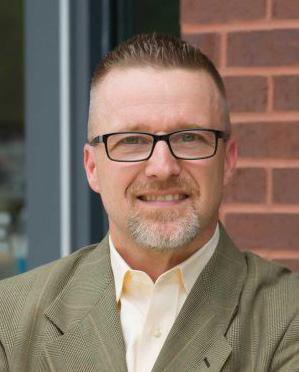
The first thing you’re told coming into the Arkansas General Assembly is that it’s like drinking out of a fire hose, State Rep. RJ Hawk explained. Except in his words, it’s more like “putting your mouth up against a fire hydrant and turning it on.”
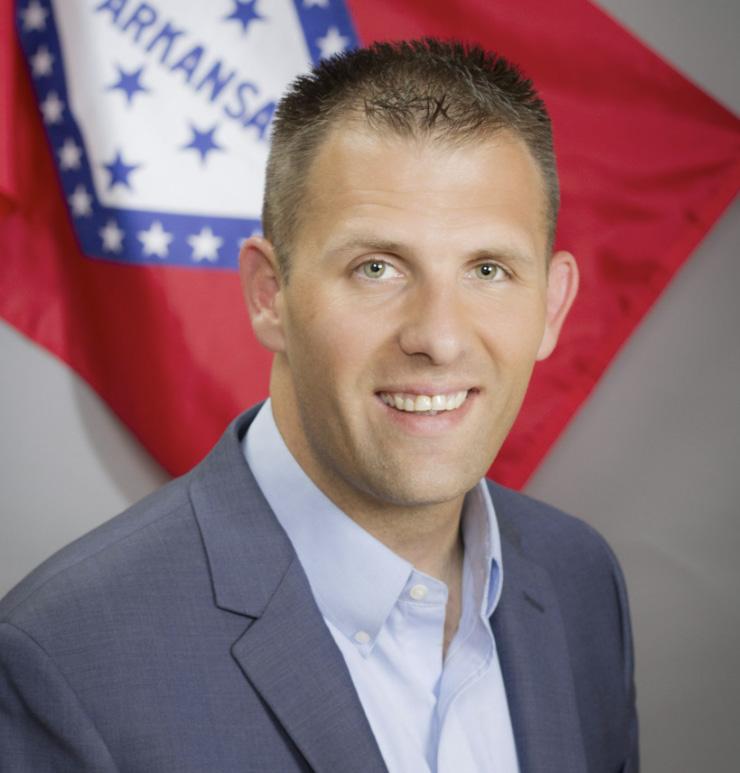
Hawk was recently sworn in for his first term representing Arkansas’s 81st District which covers Bryant, parts of Benton, Shannon Hills and Alexander. Previously, Hawk spent most of his career in sports media with 103.7 The Buzz. More recently, he entered the world of real estate with Clark & Co. Realty and served two terms as a Bryant city councilman. Though these careers could not have fully prepared him for the Arkansas House of Representatives, his experience in working with and helping those around him has given him a strong foundation to build upon.
Originally from Athens, Texas, Hawk first came to Arkansas in 2004 to play baseball at the University of Central Arkansas. A serious knee injury ended his sports career early, and he considered leaving college to become a police officer. His mother convinced him to stick it out, however, and he earned a Bachelor of Science in Mass Communications and a degree in marketing. He was the first person in his family to graduate from college, though his mother completed a degree of her own just a week later.
Diploma in hand, Hawk immediately set out to find a job in sports media. Unfortunately, the year was 2008, and the Great Recession meant pickings were slim in just about every industry.
“Nobody was hiring,” Hawk said. “I had gone to school to be on either radio or TV. That was my thing, but I couldn’t find anything. I was applying for jobs in Butte, Montana, and I just couldn’t get anything.”
During his time at UCA, Hawk had done an internship working at 103.7 The Buzz. After about six months of job hunting, The Buzz contacted him with an offer for a full-time position as producer of a weekend show with Bill Vickery. Hawk jumped at the
chance and a long career in sports media was born.
In his work at The Buzz, Hawk may have been best known as a co-host on Morning Mayhem, which Hawk described as “coffee shop talk” about sports and a wide array of other topics. He has also frequently done live commentary and sideline reporting for games ranging from the Dallas Cowboys to NCAA tournaments to Arkansas high schools. His love for being at the games in person was matched only by his love for working with the people he met there.
“That, to me, is the most fun thing about my job: being able to interact with people you see on TV,” Hawk said. “One guy that I
became friends with was an idol of mine, Brad Sham, the voice of the Dallas Cowboys. Things like that are the things that I’m going to remember the most about sports radio.”
He recalled a game on Thanksgiving Day 2010 between the Cowboys and the Saints.
“I’ll never forget – right before the game started, Jerry Jones, owner of the Cowboys, came into the press box,” Hawk said. “And he treated the entire media to Thanksgiving dinner because they were covering the Cowboys on Thanksgiving Day. And so I got my plate and I sat down by myself. Brad Sham, Jerry Jones and his son Stephen Jones all sat down at the table with me.
“They just grabbed a seat, and I sat there and didn’t know what to say. Finally I said, ‘Hello, Mr. Jones, I’m RJ Hawk. I work for a sports radio show in Little Rock.’ And because he’s from Arkansas, he immediately brightened up, and we sat there for 30 minutes and just talked.”
Joining the world of politics was not something that had occurred to Hawk until the world of politics came to him. Though one of his shows with Vickery, The Sunday Buzz, mixed sports with politics, it had always been the sports that interested him.
That changed in 2017 when Hawk was approached by members of the Bryant community who asked him to run for the Bryant City Council. He had no idea what being a councilman ,thought he would hate the job if he took it. The only one who supported the idea was Shane Broadway, a former Democrat state legislator who had served as Speaker of the House and as a senator. Broadway thought Hawk would do a great job in the position, and Hawk decided to follow his advice. He ran for the city council in 2018 and took up the posi tion in 2019.
“I thoroughly enjoyed it,” Hawk said. “I served four years on the Bryant City Council, and I enjoyed it when somebody called me and said, ‘Hey, I’m having a hard time getting through to the water department. Can you help me out?’ And I literally picked up the phone, called the director, got them connected and got their problem solved. I love solving problems, and I love fixing things.”
Not too long after joining the political scene, Hawk also took his first steps into real estate. Since 2011, Hawk has run a small business called Hawk Media Solutions, which specializes in drone photography for real estate professionals. One of his
frequent clients, Jesse Clark of Clark & Co. Realty, believed Hawk would by great in real estate and repeatedly tried to get him into the business.
Hawk had long had an interest in the industry, something he attributed to his mother, who he said “could sell rain to a cloud.” She had been the No. 1 jeweler in the state of Texas but left the business after Hawk was born. She was his idol, so the idea of being a salesman intrigued him, yet he refused Clark’s offers, unsure of what the job would require.
When Hawk decided to sell his house in 2019, however, Clark convinced him to simply watch as he handled every aspect of the transaction. In watching Clark, Hawk realized that the real estate business was primarily a job of communication and chose to give it a shot.
“My first full year of doing it, I sold $8 million in real estate,” Hawk said. “My second year, I was one of the top 30 real estate agents in Saline County. It’s really kind of grown into a passion of mine. I love it because, once again, if you look back at everything that I’ve done, whether it be city council or real estate, it’s about helping people.”
When Rep. Andy Davis chose not to run again in 2021, the seat for District 31 was left open. Hawk once again went to Broadway for advice, and his mentor told him, based on the good work he’d done for Bryant, that he should move up to the state level.
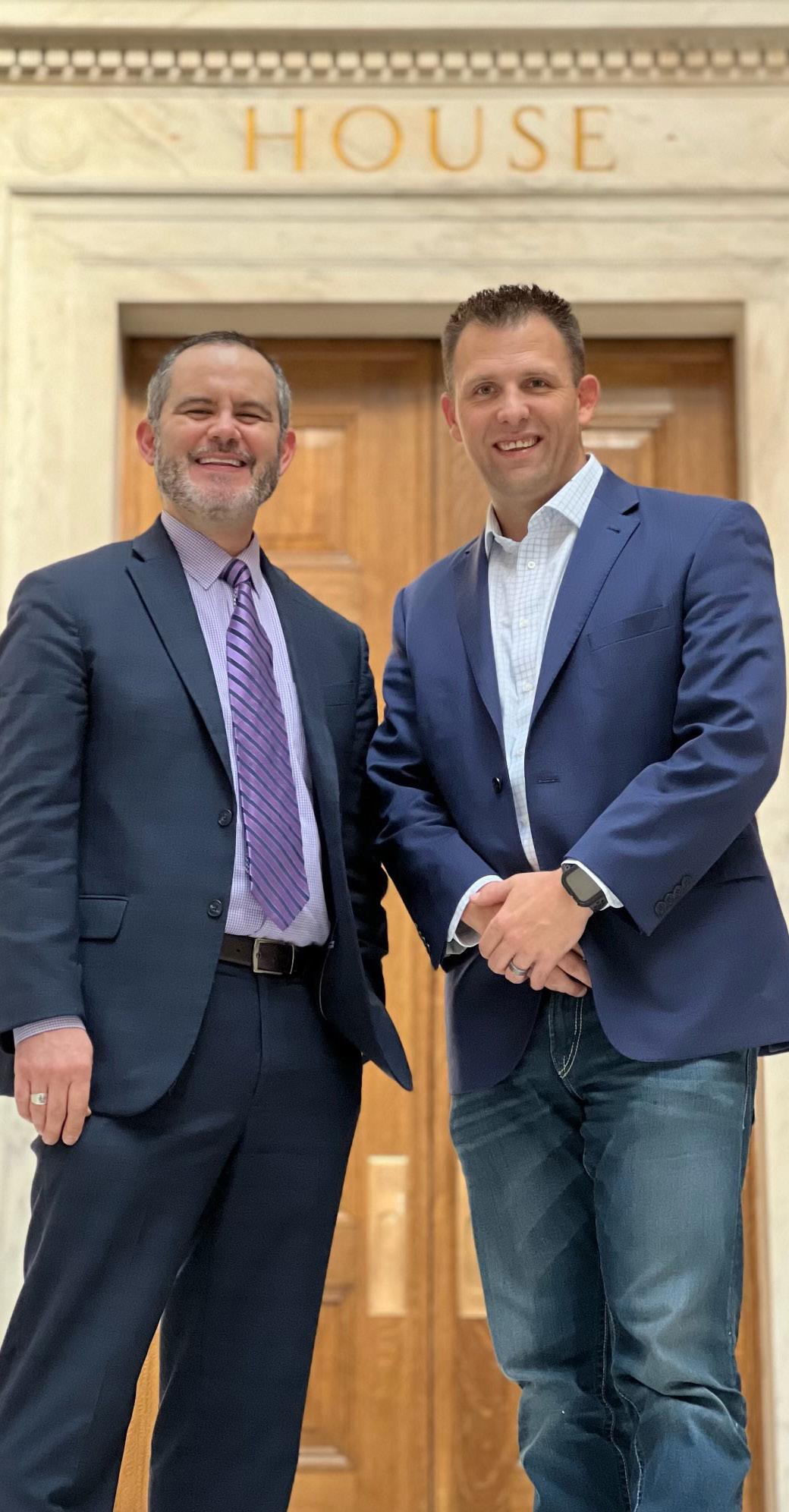
As an open seat, Hawk hoped he would be able to more or less walk into the position. Instead, he found a challenger: Keith Brooks.
“A lot of times in politics, voters only see the bad out of people; they only see the negative things you’re putting out,” Hawk said. “This person did this or this person did that, and you nev-
Hawk’s vision for Arkansas is a state where the government stays out of people’s lives, individual liberties are upheld and a combination of top-of-the-line education and a business-friendly environment make Arkansas the place to be for businesses from around the nation.Hawk with Rep. Keith Brooks outside the House chamber. (Photo provided)
er hear the good things. Keith and I did not say one bad thing about each other the entire race. In fact, he and I both agreed and announced that you do your thing, I’ll do mine, and may the best man win.”
The race was decided by the incredibly narrow margin of only 27 votes, which was reduced to 21 by a recount, in favor of Brooks. Before the final tally, then-Governor Asa Hutchinson even called Hawk and congratulated him on his victory. Yet the defeat left no hard feelings.
“After the recount was over with,” Hawk said, “Keith called me and said, ‘Hey, RJ, would you mind coming to my office and telling me what you would have done if you had gotten the job?’ We sat for three hours at his office and just ate pizza and talked. And to this day, he and I have become great friends.”
Through Brooks, Hawk got his first look behind the curtain of the House of Representatives. As a new face himself, Brooks gave Hawk the play-by-by of what he encountered as a first-time representative, helping Hawk to prepare in case another chance ever came along.
Lo and behold, redistricting due to the growth of Saline County led to the creation of District 81, which allowed Brooks to remain representative of District 31 while providing an opening for Hawk. In 2022, Hawk campaigned as a Republican with a platform of limiting government, reducing taxes and supporting the police. He was successful, winning the primaries with 55 percent of the vote and the general election with 61 of ballots cast.
Having won his race, Hawk announced in late December he would be leaving his long-held post at 103.7 The Buzz. Despite this, he still plans to join Morning Mayhem as a guest host when asked, and he will continue to be involved in The Buzz’s high school sports coverage. Likewise, real estate will remain his day job, as being a representative is intended as a part-time position.
Today, Rep. Hawk sits next to Rep. Brooks in the House as the 94th General Assembly gets into full swing. Hawk has already

sponsored and passed multiple bills, one of which has been signed into law: HB1335, which amends laws regarding the election or appointment of city attorneys. Other bills he has sponsored include HB1435, which regards the repayment calculation for sales tax, and HB 1519, which would prohibit municipalities from banning breed-specific animals.
“I really appreciate how hard RJ has worked since being elected to jump in and learn as much as is possible about the position of State Representative,” Brooks said. “The people of Bryant and Saline County should know that he is an integral part of our delegation and does an outstanding job of representing them at the capitol.”
“The other thing I really want to work on is police retirement,” Hawk said. “I’d like to see the time for police retirement come down to 25 or 26 years. Right now, it’s at 28. It’s an incentive thing because, right now, nobody wants to be a police officer anymore. But the other thing is, if they’re out there protecting us, we ought to at least try to get them something that improves their quality of life.”
Hawk’s other goals include reducing taxes following last year’s $1.6 billion surplus, led by cutting corporate taxes for small businesses.
“Arkansas was built on small business,” Hawk said, “and so helping those folks out a lot is something that we’ll work towards.”
Another significant issue Hawk campaigned on was improving education, and he looks forward to seeing Gov. Sarah Huckabee Sanders’ plan for education, which has not yet been presented to the legislature in its entirety.
“I’d love to see our education system be one of the tops in the country,” Hawk said. “Right now, if you look at K-12 it’s not very good. But along with that, I would love to see our vocationaltechnical schools get more support, because not everybody’s cut out to be in college. Some people want to go and work with their hands, whether it be plumbers, electricians, people like that. I’d love to see us give more money to that and get people ready for the workforce.
Hawk’s vision for Arkansas is a state where the government stays out of people’s lives, individual liberties are upheld, and a combination of top-of-the-line education and a business-friendly environment make Arkansas the place to be for businesses from around the nation. Though it is early in his term, he’s eager to get to work bringing the state closer to that vision.
“This is a learning experience for us all,” Hawk said. “There’s not a playbook on how to be a legislator, and everybody expects you to know everything immediately. You want to, but it’s just not feasible sometimes. And so it’s going to be a learning curve, but I’m looking forward to the challenge.”
Girls are what Girl Scouts is all about. Their dreams, ideas and ambition are part of our DNA. Today’s girls want to shoot movies, build robots, speak up for what they believe in, help others, change a law.
Girl Scouts gives girls the tools to fuel their ambition, try new things, learn from failure, and make the world a better place.
Girl Scouts is a world where girls can do, and be, whatever they dream.
Backed by trusted adult volunteers and millions of alums like our Today’s Cookie CEO leaders, Girl Scouts gain the courage, confidence and character to be our future leaders in building a better world.


To learn how you can support our future female leaders, contact us at info@girlscoutsdiamonds.org or 800-632-6894.

girlscoutsdiamonds.org
@girlscoutsdiamonds
When it comes to investing in the future, there are few methods as simple or as tasty as the Girl Scout Cookie Program. For many Americans, cookie season means rushing to stock up on Thin Mints, Samoas and Tagalongs. But for the Girl Scouts themselves, those stacks of boxes do so much more than satisfy an annual craving.

As the largest girl-led entrepreneurial program in the world, the Cookie Program teaches Girl Scouts valuable life lessons they’ll take into their careers and communities. During cookie season, as Girl Scouts are planning, selling, taking orders, distributing and delivering, they’re also gaining fundamental knowledge in economics, entrepreneurship, sales, the value of hard work and more.
Whether it’s the annual cookie program or one of the other community activities in which they are involved,
these Girl Scout “Cookie CEOs” are learning the value of goal setting, decision-making, money management and business ethics. All these are a part of what makes the Girl Scout experience so unique.
Lifelong learning and achievement are the foundation of the organization, and many successful business leaders — CEOs, executives, entrepreneurs — got their start as Girl Scouts. That means the boxes you buy today are, in some way, shaping the leaders of tomorrow. Perhaps the Girl Scout website puts it best: “Every bite counts!”
On the pages that follow, we’ll meet five Arkansas leaders who represent Today’s Cookie CEOs. These women serve as strong examples to young girls of the role Girl Scouts and its many programs can have in their future achievements.
What lessons from your Girl Scout days do you incorporate as a woman leader today?
It’s funny. In rereading the Girl Scout Law, I have unknowingly been living my entire life by the Girl Scout Promise and Law. Throughout my life, I’ve always tried to follow the basics of being kind, confident, caring, fair, honest, strong, respectful of others and helpful ... all lessons that are part of the Girl Scout program.. I carry one of their main mottos with me daily: “Always be prepared, show respect and stay strong!” In what specific ways does participation in Girl Scouts foster and develop leadership traits?
While I feel my parents did a great job of instilling selfesteem, confidence and character in me, it was Girl Scouts that showed me how to work well with others in groups at an early age. Without realizing it until I was much older, I learned the dynamics of working in group projects from Girl Scouts. We would get to take turns being the leader of varying projects, and that planted “leadership seeds” I carried throughout my life. It helped me to understand that a great leader needs to have confidence in herself and be able to lead by example with respect and consid eration of others. (And to have patience!) It taught me that girls
can pretty much do anything. It also fostered in me a willingness to serve, which I feel I have done a lot of in my adult life, from volunteering and chairing countless fundraisers, auctions and events at my girls’ schools, to leading philanthropic organizations in numerous fundraisers and charity gala events, all to help others.
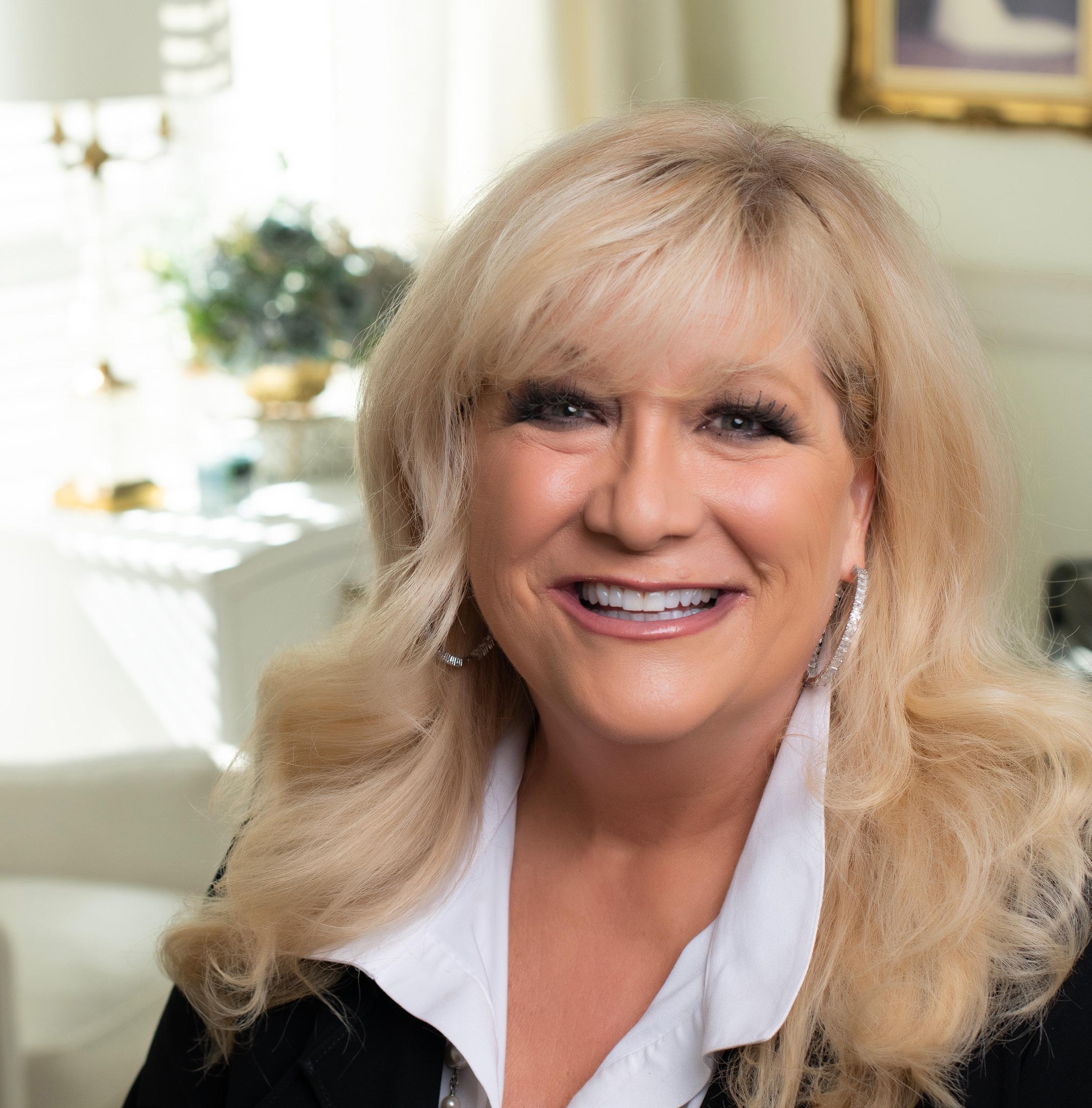
What is your favorite memory as a Girl Scout?
I think my favorite memory of Girl Scouts would be the time we went on a “day camp” field trip. It was to a wooded area outside of town, but it was my very first “girl’s trip/outing” as a kid, and it was so exciting. We learned how to work together as a team pitching a tent. We identified leaves and trees, we were shown how to start a fire (which I have yet to accomplish to this day), and it was my first experience with making and eating s’mores. It was a great day of adventure and learning how to work together as a team.
Peri-Gay’s Favorite Cookie: Caramel DeLites
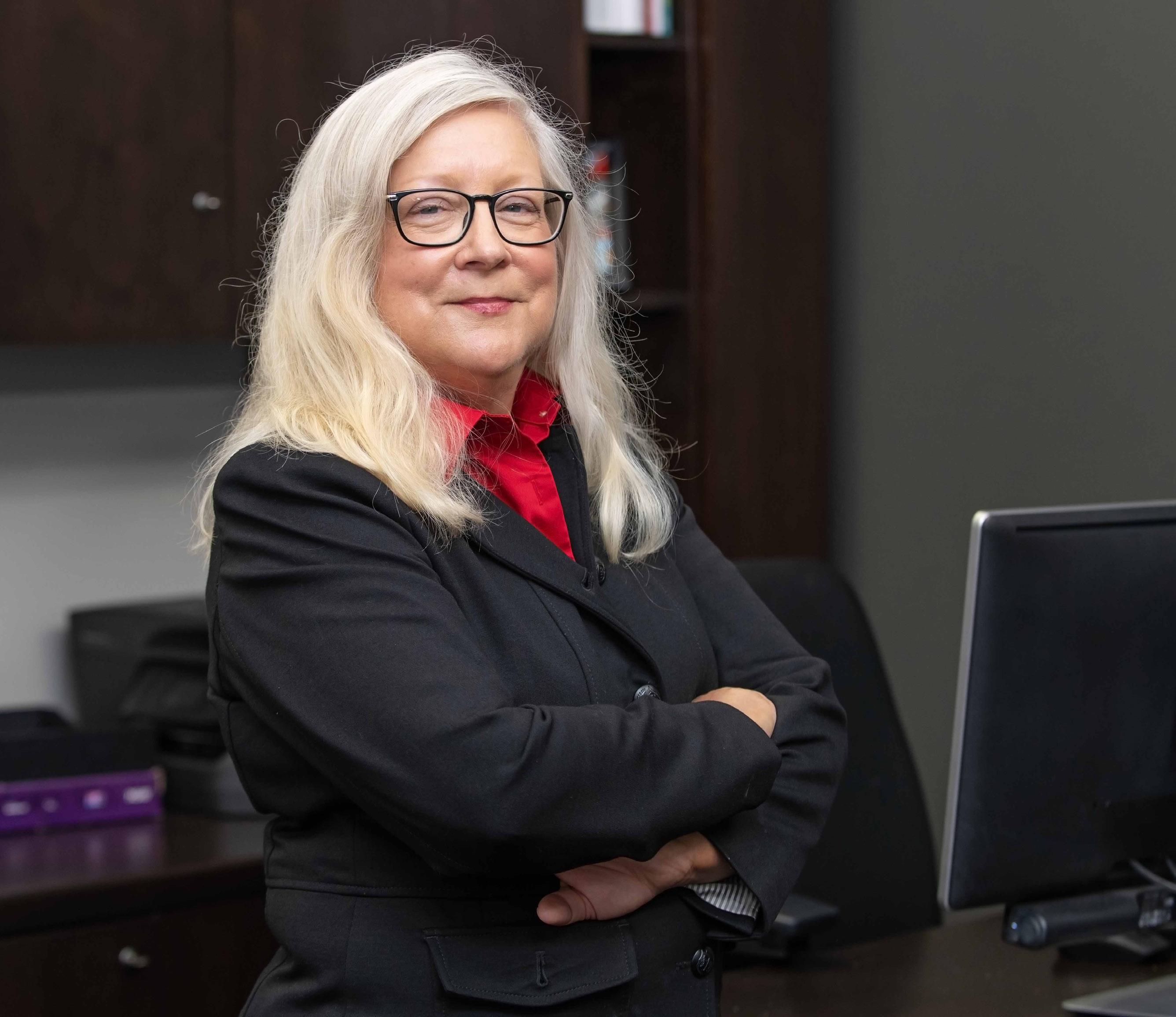 ARKANSAS STATE UNIVERSITY
ARKANSAS STATE UNIVERSITY
What lessons from your Girl Scout days do you incorporate as a woman leader today?
* Be a sister. In Girl Scouts, we learned to support and trust each other, and we lived the Girl Scout Law to “be a sister to every Girl Scout.” I practiced law for many years, and now work as a professor and as executive director of the Arkansas State University Women’s Leadership Center. In the Center’s Step Up, Reach Back, Expand Out program, career women mentor college students, peers mentor peers, and college students mentor younger girls. I am learning new leadership lessons from this ever-growing circle of kind, supportive women. My experiences in Girl Scouts helped prepare me for this opportunity.
* Be courageous. Girl Scouts encourages girls to try new things. As executive chairman of IBM, Ginni Rometry said, “I learned to always take on things I’d never done before. Growth and comfort do not coexist.” The courageous leader takes risks, tries things outside of her comfort zone and learns to show her true self to the world. She may be afraid to fail, but she tries new challenges and stretches herself anyway. I try to remember this when I am taking on a new task.
* Be prepared. Being prepared means learning new things
every day throughout your life and showing up for opportunities with your best self. Girl Scouts practice this discipline of preparation all the time, when learning badges, going to camp, working on a project to make the world a better place or selling cookies.
In what specific ways does participation in Girl Scouts foster and develop leadership traits?
Girls Scouts “build girls of courage, confidence, and character, who make the world a better place.” Some of the most kind, giving and courageous college student leaders in the A-State Women’s Leadership Center have been Girl Scouts. These students are confident whether speaking to a crowd, volunteering, or mentoring others. They are mature, selfless, capable and confident and continuing to make the world a better place every day. .
Girl Scouts taught me great lessons when I struggled to have courage and confidence like many young girls. I remember the first time I made calls to sell Girl Scout cookies to people I did not know well. For some girls, this may seem easy, but I felt very shy and nervous about calling people and asking them to buy cookies. I worried they would say “no” or hang up the phone. Luckily, my parents and my Girl Scout leader encouraged me to have courage in the face of my fears. I sold a lot of cookies that year, and more importantly, I learned a lot about overcoming my fears..
What is your favorite memory as a Girl Scout?
More than any one single activity, I remember the friendships. As Girl Scouts, we played games, sang and spent time outdoors together. We learned how to make s’mores, explored caves and hiking trails, and earned badges together. Consistent elements of these activities were smiles and laughter of my friends.
JENNIFER FOWLER DIRECTOR, ARKANSAS NATIONAL SCIENCE FOUNDATIONWhat lessons from your Girl Scout days do you incorporate as a woman leader today?
I think one of the most important lessons that Girl Scouts has to offer is selfconfidence. Juliette Gordon Low, the founder of Girl Scouts, was an activist who was passionate about the education, respect and confidence of girls and women. Those values are core tenets of Girl Scouts as an organization. Girl Scouts provides girls a consistent, supportive social structure and encourages leadership, inspires courage, and builds confidence. In my professional life, my field is not very diverse and I’m also frequently the only woman in the room. I think my experience with Girl Scouts, both in a troop as a child, and now as a board member, have provided me with confidence that I rely on as I navigate my career. In what specific ways does participation in Girl Scouts foster and develop leadership traits?

Participation in Girl Scouts provides girls with social support, education and opportunities that they are generally not receiving from their schools and communities. Two specific factors that contribute to leadership are support of girls’ mental health and the variety and quality of programming that Girl Scouts offers. A 2020 study on mental health by the Girl Scout Research Institute (GSRI) showed that overwhelmingly, girls do not feel supported by their schools, counselors and sometimes even their families. Girls and women today face an array of challenges and pressures, some familiar and some new. More than two-thirds of girls who participated in the study reported that being in Girl Scouts positively supports their mental health, and 77 percent specifically acknowledged support from their troop leader. Girls generally feel that their troops are safe spaces, and they form friendships that help them cope with stressors and difficult challenges in their lives.
Girl Scouts programming is designed to build a variety of skills and enhance wellness. The badges that are offered provide attainable and rewarding goals for girls to learn and build confidence. I’m a science nerd, so I love all the STEM programming that is offered now. In 1916, Girl Scouts introduced an electrician badge. Today, the organization offers hundreds of STEM programs for all ages nationwide, and girls have earned more than 3.5 million STEM badges in topics like robotics, digital game design and math in nature. Girls also still participate in traditional outdoor activities like camping, hiking, target sports and horseback riding.
What is your favorite memory as a Girl Scout?
What I loved most about Girl Scouts was the sense of belonging my troop provided. My mom was a Girl Scout and frequently volunteered with my troop, attending our field trips and hosting events at our home. I grew up as an only child in a small town, so I went to school with all of my troop members. Being in Girl Scouts provided me with the feeling of sisterhood that I didn’t have at home.
Jennifer’s Favorite Cookie: Samoas or Caramel DeLites

What lessons from your Girl Scout days do you incorporate as a woman leader today?
The most important lessons I learned as a young girl revolve around empowerment, leadership, compassion, community involvement and the power of girls together. I have carried these life lessons with me since becoming a Brownie in the second grade at Forest Park Elementary School.
I was always so proud to don my uniform and gather with my troop for adventures and new experiences. The troop system introduced me to girls from various schools and neighborhoods distinctive from my own. In what specific ways does participation in Girl Scouts foster and develop leadership traits?
I learned many valuable skills that have served me well as a successful restaurateur and elected official. I believe that at a young and impressionable age, part of the road map for my professional future was laid. Specifically, I learned that we had a responsibility to help make the world a better place for all. I strive to do that by working with many different organizations, especially the Arkansas Hunger Relief Alliance.
What is your favorite memory as a Girl Scout?
All of the field trips and projects our troop did outdoors in our city parks and neighborhoods are my favorite memories. I believe that is one reason I am so involved in Little Rock’s Parks and Recreation Commission, now serving as the city board liaison. Capi’s Favorite Cookie: Thin Mints!

What lessons from your Girl Scout days do you incorporate as a woman leader today?
Courage, perseverance and inclusiveness are just a few. Life is filled with many ups and downs, and being a Girl Scout has helped me embrace the turns with courage. I learned to not shy away from difficulties and how to keep going even when the going gets tough. I also learned early on the power of teamwork that is powered by the diversity of thought and experiences that everyone brings, which is something that I value tremendously.
In what specific ways does participation in Girl Scouts foster and develop leadership traits?
There are so many leadership lessons embedded in Girl Scout programs and activities including collaboration, responsibility, independence, communication and integrity. As a Girl Scout, we were asked to articulate reasons behind our decisions and take responsibility for our decisions, an important trait for both personal and professional life.
What is your favorite memory as a Girl Scout?
Two favorite memories — selling cookies and the cooking competition! I loved the entrepreneurial spirit of building my own business and promoting it, which led me to start my own business later in life. And I can never forget our cooking competition, where different troops had a “cook-off” for the best tasting dish. I am still inspired by the creativity of our team that day, the fun we had and the quick pivots we made as a team to tackle a few burnt ingredients … While not for the best taste, we did claim a prize for perseverance!
Vinima’s Favorite Cookie: Samoas!
If the Arkansas Razorbacks are to make another March run, they’ll do so working from a different formula than the one that carried them to back-to-back Elite 8 appearances in 2021 and ’22.
A three-game losing streak to close the regular season sent the Hogs to 8-10 in league play, a No. 10 seed headed into the SEC tournament and a date with Auburn as this magazine went to press. But the 19-12 Hogs, boasting a No. 18 NET ranking still after a home loss to Kentucky, which followed road losses to Alabama and Tennessee, remained on the safe side of the bubble per most professional bracketologists including reliable forecasters Jerry Palm and Joe Lunardi.
For many Razorback fans, that the Hogs remained off the bubble and presumably in the dance despite such a dreary close was a welcome quirk to the NCAA tournament metrics that go into determining the at-large field. Hog fans justifiably have come to expect such quirks working against their team.
But heading into the SEC tournament, Arkansas likely was looking at the 8-9 line with an opportunity to move up depending on its conference tourney run. And that’s a different scenario indeed to 2021, when the Hogs went undefeated in February after a 2-4 SEC start to challenge for the league title and earn a 3 seed. And to 2022, when they reeled off nine straight following an 0-3 league start on the way to a 4 seed in the dance.
This season’s 1-5 SEC start promised similar results with the pending return of super freshman and projected lottery pick Nick Smith, the head of that heralded No. 2 national recruiting class. The Jacksonville native missed the start of the season and played limited minutes in four December games before his right knee flared again, necessitating a six-week absence. Though Smith began rounding into expected form by the regular season’s close — 26 against Geor-
gia, 24 at Tennessee, 25 against UK — he had seen meaningful minutes in just eight games.
Adding insult to injury, in this case literally so, was Trevon Brazile’s December torn ACL that ended his season early. Brazile is the 6-10 sophomore transfer from Missouri, a SportsCenter Top Ten regular who could shoot reliably from deep and provide another defensive stopper. Two of Eric Musselman’s primary pieces to the 2022-23 puzzle were gone — two of the pieces responsible for all those Final 4 calls — and the young Hogs struggled to find a groove, flashes of brilliance overlaid with moments of hair-pulling exasperation.
Do these younger Hogs have a similar March run in them? Though this season’s slow SEC start mirrored those of the past two seasons that resulted in the Hogs flipping a midseason switch and riding into the postseason with momentum, Musselman must find a new dance partner for his latest iteration of Arkansas basketball. If the Hogs are to advance for a third straight year, they’ll have to trade momentum for a reboot. Forget the last two weeks and accentuate those positives. Focus on winning 19 games against a top 20 strength-of-schedule that included a brutal close in what clearly was the nation’s second-best conference; on the now fully established reintroduction of Smith into the lineup, which should portend good things; and if nothing else, on leaving pay-by-the-whistle SEC officiating behind in the rear-view mirror. Should they indeed receive an invitation, the Hogs would benefit as much as any team in this year’s field from the tournament’s more loosely called, “let ‘em play” approach.
Arkansas may stumble into the dance, but several factors bode well. For starters, the weight of expectations has been lifted. Outside of a first-round loss, it’s all gravy this time around for the Hogs. The



level of competition may actually go down in March as well, and teams will have to game plan for a projected lottery pick who’s rounding into form.

When focused, this bunch can play lockdown defense, and its perimeter length will spell matchup trouble for most. When Devo Davis keeps his head, he can be as tough a defender as there is in college basketball. And offensively, his recent bloom from 3 has helped keep defenses honest. For Arkansas to make a March run, Devo will have to be March Devo — lockdown defender, diver for loose balls, garbage ball rebounder and perhaps just as importantly, reliable shooter from deep.
This year’s field is as wide open as it’s been in a while. There are teams no Hog fan should want to face in the dance, at least early — teams like Houston come to mind. But Arkansas has proven it can play with the likes of Alabama. On a given night, these Hogs can play with anyone.
On a given night … The Hogs are gonna need a “given night” or two to match recent postseason success. And of course, the Hogs will say goodbye to SEC refs who seemed predisposed to call fouls on Razorback play ers. Officiating in March Madness tends to the “let ῾em play” variety, and that bodes well for this year’s roughshod bunch of Hogs.










Any reboot, of course, needs to leave behind the unforced turnovers, the defensive lapses and the missed free throws. The Mitchell twins, Jalen Graham and Jordan Walsh will have to give Arkansas an inside presence on offense. Moving forward, will Muss be willing to live with Graham’s defensive liabilities in order to get him touches on offense? Graham is as guaranteed a basket as the Hogs have on the post. And don’t be surprised to Kamani Johnson, little used of late, doing Kamani things in March.
Is there a similar postseason run in this bunch? May not be in the cards this time. It was obvious by late February that the team’s legs were fading. The Hogs ended the regular season exhausted, physically and otherwise.
But March is a laboratory made for coaches like Muss, and there’s a little thing called second wind. If the Hogs can get back to forcing turnovers and speeding the tempo, if Anthony Black can protect the ball and keep playing downhill, then a troublesome matchup awaits any team that draws Arkansas. It’s doubtful many coaches would want to see a Muss-coached team in March anyway, much less one that had caught its second wind and came with a future lottery pick rounding into form.
Back before recruiting rankings became essentially a sport within a sport and before conferences realigned like continents on top of restless tectonic plates — before NIL — college sports seemed relatively simple.
Of course, the way college football crowned a national champion (or really, failed to do so, relinquishing that task to sports writers) was anything but simple. But the game itself was such, and the landscape was familiar.
But then came the meteor showers that laid waste to institutional dinosaurs.
First was the Supreme Court’s 1984 antitrust ruling against the NCAA, which previously had dictated which Division 1 teams would play on TV and when. Coupled with the rise of cable TV, the ruling led to the smorgasbord of games now available each week, on multiple days of the week and on multiple networks (but now, mostly ESPN).
The next meteor set those tectonic plates in motion. By the late ῾80s, two conferences soon to emerge as the alphas, the SEC and the Big 10, each began thinking about expanding their footprints. And in the case of the former, setting up a conference championship game. Otherwise known as a license to print money.
A new era of enlarged conferences was underway once the new-look, 12-team SEC (which included Arkansas) launched its championship game in ’92. Now, in the playoff age, the shine of the league title game may be wearing off, at least on the Power 5 level. But only just a little.
Then in 1998 came the insidious Bowl Championship Series (BCS), under which flawed computer programs determined the two most highly rated teams to meet in a 1-vs-2, one-game playoff. It beat the AP and other polls determining the national champ, but not by much. Awash in graft and controversy, the BCS became unsustainable.
Its death knell was the publication of the 2010 book, “Death to the BCS,” from sports reporters Dan Wetzel, Jeff Passan and Josh Peter. The book exposed the cartel-like operation behind the BCS, the graft at its heart and the ludicrous notion advanced by its hustlers that players at the top level of college football couldn’t physically handle a playoff, that a potential 15-game schedule was too tough a grind. This despite
players at every other level, from high school up, handling the grind of a playoff just fine.
By 2013, many of the same officials and college administrators who had previously mocked the idea of a college football playoff had become staunch defenders of one, as the tea leaves began indicating that’s where the money was soon to flow. Meanwhile, conferences continued to shift, the highest level of D1 grew to more than 130 teams, and 40-plus bowl games began to litter the December TV guide.

The biggest meteor, however, had yet to fall. And that’s where we get to Name, Image and Likeness.
That NIL is justified is a given. For decades, the NCAA and member schools made millions, literally, off the names, images and likenesses of college players, who weren’t even afforded the opportunity to sell an autograph without risking their amateur status. A group of players finally sued and ultimately won a decision in which SCOTUS once again eviscerated the NCAA’s business practice.
Of course, left unregulated, NIL quickly emerged into a bidding system for recruits.
Trey Biddy, publisher of HawgSports.com and the Orville Henry of Razorback digital media, has been front row as recruiting evolved into a high-stakes money game. He sees two primary problems with an unregulated NIL: It represents a way to “wash” pay-for-play money, and there are no repercussions for tampering.
“I think players should be paid what they’re worth, but the problem is that’s not exactly what’s happening,” he told AMP. “At a lot of programs, players are being paid through donor-led NIL collectives, which have businesses paying the collective on one side to be part of it with fans and boosters donating money to it on the other side. Then a player is asked to make a social media post about one of those businesses and is paid handsomely through the collective.
These NIL days, college football is anything but
“It just kind of just feels like a way to wash the money and pay for play. To me, that’s way different than a business directly saying, ‘We would like you to appear in an advertisement for our restaurant.’ They might as well just pay the players salaries and be done with the rigamarole. This is just a work-around to that, anyway, but it’s way more chaotic. There are some real NIL deals, too.”
Tampering is another problem, he said, with coaches from some schools poaching active players from other rosters.
“They suggest [the targeted player] get into the transfer portal and they’ll get them a certain amount of [NIL] money to come play for them,” he said. “NIL was not supposed to be a part of the high school recruiting process either, but it is. Recruits are being promised money to go to school and play football. Again, I’m all for these guys being able to make money off their name, but that doesn’t mean there can’t be rules.
“This is a capitalist society, but you can’t just tell your buddy stock secrets about your company. There are still rules to the game. As it stands, college football is the least-regulated organized sport in the world, from pee-wee football to high school football to the NFL.”
The wild West that resulted from an unregulated NIL landscape has soured the game for many, from fans to coaches and administrators. The landscape is made even wilder by the transfer portal, which gives players multiple mulligans.
On paper, the portal represents the right thing to do. But a cynic might suggest the NCAA, bottom lip frozen in pout mode, simply said, “Sure. You want all these things. Then fine. You got ῾em,” while offering no structure, no framework around which to work. And maybe that shouldn’t be the NCAA’s job, anyway.
Ultimately, colleges, and we’re primarily talking about those schools in the Power 5 conferences, are going to have to police themselves.
In the meantime, even coaches at blueblood programs who benefit from an unregulated NIL are speaking out against it. Last year, Alabama coach Nick Saban spoke to a group of high school coaches about NIL. One quote regarding an unnamed recruit made the rounds on social media.
“One of them wanted $500,000 and for us to get his girlfriend into law school at Alabama and pay for it,” Saban told the coaches. “I showed him the door.”
Can’t blame a kid (or his girlfriend) for trying.
Saban previously told reporters, “There are a lot of people using [NIL] as inducements to go to their school by making prom-
ises they may or may not be able to keep in terms of what players are doing. This creates a competitive balance issue between the haves and the have-nots — and we are one of the haves.”
Unregulated, NIL has turned paying for players from an under-the-table covert operation into an above-the-table auction.
Of course, colleges have always paid for players. Under the table, at least. The story goes that in the late 1970s, Texas A&M gave prize recruit Eric Dickerson a Trans Am after he committed to play ball in College Station. Dickinson took the car all right — all the way up to Highland Park and SMU where Mustangs coach Ron Meyer is said to have referred to the car as the “Trans A&M.”
Meanwhile, the famed Pony Express, anchored by the future All-American and NFL Hall-of-Famer, placed SMU back on the football map for a time in the ῾80s. But the program’s blank check approach to recruits eventually earned it the NCAA’s socalled death penalty.
Much about the underbelly of college football has remained the same. After all, it is a business and these days, it’s big business. For the 2020-21 fiscal year — a year greatly impacted by the pandemic, mind you — the SEC still paid out an average of $54.6 million to each school from proceeds of its TV deals with CBS and ESPN.

The late, great Orville Henry, dean of Arkansas sportswriters, saw first-hand and chronicled college football’s rise from pastime to obsession to religion. Over the course of more than six decades, he was a sportswriter and then legendary sports editor for the old Arkansas Gazette. Following the absorption of the Gazette into the Arkansas Democrat and the birth of the Democrat-Gazette, Henry remained a noted columnist, in his final years for Donrey Media.
He was a living, breathing encyclopedia of UA sports, the foremost authority on all things Razorback. His Monday postgame analyses following a Saturday game were must-reads and often approached 60 column inches. (For those weaned on the internet, that’s a lot of pages to scroll.) From Frank Broyles’ ear to Orville’s pen, it was said.
On July 13, 1998, Henry wrote of what the recruiting landscape was like before college football evolved into a billiondollar business.
“In the purported good ol’ days, it’s a wonder that the worthiest of senior athletes among high school football players ever earned their diplomas.
“If they were good enough on the gridirons, custom dictated that they skip much of their final semesters to take part in a few days or more of spring practices at one or more of their possible destinations in college on the following September 1.
“The old timers tell of joining two, three or four others in a jalopy and making the rounds to Arkansas, LSU, Alabama and many of that stripe, as well as to Hendrix, Centenary, State Teachers (UCA), Ouachita and Henderson.
“(Their school work? It
was a given in those days that some athletes would be more or less waved through. There may be exceptions, but that can’t happen much anymore.)
“College coaches would start spring practice in January and wind up in May. Thus, whenever a youngster (or a so-called tramp athlete) showed up, he could suit up that very day and test himself and prove himself, or not, against that school’s squad.
“That exposure took the place of today’s high school game films that require so much of a college staff’s time the year round.” * * * * * * * * *
Today’s coaches watch as much film, perhaps even more, of players who’ve entered the transfer portal than they do of prep recruits. With a portal player, you’re getting a known quantity. High school recruits, even blue chippers, are much more likely to hit or miss.
Biddy thinks the portal, combined with NIL, was like throwing gasoline on a fire. Also complicating matters for today’s coaches is the transfer window that opens at the end of the regular season.
“One of the biggest things that needs to change is probably the timing of the 45-day transfer window that starts on Dec. 5,” he noted. “There’s just too much going on with high school recruiting and preparing for bowl games. For undergrads, I think it just makes more sense to wait until the spring. You just don’t get to go through spring ball.
“I think that’s a welcome side effect that might deter some student-athletes from entering the portal right after the season ends. The only other solution I can think of is going to 395 days and adding a 13th month called Transferember. I’m not an astrophysicist, but I don’t think it works that way.”
Some sort of revisions will come, to NIL and to the portal, whether through the NCAA or the very real possibility that the Power 5 schools break away from the NCAA for football and govern themselves. But until then, where does that leave Arkansas? Can Arkansas compete in this new era of NIL?

Terry Prentice, a senior associate athletics director who oversees the UA’s NIL efforts, doesn’t believe a cap is coming. But he told AMP that conversations are underway about providing more clarity to existing NCAA policy and the enforcement of rules regarding recruiting and NIL.
In the meantime, Arkansas can continue to play its strongest hand.
“Although our state population is on the lower end as it relates to our competition, we take pride in the passion and support of the Razorbacks, particularly in our business community,” he said. “NIL support has joined academic support, career development, coaching and development, facilities, etc., as a factor in where a recruit decides to attend. In order for our programs to continue to attract highend talent, we need strong support around NIL and know we need
to continue to educate all who can help our student-athletes.”
Biddy thinks NIL could be a bigger factor for Arkansas and help level the playing field with programs like Alabama, which have become NFL factories, schools where even the backups get drafted.
“The only reason Arkansas is behind some of the blueblood programs out there is proximity to talent,” he said. “It’s not a stigma with Arkansas, and it’s certainly not facilities and fan support. It’s the overall lack of talent in the 250-mile radius around the school. Arkansas is the second-smallest state in the SEC next to Mississippi, though Mississippi way outperforms Arkansas in talent production per capita.
“Players in the portal have already been through the hype of recruiting. They want a place they can play football — and get paid — and generally are more concerned with finding that fit rather than finding another place super close to home. Some are, but more aren’t.”
The Arkansas program has everything it needs to succeed. The one thing it doesn’t possess is what Biddy called a “short drive from home” for players. But NIL and the portal provide opportunity, especially for schools like Arkansas.
“This can absolutely level the playing field for Arkansas,” Biddy said. “Look at last year. While Arkansas wasn’t a great team, it certainly wasn’t because of the eight scholarship transfer additions. Every one of those guys was a serious player for the Hogs. And how do you think they would have performed last season without Drew Sanders, Dwight McGlothern, Latavious Brini, Terry Hampton, Landon Jackson, Jordan Domineck, Jadon Haselwood and Matt Landers?
“They went eight for eight on those guys. What do you think their clip will be from the high school class in 2022? Historically, it has been about 50/50. I think it’ll be better now than in the past because you will be more selective with which high school guys you bring into the program.”
Like their prep counterparts, many portal “prizes” come with a price attached. NIL rightfully gave athletes the chance to profit off themselves, but it also turned college recruiting into even more of a shopping spree.
Utah coach Kyle Whittingham told reporters last year that the top 25 would soon reflect the biggest “pots of money” used to entice recruits, whether of the prep or portal variety.
“That’s just how it is,” he said. “That’s where it’s heading, and there’s no debate about it unless they change the rules. I don’t think they can backpedal now with the can of worms they’ve opened.”




On the Arkansas side of the Texarkana border, you’ll find a growing city and a thriving entertainment district — but it wasn’t always that way. The Hopkins Icehouse stands at 301 East Third St. in downtown Texarkana as a reminder of how far the city has come. But the more things change, the more they stay the same. Hard work and perseverance created a town rooted in agriculture and innovation that still honors the fun and music that gave the town life along the way.
***
At the turn of the 20th century, innovation and technology were at an all-time high and at the forefront of American minds. Texarkana, Arkansas, was no exception.
The building that stands at 301 East Third was a Model T Ford dealer-
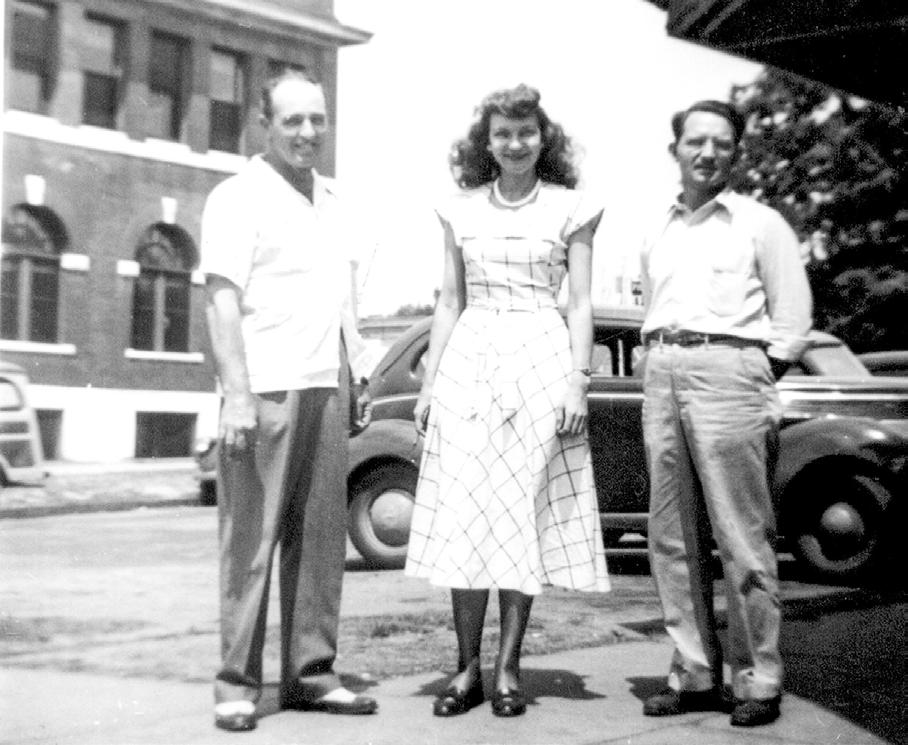

ship, serving as a large showroom for the boxy automobiles. In the 1920s, Roy D. Hopkins, a Farm Bureau agent, bought the building and opened Roy D. Hopkins Feed & Seed.

At that time, icehouses served both a practical and social purpose. In the days before electricity-dependent refrigeration, icehouses were located next to railroads, and would serve as warehouses for blocks of ice brought into town on trains. Women at that time didn’t approve of their husbands taking up precious space in small household iceboxes, so men would keep their beer in icehouses along the railroad tracks. After a long workday, men would gather at the icehouses and enjoy a cold one or two before heading home to their families. Texarkana, a town bisected by railroad tracks, was no stranger to this practice.
In 2007, business partners George Dodson and David Jones purchased the building that had housed the Hopkins Feed and Seed for 85 years.
“We decided to make a little bar and grill since there wasn’t one in town like what we wanted to do,” Jones said. “We decided to name it in honor of Mr. Hopkins, who owned the Feed and Seed, and after the Icehouse, which played a pivotal role in railroad towns like ours.”
When they purchased the building, Dodson and Jones realized that it was in need of repair, but the duo opted to restore the building to its original charm.
“The building needed extensive renovations. It had beautiful tin ceilings throughout the whole place, and they were handtacked into place. When we renovated, we replaced some of the damaged panels and kept the rest in place, and we used an airplane paint on it. It’s kind of coppery looking and really pretty,” Jones said. “Several years ago, the city let us take over the property in front of our building, and we made it a patio with covered seating. Folks can sit out there and eat and enjoy the entertainment in our building and all around them.”
The community was quick to take notice of the renovations on Third Street. In 2007, a race throughout Texarkana was started called “Run the Line.” The first year saw 50 to 75 runners. This February, the race had more than 625 of them, including national and international runners. Jones noted the race’s very first ceremony was held inside the Hopkins Icehouse during renovations before opening. The building was added to the National Register of Historic Places shortly thereafter.
“The building was stripped to its bare frame. We had just finished renovating the bathrooms a few days before the race’s very first opening ceremony. A lot of people were curious as to what we were doing, and they got a sneak preview of it during that ceremony,” Jones said.
Hopkins Icehouse is one piece of the downtown entertainment district puzzle in Texarkana. Other establishments have been looking for ways to bring residents and out-of-towners downtown for a fun time.
“We’re in a downtown entertainment district. Within this district, we have open container laws, so this whole area is a fun place, not just individual establishments. The railroad even recently leased property to the city for the creation of a festival area,” Jones said. “With the new interstate going north and south, we realized that a lot of new people would be coming in, and this is a great chance for growth. The downtown area has really taken off within the last few years.”
But entertainment in Texarkana has quite a history — one to which Hopkins Icehouse still contributes. The Arkansas Municipal Auditorium, located a block away from the Hopkins Icehouse, bore witness to one of the greatest concerts of all time.
It was there, on Sept. 2, 1955, that Elvis Presley and Johnny Cash performed some of their newest hits for the first time. The auditorium is often credited as the birthplace of rock ῾n’ roll and country music.
Hopkins Icehouse keeps that legend alive today by hosting concerts, poetry readings, charity events and cooking up food near and dear to the heart of folks across the South.
“At the end of the day, we work hard to provide good food and a good time and remind folks of our roots,” Jones said. “Our food is honest and straightforward and good. Our service is spot on, and our building is a bright spot downtown, not just for what we do today, but for our role in Texarkana’s history.”
As Texarkana continues to grow and bring in visitors who are curious about the town, Hopkins Icehouse is likely to lead the way, showing visitors the culture, history and down-home cooking of southern Arkansas.
What once started as a joke to fill the silence became a point of serious complexity.
“How old are you today?”
I don’t know how my partner came up with this question or what he meant when he first asked it, but it became a running joke between us.
Depending on how I’d slept the night before or how much my lower back ached, my answer would range anywhere from 45 to 85.
But after being asked this question a few times, my answers took on different forms depending on my mental state, and I began to think of the question even when my partner didn’t ask me.
If I felt unheard in a conversation at one of my volunteer organizations, I’d say I was in my early 30s to get a little more respect. If I were comparing myself to my peers in whatever success I’d had as a young adult, I’d boast, “... and I’m only in my early 20s.” And on those rough days, when I felt like I was carrying the weight of the world on my shoulders, when I wanted to unplug from the grid and move to a little farmhouse in an open field, I was a grizzled, chain-smoking 65-year-old.
On the other hand, I know people who are my age on their I.D.s but are probably closer to 15 in reality. Eighty years ago, they would have been storming the beaches of Normandy. Today, they’re content to trade baseball cards.
Pulitzer Prize winner Jennifer Senior recently dove into an article in The Atlantic explaining why people feel 20 percent younger than their actual age. But what if you feel older?
If you’re my age, staring down the barrel of five figures of student loan debt, working 60 hours a week, with soaring interest rates, an unfathomable housing market and a recession lurking around the corner … how could you feel any less than my age, if not more? I don’t know that I’ll ever feel 25. I don’t know that I ever did. I think I’ll be 45, 65 … or 85, forever.
If you’re older and you feel younger, is this escapism? If you’re younger but feel older, is this an acknowledgment of everything you’ve done and everywhere you’ve been? A decade ago, most Americans looked forward to retirement. Today, retirement is a figment of the imagination. If I were to say I want to feel young, what does that mean? I’m young right now, and my position is bleak. When I was a child, I couldn’t wait to grow up. Now I’m barely grown up … but would I go back? Perhaps the age we feel is a reflection of our own mortality and morality.
G. Michael Hopf once wrote, “Hard times create strong men. Strong men create good times.” Conversely, “Good times create weak men, and weak men create hard times.”
Hard times don’t just create strong men. They create mature men who are able to base their decisions on a wealth of experience. But what, then, determines maturity? My 401k? Or the things that I’ve seen and experienced?
And does maturity imply morality? Hard times create strong men who storm beaches, but are they capable of making rational decisions when they return? Yet, not everyone needs to be drafted into an international conflict to be a strong man. Sometimes, the hardships one faces at home cultivate maturity, and most importantly, morality.
I think, then, that maturity, age and morality are all related but not inherently the same. The age we feel, therefore, is not a reflection of what we’ve done but what we hope to be. For 75-year-olds who feel 45, there is an element of yearning for what may have been the prime of one’s life. For 25-year-olds who feel 65, there’s a yearning to be way the hell away from the rut we’re stuck in right now.

One can be mature and immoral, and one can be moral but immature. What compels us to feel a certain age, then, is our own mortality. In good times and in hard times, we always look to better times for comfort — that’s our human nature. Whether we look behind or ahead, we look for something that makes us feel better. And the wider the gap between the age on our I.D. and the number in our head, perhaps the greater the tumult within ourselves.
I hope that someday, when my partner asks, “How old are you today?” I can finally feel the number on my I.D., no matter what it is. Because that will mean that I’m finally there — I’m finally at better times.














The new Conway Regional Maternal-Fetal Medicine Center of Arkansas, led by Dawn Hughes, MD, and Stacey Johnson, APRN, offers care for women with complications found prior to or during pregnancy and for their unborn baby. Each woman's journey to having a baby is unique, which is why our highly-skilled specialists collaborate with ob-gyns, neonatologists, and pediatricians to provide each patient with a special, individualized care plan. Visit ConwayRegional.org to learn more.
We’re not just growing—we’re growing together.
